Because this is long, be sure to scroll down and read the whole thing. If your email or device crimps it, you may have to click “read more” to see it all, ending with the sale reminder (20% off) and order form link at the very bottom.
Earlier in the week I wrote, to begin PART ONE of this big list of favorite reads of 2019, “Between stupid Winter illnesses and out-of-store events and brand new or forthcoming books to read, our annual custom of announcing Hearts & Minds Best Books of the Year as been late in coming.”
That’s putting it mildly. Don’t ask what tied me up this week, but, for the record, this is slow, hard work, creating a list like this. I fret about What You Will Think and since our living depends on you sending us orders, I’m always tempted to pull my punches, as they say. I don’t even know what it means to literally pull a punch, and I can’t use the less violent metaphor of not showing my hand, because, well, friends, that’s exactly what I’m doing here, showing my hand, or at least some of the books I held in my hands this year. Few punches pulled, most of my cards on the table.

 Here is PART TWO of the Hearts & Minds list of my favorite books, or books I felt I should honor, good titles or decent authors who contributed to making 2019 a good one for us and for book buyers and readers of all sorts. Thanks for caring about our work at Hearts & Minds and honoring us by reading this long, long epistle. Spread the word and send us some orders, please. Just use the link to the order form page at the end of the column. Happy reading!
Here is PART TWO of the Hearts & Minds list of my favorite books, or books I felt I should honor, good titles or decent authors who contributed to making 2019 a good one for us and for book buyers and readers of all sorts. Thanks for caring about our work at Hearts & Minds and honoring us by reading this long, long epistle. Spread the word and send us some orders, please. Just use the link to the order form page at the end of the column. Happy reading!
Reminder: we show the regular retail price but will deduct our 20% OFF BookNotes discount when you place an order. Our order form page (see the bottom of the column) is certified secure.
A VITAL AND CONTEMPORARY STUDY OF SAINT AUGUSTINE – AND ONE OF THE VERY BEST BOOKS OF 2019
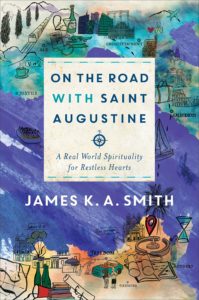 On the Road with Saint Augustine: A Real-World Spirituality for Restless Hearts James K.A. Smith (Brazos Press) $24.99 I will not belabor this, but refer you to my rave review which I wrote before the book came out in October. We pushed it at BookNotes as a pre-order and it became one of the top sellers for Hearts & Minds this year. And we are glad about that.
On the Road with Saint Augustine: A Real-World Spirituality for Restless Hearts James K.A. Smith (Brazos Press) $24.99 I will not belabor this, but refer you to my rave review which I wrote before the book came out in October. We pushed it at BookNotes as a pre-order and it became one of the top sellers for Hearts & Minds this year. And we are glad about that.
I suppose you know that I have often said Smith’s You Are What You Love was the Book of the Decade, which I announced several years ago. That book is a delightful, accessible, transformational book which in some ways summarizes the more substantial trilogy of volumes in what is called his “Cultural Liturgy” project. Those three are, in order, Desiring the Kingdom: Worship, Worldview, and Cultural Formation, Imagining the Kingdom: How Worship Works, and Awaiting the King: Reforming Public Theology. That Jamie was working on an introduction to the deep Canadian philosopher Charles Taylor (How (Not) To Be Secular) and editing Comment magazine during the writing of those three big ones, and the summarizing You Are What You Love is remarkable. Oh and don’t forge — in those same years he released and we have promoted a lovely collection of shorter essays called Discipleship in the Present Tense: Reflections on Faith and Culture which gives further insight into where this remarkable college professor is coming from and where his “all of life redeemed”-neo-Kuyperian-worldview stuff is going.
Yes, yes, you should read all of these volumes – some of the most generative (and in some of our circles) the most discussed books of recent years. It is a bit surprising that he has become such a widely admire author and presenter, but it’s true. You really should know his stuff.
Jamie was a kid of a working class family who married young and was vibrantly Pentecostal. He eventually studied Dutch neo-Calvinism (and the philosophy of Herman Dooyeweerd) at Toronto’s Institute for Christian Studies where he worked with scholars such as James Olthius, Al Wolters, Henk Hart, Calvin Seerveld, Brian Walsh, and others who have been important in my own life. And now he says what Wolters (and James Skillen, mentioned above) have all said: the all of life redeemed and “every square inch of creation” regained theological perspective of relevant Reformation teaching goes back to Augustine, the African bishop from the 3rd century. This On the Road with Augustine is a book bringing Saint Gus into the post-modern era that Smith was born to write. It brings together so much of what he’s worked on in a marvelously readable manner. It is doubtlessly one of the most important books of 2019 and certainly one of my favorites.
You can read many reviews of it on various on-line sites and see several good videos of the author describing it; you can see how I enticed people to order it in my own BookNotes remarks about it, HERE. But just know this: Augustine, like many in the late 20th century (most notably, Jack Kerouac, author the iconic ‘60s road trip book On the Road) thought that moving on would be the way to construe one’s new identity; to find oneself as we used to say. This is actually troubling in many ways (see Mark Sayer’s under-appreciated little book called The Road Trip That Changed the World: The Unlikely Theory That Will Change How You View Culture, the Church, And, Most Importantly, Yourself) and it is important to understand. Believe it or not, Smith is helping us understand this ethos by comparing it to Saint Augustine’s own travelogue and memoir about finding himself, published in serialized form between 397 and into 400 AD
Augustine, before his famous conversion, found himself in that same space—no-place but moving on, heading to various cities and jobs and hopes and dreams in Italy. He becomes, in Smith’s amazing prose and incredibly insightful observations and analysis, a hip 21st century social entrepreneur, an artist, a world-changer and culture maker, all the stuff so many energetic young adults today are yearning to become. But yet, can we truly find and sustain a lasting identity in these grandiose schemes? Will we always be restless tying this and that? Will we ever learn to live well, be wise, grow up?
I cried for myself as an old guy, and for my grown kids, and for my friend’s adult kids, and for Jamie’s kids as he wrote with such empathy about what it is like coming of age in this secular age, in these confusing times. And I rejoiced in how he used the life and teaching of this memorable church leader from centuries ago to illuminate our calling to be in friendship, to relate to mothers and fathers, to find work, to learn to protest, to be an intentional character in our own (God’s?) story. He has a chapter on freedom, a chapter on ambition, a chapter on sex. My, my, how he turns this “refugee spirituality” of Augustine into a contemporary guide on the quest to find (truly) yourself.
“Everybody’s got a restless heart,” Springsteen sings. Baby, we’re Born to Run. Jamie gets this. Saint Augustine gets this. And the God of the church Augustine helped to form is the One who call us home, to stop our striving, to be at rest.
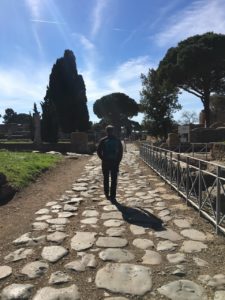 To help us figure it out, this tension between our longing and love for escape and our need and desire to be at rest, Smith and his beloved wife head off on a journey following some of the footsteps of Augustine. They go on the road, literally, with Saint Augustine, so to speak, so they can report back and help us along our (restless) way. Much of this was written literally in places like Milan and Rome. He tells of Augustine’s best friends and much about his mother, Monica. (Smith’s vulnerable telling of his own sense of fatherlessness is remarkable in a chapter about Augustine’s absent father.)
To help us figure it out, this tension between our longing and love for escape and our need and desire to be at rest, Smith and his beloved wife head off on a journey following some of the footsteps of Augustine. They go on the road, literally, with Saint Augustine, so to speak, so they can report back and help us along our (restless) way. Much of this was written literally in places like Milan and Rome. He tells of Augustine’s best friends and much about his mother, Monica. (Smith’s vulnerable telling of his own sense of fatherlessness is remarkable in a chapter about Augustine’s absent father.)
There are some fabulously (and surprising) full color-art plates included, pictures of architecture and paintings and renderings they saw on their trip which become important to the story. What a multi-faceted, learned scholar Smith is, and what a helpful travel companion. What a philosopher he is, but what a friend. This book, like many of his others, is filled with stories of history and philosophy and theology and culture, but it is down to Earth and (as far as a philosopher writing about Camus and Cicero and Augustine and Sartre can be, explaining stuff about existentialism and modernist ennui and how those thinkers have been influential in the air we breath, whether we know it or not.)
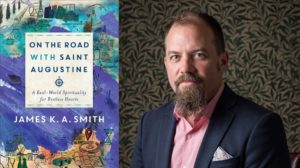
On the Road with Saint Augustine: A Real World Spirituality for Restless Hearts is accessible for most educated readers. Many good friends loved it and have encouraged me to tell others how great it is. I highly, highly recommend it. It is one of the very top books of 2019.
A GREAT REMINDER OF THE GOODNESS OF CREATION (AND THE GOODNESS OF GOD)
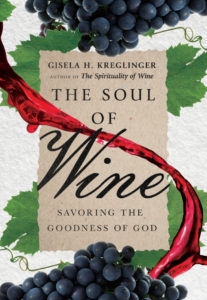 The Soul of Wine: Savoring the Goodness of God Gisela H. Kreglinger (IVP) $16.00 I’m not sure when I first read the poem “As Once The Winged Energy Of Delight” by Rainier Maria Rilke but I recall having it commended to us for meditation at, of all things, a Faith & Work conference at Redeemer PCA Presbyterian Church in Manhattan. I needn’t rehearse it here but it came to mind as I was reading the truly lovely little book by wine-maker theologian, Gisela Kreglinger. Rilke writes about wonder and awe, and although I doubt this is what he was thinking when inviting us to this poem, I remember the line “To work with Things in the indescribable relationship is not too hard for us” and a bit about how “the pattern grows more intricate and subtle.” Upon looking it up, I was astonished by the line that says to “Take your practiced powers and stretch them out” and thought that this is exactly what this book gives us an opportunity to watch, a craftsperson (a winemaker, in this case) taking her practiced powers, watching the patterns in intricate and subtle ways as she “works with Things” before God.
The Soul of Wine: Savoring the Goodness of God Gisela H. Kreglinger (IVP) $16.00 I’m not sure when I first read the poem “As Once The Winged Energy Of Delight” by Rainier Maria Rilke but I recall having it commended to us for meditation at, of all things, a Faith & Work conference at Redeemer PCA Presbyterian Church in Manhattan. I needn’t rehearse it here but it came to mind as I was reading the truly lovely little book by wine-maker theologian, Gisela Kreglinger. Rilke writes about wonder and awe, and although I doubt this is what he was thinking when inviting us to this poem, I remember the line “To work with Things in the indescribable relationship is not too hard for us” and a bit about how “the pattern grows more intricate and subtle.” Upon looking it up, I was astonished by the line that says to “Take your practiced powers and stretch them out” and thought that this is exactly what this book gives us an opportunity to watch, a craftsperson (a winemaker, in this case) taking her practiced powers, watching the patterns in intricate and subtle ways as she “works with Things” before God.
Okay, maybe I’m stretching. But the Bible teaches a sturdy and robust doctrine of creation — see some of the recent essays in the wonderful Creation and Doxology: The Beginning and End of God’s Good World edited by Todd Wilson (IVP Academic; $25.00) or Everyday Glory: The Revelation of God in All of Reality by Gerald McDermott (Baker Academic; $22.99) or the small but potent Theology of the Ordinary by Julie Canlis (Godspeed Press; $12.99) so working with the stuff of creation (indeed, allowing it to speak to us a la Psalm 19:1-4 or Job 12:8) is exactly what being human is all about. We are made in the image of a creator God and God places Adam and Eve in the garden. It is our culture-making vocation and task (to use Andy Crouch’s phrase from his book Culture Making) to make something of the raw stuff of creation. We “exercise dominion” by stewarding well the potential and possibilities of the wonderful stuff God has graciously put into the creation. We are to cultivate — eggs into omelettes, so to speak, and make something for the common good. It is the theological accounting for art and science, families and schools, businesses and governments, parties and rituals, policies and programs. And wine.
Ms Kreglinger gave a lovely account of her life as a girl growing up in a Lutheran home and vineyard, working in the winery, and realizing that God cared about it all especially when she realized that her own families grapes were used in the parish communion wine. Her discussion of a theology of wine and winemaking was solid and thorough in the much-acclaimed The Spirituality of Wine (Eerdmans; $24.00) I told folks about it gladly, as it was one of the one such books we knew about. When I heard this was coming out I wondered what else she could possibly say, and why we needed another book on a Christian view of wine.
And oh my, how glad I am for The Soul of Wine which helps us not just understand her theology and approach to wine (it’s lavish glory, its use, its abuse and more) as explained in that first big book, but this invites us to truly experience wine’s blessedness. And to explore precisely what the subtitle says — by savoring the goodness of creation and come to know something about the goodness of God. As singer-songwriter Sandra McCracken says on the back cover of it, The Soul of Wine “invites us to experience the abundance of God.”
I cannot here tell you all that this little book explores, but it is more than just a guide to the fermented fruit of the vine, although it does delightfully explain a lot that I enjoyed reading about. (And, by the way, a few important wine importers, a trained sommelier, and the author of the respected Wine Bible have all weighed in on this very informative resource. It even has a book discussion guide and a wine tasting guide making it ideal for small groups wanting to learn a bit about the nuances of this world-famous, ancient, complex beverage.) But there is more going on. She calls us to “convivial celebrations” and to learn about joy. She even has a small bit about sex, which, again, is pointing us in the direction of being attentive to the glory of our creaturliness, and the goodness of how God made the world to work. Her chapter called “making peace with wine and food” is wise and good.
Leave it to Andy Crouch to help us appreciate why this book deserves to be on our list of notable titles this season. Listen to what Andy writes:
I read The Soul of Wine with increasing delight and ever deeper emotion. This book offers wisdom not just about wine, but about our souls as well―about the joy, grief, and beauty that shape all of our stories, and that are so intertwined with the making of wine. It will help me drink more slowly and more meaningfully not just from my next glass of wine, but from life itself.
Isn’t that a beautiful comment about a book? Yes and Amen.
I like this observation, too, well-spoken by Kendall Vanderslice, who wrote the fabulous We Will Feast: Rethinking Dinner, Worship, and the Community of God, who says:
Kreglinger dispels the myth that wine appreciation requires a distinguished palate or an elite vocabulary. Rather she presents wine as a simple gift from God that, when stewarded well, offers a glimpse of creation as it is meant to be.
TWO GREAT BOOKS EXPLORING OUR SENSE OF PLACE AND BELONGING
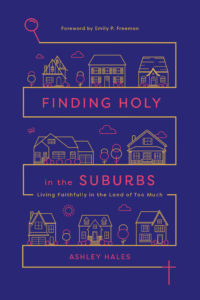 Finding Holy in the Suburbs: Living Faithfully in the Land of Too Much Ashley Hales (IVP) $16.00 I almost listed this in the last post in our category of spiritual formation; Holy in the Suburbs is, indeed, about the shape of our faith, the call to holiness, the formation of our discipleship. I could have gone there.
Finding Holy in the Suburbs: Living Faithfully in the Land of Too Much Ashley Hales (IVP) $16.00 I almost listed this in the last post in our category of spiritual formation; Holy in the Suburbs is, indeed, about the shape of our faith, the call to holiness, the formation of our discipleship. I could have gone there.
Alas, despite the part of the subtitle about “living faithfully” I think one of the great contributions of this book to said faithfulness is found in the insights this author has about the concrete details of our built environment and the habits and customs (and values and dispositions) that flow from them. I raved about the deep and profound literary study (in our last BookNotes) called The Absent Hand which offers a detailed rumination on landscapes – natural and human-built – that is full of gravitas and philosophy. Hales isn’t a literary critic or professional analyst; she strikes me more as a soccer mom. That is, she is fairly ordinary, a smart suburbanite who is astute enough to realize that studying the mores of one’s place and the habitats thereof really is an important prophetic task. To “understand the times and know what God’s people should do” (from 1 Chronicles 12:32) isn’t just a call to a big-picture sense of the zeitgeist, but, also, a study of the daily details beneath our feet.
I nearly raved about this book when it first came out and I suggested to many, and here at BookNotes, that it was the best Christian study yet of the phenomenon of suburbia. Plus, it is gloriously written, making it a wonderful read. It was one of my favorite books of 2019 and, I believe, one of the most under appreciated. So many church folks could benefit from this deeper (and eloquent) dive into learning the deeper things that arise (spiritually and theologically) as we discern the times and places of our homes and cul-de-sacs and Pinterest-documented days of commutes and shopping and entertaining. I was going to say cue Joni Mitchell’s album The Hissing of Summer Lawns but Finding Holy in the Suburbs is not at all cynical. No matter where you live, think you will enjoy it and appreciate it.
Here is the Table of Contents as Ms Hales takes us into “A Story to Find Home in the Geography of Nowhere.” Some chapter titles are nicely allusive, but it gives you a nice glimpse into what will await you or your group if you take this one up. There are discussions questions, too, so it’s perfect for a book club or Sunday school class or book club.
- Worshiping Granite Countertops: Consumerism
- When Your Worth Is Measured in Square Footage: Individualism
- Circling the Suburbs in My Minivan: Busyness
- Beyond the Gated Community: Safety
- Where the Sidewalk Ends: Repentance
- You’re Not a Barbie, You Belong: Belovedness
- This Isn’t Pinterest-Worthy Entertaining: Hospitality
- Open Hearts and Open Hands: Generosity
- The Opportunity of Cul-de-sacs: Vulnerability
- Paper Birds and Human Flourishing: Shalom
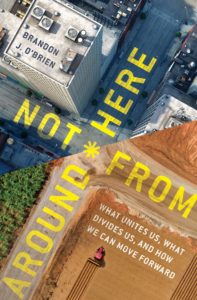 Not from Around Here: What Unites Us, What Divides Us, and How We Can Move Forward Brandon J. O’Brien (Moody Publishers) $13.99 I can’t say enough about this little book and am excited to once again remind you of it and to honor it was one of the very good books of this past year. I think any time Brandon O’Brien does a book, it is worthy of celebration as he is a really fine writer and wise practitioner of church leadership. (He is working with Tim Keller in New York City now, even though he has served small churches and wrote the quite useful Strategically Small Church.) He co-authored the spectacular Misreading Scripture with Western Eyes: Removing Cultural Blinders to Better Understand the Bible and, in another curious bit of expertise, wrote in 2018 Demanding Liberty: An Untold Story of American Religious Freedom which is a very impressive study of a colonial era, Connecticut pastor and leader, Isaac Backus, who wrote and contended for freedom of conscience and religious liberty in a culture that seemed to be heading either towards theocracy or secularism. Backus had a “third way” and it is clear that O’Brien gets the significance of this older wisdom.
Not from Around Here: What Unites Us, What Divides Us, and How We Can Move Forward Brandon J. O’Brien (Moody Publishers) $13.99 I can’t say enough about this little book and am excited to once again remind you of it and to honor it was one of the very good books of this past year. I think any time Brandon O’Brien does a book, it is worthy of celebration as he is a really fine writer and wise practitioner of church leadership. (He is working with Tim Keller in New York City now, even though he has served small churches and wrote the quite useful Strategically Small Church.) He co-authored the spectacular Misreading Scripture with Western Eyes: Removing Cultural Blinders to Better Understand the Bible and, in another curious bit of expertise, wrote in 2018 Demanding Liberty: An Untold Story of American Religious Freedom which is a very impressive study of a colonial era, Connecticut pastor and leader, Isaac Backus, who wrote and contended for freedom of conscience and religious liberty in a culture that seemed to be heading either towards theocracy or secularism. Backus had a “third way” and it is clear that O’Brien gets the significance of this older wisdom.
Not from Around Here is a fun, easy-to-digest book that seems to combine these various interests of O’Brien: it is about the increasing divide in our polarized times between urban and rural worldviews. Yes, he is convinced that what another author calls “the big sort” is a real thing – we are dividing ourselves in part by our sensibilities and inclinations that are shaped by our tending to be small town or big city. (Ahhh, and what does me make of the aforementioned suburbs? You’ll have to read Not From Around Here yourself to see that bit.)
O’Brien grew up in rural Arkansas and has worked in small town churches, served in the quintessential suburbs of Chicago, and, as I noted, and he now is working in the global City-to-City urban church planting organization. And he has written about public civility, pluralism, tribalism and the blind spots of race and culture (in the misreading the Bible book), public life and citizenship (in the Backus book.) I don’t know if any other reviewers have noted this, but this new book really is bringing together much of his expertise. He’s a scholar of these things, but in this book, he is offering helpful cultural discernment and practical guidance for faithful “salt of the Earth” discipleship. If we are to be leaven in the loaf, we have to know something about how the loaf works and what kind of yeasty influence we can be. He helps us understand a major (and not adequately recognized) feature of our time. Again, namely, how we are self-selecting ourselves into tribes and sorting ourselves by preference and seeing others as the “bad guys” – the troubling influences of the culture.
You know how this works – urban and seemingly sophisticated higher-brow people blame the rednecks, flyover country, the bumpkins. Those “deplorables” of the rural sort, despise the “elites.” (I would say, although O’Brien doesn’t get into it, that this hatred is so strong that this is why many are willing to put up with the arrogance and weirdness of Donald Trump who claims to know so much about so much, when, in fact, he doesn’t read or study or have competence to lead with wisdom in any field. But they love him!)
O’Brien is a Christian pastor and historian and is working here more like a prophetic sociologist, a son of Issachar, helping us understand this feature of our times. Some of it is funny – he has amusing stories and great illustrations to realize how even how we think about the faith and our discipleship.
And, perhaps a bit counter-intuitive to my description here (forgive me) he also notes that “tidy categories may suit the media, but people are more complex up close.”
Listen to what it says on the back cover (which I cited in my earlier BookNotes review.) I love this:
News outlets, historians, and sociologists can (and do) tell us all about the statistics, but they don’t (and can’t) tell us about what it’s really like in a given place–how the squish of creek water between your toes or the crunch of autumn leaves on a city sidewalk shape your sense of normal and good and right. To understand that–to understand the people in the places–we need stories. We need to listen, get to know the nuance of people, and have empathy for their way of seeing things.
Brandon O’Brien is, in many ways, a man, torn between places. Raised in the rural South, educated in the suburbs, and now living and doing ministry in Manhattan, he’s seen these places, and their complexity, up close. With the knack of a natural storyteller he shares what he learned about himself, faith, and the people who make up America on his own journey through it.
A LONG AWAITED SEQUEL by AWARD-WORTHY OS GUINNESS
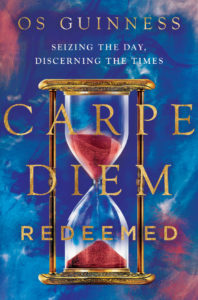 Carpe Diem Redeemed: Seizing the Day, Discerning the Times Os Guinness (IVP) $20.00 You may know that I have said often that The Call: Purpose is one of my all time favorite books. There are chapters I have used in teaching and speaking and there are lines I’ve quoted, over and over. It’s eloquence, insight, and powerfully-rooted theological vision of God’s call to us all to serve the King everywhere and in everything offers a foundation and dynamism for anyone seeking purpose, meaning, a sense of vocation, and a direction to their seeking. Os is a pious and Godly man, a good thinker with an undergrad degree in philosophy from Oxford (and a PhD on the work of sociologist Peter Berger.) He travels and speaks and consults internationally and is a true global citizen; born in China, educated in Great Britain, Irish by descent, and living in the US (whose Founder’s ideas and ideals he would die for) Os is a friend to many and a much respected servant of the church. He sometimes says his own calling is to help explain the world to the church and to help explain the gospel to the cultured leaders of the world. He does so with integrity and considerable eloquence. His many books should be on your bookshelf.
Carpe Diem Redeemed: Seizing the Day, Discerning the Times Os Guinness (IVP) $20.00 You may know that I have said often that The Call: Purpose is one of my all time favorite books. There are chapters I have used in teaching and speaking and there are lines I’ve quoted, over and over. It’s eloquence, insight, and powerfully-rooted theological vision of God’s call to us all to serve the King everywhere and in everything offers a foundation and dynamism for anyone seeking purpose, meaning, a sense of vocation, and a direction to their seeking. Os is a pious and Godly man, a good thinker with an undergrad degree in philosophy from Oxford (and a PhD on the work of sociologist Peter Berger.) He travels and speaks and consults internationally and is a true global citizen; born in China, educated in Great Britain, Irish by descent, and living in the US (whose Founder’s ideas and ideals he would die for) Os is a friend to many and a much respected servant of the church. He sometimes says his own calling is to help explain the world to the church and to help explain the gospel to the cultured leaders of the world. He does so with integrity and considerable eloquence. His many books should be on your bookshelf.
Carpe Diem Redeemed came out in 2019 so it is obviously one I must name and that I want to honor. It isn’t simple, though, to explain, as it seems to have a complex thesis.
As I explained when I celebrated it earlier at BookNotes, Carpe Diem Redeemed insists that if we are to “seize the day” and make something of our lives, we as followers of Jesus must not merely mimic the way the world things about seizing the day. We aren’t Romantics wanting to merely tear pages out of the books and do our own things (as memorable as the famous Whtiman-esque scene citing O Captain My Captain in Dead Poets Society. We have to, as Guinness often says, “think it through.”
As we think it through, Biblically, Christianly, one of the big questions that face anyone wanting to make the most of their time is this: what is time? What time is it? How do we “discern the times?” And so, to “redeem” our quest to seize the day, we simply must be attentive to what it means to be timely.
Guinness is asking perennial questions, and, curiously, he is one of the few asking such things these days. He wants us to be relevant and faithful in our day – of course! But we dare not be so “relevant” that we risk being irrelevant because, well, we’ve failed to develop what he calls a “prophetic untimeliness.”
Os cites so many remarkable writers who have spoken good lines about time. (The first several pages are nothing but citations from all sorts of philosophers, poets, comedians, novelists, and business leaders and that is almost worth the price of the book for these collected quips and quotes.)
For instance, the poet Octavio Paz (in The Light of India) has said,
I believe that the reformation of our civilization must begin with a reflection on time.
Years ago Guinness had a little book worked with the old adage warning that “whoever sups with the devil should have a very long spoon.” (That book, Dining with the Devil had the subtitle “the mega-church flirts with modernity” and warned about our over-reliance or technology and marketing and data, becoming successful not by reliance on the gospel but by manipulation and efficiency. And so, we use, but must hold at some distance the forces and trends and artifacts of our fast-paced, technolopy culture.
And that is how best to redeem our quest to live out our callings, to find purpose and meaning, to make the most of things: by discerning the times, and being what some call intentional. We are not to merely be energetic entrepreneurs and eager culture makers making whatever we want in whatever way we want, but we are called to be salt and light and leaven, doing our best to serve God’s purposes with the gifts and talents and capacities God has given us, the Lord’s work in the Lord’s way. We are to be in but not of the world, after all. Even our view of time must be, somehow, counter-cultural. We must resist, as Os says in the second chapter, the hot-wired ethos of “Survival of the Fastest.”
I want to nominated Carpe Diem Redeemed as one of the most badly needed and perhaps least likely to be heeded books of our time. It is notable, well-crafted, thoughtful, rich, and learned. Is he fully right about every detail? Do the words inspire with vision and joy as they so famously did in The Call. Perhaps not. But it is certainly one of the best books of 2019, and we commend it for your consideration.
AN AWARD WINNING AUTHOR BRINGS HIS HOT DISCERNMENT OF THE TIMES TO OUR MILLENNIUM WITH BOTH BAD AND GOOD
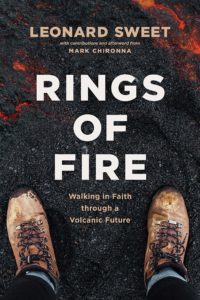 Rings of Fire: Walking in Faith Through a Volcanic Future Leonard Sweet (NavPress) $17.99 Okay, this isn’t the thickest book I’ve lugged around this year – that would be Figuring by Maria Popova of the Brain Pickings blog fam a book about science and art that Len Sweet would like, I’m sure. But Rings of Fire was one of the thickest that isn’t designed for scholars or textbooks. And it reads like a dream, as you zoom through pages and pages of facts and data and theories and explanations. As I might have exclaimed in our first BookNotes review of this (which came out in November) – Len is back! This is the most invigorating, learned, stimulating, frustrating, upbeat, prophetic, weird and wonderful tome he has done since his late 1990s Soul Tsunami.
Rings of Fire: Walking in Faith Through a Volcanic Future Leonard Sweet (NavPress) $17.99 Okay, this isn’t the thickest book I’ve lugged around this year – that would be Figuring by Maria Popova of the Brain Pickings blog fam a book about science and art that Len Sweet would like, I’m sure. But Rings of Fire was one of the thickest that isn’t designed for scholars or textbooks. And it reads like a dream, as you zoom through pages and pages of facts and data and theories and explanations. As I might have exclaimed in our first BookNotes review of this (which came out in November) – Len is back! This is the most invigorating, learned, stimulating, frustrating, upbeat, prophetic, weird and wonderful tome he has done since his late 1990s Soul Tsunami.
Sweet is my favorite trend-meister and futurologist, although as a historian, he looks both back and forwards. And his day job – when he’s not reading widely and writing books about how the church can face the future with grace and truth and style and guts –is mentoring students who study this stuff. He is legendary as a communicator and as a mentor and teacher. He loves equipping young, rising pastors and church leaders to not just be away of the ethos of the times and the trends of the future, but to enter into the habits and dispositions of those who see stuff in society and know what to make of it. He was one of the first church leaders that told us that the wave of technology would make TV more interactive. Soon, you could “vote people of the island” and shows the The Voice became a New Thing. He called it EPIC (experiential, participatory, image-based, and communal) and in books like Aquachurch and SoulSalsa and Carpe Manana and The Gospel According to Starbucks he gave advice for how churches can understand the times and perhaps embody a more faithful style – a playful dance, he’d say, rather than “working at it” – of cultural engagement.
He’s done a dozen or more other books lately, many which are quite nice. (From Tablets to Tables is just out in paperback, which is a nice corrective of his fascination with the digital, reminding us that real food and real friends with real stories is important. Len has talked about community and artifacts and analogue and being green for as long as he has been writing, making him a bit of a contradiction at first glance. He’s a futurist who loves the 1800s and a postmodernist who calls us to sit down and eat meals together.
Like him or not, Leonard Sweet is one of the North American churches most lively and prolific and punchy evangelical voices and you should know his work. Especially his big work where his broad knowledge and deep footnoting really shines. Rings of Fire is a spectacular, major release where he explores in sweeping fashion a half a dozen “hot zones” and about a dozen “hot topics” which should call forth a “hot church” equipped to walk through fire in this volcanic culture. Rings of Fire: Walking in Faith Through a Volcanic Future and deserves to be highlighted as a notable book of 2019.
THE BOOK SOME OF US HAVE BEEN WAITING FOR FOR DECADES
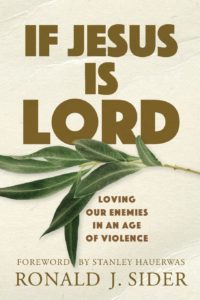 If Jesus is Lord: Loving Our Enemies in an Age of Violence Ronald J. Sider (Baker Academic) $24.99 I have often said that I got the bug of book reviewing when Sojourners magazine paid me $30 to do a short review of a book that was one of the best books I read in the late 1970s, Ron Sider’s Christ and Violence. I’m sure today I’d have other things to say about it, but I must even now say it is a compelling and important book. Sider, as you may know, was known for the seminal (and still in print and still very highly recommended) Rich Christians in an Age of Hunger. His evangelical bone fides are impeccable; his commitment to standard gospel theology and Christ-centered Bible reading is second to none. He loves church history, takes a fair-minded view of reading widely and listening to his critics, and believes in forging a vision where faith is decisive in people’s lives and behaviors because Jesus is Lord. As an Anabaptist – that faith tradition made up of the likes of Mennonites and Brethren – he believes in the local church as essential, simple living, service to others, and, yep, Jesus-commanded non-violence. For this Christ-centered set of denominations, being in the military is considered sinful.
If Jesus is Lord: Loving Our Enemies in an Age of Violence Ronald J. Sider (Baker Academic) $24.99 I have often said that I got the bug of book reviewing when Sojourners magazine paid me $30 to do a short review of a book that was one of the best books I read in the late 1970s, Ron Sider’s Christ and Violence. I’m sure today I’d have other things to say about it, but I must even now say it is a compelling and important book. Sider, as you may know, was known for the seminal (and still in print and still very highly recommended) Rich Christians in an Age of Hunger. His evangelical bone fides are impeccable; his commitment to standard gospel theology and Christ-centered Bible reading is second to none. He loves church history, takes a fair-minded view of reading widely and listening to his critics, and believes in forging a vision where faith is decisive in people’s lives and behaviors because Jesus is Lord. As an Anabaptist – that faith tradition made up of the likes of Mennonites and Brethren – he believes in the local church as essential, simple living, service to others, and, yep, Jesus-commanded non-violence. For this Christ-centered set of denominations, being in the military is considered sinful.
That Ron is a (gracious) Christian pacifist is vital to know about him, and that he wants to be consistent on that Godly sort of love for all, means he has been known for being “consistently pro-life.” He opposes killing the elderly, the prisoners, the enemies, endangered species, and, yes, the unborn. There are precious few who care about both the unborn in the womb and the enemy on the battlefield; he favors helping those in crisis pregnancies and keeping the poor from starving; he speaks about against those who would take away medical care for the sick and he speaks out against torture and pollution and sexism; he laments broken families and encourages both charity and justice in our ministry among the needy and hurting. Sider (now retired professor from Palmer Theological Seminary and founder of Evangelicals for Social Action) deserves our respect for his own efforts to be Biblically obedient, Christ-honoring, and ethically consistent.
Some liberals don’t appreciate his standard evangelical ethics about sex and the dignity of unborn life and many conservatives hate that he critiques unregulated capitalism and the military industrial complex and preaches about God’s love for creation and against pollution and racism. And war, all war.
As Stanley Hauerwas writes in the powerful preface to this powerful recent book, “Ron Sider has always defied categories.” When one is mocked by both sides, it seems one might be worth listening to.
I agree with Walter Brueggemann who has said “our long-term debt to Sider is deep and beyond calculation.” Amen to that.
And so, If Jesus is Lord, published by Baker Academic in July of 2019, didn’t get much publicity or acclaim when it came out, but I believe it is one of the most important books of the year, if not of the decade. It is, in a way, one of Ron’s great legacies, a life’s-work, a magnum opus.
One of the great insights in the little Christ and Violence that deepened my own pacifist commitments so many decades ago was how Sider rooted Biblical nonviolence not merely in Jesus’s own direct commands to love enemies or the Pauline injunction to do good to enemies (although that should be enough) but more; something theologically deeper: he underscores how non-violent, indeed, self-suffering love for others, is at the very heart of the gospel. Jesus took on the evil of the world on the cross and while we were yet God’s enemies he allowed us to kill him (Romans 5:10), thereby saving the world. God’s own work of reconciliation as seen in the atoning work of the cross reveals most of what we need to know about the attributes of God. The holy God of the Bible uses a towel and basin, a cross and a crown of thorns, to extend mercy to his own enemies; it is God’s preferred method. We are called to be agents of that same message and method of reconciliation. Yes, Jesus said, “blessed are the peacemakers.” Yes, he said to love even our enemies. But the sturdy ethics from Sider emerge from something even more profound: his view is rooted in the very character of God who shows us how the universe really works when He is King: the cross reveals it all.
And so, that theme was pivotal for me, and it emerges agin in this book – rooting the new call to peacemaking not just in the prophets saying to beat swords into ploughshares or Jesus’s command to love enemies or Paul’s call to do good to those who persecute us or even Peter’s direct reminder that Jesus left us an example in the garden when he didn’t fight back, but in the atonement, in the cross, in the gracious goodness of the Triune God’s forgiveness.
And many of us have been waiting for decades to have Ron flesh it out in a systematic, Biblical way. To connect his anti-war and anti-violence work for reconciliation in the Lordship of Jesus Christ, Servant King of an Upside Kingdom.
Sider has been making major contributions to an evangelical sort of nonviolent activism consistently over many decades. (He has also, by the way, written on living simply, on evangelism, on consistently Biblical faithfulness, or service to the poor; he edited a volume of diverse views on economics, and wrote a fantastic book called Just Politics on citizenship and politics.)
In 1982 he co-wrote a major work on being faithful in the nuclear age that offered Biblical foundation for many of those of us involved in the nuclear freeze and disarmament movement. He did a book on being consistently pro-life. In recent years he invited us to learn about how nonviolent direct action might work (and that since the just war theory has always said that violence must be a last resort, he called on more traditional just war theorist to consider tying these other peaceful methods before blessing wars too quickly. Just war advocate Richard Mouw wrote a good foreword to that conceding that Sider was making a very good point.) A few years ago he wrote Nonviolent Action, a book – loved by some and contested by others – insisting that the early church condemned all killing. (See his The Early Church on Killing which shows that early followers of Jesus did not join the military and disapproved of abortion as it was practiced in those Greo-Roman centuries.)
But now, finally, in the Year of our Lord 2019, Ron Sider has written this 240-page book, replete with footnotes and scholarly citations, making his comprehensive case for the Biblical call to evangelical nonviolence. It is not the only book to read on Christian peacemaking or Biblical nonviolence. But it is the definitive work by Dr. Sider and certainly one of the great contributions to this topic in our lifetime.
Gabriel Siguero, president of the National Latino Evangelical Coalition has said it is “the most insightful and persuasive treatise for Christian peacemaking” and Scot McKnight says “I have been reading Sider for forty years and this is his best case yet.” Jim Wallis says of Sider’s explication, “for both individuals and society, it is one of the strongest I have seen.”
Miroslav Volf says about Sider’s claim that Jesus taught his followers that we ought not to kill that, after reading this “you will be able to reject this claim as unworkable in the real world, but you will not be able to dispute it. A compelling and challenging volume.”
If Jesus Is Lord: Loving Our Enemies is serious, but readable, hefty, but not tedious or over-done. It looks at the Bible, of course, and church history and theology and culture and politics. Through it all, though, it has this mood, this earnest love for God who is revealed in the person of Jesus. In fact, one reader said “No one tackles the tough issues like Ron Sider. This book helped me draw closer to Jesus.”
Well, lots of others tackle tough issues. But few do so with as much plain devotion to the Bible and to the person of Jesus. For that you simply must be grateful. Finally agree or not with the call to resist all war as worldly and sinful or not, this studious book will help you focus on the Scriptures and the age-old creedal affirmation that Jesus is Lord. Any book that helps us with that with as much vigor and determination as this one does deserves all sorts of awards.
If Jesus is Lord: Loving Our Enemies in an Age of Violence is a gift to the church, a call to faithfulness, and a very, very, important volume. Highly recommended.
FAVORITE MEMOIRS READ THIS YEAR
Some of you know this is one of my favorite genres, and it seems Beth and I always have a memoir or two on the bed stand. Some of these stories are so wild and well-written they are more fun than novels! (And, occasionally, I find myself saying that if a novelist tried to pull this off, we’d think it was implausible. Truth actually is, sometimes, stranger than fiction.) And so, a few of the favorite autobiographies that I read this year.
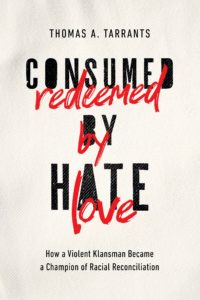 Consumed by Hate, Redeemed by Love: How a Violent Klansman Became a Champion of Racial Reconciliation Thomas A. Tarrants (Thomas Nelson) $24.99 I hope you recall our earlier comments about this as it is an edge-of-your-seat sort of page-turner, nominated for “best book” from the ECPA this year. (Those announcements will be made later this year.) We have had the pleasure of knowing Tom Tarrants and, to be honest, can hardly believe this vividly told story.
Consumed by Hate, Redeemed by Love: How a Violent Klansman Became a Champion of Racial Reconciliation Thomas A. Tarrants (Thomas Nelson) $24.99 I hope you recall our earlier comments about this as it is an edge-of-your-seat sort of page-turner, nominated for “best book” from the ECPA this year. (Those announcements will be made later this year.) We have had the pleasure of knowing Tom Tarrants and, to be honest, can hardly believe this vividly told story.
Consumed by Hate tells about Tom’s evil involvement, in the 1960s, with the KKK and worse. He went to jail for terrorism as he attempted to bomb the home of Jewish folks; his partner in crime died in the police shootout and he himself was very seriously wounded. The backstory of his ideological commitments – what today we might call the alt-right – is told plainly and one is still left pondering how someone gets to radicalized. Still the story moves on and the following chapters are even more dramatic!
Tarrants remarkably escaped from prison and was later apprehended (he was on the infamous FBI “Most Wanted” list.) While in prison (again) he became, slowly but surely, a transformed man, converted by Christ to the ways of the Lord Jesus. This is amazing stuff about amazing grace and left me in tears.
Through Prison Fellowship and other strategic leaders investing in him as a growing Christian prisoner, he was miraculously pardoned by the governor of the state and eventually released. Tom continued to study and minister to others as he took up the call to Christian ministry – co-pastoring a bi-racial, urban church, no less! Years later, the well-educated and utterly transformed Tarrants became the director of the C.S. Lewis Institute in Washington DC.
My prosaic and bare-bones outline doesn’t do justice to the suspense and power of this remarkable story as told in Consumed by Hate, Redeemed By Love. When authors as gifted as John Grisham rave about it, as he has, you know it’s good. This was one of those books I read this year almost in one long sitting – I couldn’t put it down! Thank God for the mercy of Jesus, and thank God for the conversion of this woefully misguided, truly awful person, redeemed and transformed by love. He has done good work in the subsequent years and it was hard for him to tell this story. We’re glad he did.
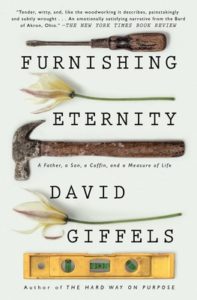 Furnishing Eternity: A Father, a Son, a Coffin, and a Measure of Life David Giffels (Scribner) $16.00 Again, I’m listing this as a 2019 release because it came out in paperback this year. I had written a bit about it last year because the topic was so striking, I loved the hardback cover, and the blurbs were extraordinary. I skimmed it and recommended it – obviously it was very well written and a curious topic.
Furnishing Eternity: A Father, a Son, a Coffin, and a Measure of Life David Giffels (Scribner) $16.00 Again, I’m listing this as a 2019 release because it came out in paperback this year. I had written a bit about it last year because the topic was so striking, I loved the hardback cover, and the blurbs were extraordinary. I skimmed it and recommended it – obviously it was very well written and a curious topic.
Now that I’ve read every word in earnest – many of the sections more than once! – I must say this is one of my favorite memoirs ever! What a book! It ranks up there with Lit, Cherry, Taste This Bread, Educated, Too Close to the Falls, and other such well written and fascinating memoirs. You may recall the story: the author is a young, edgy English teacher at a community college in Akron, Ohio and is also quite the diligent word-worker, inspired and apprenticed by his dad, a truly excellent craftsman. As he is grieving the loss of his mother, and the loss of a good friend, Giffels decided to build a coffin with and for his dad. This is the story of that year making that coffin.
It sounds a bit morbid, but it isn’t, really. The two are close, the family is extended, the poignant and wacky episodes worthy of some cross between some rustbelt version of This Is Us and Modern Family. Furnishing Eternity: A Father, a Son… is funny and sad and includes some rock and roll, and a lot about wood and sawdust. It is clever and whimsical and poignant and, indeed, about life and death, loss and love. I love the play on words in that last phrase of the subtitle, “the measure of a life.” As any woodworker knows, measuring figures into this story a lot.
As I’ve said, David Giffels is a rock music fanatic, so I really liked those portions, too. His rustbelt sensibilities and love for his own crummy town is pretty darn awesome to behold. I simply adored this book, realize what a great writer the author is, and I am sure I will read it yet again. I hope you do, too. Enjoy!
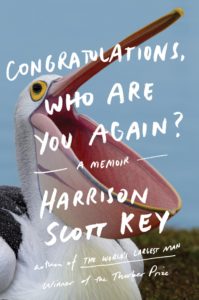 Congratulations, Who Are You Again? A Memoir and The World’s Largest Man: A Memoir Harrison Scott Key (Harper) $15.99 each Okay, these are not new books. But they are new to us, an author we never considered until a friend from down South named Jimbo told us about them. And I would say zooming through them were the most joyful, fabulous, fun-filled reading experiences of the year. I couldn’t stop giggling and guffawing and being astounded at the turn of a phrase or a miraculously remarkable sentence construction or the wildly odd storyline and character revelations of the self-deprecating author (that I so understood — embarrassing as it is to say so.) This was everything I wanted in a summer read – funny, honest, intelligent, a bit of cussing, much pathos, a little sex, ominous failure, sincere faith – he’s a Southern Presbyterian — and,
Congratulations, Who Are You Again? A Memoir and The World’s Largest Man: A Memoir Harrison Scott Key (Harper) $15.99 each Okay, these are not new books. But they are new to us, an author we never considered until a friend from down South named Jimbo told us about them. And I would say zooming through them were the most joyful, fabulous, fun-filled reading experiences of the year. I couldn’t stop giggling and guffawing and being astounded at the turn of a phrase or a miraculously remarkable sentence construction or the wildly odd storyline and character revelations of the self-deprecating author (that I so understood — embarrassing as it is to say so.) This was everything I wanted in a summer read – funny, honest, intelligent, a bit of cussing, much pathos, a little sex, ominous failure, sincere faith – he’s a Southern Presbyterian — and, 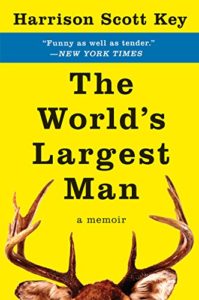 curiously, did I mention really, really funny? Kay has won the prestigious James Thurber Prize (for literary-style humor for egg-heads, I guess,) So there’s that.
curiously, did I mention really, really funny? Kay has won the prestigious James Thurber Prize (for literary-style humor for egg-heads, I guess,) So there’s that.
One can hardly say easily what these books are about, but here’s the quick version: in Congratulations the author ruminates on his life and his sense of calling to be a writer. He sets out to write a book, a good and famous and award winning, important book. (Why not?) He believes this is his God-given dream, a vocation and more. (He actually has some helpful stuff to teach us about all this, when one has a passion or a dream or a sense of call that borders on obsession.) Key is quite literate and smart and not too successful as he and his wife start a family in a hip Southern college town.
As it ends up – spoiler alert – the book he ends up writing is not the failed novel he intended but a memoir about his father, a legendary hunter and woodsman, a redneck sexist who didn’t seem to appreciate the sissified readin’ and writin’ of his youngest son who didn’t like to kill things and like to hug. There it is: Harrison Scott Key finally figures out what to write about, gets in done to some glowing reviews even if he fully blew the pre-interview with NPR’s Terry Gross. (Anyone who has hopes and dreams as an author has got to read this and will cringe through much of it. Trust me on this.) His cross country book tour was part Hunter Thompson, maybe, and not too successful and the writing about it was stunning. And some of what happens next? Well, again, you can’t make this stuff up.
And so, The World’s Largest Man is, in fact, that book that he tells about writing in Congratulations, Who Are You Again? It came out in 2015 and Keys was somewhat famous, for a bit, even if it never quite became the great American anything. I really enjoyed reading Congratulations first as he told so much about the process of dreaming up this sense of calling, becoming a writer, and finally landing on a memoir about growing up with his colorful (to say the least) hunter father. World’s Largest takes us deep into the woods and it isn’t always pleasant, although it’s funny as hell. What a story.
Here is what the publisher explains it; come on, read this:
Harrison Scott Key was born in Memphis, but he grew up in Mississippi, among pious Bible-reading women and men who either shot things or got women pregnant. At the center of his world was his larger-than-life father–a hunter, a fighter, a football coach, “a man better suited to living in a remote frontier wilderness of the nineteenth century than contemporary America, with all its progressive ideas and paved roads and lack of armed duels. He was a great man, and he taught me many things: how to fight and work and cheat, and how to pray to Jesus about it, how to kill things with guns and knives and, if necessary, with hammers.”
Harrison, with his love of books and excessive interest in hugging, couldn’t have been less like Pop, and when it became clear that he was not able to kill anything very well or otherwise make his father happy, he resolved to become everything his father was not: an actor, a Presbyterian, and a doctor of philosophy. But when it was time to settle down and start a family of his own, Harrison started to view his father in a new light and realized–for better and for worse–just how much he was like the strange man who made him.
Neither Beth nor I can conclude surely which to read first nor can we conclude which we liked better. Buy ‘em both, read ‘em both.
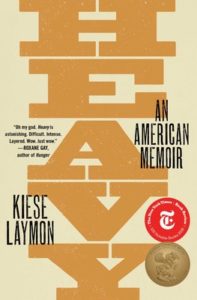 Heavy: An American Memoir Kiese Laymon (Scribner) $16.00 This is a book that blew me away and although I read it in hardcover,and gave it a shout-out here at BookNotes before, the paperback recently came out, so it is now less costly. It is a book you should know about — it won the Andrew Carnegie Medal and was a Kirkus finalist, so has been widely lauded. Still, it is not for everyone and many traditionally conservative Christian readers will be put off by the barrage of foul language. Christian faith is actually a part of this story, as it often is for people of color in the deep south, it seems. That is, Laymon is not the militant atheist that Ta-Nehisi Coates is. But, like Coates, he was abused within his family and scorned by the mainstream white culture. And like Coates, he can name these tragedies and writes like a dream.
Heavy: An American Memoir Kiese Laymon (Scribner) $16.00 This is a book that blew me away and although I read it in hardcover,and gave it a shout-out here at BookNotes before, the paperback recently came out, so it is now less costly. It is a book you should know about — it won the Andrew Carnegie Medal and was a Kirkus finalist, so has been widely lauded. Still, it is not for everyone and many traditionally conservative Christian readers will be put off by the barrage of foul language. Christian faith is actually a part of this story, as it often is for people of color in the deep south, it seems. That is, Laymon is not the militant atheist that Ta-Nehisi Coates is. But, like Coates, he was abused within his family and scorned by the mainstream white culture. And like Coates, he can name these tragedies and writes like a dream.
Perhaps I shouldn’t draw those mental connections; Heavy is not the same kind of story (or the same sort of writing) as Mr. Coates’ elegant memoirs, The Beautiful Struggle and Between the World and Me. But it is a very passionate, gritty memoir set firmly in the black culture (including poverty and racism and obsessions with race and status.) It focuses most poignantly on the author’s body, his sexuality and longings, his obsession with weight and weight loss. It includes a lot about his mother, his southern mother. It isn’t a conventional “rags to riches” story, although Kiese Laymon does move North and eventually gets a job as a college professor. Now he is back in Mississippi, speaking as a very contemporary black feminist writer in the land of Faulkner.
The review in O, The Oprah Magazine called it “raw” and “cathartic” and likened it to Pittsburgh’s John Edgar Wideman as Laymon “defiantly exposes the ‘aches and changes’ of growing up black.” The book was captivating for me (and I have read a fair number of memoirs by people of color) and stands out as one I will think about for a long time to come. Any of us who want to understand black families, the hardship faced including hardship from the police. His mother is intellectual and violent (like Coates’s Baltimore father) and he tells much about his parents, about broken families, about sexuality, about youth, about depression. It is a major and very vulnerable story about being a writer, about telling the truth and about being black in America.
As Roxanne Gay writes about it,
Oh my god. Heavy is astonishing. Difficult. Intense. Layered. Wow. Just wow.
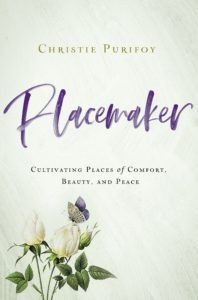 Placemaker: Cultivating Places of Comfort, Beauty, and Peace Christie Purifoy (Zondervan) $18.99 I keep coming back to this, dipping in, thinking about it, looking for a passage I liked or that was so well written, that I surely have to names this as one of our favorite reads of the year. Further, as we said when I announced this last summer, it was (as I put it at BookNotes) “one of the great joys of recent months to have gotten the chance to finally meet Pennsylvania author Christie Purifoy, a memoirist and essayist of the finest quality, who can turn a phrase like nobody’s business.” We were with her at the lovely book launch party in Lancaster of our mutual friend Shawn Smucker, a novelist of some note.
Placemaker: Cultivating Places of Comfort, Beauty, and Peace Christie Purifoy (Zondervan) $18.99 I keep coming back to this, dipping in, thinking about it, looking for a passage I liked or that was so well written, that I surely have to names this as one of our favorite reads of the year. Further, as we said when I announced this last summer, it was (as I put it at BookNotes) “one of the great joys of recent months to have gotten the chance to finally meet Pennsylvania author Christie Purifoy, a memoirist and essayist of the finest quality, who can turn a phrase like nobody’s business.” We were with her at the lovely book launch party in Lancaster of our mutual friend Shawn Smucker, a novelist of some note.
We want to honor this distinguished book and figure I should just share what I wrote at BookNotes before. You should buy this book and spread the word — it’s surely a Best Book of 2019.
A few years ago Christie Purifoy wrote a lovely book about her spacious, old farmhouse “in four seasons” (Roots & Sky: A Journey Home in Four Seasons) and it was quite good. But this Placemaker book is extraordinary, delightful, compelling, enjoyable on many levels. The other evening at a book event she read movingly from a section about fermentation (you know, sauerkraut, kombucha, making pickles, even.) The Earth’s processes of death and decay, entropy, chaos and the like became a window for reflecting on our desires for control, for reigning in the chaos. She frets about these things as we do, but she also tends orchards and writes glowingly about trees. Creation and Fall and Redemption swirl together in her gorgeous reflective prose and a book about place becomes a vision for living into God’s healing ways, on Earth as it is in Heaven.
Beth and I can’t say enough about our new friend Christie and her husband; we are eager to encourage you to buy this very handsomely made book — it has deckled pages, French folded covers, a slightly textured paperback cover with some tactile beauty — and to enjoy her reflections on home and gardening and beauty and life. Even amidst the ruins. What a book! The author has dirt under her fingernails, by the way. Oh, and a PhD in literature from the University of Chicago.
Kudos to Christie for working her craft and writing this lovely volume and to Zondervan for publishing it with beauty and charm. Cheers!
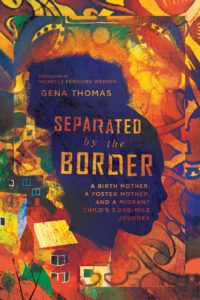 Separated by the Border: A Birth Mother, a Foster Mother, and a Migrant Child’s 3,000-Mile Journey Gena Thomas (IVP) $16.00 I cannot quite put my finger on all that moved me about this memoir although the awful policies of the Trump administration – children in cages, children deported without parents and parents deported without their babies and on and on – was in the air as I was reading this. That the publisher saw the urgency of this narrative and wanted to put a human face on it all is a major contribution. This book, I believe, should be in every bookstore and library in the country as it is just so very, very timely. And as harrowing as it may be, it’s a great read, a moving tale, a stunning and audacious journey that shows, at least, as the publisher reminds us in the description, “the power of motherly love.”
Separated by the Border: A Birth Mother, a Foster Mother, and a Migrant Child’s 3,000-Mile Journey Gena Thomas (IVP) $16.00 I cannot quite put my finger on all that moved me about this memoir although the awful policies of the Trump administration – children in cages, children deported without parents and parents deported without their babies and on and on – was in the air as I was reading this. That the publisher saw the urgency of this narrative and wanted to put a human face on it all is a major contribution. This book, I believe, should be in every bookstore and library in the country as it is just so very, very timely. And as harrowing as it may be, it’s a great read, a moving tale, a stunning and audacious journey that shows, at least, as the publisher reminds us in the description, “the power of motherly love.”
Here is the basic explanation of the remarkable story:
Thomas tells the story of five-year-old Julia, whose harrowing journey with her mother from Honduras to the U.S. took her from cargo trailer to detention center to foster care. Weaving together the stories of birth mother and foster mother, this work shows the human face of the immigrant and refugee, the challenges of the immigration and foster care systems, and the tenacious power of motherly love.
There is more to this book that an expose of the “challenges” of the immigration system, as it does explore the need for foster care parenting, and the blessings and struggles of offering one’s love for others in this poignant and sometimes painful way. And it shows how this author risked so much to re-united the separated mother and child. Oh my, what a holy adventure! What a story!
I think you can see why I found this story so compelling and wanted to name it here among the Best Books of 2019 when you read these endorsements written by authors I trust:
“Welcoming strangers is dangerous. All sorts of things might happen: it might radically alter your understanding of the world, change your politics, or your relationships. It will certainly affect your relationship with God. Gena Thomas’s book is testament to the wonderfully transforming power of hospitality. I recommend her story to you as a daring and dangerous read.”–Krish Kandiah, founding director of Home for Good, author of God Is Stranger
“When headlines and public policy debates filter down to the story of one mother, one child, and one US citizen willing to walk through the process, our focus changes from the macro to the micro. A story of grief, pain, politics, faith, endurance, laughter, separation, and reunification, this steps us out of the policy debate and into the individual experience. I wholeheartedly recommend Gena Thomas as a voice that has walked through real, sacrificial relationships using her Christian faith as a guide for each step of the process. If we want to understand how the policies and politics of the immigration debate impact real people, this is the place to start. This is a humanizing story that takes us beyond the talking points.”–Alexandra Kuykendall, author of Loving My Actual Neighbor, cofounder of The Open Door Sisterhood
“I adore this book! It is a shattering read about the journey asylum seekers take to reach our border only to have their children taken from them. Thomas’s book details the living hell Lupe, Julia, and Carlos experienced and how her family became part of the story. It rips out our stony hearts, giving us the opportunity to receive the fleshy heart of Jesus, the opportunity to receive grace. We endanger our souls and imperil the soul of our nation if we dare ignore this masterfully written account, the plight of immigrants, and our responsibility in all of it.”–Marlena Graves, author of A Beautiful Disaster
As Ali Noorani, executive director of the National Immigration Forum, author of There Goes the Neighborhood, says of Separated by the Border,
In one powerful book Gena Thomas shares the trauma, hope, and love that is the migration of men, women, and children in today’s world. Wrapped around her own experience as a foster parent, Thomas helps us understand why one flees their home country, even though they want to return. It is truly a remarkable book.”
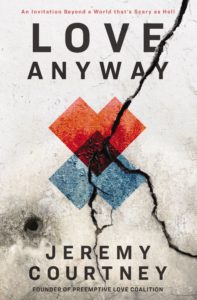 Love Anyway: A Journey from Hope to Despair and Back in a World That’s Scary as Hell Jeremy Courtney (Thomas Nelson) $17.00 This was one of the most eagerly anticipated books for those of us who loved his stellar Preemptive Love about doing medical missions with children among Muslims, Jews and Christians in war-torn Iraq. Jeremy has many followers and friends and many of us were eager to read this one.
Love Anyway: A Journey from Hope to Despair and Back in a World That’s Scary as Hell Jeremy Courtney (Thomas Nelson) $17.00 This was one of the most eagerly anticipated books for those of us who loved his stellar Preemptive Love about doing medical missions with children among Muslims, Jews and Christians in war-torn Iraq. Jeremy has many followers and friends and many of us were eager to read this one.
As you may know if you know that first unforgettable book (Preemptive Love) his non-profit organization Preemptive Love did pediatric heart surgeries in Iraq which has the largest amount of children born with defective hearts anywhere in the world, most likely from the nuclear tipped, uranium-enhanced weapons the United States used in the first Gulf War.
How did this Christian NGO helping the impoverished turn into a medical mission that drew in interfaith coalitions and became a cross-cultural project of reconciliation—dare I say, a post-9-11, Middle Eastern, anti-war movement – in this dangerous part of the world? Some of that is documented in Preemptive Love but the fuller backstory is now explained in riveting storytelling in Love Anyway. You can read my review HERE and perhaps you’ll see why I found this telling of Jeremy’s brave work to be so compelling. As I explain, Love Anyway is a harrowing story about Jeremy and his wife’s deepening their belief in the power of love and understanding and how this lead them to different sorts of networks and ministries from Iraq to Syria. It gets hard, the writing is tense, the story powerfully told. It is one of the few books this year that I read straight through hardly without a break; what a page-turner! You should read it.
There’s lots of good stuff on the internets about this organization and a good short film that came out about the time of the book. Maybe you could have a book group and do a fundraiser. I can hardly think of a more urgent need.
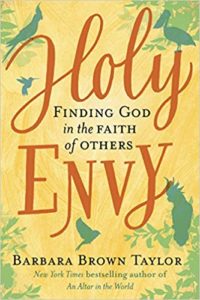 Holy Envy: Finding God in the Faith of Others Barbara Brown Taylor (HarperOne) $25.99 Some may not think of Barbara Brown Taylors story about teaching world religions as a memoir. It isn’t her whole life story, but like her other marvelously written, crisp, honest volumes of wonderful prose, she is – although weighing in on questions of the role of faith and convictions and believe and world religions – mostly telling here of her time as a teacher. If she has written about her calling into the ministry (The Preaching Life) and her sense of frustration and a pained exit from parish work (Leaving Church: A Memoir of Faith) this is the first major book where she describes her second calling, that of a college professor. It is, as Mirabai Starr say, “Among the finest memoirs I have ever read of the life of a teacher.”
Holy Envy: Finding God in the Faith of Others Barbara Brown Taylor (HarperOne) $25.99 Some may not think of Barbara Brown Taylors story about teaching world religions as a memoir. It isn’t her whole life story, but like her other marvelously written, crisp, honest volumes of wonderful prose, she is – although weighing in on questions of the role of faith and convictions and believe and world religions – mostly telling here of her time as a teacher. If she has written about her calling into the ministry (The Preaching Life) and her sense of frustration and a pained exit from parish work (Leaving Church: A Memoir of Faith) this is the first major book where she describes her second calling, that of a college professor. It is, as Mirabai Starr say, “Among the finest memoirs I have ever read of the life of a teacher.”
Yes, Barbara Brown Taylor is a fairly open-minded, typical Episcopalian priest, nurtured in the deep ways of the Anglican sacramental worldview and of the convictions of the Book of Common Prayer and the revolutions of liberal theology in the middle of the 20th century when she was coming of age. It isn’t surprising that she is drawn to the mysteries of world religions and that she has come to be passionate about teaching, as a liberal Christian, the joys of learning about other faiths. At the heart of her teaching is not cheap knowledge about other faiths and certainly not cheap spiritual appropriation, but fostering “holy envy” (a phrase she swiped from a Lutheran Bishop in Sweden who said it is healthy to admire and even envy certain virtues of other faiths. This seems common sense to me, and nothing unorthodox. Of course we admire the Buddhists attentiveness or radical Muslim’s or Hasidic Jews dedication to their sacred food and prayer regimes. I’m nowhere near Amish, but surely there is good to be found in their expression of faith, right? There is nothing wrong with Protestants admiring the sense of mystery nearly unnamed in higher church Catholics and nothing wrong with liberal UCC folk admiring the warm-hearted piety of old school Methodists. We needn’t compare truth claims or adopt a cheesy universalism to truly admire and learn from other faiths. Okay?
But, oh my, how to do that, wisely and tenderly and fruitfully? And how does one do that when, as is the case in Ms Taylor’s situation, the students are mostly Southern Bible-belt fundamentalists.
I will never forget the scene in which Barbara has taken her college students to a (respectful, demur) visit to a worship experience of a non-Christian religion. One of the students, an earnest, traditional fundamentalist Christian, has to leave the room and she departs deeply weeping for the lost souls she is watching as they worship their false gods. How does Ms Taylor respond? As a good pastor and as a good teacher, I believe. The book is loaded with these remarkable moments.
The review journal Booklist gave Holy Envy a starred review, saying:
Taylor nudges her students away from spiritual appropriation and comparison, moving instead toward challenging discernment of their own faith and the faith of others. Taylor, like the best faith leaders, is a great storyteller. Highly recommended.
I reviewed this at BookNotes when it first came out and I have thought about it all year. She is a gorgeous writer and I’d read anything she wrote and even though my own faith convictions might be different than hers, I admire her writing and so, so appreciate her journey.
Here is some of what the publisher has written in describing it; I hope you can see why I call it one of my favorite books of the year:
Barbara Brown Taylor continues her spiritual journey begun in Leaving Church of finding out what the world looks like after taking off her clergy collar. In Holy Envy, she contemplates the myriad ways other people and traditions encounter the Transcendent, both by digging deeper into those traditions herself and by seeing them through her students’ eyes as she sets off with them on field trips to monasteries, temples, and mosques.
Troubled and inspired by what she learns, Taylor returns to her own tradition for guidance, finding new meaning in old teachings that have too often been used to exclude religious strangers instead of embracing the divine challenges they present. Re-imagining some central stories from the religion she knows best, she takes heart in how often God chooses outsiders to teach insiders how out-of-bounds God really is.
Throughout Holy Envy, Taylor weaves together stories from the classroom with reflections on how her own spiritual journey has been complicated and renewed by connecting with people of other traditions–even those whose truths are quite different from hers. The one constant in her odyssey is the sense that God is the one calling her to disown her version of God–a change that ultimately enriches her faith in other human beings and in God.
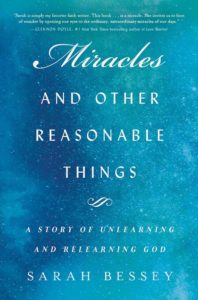 Miracles and Other Reasonable Things: A Story Of Unlearning and Relarning God Sarah Bessey (Howard Books) $26.00 When customers, friends, and the back cover blurbs align in insisting a book is one of the best ever, it is a must for me to review. Miracles… claims to be quite a story and yet I put off getting to it, thinking I’d like it, but it wouldn’t be extraordinary.
Miracles and Other Reasonable Things: A Story Of Unlearning and Relarning God Sarah Bessey (Howard Books) $26.00 When customers, friends, and the back cover blurbs align in insisting a book is one of the best ever, it is a must for me to review. Miracles… claims to be quite a story and yet I put off getting to it, thinking I’d like it, but it wouldn’t be extraordinary.
Granted, we love her first lively book Jesus Feminist (although nothing new, we’ve been selling books about evangelical feminism since we opened in the early 1980s) and I really appreciated Bessey’s first memoir, Out of Sorts: Making Peace with an Evolving Faith about her own changing faith (not unlike, say, the story of her dear friend, the late Rachel Held Evans) as she narrates her journey out of the Word of Faith Pentecostal faith of her girlhood. Nearly everyone’s faith shifts and matures, deepens or softens, but her journey was particularly striking (she’s a great writer and, well, she really was in some super strict, bodaciously unconventional stuff, at least for most Christians, making her shift particularly dramatic.) Making room for change and doubt and open-mindedness is a big deal for some traditions so Sarah blogs and speaks and writes about this stuff at no little cost to her, I’m sure. We are grateful for her candor and grace.
These writers doing books about being raised in shaming, strict, and sensationally religious families who are now being set free to be more normal and balanced in their expression of faith, allowing doubt and honesty, reasonable worship and non-fanatical public opinions, is quite the genre these days. I like them, really, even if that isn’t exactly my own experience. It’s close enough, though, to resonate. Out of Sorts really is a fine phrase to describe how many of us describe our religious sense these days, eh?
And so, Miracles and Other Things is plowing that same field again. She starts off with a preface so earnest about taking our hands and loving us as readers, carrying our own stories with her as she does her work. I get it – she is a beloved public speaker and she gets emails and letters and people stay late into the night at conferences saying (among other things) You too? She connects, truly connects, with so many (often disenfranchised) mostly young woman of faith and she invites them to rise up. It sounds a bit breathy – and for those who don’t have this experience of being excluded or misunderstood, her earnestness may impress or maybe just annoy a bit. But she is a rock star, with the book endorsed by the usual cast of characters such as good writers like Jen Hatmaker, Shauna Niequist, Glennon Doyle, and others on a journey away from fundamentalism like Mike McHargue and Peter Enns and Jonathan Martin, who calls it a “trail blazing, bush-burning book.” Happily, mainline denomination folks rave, too – Kate Bowler (of Duke, and the must-read, best-seller Everything Happens for a Reason and Other Lies I Believed) and yep, Barbara Brown Taylor.
Barbara Brown Taylor writes,
“Sarah Bessey is a writer of remarkable gifts. Beyond her ability to make a breath-taking sentence, and to tell the truth about the dying and rising of faith, she can tell a story as if she is whispering it straight into your heart. She is, by her own definition, a dangerous woman, with wisdom to spare about learning to love the broken miracles God offers us once we’re honest about where it hurts.”–Barbara Brown Taylor, author of Learning to Walk in the Dark
So there you have it: Saint Barbara BT herself affirms what any of us who have read Bessey already knows. She’s a great writer and an honest, important leader.
But wait: we thought she had left her Pentecostal Word of Faith stuff. What’s this about miracles?
You see, this is not the book that Sarah intended to write. She tells us that she pounded out another huge manuscript, amidst grief from miscarriages and then several births, and a hard, hard labor and a dad that was dying, and that book was not what she finally wanted to write. What she did was tell this much more honest story. It is a story of her evolving faith, and – this is harrowing, to say the least – an awful car accident that nearly killed her, causing immense pain and chronic issues that got worse as the months of recovery wore on.
She writes honestly about this and I am sure those of us who have been in serious accidents (I have) or who have had loved ones in serious accidents (we have) will be deeply moved by her story and the pain of her recovery. But even as she can hardly walk, get this: she gets a bone fide invitation to be on a team of charismatic Christians (old friends) to celebrate a Jubilee with the Pope.
As a woman whose family economic status is such that she hardly even dreams of international travel, let alone a trip to Rome, she is both ecstatic and, understandably, unsure. Although pleasantly ecumenical, she has deep principles that oppose the patriarchy and hierarchy and abuses of the Catholic Church. (She wrote a book called Jesus Feminist, she wonders if they recall!) Like many of us who long for a greater congeniality within the Body of Christ, she mourns that they have a closed communion table and she could attend as a guest of honor but still be barred and banned from receiving the sacraments. And, more bluntly, she is not sure she can make the trip – once-in-a-lifetime gift that it is – due to her physical disabilities.
I will not tell you the rest, but know that this story of pain and loss and travel and mission and ministry and love and family is truly miraculous. It is a wonderfully fun read, compelling, engaging, well written, and inspiring. One doesn’t have to have her same experiences to find the book pulling you in as you yourself experience the Spirit as she herself does.
As Shauna Niequist says in the preface, Miracles and Other Reasonable Things is:
A grown-up, clear-eyed story of faith, told with so much soul and laughter and grit and elegance and plainspoken truth that it leaps off the page, straight into your heart. What a gift.
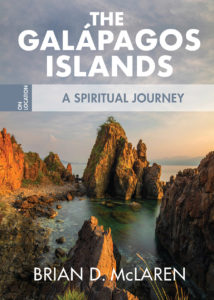 The Galapagos Islands: A Spiritual Journey Brian D. McLaren (Fortress Press) $16.99 I was thrilled the minute I heard about this marvelous idea, a new series of faith-based travelogues called “On Location” kicked off by the very fine writer Brian McLaren. Those that follow Brian know that he wrote a set of novels (now recently re-issued by Fortress, by the way) in which Darwin’s work and a visit to Galapagos figures into the story. McLaren loves the outdoors, loves his reptiles and tortoises, so, yep, he’s the man for this job. And what a good, good job he did.
The Galapagos Islands: A Spiritual Journey Brian D. McLaren (Fortress Press) $16.99 I was thrilled the minute I heard about this marvelous idea, a new series of faith-based travelogues called “On Location” kicked off by the very fine writer Brian McLaren. Those that follow Brian know that he wrote a set of novels (now recently re-issued by Fortress, by the way) in which Darwin’s work and a visit to Galapagos figures into the story. McLaren loves the outdoors, loves his reptiles and tortoises, so, yep, he’s the man for this job. And what a good, good job he did.
I am sure I will never travel to South American, let alone to these Ecuadorian islands, but I do love travel books. Memoirs about adventures are a way to live those adventures and when a writer is bringing spiritual and theological insight along the way, what joy. That this is a spiritual pilgrimage, in many way, to one of the world’s most known and fragile ecosystems is itself a great gift and, yet, is fraught with concern.
I enjoyed this compact paperback and even though I’ve met Brian several times and consider him an acquaintance, I felt like I got to know him better. He writes about his son’s cancer just a bit, he is frustrated when he misses cell-phone connection to talk with his wife, and he reports on some talks he gave after he came home, talks that sounded truly interesting and important. I really liked catching up with him, even if it was when he was far, far away, keeping a diary for us all to enjoy.
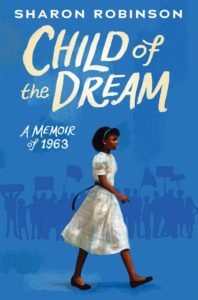 Child of the Dream: A Memoir of 1963 Sharon Robinson (Scholastic Press) $16.99 I read fewer YA novels this year than I sometimes do (and when I think of so many good ones, I wonder what I was thinking!) I want to sneak this one in here, which I read at the start of the new year, as an exceptionally strong, truly notable book of 2019. Although written as a youth book, many, many of us will enjoy it. Sharon Robinson turned 13 the night beforeGeorge Wallace declared on national television ‘segregation now, segregation tomorrow, segregation forever’ in his inauguration for governor of Alabama. Can you imagine? This book will help as it is written from the viewpoint of a child. I highly recommend it.
Child of the Dream: A Memoir of 1963 Sharon Robinson (Scholastic Press) $16.99 I read fewer YA novels this year than I sometimes do (and when I think of so many good ones, I wonder what I was thinking!) I want to sneak this one in here, which I read at the start of the new year, as an exceptionally strong, truly notable book of 2019. Although written as a youth book, many, many of us will enjoy it. Sharon Robinson turned 13 the night beforeGeorge Wallace declared on national television ‘segregation now, segregation tomorrow, segregation forever’ in his inauguration for governor of Alabama. Can you imagine? This book will help as it is written from the viewpoint of a child. I highly recommend it.
Child of the Dream is, obviously, a story of a young woman and her coming of age in 1963, a remarkable year by any account. The book is heart-warming but honest, vivid, even, and, as Andrea Davis Pinkney (of Martin Rising: Requiem for a King) wrote about it: it is a “deeply personal portrait of her childhood during one of the most pivotal moments in America’s history.” Pinkney continues, “She lets us walk in her shoes so that together we experience how it feels to see a dream on the horizon — and to reach for it.”
Do you realize who Sharon Robinson is? She is the daughter of famous baseball play, number 42 himself, Jackie Robinson. It’s why Jason Reynolds writes that this book tells of her own understanding of her place in the fight for civil rights. Reynolds says “This is a home run, not just for her, but for us all.” Exactly!
Listen to Christopher Paul Curtis (Newbery Award-winning author of the National Book Award finalist, The Journey of Little Charlie, who has this delightful, fabulous endorsement:
Sharon Robinson has pulled off an impressive trifecta: She has given us priceless, behind-the-scenes access to perhaps the most tumultuous year in modern American history; she has written a touching, compelling, coming-of-age story; and she tops the whole enterprise off with a tribute to her upbringing by an exceptional pair of African Americans, her parents, Rachel and Jackie Robinson.
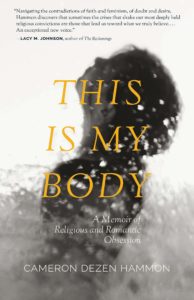 This is My Body: A Memoir of Religious and Romantic Obsession Cameron Dezen Hammon (Lookout Books) $17.95 A friend who knows this author alerted me to this book before it came out and when if finally was released I knew I had to take the recommendation of my writer friend seriously; she is creative and thoughtful and she assured me I’d be captivated by the prose and the stunning story. Indeed, I was mesmerized by the first page, drawn in to a gripping story about, well, as the subtitle says, religious and romantic obsession. What up-front worship leader is having sexy texts from a lover in the middle of a set? What church leader entertains sorrow and doubts and regrets and anger has no place to share them? What evangelical Christian working for mega-churches and hipster outreaches finds her very body assaulted even as she is attempting to serve them by playing Godly, passionate music?
This is My Body: A Memoir of Religious and Romantic Obsession Cameron Dezen Hammon (Lookout Books) $17.95 A friend who knows this author alerted me to this book before it came out and when if finally was released I knew I had to take the recommendation of my writer friend seriously; she is creative and thoughtful and she assured me I’d be captivated by the prose and the stunning story. Indeed, I was mesmerized by the first page, drawn in to a gripping story about, well, as the subtitle says, religious and romantic obsession. What up-front worship leader is having sexy texts from a lover in the middle of a set? What church leader entertains sorrow and doubts and regrets and anger has no place to share them? What evangelical Christian working for mega-churches and hipster outreaches finds her very body assaulted even as she is attempting to serve them by playing Godly, passionate music?
Apparently – it breaks my heart to say this – Cameron Dezen Hammon is not the only one who has experienced distress and sexism, religious confusion and artistic and theological difficulties within the leadership of modern evangelicalism. (See my review a week or so ago of The#MeToo Reckoning by Ruth Everhart for a study of mostly mainline Protestant congregations to be reminded of the pervasive cover-ups of sexual misbehaviors within faith communities.) Ms. Hammon does not name the (famous?) pastors of the well-known “gospel-centered” churches in which she experienced gross patriarchy and serious injustice, but it doesn’t matter; we can imagine.
Still, this memoir is not all expose and lament. It is, as the foreword says, “a valuable look at the social structures of evangelical Christianity” but it is also about the author’s own deep desire for God, for connection. While not a typical spiritual memoir, it truly is just that. Ms. Hammon, like nearly every mystic in church history, sees some convergence between romantic love and religious faith, between sexuality and spirituality. Desire? Ecstasy? Love? Belonging? Are we seeking romance and intimacy and home, or faith and forgiveness and heaven? Or both. Maybe faith indeed leads us home, into authentic community and real love, here on Earth. Perhaps grace offers eternal things that show up in the mundane. If so, Ms Hammon is a seeker for that reality, and her beautiful raw story will be a guide for many. This is My Body: A Memoir of Religious and Romantic Obsession made me sad but it one of the most memorable, striking reads this year.
I find it hard to say just how deeply this good writing moved me, how curious I was and how engaged as a reader; I suspect not everyone will be as generous or caring as I was; it is not for everyone. Jessica Wilbanks (memoirist and author of When I Spoke In Tongues) says of This Is My Body that it is “Unflinchingly honest and searingly lyrical.” She is right – it is “a song of a book.”
Cameron Hammon’s own conversion story from a New York Jew-ish punker is compelling and will resonate with any who came to a lively faith within a para-church organization or house church situation. Her struggle as a musician and artist will resonate with many who feel like the church has not used their gifts well. Anyone who has left upbeat evangelical or Pentecostal faith to find a more nuanced spirituality will understand the mixed feelings of her journey. This memoir will be important to many, an edgy and artful telling of a story that many others are writing these day. It is, in my view, one of the more remarkable and startling examples of these kinds of faith deconstructions and journeys out of popular evangelicalism.
And yet, through all of this, one of the biggest aspects of the story of This is My Body is the marriage one, the romantic longings and her relationship with her husband. How does one evolve spiritually and religiously (especially when one’s work and paycheck are dependent on the church) when one is married? How does one grow or change as an individual when one’s spouse is on his own faith journey? How does one think about sexuality and intimacy in marriage when talking about spiritual intimacy and singing about Love is how one makes one’s living? How does a shift away from fundamentalism towards doubting faith and re-embracing feminism effect a marriage? That is a major part of this tale. Remember, the book is called This Is My Body.
Lacy Johnson (author of an award winning collection of essays called The Reckonings and a previous, harrowing memoir of her own abuse by a boyfriend) says:
There is a deep and insatiable longing at the center of Cameron Dezen Hannon’s spellbinding debut memoir: to love and be loved with honesty and abandon, to follow a spiritual path toward clarity and truth.
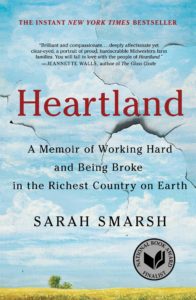 Heartland: A Memoir of Working Hard and Being Broke in the Richest Country on Earth Sarah Smarsh (Scribner) $17.00 This was another book that just came out in paperback that I read earlier this year in hardback. It was, interestingly, one of the “One Community Reads” selections this fall for many towns here in central PA. One recent customer understandably connected it to Hillbilly Elegy and Nickel and Dimed. Smarsh is a gifted writer and amazing storyteller – and what a story she has to tell of her extended family in the heartland. Set among poor, rural folk in Kansas, she tells of parents and grandparents, using a device that some find endearing: the book is an extended letter to her unborn child. In the hands of a lesser writer it might have been smarmy or sentimental, but this telling is full of regret and longing and pride and chutzpah; she does come from colorful, sturdy, resilient, if at times troubled stock.
Heartland: A Memoir of Working Hard and Being Broke in the Richest Country on Earth Sarah Smarsh (Scribner) $17.00 This was another book that just came out in paperback that I read earlier this year in hardback. It was, interestingly, one of the “One Community Reads” selections this fall for many towns here in central PA. One recent customer understandably connected it to Hillbilly Elegy and Nickel and Dimed. Smarsh is a gifted writer and amazing storyteller – and what a story she has to tell of her extended family in the heartland. Set among poor, rural folk in Kansas, she tells of parents and grandparents, using a device that some find endearing: the book is an extended letter to her unborn child. In the hands of a lesser writer it might have been smarmy or sentimental, but this telling is full of regret and longing and pride and chutzpah; she does come from colorful, sturdy, resilient, if at times troubled stock.
Ms. Smarsh can be wickedly funny and tender but I see her also as a biting social critic. She is relentless in talking – appropriately and insightfully – about wealth and privilege and power and poverty. This isn’t a “pull yourself up by your own bootstraps” sort of story a la Hillbilly Elegy; it is, perhaps, closer to Nickel and Dimed with its critique of the culture’s misunderstandings of the working poor – especially farmers, ranchers, the rural mid-Westerners who work hard under hot sun and freezing cold, usually white, too often poor. There’s a bit about agriculture policy and big business although she’s not quite a Wendell Berry agrarian.
For what it’s worth, the parts of her story about going to college as a not very cultured or even well-educated farm girl – her elementary school and school days are unbelievable! – is very, very telling. Any BookNotes readers who work in higher education ought to be aware of the huge gaps and obstacles facing many rural and small town first-generation collegiates; this story could help you understand this sort of privation. Read Heartland: Working Hard and Being Broke in the Richest County on Earth
In so many ways, for so many reasons, this well written tale was one of my favorite books of 2019.
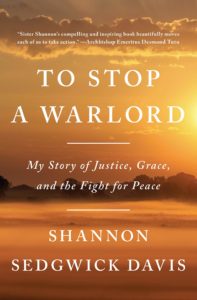 To Stop a Warlord: My Story of Justice, Grace, and the Fight for Peace Shannon Sedgwick Davis (Spiegel & Grau) $27.00 You may recall this publishers name as they are the wonderful imprint that brought Just Mercy to the world, the book by Bryan Stevenson. (If you haven’t read that Award Winner, you simply must!) So I’ve been wanting to publically acknowledge them for their cutting edge work and for bringing yet another intriguing, well-written, and honorable book about social change to the literary reading public. We are honored to get to carry books like this and we are delighted to honorably mention it here and now.
To Stop a Warlord: My Story of Justice, Grace, and the Fight for Peace Shannon Sedgwick Davis (Spiegel & Grau) $27.00 You may recall this publishers name as they are the wonderful imprint that brought Just Mercy to the world, the book by Bryan Stevenson. (If you haven’t read that Award Winner, you simply must!) So I’ve been wanting to publically acknowledge them for their cutting edge work and for bringing yet another intriguing, well-written, and honorable book about social change to the literary reading public. We are honored to get to carry books like this and we are delighted to honorably mention it here and now.
Alas, I’m not sure what to think about this amazing memoir. It is the story of a woman, a mom and a lawyer, who, as I’ve said at BookNotes before, was a leader in an NGO doing good charitable work in Africa. She is a person of action, a person motivated by faith, a Christian worker in hard places who has worked with our friends at International Justice Mission (IJM.) She is now the CEO of Bridgeway Foundation which is “dedicated to stopping mass atrocities.” She is an Advisory Council member of The Elders, the group of global statesman founded by Nelson Mandela. You could profitable read any account of her efforts and be challenged and stimulated.
But this? Oh my. Here’s the gist – just read what Adam Grant (author of Orginals and Give and Take, that we also recommend, btw) wrote in then New York Times review.
How far would you go to stop a murderous Ugandan warlord who had turned thousands of children into soldiers? As the head of a human rights foundation, Shannon Sedgwick Davis did something unprecedented: She hired private military contractors to train an army to stop him. This is an extraordinary memoir by an extraordinary leader–it’s impossible to read without feeling moved to do more to help those with less.
Okay, do I need to say more? She “hired private military contractors to train an army” to stop the evil Ugandan warlord. Jospeh Kony.
You can’t make this stuff up. To Stop a Warlord is wonderfully written and well paced so is one of those books you can hardly put down. It is driven by deep compassion, I think, and what Blake Mycoskie (her friend from Toms Shoes) calls her “relentless determination, motherly protective instinct, and steadfast courage.”
Look: To Stop a Warlord has rave reviews and lovely endorsements on the back from Betty Bigombe (and leader at the World Bank who was the chief mediator in peace negotiations with the Lord’s Resistance Army in the late ‘90s and into the early 2000s) as well as from the U.S. Coordinator for Counterterrorism, Ambassador Henry Crumpton. Former President Jimmy Carter offers his endorsement calling is a “remarkable” book. Archbishop Desmond Tutu says it is “compelling and inspiring.”
Will this help us all, as these endorsements all say, beautifully move us all to take action for the vulnerable? Most of us aren’t on philanthropic boards and few of us have any clue about these sorts of global details. But, whew, this is unprecedented work, and “an unforgettable journey on an unexpected path to peace.”
It is without a doubt one of the most memorable books of 2019.
THREE WONDERFUL EXAMPLES OF A BIGGER or BETTER FRAMEWORK FOR THE GENRE OF BASIC CHRISTIAN LIVING
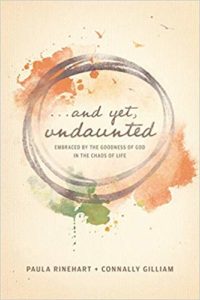 …And Yet, Undaunted: Embraced by the Goodness of God in the Chaos of Life Paula Rinehart & Connally Gilliam (NavPress) $15.99 This was one of my favorite books this year in part because of the fine wisdom and down to Earth sisterly sort of advice these women offer. Paula Rinehart has been speaking and writing on woman’s issues for decades and we have stocked other books of hers over the years. We always felt they were just a cut above some of the other sort of standard fare advice and inspiration for the religious marketplace. Connally Gilliam is younger and also works in outreach and disciple-making with the para-church group, The Navigators. She is know for what I’m told is an excellent book for those that read books in the field of being an unmarried Christian woman. That is called Revelation of a Single Woman: Loving the Life I Didn’t Expect. Again, better than many, well written, and thoughtful.
…And Yet, Undaunted: Embraced by the Goodness of God in the Chaos of Life Paula Rinehart & Connally Gilliam (NavPress) $15.99 This was one of my favorite books this year in part because of the fine wisdom and down to Earth sisterly sort of advice these women offer. Paula Rinehart has been speaking and writing on woman’s issues for decades and we have stocked other books of hers over the years. We always felt they were just a cut above some of the other sort of standard fare advice and inspiration for the religious marketplace. Connally Gilliam is younger and also works in outreach and disciple-making with the para-church group, The Navigators. She is know for what I’m told is an excellent book for those that read books in the field of being an unmarried Christian woman. That is called Revelation of a Single Woman: Loving the Life I Didn’t Expect. Again, better than many, well written, and thoughtful.
But this: it’s fabulous; very smart, engaging, helpful. But the biggest reason I was so taken with this, why we promote it and think it is so very unique and worthy of our Best of accolades is because of the structure. Hear me out.
You may know that there has been a bit of a shift in the frame of understanding of faith and discipleship in recent years. Some trace it to Dutch neo-Calvinists like Kuyper, popularized by authors like Al Wolter’s Creation Regained, others to NT Wright, but many are using language informed by two chief ideas. First that we live out our lives in light of a story – what some use to call a “worldview” but is now seen as more imaginative and towards a telos, or end – and that, secondly, that story of ours ought to be shaped by the Biblical story. Calling the Bible (and our life informed by it) a story is heard in titles like The Drama of Scripture: Finding Our Place in the Biblical Story or God’s Story, Our Story, or The Story of God, The Story of Us. It’s a good trend to see the Bible as something other than a repository of doctrine or a bunch of disconnected episodes. There is a redemptive storyline to the Bible and the only way to read God’s Word well is to see that Big Picture. And the only way to follow Jesus as agents of His Kingdom is to see our lives unfolding as part of His ongoing mission to complete the redemptive plot.
Enter Rinehart and Gilliam, who have given us one of the best basic Christian living sort of resources that frame our own lives in light of the four major themes of the plot of Scripture, the “acts” of the drama, so to speak. From Al Wolters on, many have seen the key highpoints of the sacred play to be the act of creation, the radical fall into sin and rebellion and dysfunction, the decisive promise and accomplishment of redemption, and the future hope of “all things renewed.” Creation/fall/redemption/restoration is the large theme of our Jubilee conference out in Pittsburgh that each February invites college students to “live a better story” by entering into that cosmic drama. Rinehart and Gilliam tell that story in the four units of their book. They allow the big picture of God’s Biblical drama to inform how we understand our daily lives, our personal hurts and fears, and how to learn to trust not just that God is good, but that God is up to something good: the fulfillment of His promises to renew and restore the cosmos. Our daily lives find health and hope by placing ourselves between the creation and the new creation, the garden and the city.
It is implied and suggested and spoken and explained that we are good, part of God’s very good creation, but we are hurting, not as we were meant to be because of our complicity in this fallen and distorted world. Christ has brought us back to life and redeemed, in principle, His beloved creation, but yet the hopeful end is not yet seen. We walk by faith, into the newness of life, realizing that the Kingdom is already but not yet. Lot’s of big picture Scripture studies say that these days and lots of theology books assume it. But precious few books about the oddness of our lives, the broken things, the pain and the failures and the foibles invite us to this Larger Story of hope for a renewed Earth. And Yet, Undaunted gets it just right, and this is a rare gift indeed.
There are folks that will not read Transforming Vision (Walsh & Middleton) or Creation Regained (Al Wolters) or Surprised by Hope (Tom Wright) or Heaven is a Place on Earth (Michael Witmer) or Not Home Yet: How the Renewal of the Earth Fits Into God’s Plan for the World (Ian Smith.) That Kingdom vision stuff would take them a long way towards deeper more faithful and sustainable discipleship, I am sure, but few people read these overarching narratives about our narrative.
But tons of people want a simple book that helps them learn how to believe in God, to follow Jesus, to care about spiritual things, to make better choices, to cope and flourish. Who doesn’t want a life of deeper meaning and guidance on finding God in our hard times?
Again, this is a genre of book – short chapters, conversational, wise, warm women writers – which are huge in most Christian bookstores. It just seems to be a nice and easy to read book about living the life of faith. And so it is.
But, hold on, this gets at the creation-fall-redemption-restoration worldview story and helps us frame all of our lives and all of our sorrows (and all of our successes and joys as well) within the context of this big, true, Story of God.
And here is how they do it — and this little bit of literary genius makes it award winning itself: they translate the words “creation”-“fall”-“redemption” and “restoration” into phrases that I think were coined by the super smart worldviewish teacher (of the Clapham Institute in Annapolis, MD) Mike Metzger, namely,
- What Ought to Be ((Creation)
- What Is (Fall)
- What Can Be (Redemption)
- What Will Be (Restoration)
The chapters are almost devotional in nature, with lots of Bible-based encouragement to live into this “ought-is-can-and-will be” framework. This slant, this take, this narrative, this Story is how to get the Biblical worldview into your bones and into your imagination. As Bruce Hindmarsh of Regent College in British Columbia notes,
This book exposes our longings for a better world and then points us forward to the way things can and will be redeemed by Jesus Christ. Because of that, we can live realistically and joyfully – even undaunted – in this beautiful but broken world. Sharing openly about their own lives, Paula and Connally invite us to do the same and live not our best life not, but our real life now.
That is why I want to celebrate this book and insist it is one of the best books of 2019. It quietly pushes us in the right direction, against goofy theologies and unhelpful ideas and unwise promises and super spiritual tones that are subtle but present in so much Christian literature. This helps give us vocabulary and categories to be realistic and joyful, to explain what’s wrong and what’s right, to discern the times and live well within them.
As Cherie Harder of The Trinity Forum writes about it,
This wise, beautiful book will undoubtedly serve as a guide and friend through the dark valleys of life, a balm and a spur to those weighed down with regret, disappointment, and unmet longing. And Yet, Undaunted shows the possibilities of finding courage and joy in your life story, by pointing at the Larger Story– what ought to be, what is, what can be, and what will be–and the ways in which Love himself unites the plot and pervades each scene.
Listen to Vaneetha Rendall Risner (The Scars That Have Shaped Me) who says:
Connally and Paula’s writing makes my heart ache–ache for the way things ought to be and ache for the way things will, one day, be–all while dignifying the longing, disappointment, and suffering wrapped up in the now. I am so grateful for these two women: for their wisdom, honesty, and call to hopeful courage. This book will faithfully point you to Jesus as you are drawn in to engage with the deep longings and questions rumbling inside your heart.
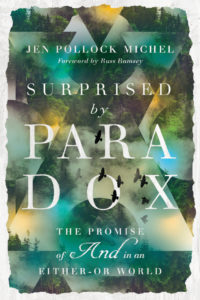 Surprised by Paradox: The Promise of AND in an Either-Or World Jen Polllock Michel (IVP) $16.00 Funny how covers that don’t appeal to me keep me from what might be really good books. Thank goodness I had the good sense to refuse my instinct to boycott this dull, jumbled up cover because it is a great, great, artfully rich and beautiful book. I knew it would be because this author’s two previous books Teach us To Want and Keeping Place are among the best books of the last few years. She’s a great writer, a born storyteller, and a fine thinker.
Surprised by Paradox: The Promise of AND in an Either-Or World Jen Polllock Michel (IVP) $16.00 Funny how covers that don’t appeal to me keep me from what might be really good books. Thank goodness I had the good sense to refuse my instinct to boycott this dull, jumbled up cover because it is a great, great, artfully rich and beautiful book. I knew it would be because this author’s two previous books Teach us To Want and Keeping Place are among the best books of the last few years. She’s a great writer, a born storyteller, and a fine thinker.
As one reviewer warned, “Don’t confuse this as a call for the mushy middle…” As Russ Ramsey (himself a thoughtful pastor and great wordsmith and author) says in the foreword,
Studied rightly, theology should lead to awe and wonder. To that end, my friend Jen Pollock Michel has given us a gift.
Perhaps, like me, you are drawn to books that people who like and respect recommend. (Uhhh, I hope so! Ha.) On the back of Surprised by Paradox we have rave reviews by Karen Swallow Prior, Emily Freeman, Tish Harrison Warren, and Marlena Graves. That’s enough to warrant an award right there!
The mysteries and paradoxes Michel explores in upbeat and nicely crafted chapters are Incarnation, Kingdom, Grace, and Lament. This isn’t exactly the creation-fall-redemption-restoration meta-narrative that so nicely shapes And Yet Undaunted but it is close. There is good stuff in here about wonder and goodness; there is hard stuff about brokenness and injustice; her insights about the Kingdom include good ruminations on this already/not yet mystery (and well as the upside down “blessed are” passages of Jesus. (You’ve got to read a chapter called “The High Treason of Hallelujah.”
And so, this book, too, offers what we might think of as a guide to basic Christian living, an ordinary sort of spirituality book that helps us with common stuff of faith and life. But yet, it is such a cut above the typical – graciously written, wisely construed, profoundly approached, with great questions for reflection and discussion that are really good. I mean, when a book is dedicated to “Jonas McAnn and the pastors like him” who are found “preaching the truth and trying not to miss the wonder” you’ve got to take notice.
(That is, if you know who Jonas McAnn is. He is, of course, the fictional preacher in a novel we highly acclaimed and awarded a few years back, Love Big, Be Well by Winn Collier. You see – she is using a literary character even in her dedication. How cool is that? This book deserves an award for the cleverness of the dedication page – I’ve never seen that before!)
Truly, in a world filled with ambiguity and confusion on one hand and overly dogmatic, strict and reductionistic views of truth on the other, it is lovely (indeed, it is necessary) to have voices of beauty and mystery that call us beyond binary black and white to the complexity of paradox. As it says on the back cover (which I am sure I cited in my earlier BookNotes review when this first came out)
Jesus invites us to abandon the polarities of either and or to embrace the difficult, wondrous dissonance of and.
I’m not sure I’m good at that. Maybe you aren’t either. That’s why we need this book. Thanks Jen Pollock Michel and thanks, IVP Books! Hooray.
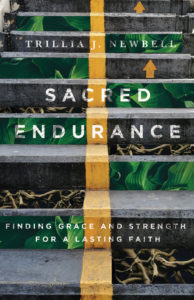 Sacred Endurance: Finding Grace and Strength for a Lasting Faith Trillia J. Newbell (IVP) $16.00 We hope you know Ms. Newbell as a great children’s writer. Her book about multi-ethnic reconciliation in the context of God’s faithfulness to the redemption of the creation, God’s Very Good Idea, is such a favorite because it helps children (and parents) to appreciate the “creation-fall-redemption-restoration” four chapter gospel that we talked about above, and it is passionate about diversity and multi-ethnic ministry from a gospel-centered perspective. She has written other good stuff and I trust her, also as a black woman, for offering a certain slant of insight that many of us might miss.
Sacred Endurance: Finding Grace and Strength for a Lasting Faith Trillia J. Newbell (IVP) $16.00 We hope you know Ms. Newbell as a great children’s writer. Her book about multi-ethnic reconciliation in the context of God’s faithfulness to the redemption of the creation, God’s Very Good Idea, is such a favorite because it helps children (and parents) to appreciate the “creation-fall-redemption-restoration” four chapter gospel that we talked about above, and it is passionate about diversity and multi-ethnic ministry from a gospel-centered perspective. She has written other good stuff and I trust her, also as a black woman, for offering a certain slant of insight that many of us might miss.
And so, when she did a book on endurance — on keeping on keeping on, as we used to say (or running the race as the Apostle Paul puts it) — I was interested. But I wasn’t sure this was going to be extraordinary. There are lots of books about hanging in there. Although it is about other stuff as well, I find Visions of Vocation by Steve Garber very hard to top (which makes much of loving the very messy and hurting world in the same manner that God does, and not growing cynical or jaded in that journey.) It is a live question: how do we keep on loving well, serving, being faithful until the end? How about that line from the Eugene Peterson book, A Long Obedience in the Same Direction? Nurturing a long haul sort of faith is needed now more than ever.
And so I turned to Trillia Newbell’s book, realizing there were great blurbs on the back from people of color I respect, like Bryan Loritts and Christiana Edmondson.(I do hope you know the podcast she helps with, Truth’s Table.) And I realized that Ms. Newbell has so much insight and frames this question so wholistically that it stands not only as a good example of faithful Christian guidance on the topic (endurance) but as an example of how to do a thoughtful, substantive, faithful sort of Christian self help book. This is “basic Christian living” 101 and more. I’m excited to name it as a great book in this genre.
You see, while it offers standard fare advice — good advice! — about turning to Jesus and being faithful, and trust in God and the like, it offers this advice in ways that are framed by the bigger story of God using suffering and God redeeming the ordinariness of our days. There is no breathy promises but no let-it-all-hang out and revel in the rawness, either. She’s honest, but she wants to help people grow in their maturity. She is equipping us to think well and live well. We are called to a race and she wants us to finish it well.
And she covers content that some basic Christian living books miss. For instance, she has a chapter about the role of the mind, and she talks about enduring in society. (Yes, questions of race and racism are part of basic Christian living!) She calls us to do life with others in community and insists (as my friend Alan Noble who wrote Disruptive Witness says of it) that we can be faithful “without denying or downplaying the reality of suffering and evil we face in this life.”
I was heartened that my instinct that this is framed by a bigger picture and better story when I saw this review by Paul David Tripp (author of the popular devotional, New Morning Mercies) who writes this. Notice the second line — he new it was going to be different, “deeply wise.”
“This is the best book on endurance I have ever read. As I began, I knew this book was going to be different–Trillia Newbell has given us something that is deeply wise, practical at every turn, and laden with illuminating illustrations. Again and again she points us to Jesus and reminds us each time that the hope for our endurance is not found in our faithfulness but rather made possible because of his. You don’t have to dread the race ahead; you can look at the road ahead with anticipation and hope. This book will tell you why.”
There are lots of great little books to help ordinary Christians learn about their faith, grow deeper in their spiritual formation, get the gospel in their bones in a way that helps them deepen their discipleship. But many are laden with less than stellar writing or overpromising or cheap sentimentality. We tip our hat to Trillia for offering good counsel and fresh encouragement that is sold and good and true, even for those who are struggling on this leg of the journey.
VITAL BOOKS ABOUT MISSIOLOGY AND MISSIONS
Although it isn’t a hugely popular section of our store, we are proud to keep old and new titles on global missions packed into our shelves in that important category. Good publishers continue release volumes in this robust conversation about the nature of mission and the ways Christ’s church can be expanded around the globe. Of course, with the majority of Christians now living in the “two thirds” world, mostly in the global South, those who train Western missionaries have considerable re-thinking to do. Those in mainline churches and those in evangelical traditions are all doing vibrant work in producing scholarship to equip those doing engaged in missionary endeavors. Here are just three we want to honorably mention this year.
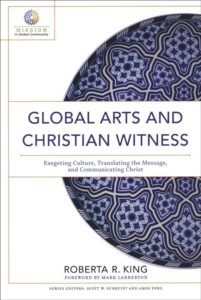 Global Arts and Christian Witness: Exegeting Culture, Translating the Message, and Communicating Christ Roberta R. King (Baker Academic) $26.99 Scott Sunquist and Amos Yong are among the sharpest missiologist in North America and they are the senior editors of an on-going series called “Mission in the Global Community” published by Baker Academic. If you are interested in this high level, academic work in missiology, you should order them all from us. This is the latest and is a notable example of the interesting sort of cutting edge work done at the interface of anthropology and linguists and culture studies and gospel presentations.
Global Arts and Christian Witness: Exegeting Culture, Translating the Message, and Communicating Christ Roberta R. King (Baker Academic) $26.99 Scott Sunquist and Amos Yong are among the sharpest missiologist in North America and they are the senior editors of an on-going series called “Mission in the Global Community” published by Baker Academic. If you are interested in this high level, academic work in missiology, you should order them all from us. This is the latest and is a notable example of the interesting sort of cutting edge work done at the interface of anthropology and linguists and culture studies and gospel presentations.
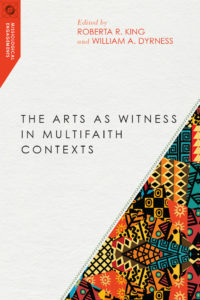 Before I explain that one, I must say this: IVP Academic has a similar and equally scholarly and truly fascinating line of edgy missiology volumes in their “Missiological Engagements” series. And Roberta R. King (along with William Dyrness) have edited a companion volume to Global Arts and Christian Witness that has appeared on this IVP Academic series. That one is called The Arts as Witness in Multifaith Contexts edited by Robert King & William Dyrness (IVP Academic; $35.00.)
Before I explain that one, I must say this: IVP Academic has a similar and equally scholarly and truly fascinating line of edgy missiology volumes in their “Missiological Engagements” series. And Roberta R. King (along with William Dyrness) have edited a companion volume to Global Arts and Christian Witness that has appeared on this IVP Academic series. That one is called The Arts as Witness in Multifaith Contexts edited by Robert King & William Dyrness (IVP Academic; $35.00.)
Here is what the publisher says about this amazing, breath-taking collection of essays from all over the world:
In search of holistic Christian witness, missionaries have increasingly sought to take into account all the dimensions of people’s cultural and religious lives—including their songs, dances, dramatic performances, storytelling, and visual arts.
Missiologists, educators, and practitioners are cultivating new approaches for integrating the arts into mission praxis and celebrating creativity within local communities. And in an increasingly globalized and divided world, peacemaking must incorporate the use of artistic expressions to create understanding among peoples of diverse faiths. As Christians in all nations encounter members of other religions, how do they witness among these neighbors while respecting their distinct traditions?
The Arts as Witness is a primary source sort of first-hand collection by missiologists and artists. There are chapters with titles like these:
“God Moves in a Mysterious Way: Christian Church Music in Multifaith Liberia, West Africa, in the Face of Crisis and Challenge” (by Ruth M. Stone) and “Sounds, Languages, and Rhythms: Hybridized Popular Music and Christian-National Identity Formation in Malaysia, Thailand, and Cambodia” (by Sooi Ling Tan) or “Art as Dialogue: Exploring Sonically Aware Spaces for Interreligious Encounters” (by Ruth Illman.) This stuff is a far cry from the caricatures of missionaries in novels like The Poisonwood Bible, say. These are evangelical missionaries and musciologists, doing stuff that ends up in chapters like this: “Simba Nguruma“: The Labor of Christian Song in Polycultural, Multifaith Kenya” as told by (Jean Ngoya Kidula. Okay?
Man, this is fascinating, whether it is a ground-breaking chapter by Dyrness on the poetic faith of Zapatistas in Mexico or how contemporary art can critiques neocolonialism (in the chapter “Wild, Wild China by Joyce Yu-Jean Lee.) These are just so amazing, collecting pieces that “speak of the power of art in making peace, contextualizing theology, and aiding in the evangelization of peoples.”
But, whaaat? Is this too much, too specific, too much arcane detail? I understand. Which is why we also are honoring Global Arts and Christian Witness: Exegeting Culture, Translating the Message, and Communicating Christ. It is also meaty and substantial but perhaps more foundational.
In this one, as you can see from the title, it does, in fact, explore how artists are part of this global missions movement. Needless to say (as we often do) art needs no justification in God’s good world, so artists don’t “need” to be evangelistic or missionary-minded. In fact, good artists informed by wise, Christianly conceived aesthetics, would say art is to be allusive and imaginative and, well, artful, so doesn’t “have a message” in any prosaic sense. (Otherwise, it isn’t art, after all, but more akin to propaganda.)
But yet, for some few artists, they are called to hook their artistic gifts to global missionary efforts, and when they do it is spectacularly interesting, and often fruitful. Global Arts and Christian Witness (complete with full color plates and photographs) is an up-to-the moment report from the field by this good thinker about how artists can be part of the global work of sharing the good news of God’s Kingdom.
Dr. Roberta King is a professor of communication and ethnomusicology in the School of Intercultural Studies at Fuller Theological Seminary. She is a great scholar and activist and writer.
Here is what hip hop activist and Christian scholar Daniel White Hodge (whose book Homeland Insecurity: A Hip Hop Missiology for the Post-Civil Rights Culture we’ve award as notable book last year) says:
It has been said that music is a universal language, but its meaning is not. King has given us an in-depth analysis adding to the ethno-musicological lexicon in great detail. In a world where everyone has some type of favorite music, King’s astute inquiry gives us a better glimpse into the complexity of music from around the world. Very much worth the read!”
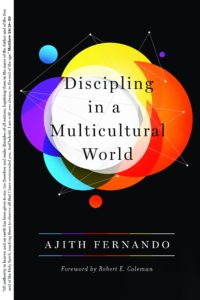 Discipling in a Multicultural World Ajith Fernando (Crossway) $19.99 This book is remarkably complex and multi-faceted, covering so much. I want to celebrate it and award it and promote it here, even if I realize too few really want to study up on this detail. But it is a detail we increasingly need to learn and this is pioneering and wise. Fernando is an amazing Sri Lankan leader (and has served the global Youth for Christ movement for years.) I would trust any book he wrote about anything (such as his must-read The Call to Joy & Pain: Embracing Suffering in Your Ministry or his inspiring NIV Application Commentary on Acts.)
Discipling in a Multicultural World Ajith Fernando (Crossway) $19.99 This book is remarkably complex and multi-faceted, covering so much. I want to celebrate it and award it and promote it here, even if I realize too few really want to study up on this detail. But it is a detail we increasingly need to learn and this is pioneering and wise. Fernando is an amazing Sri Lankan leader (and has served the global Youth for Christ movement for years.) I would trust any book he wrote about anything (such as his must-read The Call to Joy & Pain: Embracing Suffering in Your Ministry or his inspiring NIV Application Commentary on Acts.)
Here he is insisting that our multicultural world needs countercultural disciplers. Hmmm. Let that sink in.
Of course, this presumes – and I suppose some of our readers here, if you are still with me, may not resonate with this assumption – that new believers need to be mentored, guided, that we all need spiritual guides, directors, coaches, pastors. That we are to “make disciples” suggests that some of us, at least, should be learning how to “disciple” others into the ways of Christ-honoring discipleship. Whether that is a process of catechism or spiritual direction or Bible study, we simply must help shape and care for and guide and led those who under our watch come to want to follow Jesus. Healthy evangelism always must lead to follow-up and a process of mentoring new believers.
And so, if this is true – and it obviously is – how does this “discipling” happen in the ever-more-common cross-cultural situations. Global missionaries have to think about this and missiologists are endlessly hoping to find the answer to a fruitful “contextualized” way to relate Christ and culture. But anyone in almost any town in North America, now, must take up this discussion. We all must wonder how to be sensitive to cultural and ethnic concerns as we make disciples.
Ajith Fernando’s great, provocative, fascinating book asks how we do spiritual guidance, mentoring, teaching, and leading (what he calls discipling, for short) in contexts such as among those from cultures that are oriented around honor and shame; what about honoring family commitments, if the family is of another religion (or no religion as such?) What about dealing with persecution. This is a practical guide to disciple-making as we help others grow into faithful followers of Christ within their own social and religious contexts. Some of these stories may be set in South Asia, but you will learn much from them and it just may keep you from harming those from other cultures you are befriending even now.
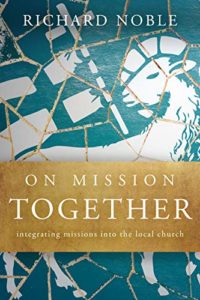 On Mission Together: Integrating Missions Into the Local Church Richard Noble (Falls City Press) $14.99 There are a small handful of books about how local missions committees or missions advocates or other leaders (pastors, but not just ministers) can navigate the admittedly complicated context of the local congregation and its needs and make clear the need for an emphasis on mission. And even for those mission-minded churches (like those famously documented in Tom Telford’s wonderful Today’s All Star Missions Churches) or those only wanting to be, On Mission Together by Rich Noble is just what you need!
On Mission Together: Integrating Missions Into the Local Church Richard Noble (Falls City Press) $14.99 There are a small handful of books about how local missions committees or missions advocates or other leaders (pastors, but not just ministers) can navigate the admittedly complicated context of the local congregation and its needs and make clear the need for an emphasis on mission. And even for those mission-minded churches (like those famously documented in Tom Telford’s wonderful Today’s All Star Missions Churches) or those only wanting to be, On Mission Together by Rich Noble is just what you need!
As the globally recognized leader Peter Kuzmic writes in the remarkable foreword, it is written in what Billy Graham once called “the spirit of Lausanne.” That is, in the spirit and wholistic ethos of the famous Lausanne missionary conferences and statements that guided the best of a generation or more of thoughtful, contextualized, evangelical missionaries leaders. Kuzmic rightly says it is “almost comprehensive, well-organized, Manual for Missions” and that it almost burns with the beloved heart and vision and passion of Richard Noble for helping churches deepen their commitment to the Great Commission.
We want to celebrate and honor this book as notable because there is so very little like it out there. That may not sound rather prosaic, but it is said with gusto and joy: we rarely get to say that there is precious little in a field or genre, and this book deserves this big accolade. Our Mission Together is both a primer and a handbook, a guide and a big set of thoughtful suggestions, helping any given local church become more adept at educating about, supporting, and sending global missionaries. It is “a clear and concise guidebook for any church wanting to make global missions extend beyond an annual offering or a Minute for Missions.” Ya know?
Three big cheers for this classy, boutique Western Pennsylvania publisher and for Richard Noble, a well-known and widely-respected Christian Missionary Alliance missions mobilizer. He is the founder and director of the Center for Missional Engagement and deserves to be heard.
A BEAUTIFUL, QUIET GEM
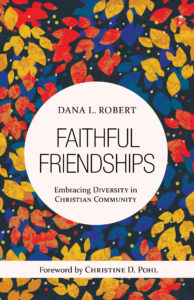 Faithful Friendships: Embracing Diversity in Christian Community Dana Robert (Eerdmans) $19.00 I’m not sure what first alerted me that this would be a quiet gem, a great little book, perhaps too unsung, but important and wonderful. Perhaps it was the sub-title, or the fact that a foreword was offered by Christine Pohl, who wrote the seminal, essential Making Room: Recovering Hospitality as a Christian Tradition and Living Into Community: Cultivating Practices That Sustain Us and Friendships at the Margins: Discovering Mutuality in Service and Mission. If Pohl says something is important, we should listen.
Faithful Friendships: Embracing Diversity in Christian Community Dana Robert (Eerdmans) $19.00 I’m not sure what first alerted me that this would be a quiet gem, a great little book, perhaps too unsung, but important and wonderful. Perhaps it was the sub-title, or the fact that a foreword was offered by Christine Pohl, who wrote the seminal, essential Making Room: Recovering Hospitality as a Christian Tradition and Living Into Community: Cultivating Practices That Sustain Us and Friendships at the Margins: Discovering Mutuality in Service and Mission. If Pohl says something is important, we should listen.
I realized early on by reading Ms Pohl’s good foreword that this is, indeed, a book about friendship. I thought maybe the word “friendship” in the title was just useful for an image, but that it was mostly about community, about church. And it is, I suppose. But Dana Robert’s is working deeply here – even though the book isn’t academic or arcane – in the questions of virtue and relationships and character. What kind of people are we in our communities of faith? What kind of relationships form us? That is, what kind of friends do we have?
We don’t know whether to put this book under our section about racism and multi-ethnic ministry because it is about cross-cultural diversity. But is is also about diversity within the church, so we surely should shelf it in our section about community, next to ecclesiology. But, you know what? It also is a book, as Pohl reminds us, about friendship. So it goes under friendship, over in the self-help sort of personal growth section. I almost listed in in that category in the PART ONE of BookNotes Best of 210-9.
Faithful Friendships came out of lectures given at Union Presbyterian Seminary in Virginia, a lively and wonderful place. The ideas were first shaped by a series of talks she gave at Baylor’s Truett Theological Seminary. Currently, she teaches World Christianity and History of Mission (and is the director of the Center for Global Christianity at Boston University.) So she gets around – Baptist, Presbyterian, Roman Catholic. (And Pohl, who studied at L’Abri, with Francis Schaeffer, teaches at Asbury, a fine United Methodist institution.)
Isn’t it nice that such ecumenical voices have so much to tell us, to teach us about Jesus and his tender call to care for others? This book is deeply Christian, rooted in the gospels, and yet if full of contemporary stories, examples and illustrations of lasting friendships and cross-cultural initiatives. You can see more of why we love it, and why I insist on honoring it here as a lovely release from 2019 by hearing these other important figures who commend it:
“Dana Robert has been that rare combination of renowned scholar and committed church mission leader. In this book, Dr. Robert does a marvelous job of reclaiming the practice of friendship as essential to Christian ethics and church life. I’ve just returned from a bruising at the United Methodist General Conference, full of talk of division and schism. I’m thinking, ‘Dana Robert’s guidance and wisdom, just when we need it. What a gift.'” Will Wiilimon, Accidential Preacher
“What a remarkable–and unusual–book Dana Robert has given us! Though esteemed as a scholar of church history and mission, she has ranged far beyond academic categories to explore the deepest human needs and to reflect on the models of friendship she has seen in Christian communities. This is not a sentimental book; her copious illustrations depict Christian commitment across boundaries, often in peril. Preachers and church leaders of all stripes will value the way she has woven biblical and theological insights together with her own warmhearted message. Dana Robert is herself a friend in the church’s need.” Fleming Rutledge, The Crucifixion
“Refusing to be torn apart by wars, revolutions, and systemic injustice and oppression, the individuals in Faithful Friendships manifest their faith and humanity in noble acts of friendship that defies the boundaries of race, nationality, class, religion, and culture. An inspiring read.” Xi Lian, Duke Divinity School
SURPRISING, POWERFUL, HONEST, HEART-BROKEN: A CRY FROM THE MAINLINE CHURCH, IMPORTANT FOR US ALL
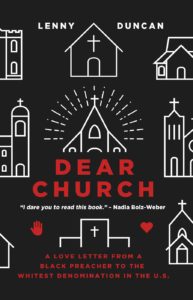 Dear Church: A Love Letter from a Black Preacher to the Whitest Denomination in the Us Lenny Duncan (Fortress Press) $16.99 I wasn’t sure how to honor this hot love letter of a book that came out this summer. It is, as the subtitle reveals, a book mostly for mainline Lutherans. The ELCA is said to be one of the whitest denominations in the US, but it is, I’d say, a stand in for most mainline denominations. I know a number of clergy of color in our own Lutheran Synod and have only had the briefest of conversations with some about how they navigate their own embodiment within their mostly white region and mostly white congregations. Some are, as you’d expect, more outspoken about racial justice issues, while others perhaps do not feel called to that particular ministry or do not want the burden of hosting that conversation. Maybe they are content, maybe not.
Dear Church: A Love Letter from a Black Preacher to the Whitest Denomination in the Us Lenny Duncan (Fortress Press) $16.99 I wasn’t sure how to honor this hot love letter of a book that came out this summer. It is, as the subtitle reveals, a book mostly for mainline Lutherans. The ELCA is said to be one of the whitest denominations in the US, but it is, I’d say, a stand in for most mainline denominations. I know a number of clergy of color in our own Lutheran Synod and have only had the briefest of conversations with some about how they navigate their own embodiment within their mostly white region and mostly white congregations. Some are, as you’d expect, more outspoken about racial justice issues, while others perhaps do not feel called to that particular ministry or do not want the burden of hosting that conversation. Maybe they are content, maybe not.
I used to sell books as one of the only white people at an all African American conference for black men and women – clergy and congregants – in my own PC(USA) denomination. Like the ELCA, we’ve made all sorts of statements and public commitments to ethnic diversity and racial justice. Our mainline denominational publishers have done radical books and our leaders have issued declarations. But only as I was privileged to be an insider to the conversations within the safe spaces of the black Presbyterian caucus, so to speak, did I realize that despite the right messages (sometimes) from leadership, people of color have huge barriers and frustrations within largely white organizations, even those that say they are mostly progressive on these issues. As I started to read Rev. Lenny (the Lutheran) Duncan’s Dear Church I could almost hear my black Presbyterian brothers and sisters from years ago. This stuff is talked about in public a bit more these days, but the issues of race and class have not gone away.
(That Duncan add passion for inclusion of those other than cis-gender folk would make it controversial in some black churches, of course and in this, he does not speak for all people of color, or course.)
In his love letter to the ELCA, Duncan offers the church a “new vision for the future.” I’m not so sure what is so “new” about fighting white supremacy, misogyny, nationalism, homophobia, and economic injustice. He stands with immigrants and the LGBTQ+ community and while we don’t do it very well, the call to do so isn’t new, certainly not from this publisher. But in all this heart-felt anguish and hope, Duncan calls us to consider deeply and forthrightly just how willing we are to truly and faithfully enter that struggle for the long haul.
The writing in Dear Church is shall we say, a bit colorful and Rev. Duncan is (perhaps at first glance) a surprising character to lead the church of Luther to a new reformation. Lenny Duncan is, as he says, “the unlikeliest of pastors.” He was formerly homeless, he drifted all around the country. He was very seriously un-churched. Incarcerated. So he has some of that rough past experience and brings some history and struggle and hardship to his work as pastor at Jehu’s Table in the heart of Brooklyn. This radical social and spiritual transformation isn’t uncommon among Pentecostal and evangelical church leaders, but it is more rare in the more middle American mainline churches. Ya know? This story almost sounds, well, Biblical in proportion.
I agree (perhaps in a slightly different way than Duncan means it) when he says that the problems with the declining membership church facing shifting demographics and shrinking congregations “are not sociological, but theological.” Right on; in fact, I wish he’d have explored that more.
In this heart-felt open letter to the mainline church, Reverend Lenny Duncan calls us all to renewal, to revival. He invites us to rise up in God’s Spirit – yes, in terms of a radical vision of a fully open and inclusive church and a wholistic mission that subverts the idols and ideologies of the day, and of status quo congregations, but it is a spiritual renewal about which he writes. This really does mean turning to God and getting serious about our discipleship in the way of Jesus and His counter-cultural movement. He’s right about that, you know, and he brings this challenge with lots of energy and color and spicy storytelling. It’s worth reading, and it has a lot of integrity.
Even if you disagree with Duncan’s progressive sort of theology and his liberationist hermeneutic and lefty sort of politics, you should agree that this feisty read is better than the passionate (manicured) voices calling us to a safe sort of mega-churchy pseudo-revolution. I’m tired of hip and breathy evangelical voices calling us to cool zeal and making a difference and changing the world, when, frankly, they don’t even touch the big issues of structural and systematic idolatry in our society; they’ve co-opted the language of revolution but don’t really mean it. Dear Church means it. Rev. Duncan may not have every analysis fully right – read it and conclude for yourself – but he is pointing us in the right direction, calling us out, inviting us to be serious about faith and action, and to not give up on God’s work in the mainline churches. His diagnosis is severe and his proposals are radical.
I don’t know how my BookNotes fans will take this, but here are how some in his own beloved ELCA have responded:
Rev. Lenny Duncan is a voice calling in the wilderness. I am deeply grateful for the comfort and the discomfort his book brought me. I dare you to read this book, church. I dare you to be open to the repentance it calls for, to the grace it manifests, to the pain it witnesses to. I dare you to be changed by the truth in its pages. I dare you to not look away. It’s time.
Marrying stunning, reverberant personal stories with little-known Lutheran history, Duncan makes readers laugh out loud in grim recognition. His critiques of our beloved church strike a tender spot in the heart, not because they are harsh, but because they are true.
The Reverend Lenny Duncan writes with a searing message urgently rooted in true love. His deep commitment to speak the truth to his white siblings in the church reads as a desperately clarion call. Dear Church isn’t just a good idea for a book study–the grace-filled ferocity that overwhelms its pages reminds one of early writings from the Latin American base communities that formed liberation theology as we know it today. Duncan has written a necessary addition to the corpus of Christian writings in the twenty-first century. We ignore his plea at our own peril.”
FAVORITE BOOKS and DVDs ABOUT THE BIBLE
I love reading books about the Bible and do my fair share of informal Bible teaching, here and there. There seems to be a rising tide of fresh, new Bible scholars these days and we saw remarkably important books by authors like Nijay K. Gupta and Brant Pitre and Michael Bird and Douglas Campbell, all who are writing on Paul, perhaps in conversation with leaders in the field like Michael Gorman, who published this year Participating in Christ: Explorations in Paul’s Theology and Spirituality (Baker Academic; $30.00.)
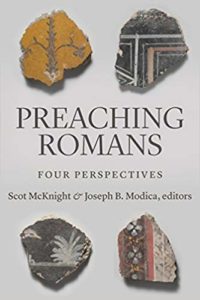 There has been quite an interest in Paul studies this year, and we’re excited. One important and interesting one that we announced at BookNotes last winter was Preaching Romans: Four Perspectives edited by Scot McKnight & Jospeh Modica (Eerdmans; $20.00.) It offers four different “takes” or approaches to the famous epistle and then suggests how preachers should proclaims the message of Romans. There are not only essays about the four different approaches, but sample sermons.
There has been quite an interest in Paul studies this year, and we’re excited. One important and interesting one that we announced at BookNotes last winter was Preaching Romans: Four Perspectives edited by Scot McKnight & Jospeh Modica (Eerdmans; $20.00.) It offers four different “takes” or approaches to the famous epistle and then suggests how preachers should proclaims the message of Romans. There are not only essays about the four different approaches, but sample sermons.
Some of the esteemed scholars and preachers who are included in this good resource are Michael Gorman, Fleming Rutledge, Michael Bird, Douglas Campbell, Richard Hays, Tara Beth Leach, William Willimon and others, all indicative of one of the four interpretive perspectives
This is a really interesting, very useful, and I think inspiring volume and recommend it for anyone interested in Bible study, in Paul, or in preaching. Kudos!
Later in the year, Scot McKnight himself did a freshly conceived but careful commentary on Romans entitled Reading Romans Backwards: A Gospel of Peace in the Midst of Empire (Baylor University Press; $29.99 — no discount available on this one; sorry.) It, of course, emphasizes the ecclesiological context and implications and has gotten very good reviews. It is a notable volume, for sure, but if you’re going there, stay tuned (below) to see me once again rave about the astounding and energetic Romans Disarmed.
Although it has a very different style and approach, I have to admit I enjoyed much of the little paperback by John Piper called Why I Love the Apostle Paul: 30 Reasons (Crossway; $14.99.) I spend a lot of my own time in the Old Testament, so it’s good to hear him say “Besides Jesus, no one has kept me from despair, or taken me deeper into the mysteries of the gospel, than the apostle Paul.)
Zondervan’s useful “Story of God Bible Commentaries” (edited by Scot McKnight & Tremper Longman) saw several new volumes this year (for instance, Joshua by Lissa Wray Beal and Acts by Dean Pinter.) They’ve added more to the excellent paperback “Biblical Theology for Life” series – see Nicholas Perrin’s Biblical Theology of Life: The Kingdom of God.
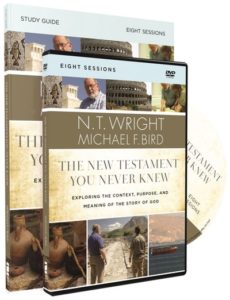 Zondervan made a real mark in 2019 as they released two different video curriculums by N.T. Wright and Michael Bird and a major, major textbook This is amazing — what riches we have to use among our churches and small groups and Bible studies and fellowship groups. First, last winter, there was the upbeat and fabulous “live from the Holy land” 8-session DVD The New Testament You Never Knew Video Study: Exploring the Context, Purpose, and Meaning of the Story of God ($39.99, or $51.99 for a DVD/Participant’s Guide combo package.) It’s perfect for almost any group that wants solid teaching that is accesible and clear.
Zondervan made a real mark in 2019 as they released two different video curriculums by N.T. Wright and Michael Bird and a major, major textbook This is amazing — what riches we have to use among our churches and small groups and Bible studies and fellowship groups. First, last winter, there was the upbeat and fabulous “live from the Holy land” 8-session DVD The New Testament You Never Knew Video Study: Exploring the Context, Purpose, and Meaning of the Story of God ($39.99, or $51.99 for a DVD/Participant’s Guide combo package.) It’s perfect for almost any group that wants solid teaching that is accesible and clear.
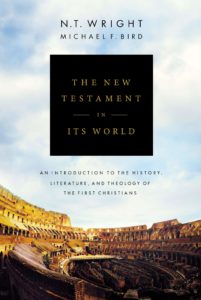 Then, in the fall, they released Wright and Bird’s massive (992 page) text The New Testament in Its World: An Introduction to the History, Literature, and Theology of the First Christians (Zondervan Academic; $59.99) that surely deserves the acclaim it has been getting. It is superb; perhaps the best volume of its kind! There is a large companion workbook, too, The New Testament in Its World Workbook, that can be bought to go through this big text which is useful as a study resource; the workbook regularly for $22.99. We are real fans of this fabulous, serious contribution to New Testament studies.
Then, in the fall, they released Wright and Bird’s massive (992 page) text The New Testament in Its World: An Introduction to the History, Literature, and Theology of the First Christians (Zondervan Academic; $59.99) that surely deserves the acclaim it has been getting. It is superb; perhaps the best volume of its kind! There is a large companion workbook, too, The New Testament in Its World Workbook, that can be bought to go through this big text which is useful as a study resource; the workbook regularly for $22.99. We are real fans of this fabulous, serious contribution to New Testament studies.
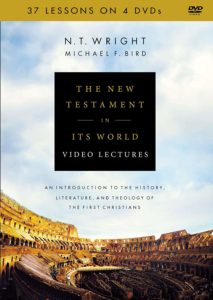 The matching DVD set of The New Testament in Its World Video Lectures offers 37-lesson seminary level video lectures and shows them as good professors not just in the classroom but, again, live in the holy land. As you can imagine, given how lovely and helpful actually hearing N.T. Wright is (and Bird is pretty great as a speaker, too) this hefty set of lectures is highly recommended for those wanting a deeper study. It is, I’d say, almost unprecedented and, although seminary level, could be made available for somebody at almost any church. The 37 lessons on four DVD discs sells for $49.99.
The matching DVD set of The New Testament in Its World Video Lectures offers 37-lesson seminary level video lectures and shows them as good professors not just in the classroom but, again, live in the holy land. As you can imagine, given how lovely and helpful actually hearing N.T. Wright is (and Bird is pretty great as a speaker, too) this hefty set of lectures is highly recommended for those wanting a deeper study. It is, I’d say, almost unprecedented and, although seminary level, could be made available for somebody at almost any church. The 37 lessons on four DVD discs sells for $49.99.
The release of this major book (not to mention the workbook and the DVDs) is simply momentous, what we truly might call a publishing event.
“The big, bold theological interpretation of the New Testament that N. T. Wright has been building, piece by piece, in monographs and commentaries over the years now appears here in an accessible, single-volume New Testament introduction.” –Dr. Matthew V. Novenson, senior lecturer in New Testament and Christian Origins, University of Edinburgh, Scotland
So, a very special shout out to Zondervan thanking them for their role in bringing this new N.T. Wright teaching to us all.
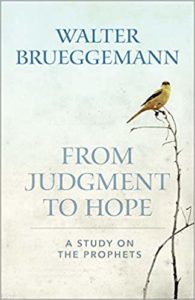
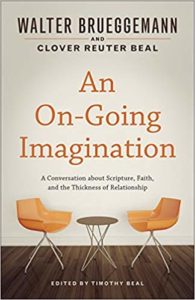 A month ago I described at BookNotes two new Walter Brueggemann books written for a popular audience. First there was the short but delightfully useful From Judgment to Hope: A Study on the Prophets (WJK; $14.00) which I highly recommend. Also released in October was An On-going Imagination: A Conversation About Scripture, Faith, and the Thickness of Relationships (WJK; $18.00.) It is a fabulous transcript of the honest conversations between Clover Beal and Walt over a period of months together. It’s a must for any Brueggemann fans.
A month ago I described at BookNotes two new Walter Brueggemann books written for a popular audience. First there was the short but delightfully useful From Judgment to Hope: A Study on the Prophets (WJK; $14.00) which I highly recommend. Also released in October was An On-going Imagination: A Conversation About Scripture, Faith, and the Thickness of Relationships (WJK; $18.00.) It is a fabulous transcript of the honest conversations between Clover Beal and Walt over a period of months together. It’s a must for any Brueggemann fans.
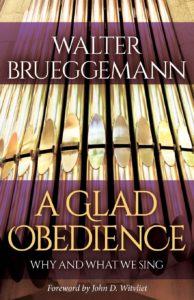 Something that delighted many with joy and surprise, even, was the Brueggemann book that WJK released last January — A Glad Obedience: Why and What We Sing (WJK; $18.00.) As we explained at BookNotes, it includes a number of studies on the role of music and hymns in our lives by way of studying a handful of typically mainline Protestant hymns, followed by a handful of chapters studying various Psalms that were firstly sung. It was so useful that it was given a foreword by the head of the wonderful and widely respected Calvin Institute on Christian Worship, John Witvliet.
Something that delighted many with joy and surprise, even, was the Brueggemann book that WJK released last January — A Glad Obedience: Why and What We Sing (WJK; $18.00.) As we explained at BookNotes, it includes a number of studies on the role of music and hymns in our lives by way of studying a handful of typically mainline Protestant hymns, followed by a handful of chapters studying various Psalms that were firstly sung. It was so useful that it was given a foreword by the head of the wonderful and widely respected Calvin Institute on Christian Worship, John Witvliet.
Tremper Longman released a major work to through his hat into the ring of the genre of books that help us understand the hard and complicated stuff of the Bible in his Confronting Old Testament Controversies: Pressing Questions about Evolution, Sexuality, History, and Violence (IVP; $19.99.) He is as trustworthy as they come, it seems to me, so this deserves attention and appreciation.
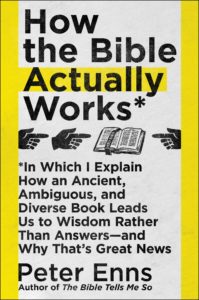 I’ll admit that I really, really enjoyed and I learned a lot from Pete Enn’s witty and mostly helpful How the Bible Actually Works: In Which I Explain How an Ancient, Ambiguous, and Diverse Book Leads Us to Wisdom Rather Than Answers–And Why That’s Good News (HarperOne; $26.99.) It doesn’t answer all the questions of a faithful hermeneutic, and revels in the loose ends a bit too much for my taste, but it’s a really good read. It deserves a very honorable mention. I know some think he’s gone way too ambiguous about the perspicuity and authority of the Word of God but I don’t think that is fair. He’s just trying to help us, as he says, see how the literature we’ve been given in our Sacred texts actually works.
I’ll admit that I really, really enjoyed and I learned a lot from Pete Enn’s witty and mostly helpful How the Bible Actually Works: In Which I Explain How an Ancient, Ambiguous, and Diverse Book Leads Us to Wisdom Rather Than Answers–And Why That’s Good News (HarperOne; $26.99.) It doesn’t answer all the questions of a faithful hermeneutic, and revels in the loose ends a bit too much for my taste, but it’s a really good read. It deserves a very honorable mention. I know some think he’s gone way too ambiguous about the perspicuity and authority of the Word of God but I don’t think that is fair. He’s just trying to help us, as he says, see how the literature we’ve been given in our Sacred texts actually works.
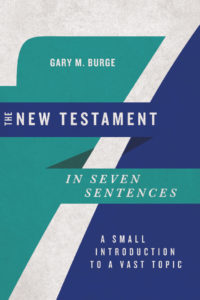
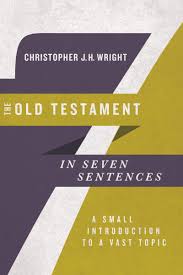 It isn’t easy to pull off faithfully, but I adored The Old Testament in Seven Sentences: A Small Introduction to a Vast Topic by the impeccable Christopher J.H. Wright (IVP Academic; $16.00.) I co-taught an overview of the Old Testament course at our church and read a lot of Hebrew Scripture stuff this past fall. This little volume was really good. Also released in 2019 was The New Testament in Seven Sentences: A Small Introduction to a Vast Topic by the very astute Wheaton prof, Gary M Burge (IVP Academic; $16.00) As always, InterVarsity Press has this knack to create good books that are thoughtful and informed without being overly academic. They do lots of books for the “thoughtful layperson” alongside their extraordinary scholarly imprint. IVP Academic. (These two are, by the, in their “IVP Academic” imprint which I guess they suppose will allow them be adopted as college-level introductory texts. I suppose, but they aren’t nearly as scholarly as many in that academic imprint, so don’t let that scare you away. These make great books for any reader.
It isn’t easy to pull off faithfully, but I adored The Old Testament in Seven Sentences: A Small Introduction to a Vast Topic by the impeccable Christopher J.H. Wright (IVP Academic; $16.00.) I co-taught an overview of the Old Testament course at our church and read a lot of Hebrew Scripture stuff this past fall. This little volume was really good. Also released in 2019 was The New Testament in Seven Sentences: A Small Introduction to a Vast Topic by the very astute Wheaton prof, Gary M Burge (IVP Academic; $16.00) As always, InterVarsity Press has this knack to create good books that are thoughtful and informed without being overly academic. They do lots of books for the “thoughtful layperson” alongside their extraordinary scholarly imprint. IVP Academic. (These two are, by the, in their “IVP Academic” imprint which I guess they suppose will allow them be adopted as college-level introductory texts. I suppose, but they aren’t nearly as scholarly as many in that academic imprint, so don’t let that scare you away. These make great books for any reader.
I think IVP Academic did the most consistently interesting Biblical studies and other academic output this year (see HERE for their Fall 2019 catalog, which is much more than Biblical and theological books and includes rigorously scholarly work as well as less technical volumes but that are still fairly academic; we stock many of these, of course, and can get them all.) See HERE for the interactive Baker Academic Fall 2019 catalog to see their remarkable listing of serious scholarship as well as the less formal but fairly academic listings as well.)
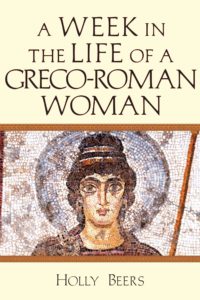 I hope you notice the 2019 IVP releases in their great “Week in the Life of…” series, such as A Week in the Life of Rome by James Papandrea, A Week in the Life of a Greco-Roman Woman by Holly Beers, or A Week in the Life of a Slave by New Testament scholar John Byron. These tremendous little books appeal to those who want an easy read (part fiction, part non-fiction, actualy) that puts us right into the social context of the New Testament. Congratulations to them for offering this kind of good work.
I hope you notice the 2019 IVP releases in their great “Week in the Life of…” series, such as A Week in the Life of Rome by James Papandrea, A Week in the Life of a Greco-Roman Woman by Holly Beers, or A Week in the Life of a Slave by New Testament scholar John Byron. These tremendous little books appeal to those who want an easy read (part fiction, part non-fiction, actualy) that puts us right into the social context of the New Testament. Congratulations to them for offering this kind of good work.
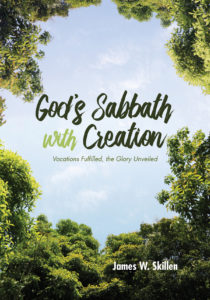 God’s Sabbath With Creation: Vocations Fulfilled, the Glory Unveiled James Skillen (Wipf & Stock) $35.00 I sadly suspect that you may not have heard of this stellar 2019 release (unless you saw my shout out about it at BookNotes) nor its fine author, Dr. James Skillen. Skillen often works in the higher scholarly levels of political philosophy and is respected in a circle of political thinkers in the line of the Dutch Christian statesman Abraham Kuyper (and even more specifically, among those who studied legal theory or social philosophy in the tradition of Dutch philosopher Herman Dooyeweerd, like, say, David Koyzis, Jonathan Chaplin, Paul Marshall, John Witte, Elaine Botha, Bob Goudzwaard, James K.A. Smith, Stanely Carlson-Thies, Robert and Jessica Joustra, Matthew Kaemingk, Richard Mouw, and even Nicholas Wolterstorff. ) And yet, Skillen’s passionate, deeply thoughtful, generative scholarship isn’t as known as it might be. His 2014 The Good of Politics A Biblical, Historical, And Contemporary Introduction is still a must read for our times as it offers a positive theological articulation of Godly statecraft and the legitimate role of government, offering a foundation for the civic organization he founded decades ago, Citizens for Public Justice. It’s an organization we value and look to for a way out of the tired stalemates. So Skillen has done as much well-balanced thinking about Biblically-informed statecraft and citizenship and a deeply religious public faith than almost anybody I know.
God’s Sabbath With Creation: Vocations Fulfilled, the Glory Unveiled James Skillen (Wipf & Stock) $35.00 I sadly suspect that you may not have heard of this stellar 2019 release (unless you saw my shout out about it at BookNotes) nor its fine author, Dr. James Skillen. Skillen often works in the higher scholarly levels of political philosophy and is respected in a circle of political thinkers in the line of the Dutch Christian statesman Abraham Kuyper (and even more specifically, among those who studied legal theory or social philosophy in the tradition of Dutch philosopher Herman Dooyeweerd, like, say, David Koyzis, Jonathan Chaplin, Paul Marshall, John Witte, Elaine Botha, Bob Goudzwaard, James K.A. Smith, Stanely Carlson-Thies, Robert and Jessica Joustra, Matthew Kaemingk, Richard Mouw, and even Nicholas Wolterstorff. ) And yet, Skillen’s passionate, deeply thoughtful, generative scholarship isn’t as known as it might be. His 2014 The Good of Politics A Biblical, Historical, And Contemporary Introduction is still a must read for our times as it offers a positive theological articulation of Godly statecraft and the legitimate role of government, offering a foundation for the civic organization he founded decades ago, Citizens for Public Justice. It’s an organization we value and look to for a way out of the tired stalemates. So Skillen has done as much well-balanced thinking about Biblically-informed statecraft and citizenship and a deeply religious public faith than almost anybody I know.
So, therefore, when Skillen offers this first major collection of writings since his retirement from CPJ, Christians interested in redeeming the vocation of citizenship and politics amidst the clanging gongs of the religious right and the Christian left, we should listen. But, know this: God’s Sabbath for Creation showcases Jim’s love for Scripture and his deep awareness of important themes in the Bible. He draws on sources as profound as Meredith Kline and Karl Barth and Jorgen Moltmann and Abraham Kuyper, on Biblical scholars from Walter Brueggemann to Craig Bartholomew to Raymond Van Leuween.
God’s Sabbath for Creation has intriguing chapters, rich Biblical insights, new ideas, wild dreams, good hopes rooted in the Bible’s own story and its description of the creations purposes and the fulfillment of those purposes. It is one of the unsung books of the year by one of the unsung heroes of our time. It is not commonplace and at times it is challenging; as I think I noted in my previous review at BookNotes there is meaty Biblical exposition here, coupled with astute political theory and social analysis. But mostly Bible. It is truly extraordinary and one of the urgent tracts for our time, inviting us to image God’s redemption of His world in Christ and what it means to enter into the ultimate Sabbath of the healing, restoring, reign of God.
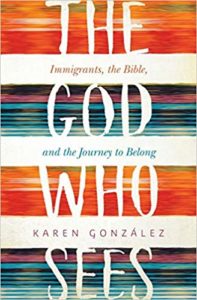 The God Who Sees: Immigrants, the Bible, and the Journey to Belong Karen Gonzalez (Herald Press) $16.99 We have occasionally shared that this author met an acquisitions editor for Herald Press at our store and while we were trying not to eavesdrop, they signed the contract for this very book. (And then, naturally, I sold her some books on immigration issues.) But while that is lovely and fun, the attention for this book must be turned upon Ms Gonzalez, who is a great storyteller, a great Bible teacher, and an immigration advocate who has been there. We have joked (as we often do with these kinds of books) that need to keep on under immigration issues, but also under the study of Bible characters, even though, it is also a memoir. And what a riveting story she has of seeking safety in another land. As it says on the back, “Here is a gripping journey of loss, alienation, and belonging.”
The God Who Sees: Immigrants, the Bible, and the Journey to Belong Karen Gonzalez (Herald Press) $16.99 We have occasionally shared that this author met an acquisitions editor for Herald Press at our store and while we were trying not to eavesdrop, they signed the contract for this very book. (And then, naturally, I sold her some books on immigration issues.) But while that is lovely and fun, the attention for this book must be turned upon Ms Gonzalez, who is a great storyteller, a great Bible teacher, and an immigration advocate who has been there. We have joked (as we often do with these kinds of books) that need to keep on under immigration issues, but also under the study of Bible characters, even though, it is also a memoir. And what a riveting story she has of seeking safety in another land. As it says on the back, “Here is a gripping journey of loss, alienation, and belonging.”
In picking this up again this week it dawns on me that I want to name it as a notable book and personal favorite this year, but that I want to suggest that it is award-winning in the Biblical studies category. Yes, she is one of the few Christian writers about immigration issues who herself if an immigrant, and yes, she tells a lot of her poignant story, making this a heckuva a great read. But alongside the personal narrative and the natural advocacy, there is, at the heart of the book, a study of characters in Scripture who have fled their homelands. Seen though the lens of migration,Ms. Gonzalez studies Hagar and Joesph, Ruth and, yes, Jesus.
There is, as many of us have come to realize in recent decades, a lot in the Bible about how to be welcoming to strangers and to have gracious policies about immigrants. And there are narratives of refugees and those who are our “intrepid heros of the faith who cross borders and seek refuge.”
Kudos to Herald Press for doing these fine kinds of books that are a bit genre-bending but ultimately very, very helpful. Good Scripture study and inspiring Biblical reflection should be mixed with real life narrative and should lead to real life social change. Karen Gonzalez gest this, and The God Who Sees tells her own story, and how it opened up her insight into God’s Word. I love the cover, too. Highly recommended.
BIBLICAL STUDIES BOOK OF THE YEAR
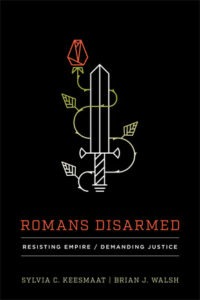 Romans Disarmed: Doing Justice/Resisting Empire Sylvia Keesmaat & Brian Walsh (Brazos Press) $26.99 There is no doubt in my mind that the most interesting and, I believe, the most important book of Biblical studies this year is Romans Disarmed: Doing Justice/Resisting Empire. In fact, I think it was my very favorite nonfiction read of 2019; certainly it was the most provocative and intellectually stimulating. You can study my lengthy explanation of it at our BookNotes review HERE, but you may want to know a few quick things, now: this is one of these rare books that is lively and culturally engaged with side trips into racial justice and creation care and urban poverty even as it diligently (if creatively) grapples with the exegesis and interpretation and meaning and application of the Biblical text.
Romans Disarmed: Doing Justice/Resisting Empire Sylvia Keesmaat & Brian Walsh (Brazos Press) $26.99 There is no doubt in my mind that the most interesting and, I believe, the most important book of Biblical studies this year is Romans Disarmed: Doing Justice/Resisting Empire. In fact, I think it was my very favorite nonfiction read of 2019; certainly it was the most provocative and intellectually stimulating. You can study my lengthy explanation of it at our BookNotes review HERE, but you may want to know a few quick things, now: this is one of these rare books that is lively and culturally engaged with side trips into racial justice and creation care and urban poverty even as it diligently (if creatively) grapples with the exegesis and interpretation and meaning and application of the Biblical text.
Years ago when thinking about Colossians with their friend N.T. Wright, they came up with the idea of an “anti-commentary” (which became 2004’s Colossians Remixed: Subverting the Empire; IVP Academic; $28.00.) It is a commentary; not quite line by line, but almost page by page. It is a commentary that points us to why we read the ancient Scripture in the first place and how in the world we interpret it well and live it out: it’s a “so what” sort of practical 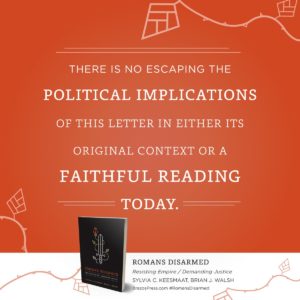 application reflection, read in light of and forged by their ministry making the world a better place. It’s not really an “anti-commentary” but a Biblical commentary as they are meant to be done with life and passion and color and controversy. That is, it isn’t about arcane history and syntax and word meanings in some abstract dogmatic sense, but it is about communities of fait (then and now) that are transformed by the story of God unfolding as they encounter the living Word. There is a lot of background scholarship and a lot of very contemporary cultural analysis and vivid, radical application. I bet it will offend you but I bet that it will bless you even more.
application reflection, read in light of and forged by their ministry making the world a better place. It’s not really an “anti-commentary” but a Biblical commentary as they are meant to be done with life and passion and color and controversy. That is, it isn’t about arcane history and syntax and word meanings in some abstract dogmatic sense, but it is about communities of fait (then and now) that are transformed by the story of God unfolding as they encounter the living Word. There is a lot of background scholarship and a lot of very contemporary cultural analysis and vivid, radical application. I bet it will offend you but I bet that it will bless you even more.
Their explanations of first century Roman life and how Paul’s pastoral letter would have been received and discussed and applied is spectacular. Their storytelling puts you into the culture of the day and even if it is a bit speculative (despite pages of studious footnotes) it makes the old book come alive. Their insistence that we strip the layers of accrued theological jargon from the letter and allow it to call us today into a Romans-like faith community that brought together rich and poor, the sexually conventional and those less so, slavers and those trafficked, Jews and Gentiles, is stunningly powerful, unlocking a revolutionary sort of application that is truly transformational. That is, it can be, if you are willing to be open to a new reading and consider that it may be a faithful, fruitful reading. And find some others to discuss it with and pledge to allow God to guide you towards experimenting with living it out, Romans style.
Sylvia is a creative and immensely talented Bible scholar and professor (whose work is cited by scholars like Richard Hays and others who write about echoes of the Old Testament found in the New, which she wrote about in her own PhD thesis under N.T. Wright decades ago.) Brian is an activist and campus pastor and prolific writer, having released books that are personal favorites of mine such as Transforming Vision, Truth Is Stranger Than It Used to Be, Subversive Christianity, Beyond Homelessness, Kicking at the Darkness, St. John Before Breakfast and Habakkuk Before Breakfast. (Many of these, quite intentionally, I suspect, are co-written with others.) Brian and Sylvia steward a permaculture-based farm while experimenting with sustainable agriculture and hospitable homesteading, even as he does campus ministry at the University of Toronto and works with several social justice organizations in the city.
Perhaps it is their faithful, generous praxis (as the scholars like to put it) that gives rise to their deep insights about the social location and anti-Empire themes in Romans or maybe it is their years of close attention to the Scripture that pushed them towards increasingly radical forms of counter-cultural lifestyles; perhaps a bit of both. In any case, Romans Disarmed just shimmers with passion for Word and world, for the Pauline epistle and the powers that deform our own world, for Romans and for modern resistance. In all its complicated, ambitious glory the hefty, provocative Romans Disarmed is akin to their wonderful and much-debated Colossians Remixed. I believe it is one of the most important contributions to Biblical studies in quite a while and certainly my favorite and most pondered book of 2019.
BRIAN WALSH & SYLVIA KEESMAAT TO SPEAK AT HEARTS & MINDS MARCH 23, 2020
You can learn more soon at our Hearts & Minds Facebook page but we are pleased to announce that Sylvia and Brian are coming to Hearts & Minds to present some of their ideas from Romans Disarmed. It is a great, great honor to have these two authors with us. It will be a generous and stimulating conversation, we’re sure…
Please join us here at the shop in Dallastown on March 23, a Monday night, at 7:00 pm.
BEST CONTRIBUTION TO CHRISTIAN LITERARY CRITICISM
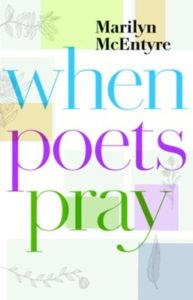 When Poets Pray Marilyn McEntyre (Eerdmans) $19.99 How can I not name this as a favorite this year, an award-deserving contribution to not only faith-based perspectives on literature, but, more, showing how ordinary readers can come to appreciate poetry more. Of course poetry does not need to be prayerful or prayed for people of religious faith to appreciate it – that would fly against all we stand for her, suggesting some cheap baptizing of so called “secular” work with some splash of the sacred. No. But still, this is a creative and generative experiment, a playful and maybe helpful suggestion of what it might be like to use these poems in this manner, to help us attend to them, and to allow them to point us to God and God’s graceful care for the world around us. This is not an essential use of poetry, but it is appropriate
When Poets Pray Marilyn McEntyre (Eerdmans) $19.99 How can I not name this as a favorite this year, an award-deserving contribution to not only faith-based perspectives on literature, but, more, showing how ordinary readers can come to appreciate poetry more. Of course poetry does not need to be prayerful or prayed for people of religious faith to appreciate it – that would fly against all we stand for her, suggesting some cheap baptizing of so called “secular” work with some splash of the sacred. No. But still, this is a creative and generative experiment, a playful and maybe helpful suggestion of what it might be like to use these poems in this manner, to help us attend to them, and to allow them to point us to God and God’s graceful care for the world around us. This is not an essential use of poetry, but it is appropriate
Marilyn McEntyre knows all this, of course, and meanders her way into explaining (beautifully, in pages I’ve read out loud more than once in programs and preaching this year) how words matter, how God can use language and literature. So. Here is Ms McEntyre’s earnest treatment of a handful of poems (most of which were most likely not firstly written as prayers, although perhaps some were) and how we might pray them. What a great way to deepen our appreciation of some of these poets and their poems – a few which you may know, a few which you, like me, may not. And what a creative way to use God’s good gift of words and language and poetry to deepen our prayer life. When Poets Pray is very nicely done by an author we very much respect. It made bookselling in 2019 that much more special.
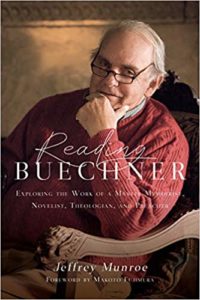 Reading Buechner: Exploring the Work of a Master Memoirist, Novelist, Theologian, and Preacher Jeffrey Munroe (IVP) $18.00 If we were being creative and playful and I had the energy to come up with clever-sounding award names, I’d award this something like “The Best Book Which Does Something We’ve Been Waiting For The Longest” or the “Finally, Somebody Did This in 2019” Book Award. In other words, we are thrilled to see this released into the marketplace and hope you, too, appreciate its wonderful significance.
Reading Buechner: Exploring the Work of a Master Memoirist, Novelist, Theologian, and Preacher Jeffrey Munroe (IVP) $18.00 If we were being creative and playful and I had the energy to come up with clever-sounding award names, I’d award this something like “The Best Book Which Does Something We’ve Been Waiting For The Longest” or the “Finally, Somebody Did This in 2019” Book Award. In other words, we are thrilled to see this released into the marketplace and hope you, too, appreciate its wonderful significance.
There have been some fine compilations of Mr. Buechner’s various works; the daily devotional called Listening To Your Life is still a sturdy and fine suggestion and there is a great compilation of his eloquent sermons (Secrets in the Dark) but heretofore the only introduction to his work is the quite serviceable and wise (and pricey) hardback The Book of Buechner: A Journey Through His Writings by Dale Cooper (WJK; $30.00.) I don’t think there has yet to be a really good and accessible guide to his life and work for beginners, including – as the subtitle suggests, his memoirs, his novels, his theological work, and his preaching. Reading Buechner: Exploring the Work of a Master Memoirist, Novelist, Theologian, and Preacher by Jeffrey Munroe is that book. Hoooray.
There are four good chapters under the first memoir section, exploring, in order, Buechner’s famous and beloved The Sacred Journey, Now and Then, Telling Secrets, and The Eyes of the Heart. Part II looks at Godric and Son of Laughter (but oddly, no Brenden.) Part III explores Wishful Thinking and Peculiar Treasures while the three chapters in Part IV are Telling the Truth: Tears with Great Laughter and Secrets in the Dark: The Wonder of Words, followed by a nice closing chapter called “Reading Buechner Today.” There is a fine epilogue and a good appendix offering an annotated bibliography. Kudos to Jeffrey Monroe (who is ordained in the RCA denomination) and who is the Vice President at Western Theological Seminary where he also teaches writing.
There’s a very nice foreword to Reading Buechner by artist Makoto Fujimura, too, which makes this all the more special. Even the warm cover seems just right. Thanks to all who played a part getting this book to us. What a gift.
A BOOK I MUST AWARD – BUT IN WHAT CATEGORY?
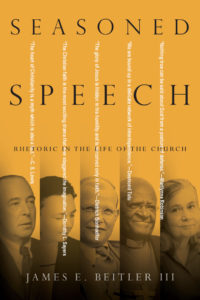 Seasoned Speech: Rhetoric in the Life of the Church James E. Beitler (IVP Academic) $25.00 Okay, I’ve already said that I don’t know what to do with this amazingly interesting, brilliantly conceived, one-of-a-kind book. Kudos to IVP for bringing such stimulating and thoughtful books to us, even if, as I suspect, many stores just won’t carry it. I hope that is not the case, as this book deserves to be widely read, seriously considered, discussed and somehow applied. Although it isn’t a book that is easily “applied” even though it is chock-full of wisdom, full of insights, and oh so very, very needed. Rhetoric? Yes, yes, you know: how do we “speak the truth in love” as the Epistle commands? How do we speak in a way that is relevant and timely and gracious and clear and profound and good and stimulating and… well, you get the picture. How we speak, persuade, honor the image of God in others, denounce evil and highlight beauty and goodness – whether we are in ordinary, everyday conversations or whether we are novelists or essayists, bloggers or preachers, we simply have to think harder about how to learn to be wise and compelling. Form follows function, I think somebody said so we should know that how we speak is as important as what we say. Seasoned Speech helps us explore that in amazingly healthy, thoughtful, good ways. And that’s half the fun!
Seasoned Speech: Rhetoric in the Life of the Church James E. Beitler (IVP Academic) $25.00 Okay, I’ve already said that I don’t know what to do with this amazingly interesting, brilliantly conceived, one-of-a-kind book. Kudos to IVP for bringing such stimulating and thoughtful books to us, even if, as I suspect, many stores just won’t carry it. I hope that is not the case, as this book deserves to be widely read, seriously considered, discussed and somehow applied. Although it isn’t a book that is easily “applied” even though it is chock-full of wisdom, full of insights, and oh so very, very needed. Rhetoric? Yes, yes, you know: how do we “speak the truth in love” as the Epistle commands? How do we speak in a way that is relevant and timely and gracious and clear and profound and good and stimulating and… well, you get the picture. How we speak, persuade, honor the image of God in others, denounce evil and highlight beauty and goodness – whether we are in ordinary, everyday conversations or whether we are novelists or essayists, bloggers or preachers, we simply have to think harder about how to learn to be wise and compelling. Form follows function, I think somebody said so we should know that how we speak is as important as what we say. Seasoned Speech helps us explore that in amazingly healthy, thoughtful, good ways. And that’s half the fun!
As I said in my previous review in BookNotes when this came out last Spring (even then I intuited it was genius and hoped it was as good as it looked) the title itself draws from Colossians 4: 6 where Paul wrote “Let your speech always be gracious, seasoned with salt, so that you may know how you ought to answer everyone.” In this sense, it stands somewhat with that great book from a few years ago Fool’s Talk: Recovering the Art of Christian Persuasion by Os Guinness, even if that works a bit with satire as a element of faithful communication in presenting compelling Christian truth in a skeptical, post-Christian world. Beitler brings a different approach and it is nothing short of award winning.
As you perhaps can see from the cover, what this author is doing in this grand and thoughtful work, is exploring different (faithful) rhetorical styles as evidenced by several different public intellectuals, faithful Christians who have made their mark before the watching world.
Seasoned Speech used as case studies the rhetorical and communication stylings of C.S. Lewis, Dorothy Sayers, Dietrich Bonhoeffer, Desmond Tutu, and Marilyn Robinson. What a great idea for a book, and what a splendid array of thinkers, writers, and communicators to help us grapple with how to have seasoned speech in different complicated settings.
I am sure we don’t have to explain to BookNotes fans that Lewis was the BBC apologist an intellectual Oxford don and a children’s storyteller. whose Mere Christianity explained faith as intellectually sound and a “myth which is also a fact,” His friend Dorothy Sayers was a playwright who said “The Christian faith is the most exciting drama that ever staggered the imagination.” Bonhoeffer – wow. But you know he mostly talked about Jesus in his humility. And Tutu – helped bring down apartheid by talking about justice and our interconnectedness, not unlike the great MLK, I’d say. Robinson is as Beitler notes, a complex figure, doing very intellectually profound essays in places like The New Yorker (and collection in heady volumes published by serious houses) as well as her more popular Pulitzer Prize winning novels like Gilead. Reminds me of Mr. Lewis in a way – Christian apologist, novelist, and essayist.
How does it all get said, by writers, dramatists, activists, public speakers and introverted authors? Can we speak truth, salty and seasoned with grace, even if we are denouncing public stupidity and great evil? Can we be winsome and strong, prophetic and persuasive? What can we learn from these great public saints of the 20th century?
This is truly one of the Best Books of 2019, notable and persuasive and, even though I fear it won’t be adequately studied, very, very important.
BOOK I MOST HATED TO LOVE / LOVED TO HATE
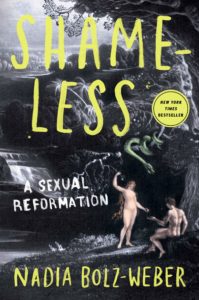 Shameless: A Sexual Reformation Nadia Bolz-Weber (Convergence) $25.00 Some years I use this playful heading to highlight a book I have very conflicted feelings about but which deserves to be named as a major book of the year. This captivating book surely fits that category and I know I’ll annoy both conservatives and progressives by saying I both truly loved and yet somewhat disapproved of this very moving, very tender, often right and sometimes troubling book. I couldn’t put it down, found myself cheering much of it, and was deeply moved by the reading experience and the great empathy and compassion it strives to engender. And that is true – Nadia is a caring pastor and advocate for those who don’t fit the mold – her own story, Pastrix: The Cranky, Beautiful Faith of a Sinner & Saint and the story of the church she founded (House for All Sinners and Saints in Denver) called Accidental Saints: Finding God in All the Wrong People are books I truly love. We’ve been to the church more than once, and was significantly blessed by the communal experience, the singing, the interesting Lutheran liturgy offered in a serious if campy aesthetic and the very good preaching. You may not like her cussing or her bohemian ethos, but it just made me weep to see so many who would be excluded and made to feel unwelcome in so many places so obviously safe and loved and called together around the gospel in that place. Fans or haters – and this author has plenty of both – I hope you’ll respect me naming this 2019 book in public. Although I found some parts unhelpful and inadequate, I mostly loved this amazingly written, very raw and touching exploration of a new sexual ethic, free of shame and joyful about the goodness of God’s gift of erotic pleasures.
Shameless: A Sexual Reformation Nadia Bolz-Weber (Convergence) $25.00 Some years I use this playful heading to highlight a book I have very conflicted feelings about but which deserves to be named as a major book of the year. This captivating book surely fits that category and I know I’ll annoy both conservatives and progressives by saying I both truly loved and yet somewhat disapproved of this very moving, very tender, often right and sometimes troubling book. I couldn’t put it down, found myself cheering much of it, and was deeply moved by the reading experience and the great empathy and compassion it strives to engender. And that is true – Nadia is a caring pastor and advocate for those who don’t fit the mold – her own story, Pastrix: The Cranky, Beautiful Faith of a Sinner & Saint and the story of the church she founded (House for All Sinners and Saints in Denver) called Accidental Saints: Finding God in All the Wrong People are books I truly love. We’ve been to the church more than once, and was significantly blessed by the communal experience, the singing, the interesting Lutheran liturgy offered in a serious if campy aesthetic and the very good preaching. You may not like her cussing or her bohemian ethos, but it just made me weep to see so many who would be excluded and made to feel unwelcome in so many places so obviously safe and loved and called together around the gospel in that place. Fans or haters – and this author has plenty of both – I hope you’ll respect me naming this 2019 book in public. Although I found some parts unhelpful and inadequate, I mostly loved this amazingly written, very raw and touching exploration of a new sexual ethic, free of shame and joyful about the goodness of God’s gift of erotic pleasures.
I am mostly with her in a call for a new sexual reformation, for a rejection of shame and embarrassment and an obsession with what some evangelicals call “purity.” We could use an honest admission that the Bible is less than perfectly clear about some things (including “purity”, the codes about which Jesus regularly dissed.) We need some pastoral encouragement for coping with the fact that many people are wounded around issues of sexuality (often by the church) and many are just different enough in their own funky inclinations and affections that we simply can’t just shame everyone and insist on legalistic compliance with attitudes and rules that are more Victorian than Biblical. I’m with Nadia that the church hasn’t had a robust doctrine of creation, or the body, or awe and beauty, and we haven’t taken the longings and relationships of younger adults as seriously as we might, either. For these and many more reasons, Shameless was a hard but important book for me to read.
Nadia’s stories are beautifully told and her empathy is inspiring. I think I’d read almost anything of hers because she is such an entertaining writer. (By the way: we stock her first, lesser-known book Salvation on the Small Screen: 24 Hours of Christian Television, so there ya go.)
Her extreme minimalism about all sexual ethics – basically do no harm – has been critiqued by those who cared enough to engage Bolz-Weber’s work seriously (see Wesley Hill’s fair response HERE for one good example) which illustrates some of my frustration with her shoddy thinking about it all. But as a caring storyteller and really good, colorful writer, as an earnest friend of the marginalized, and a pastor working for full inclusion in the church of those some might label deviants, she nearly wins the day, making reading Shameless a moving and poignant experience and unlike anything I’ve ever read. I don’t like it, fully, but I’ll never forget it.
BookNotes

SPECIAL
DISCOUNT
20% OFF
ANY BOOK MENTIONED
+++
order here
this takes you to the secure Hearts & Minds order form page
just tell us what you want
inquire here
if you have questions or need more information
just ask us what you want to know
Hearts & Minds 234 East Main Street Dallastown PA 17313
read@heartsandmindsbooks.com
717-246-3333

 Between stupid winter illnesses and out-of-store events and brand new or forthcoming books to read, our annual custom of announcing our Hearts & Minds Best Books of the Year has been late in coming. 2019 was a good one for readers of all sorts (even if nation-wide book sales were down) and I’m eager to honorably mention as many great titles as I can in this ramble through the halls of memorable reads.
Between stupid winter illnesses and out-of-store events and brand new or forthcoming books to read, our annual custom of announcing our Hearts & Minds Best Books of the Year has been late in coming. 2019 was a good one for readers of all sorts (even if nation-wide book sales were down) and I’m eager to honorably mention as many great titles as I can in this ramble through the halls of memorable reads.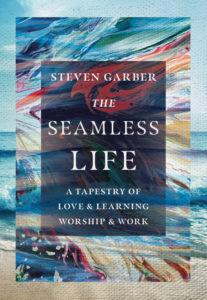 The Seamless Life: A Tapestry of Love & Learning, Worship & Work Steve Garber (IVP) $20.00 It is hard to declare decisively what my one favorite book was this year, but Garber’s A Seamless Life is up there, certainly among the top few. I read it twice, at least, and savored every page. The smallish, compact size and the textured paper and the vivid color photos makes me glad, the exquisite writing and the honest, sensible, yet radically integrated faith captures so much of my own heart. Is it fair to celebrate this as the Book of the Year if Steve is such a dear friend? I try to sort out if others will love it as I do if they don’t know Steve and Meg personally. I think so.
The Seamless Life: A Tapestry of Love & Learning, Worship & Work Steve Garber (IVP) $20.00 It is hard to declare decisively what my one favorite book was this year, but Garber’s A Seamless Life is up there, certainly among the top few. I read it twice, at least, and savored every page. The smallish, compact size and the textured paper and the vivid color photos makes me glad, the exquisite writing and the honest, sensible, yet radically integrated faith captures so much of my own heart. Is it fair to celebrate this as the Book of the Year if Steve is such a dear friend? I try to sort out if others will love it as I do if they don’t know Steve and Meg personally. I think so.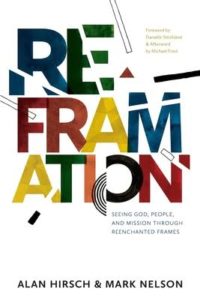
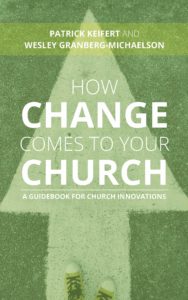 retreats or conferences we highlight many of these. From really helpful, practical guides like How Change Comes to Your Church: A Guidebook for Church Innovations by churchy geniuses Patrick Keifert & Wes Granberg-Michaelson (Eerdmans; $16.99) to the great Peter Steinke’s Uproar: Calm Leadership in Anxious Times (Rowman & Littlefield; $19.95) to the edgy and rare work by missional wild guys Alan Hirsch and Mark Nelson released this year called Reframation: Seeing God, People, and Mission Through Reenchanted Frames (100 Movements Publishing; $19.99) there has been a richness of new thinking and important publishing. I could list many that are worth honoring, but besides these, we wanted to mention these five exceptional ones at least:
retreats or conferences we highlight many of these. From really helpful, practical guides like How Change Comes to Your Church: A Guidebook for Church Innovations by churchy geniuses Patrick Keifert & Wes Granberg-Michaelson (Eerdmans; $16.99) to the great Peter Steinke’s Uproar: Calm Leadership in Anxious Times (Rowman & Littlefield; $19.95) to the edgy and rare work by missional wild guys Alan Hirsch and Mark Nelson released this year called Reframation: Seeing God, People, and Mission Through Reenchanted Frames (100 Movements Publishing; $19.99) there has been a richness of new thinking and important publishing. I could list many that are worth honoring, but besides these, we wanted to mention these five exceptional ones at least: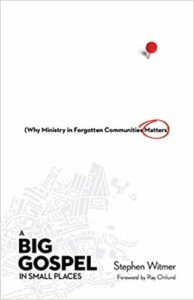 A Big Gospel in Small Places: Why Ministry in Forgotten Communities Matters Stephen Witmer (IVP/Praxis) $18.00 I am always on the look-out for books about smaller churches since, frankly, most congregations are not mega-churches and most are in smaller towns and are fairly, well, ordinary. Rural and rustbelt places without a lot of potential for growth, towns with “brain drain” and not many jobs for younger adults, you know. Sometimes we feel like we are in “forgotten places” and, in this book, Stephen Witmer cares. Not everybody may need this book, but for many small town clergy, this will be a huge inspiration. For most serving in rural and out of the way places, this will be a tonic. For those in these places, it may be obvious that God is with you but having a vibrant, thoughtful pastor remind you and further equip you may be just what you need.
A Big Gospel in Small Places: Why Ministry in Forgotten Communities Matters Stephen Witmer (IVP/Praxis) $18.00 I am always on the look-out for books about smaller churches since, frankly, most congregations are not mega-churches and most are in smaller towns and are fairly, well, ordinary. Rural and rustbelt places without a lot of potential for growth, towns with “brain drain” and not many jobs for younger adults, you know. Sometimes we feel like we are in “forgotten places” and, in this book, Stephen Witmer cares. Not everybody may need this book, but for many small town clergy, this will be a huge inspiration. For most serving in rural and out of the way places, this will be a tonic. For those in these places, it may be obvious that God is with you but having a vibrant, thoughtful pastor remind you and further equip you may be just what you need.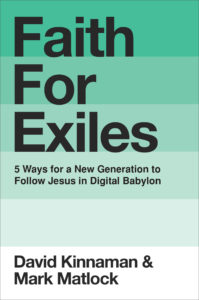 Faith for Exiles: 5 Ways for a New Generation to Follow Jesus in Digital Babylon David Kinnaman & Mark Matlock (Baker) $21.99 This is for anyone who is interested in retaining the young adults at their church – and who isn’t? – and is an exceptionally interesting, clear, and helpful resource. It offers an overview of the extensive research and evaluation Kinnaman’s organization (The Barna Group) has done on what keeps young adults from saying “you lost me” (as in Kinnaman’s 2011 must-read book that explored what goes wrong in young adult ministry, You Lost Me.) This new one shows what we might do right – five things needed to keep younger folks vibrant in faith and interested in your church.
Faith for Exiles: 5 Ways for a New Generation to Follow Jesus in Digital Babylon David Kinnaman & Mark Matlock (Baker) $21.99 This is for anyone who is interested in retaining the young adults at their church – and who isn’t? – and is an exceptionally interesting, clear, and helpful resource. It offers an overview of the extensive research and evaluation Kinnaman’s organization (The Barna Group) has done on what keeps young adults from saying “you lost me” (as in Kinnaman’s 2011 must-read book that explored what goes wrong in young adult ministry, You Lost Me.) This new one shows what we might do right – five things needed to keep younger folks vibrant in faith and interested in your church.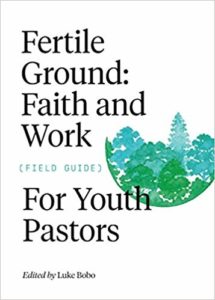 Fertile Ground: Faith and Work (Field Guide) for Youth Pastors edited by Luke Bobo (Made To Flourish) $7.99 This very small book is handsome and nicely made, a collection of five key chapters that help youth workers develop among their kids a robust and faithful foundation for thinking Christianly about culture, calling, work, and careers. We have written plenty about this topic in these BookNotes columns and have offered dozens if not hundreds of titles over the years that call us to deepen our appreciation of the value of work and to nurture a distinctively Biblical vision of both our perspective on and practices within our job sites. There has been precious few resources to wisely help youth take up this vision and hardly anything of book length to equip youth workers to talk to teens about all this,
Fertile Ground: Faith and Work (Field Guide) for Youth Pastors edited by Luke Bobo (Made To Flourish) $7.99 This very small book is handsome and nicely made, a collection of five key chapters that help youth workers develop among their kids a robust and faithful foundation for thinking Christianly about culture, calling, work, and careers. We have written plenty about this topic in these BookNotes columns and have offered dozens if not hundreds of titles over the years that call us to deepen our appreciation of the value of work and to nurture a distinctively Biblical vision of both our perspective on and practices within our job sites. There has been precious few resources to wisely help youth take up this vision and hardly anything of book length to equip youth workers to talk to teens about all this,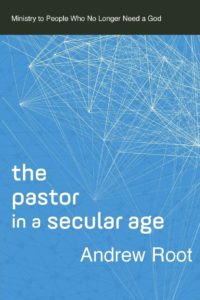 The Pastor in a Secular Age: Ministry to People Who No Longer Need a God Andrew Root (Baker Academic) $26.99 Oh man, oh man, this is surely one of the most interesting and notable books of the year! We’ve had great conversations with many customers (okay, maybe not many) who have found this to be an exceptional study, provocative and one that has created space for deep and valuable conversations. The idea of it is brilliant, and Andrew Root is an author we always, always, recommend (whether you end up agreeing with his conclusions or not.) He is a Professor of Youth and Family Ministry at Luther Seminary and is increasingly a very, very important thought leader. Happily, he seems to have the ear of both more conservative evangelicals and of mainline denominational folk. Just last week I highlighted it in a book talk with local friends from the United Church of Christ, encouraging pastors to work through it.
The Pastor in a Secular Age: Ministry to People Who No Longer Need a God Andrew Root (Baker Academic) $26.99 Oh man, oh man, this is surely one of the most interesting and notable books of the year! We’ve had great conversations with many customers (okay, maybe not many) who have found this to be an exceptional study, provocative and one that has created space for deep and valuable conversations. The idea of it is brilliant, and Andrew Root is an author we always, always, recommend (whether you end up agreeing with his conclusions or not.) He is a Professor of Youth and Family Ministry at Luther Seminary and is increasingly a very, very important thought leader. Happily, he seems to have the ear of both more conservative evangelicals and of mainline denominational folk. Just last week I highlighted it in a book talk with local friends from the United Church of Christ, encouraging pastors to work through it.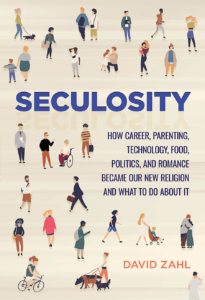 life. (I trust you know that many of our favorite books in recent years have been in conversation with Taylor’s hefty volume and considerable analysis: see, for instance, How (Not) To Be Secular: Reading Charles Taylor by James K.A. Smith, Disruptive Witness: Speaking Truth in a Distracted Age by Alan Nobel, In Search of the Common Good by Jake Meador, Seculosity: How Career, Parenting, Technology, Food, Politics, and Romance Became Our New Religion and What to Do about It by David Zahl, and Preaching: Communicating Faith in an Age of Skepticism which has an excellent chapter on Taylor.)
life. (I trust you know that many of our favorite books in recent years have been in conversation with Taylor’s hefty volume and considerable analysis: see, for instance, How (Not) To Be Secular: Reading Charles Taylor by James K.A. Smith, Disruptive Witness: Speaking Truth in a Distracted Age by Alan Nobel, In Search of the Common Good by Jake Meador, Seculosity: How Career, Parenting, Technology, Food, Politics, and Romance Became Our New Religion and What to Do about It by David Zahl, and Preaching: Communicating Faith in an Age of Skepticism which has an excellent chapter on Taylor.)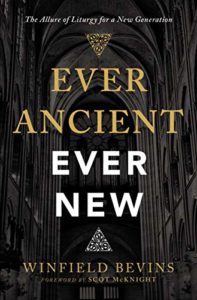 Every Ancient Ever New Winfield Bevins (Zondervan) $16.99 Bevins has written a lot over the years – he is a wise and admired United Methodist professor and director of church planting at Asbury Seminary in Wilmore, Kentucky. I didn’t need to glance at this for more than a second to know that it is one we should think about and one that many should be reading. Many have poked holes in the old chestnut among church people that young folks want “contemporary” worship and that “seeker sensitive” worship must necessarily be informal and pop-rock. Alas, as anyone who has been involved in these discussions for the last 25 years knows, it isn’t that simple. Exceptions abound. Liturgical services attract young people and sometimes when churches who have more conventional Protestant worship styles start a “contemporary” service, (with the often-spoken hope that it will attract the youth) the kids aren’t interested. Been there, friends?
Every Ancient Ever New Winfield Bevins (Zondervan) $16.99 Bevins has written a lot over the years – he is a wise and admired United Methodist professor and director of church planting at Asbury Seminary in Wilmore, Kentucky. I didn’t need to glance at this for more than a second to know that it is one we should think about and one that many should be reading. Many have poked holes in the old chestnut among church people that young folks want “contemporary” worship and that “seeker sensitive” worship must necessarily be informal and pop-rock. Alas, as anyone who has been involved in these discussions for the last 25 years knows, it isn’t that simple. Exceptions abound. Liturgical services attract young people and sometimes when churches who have more conventional Protestant worship styles start a “contemporary” service, (with the often-spoken hope that it will attract the youth) the kids aren’t interested. Been there, friends?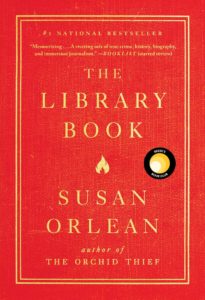 The Library Book Susan Orlean (Simon & Schuster) $16.99 Do you know the work of Susan Orlean, a staff writer for The New Yorker since the 1990s? She has written bunches of books, from travel writing to The Bullfighter Checks Her Makeup which is subtitled: My Encounters with Extraordinary People and is an unbelievable good writer. She is best known for the international best seller The Orchid Thief: A Story of Beauty and Obsession. Perhaps you’ve seen the film “Adaptation.”
The Library Book Susan Orlean (Simon & Schuster) $16.99 Do you know the work of Susan Orlean, a staff writer for The New Yorker since the 1990s? She has written bunches of books, from travel writing to The Bullfighter Checks Her Makeup which is subtitled: My Encounters with Extraordinary People and is an unbelievable good writer. She is best known for the international best seller The Orchid Thief: A Story of Beauty and Obsession. Perhaps you’ve seen the film “Adaptation.”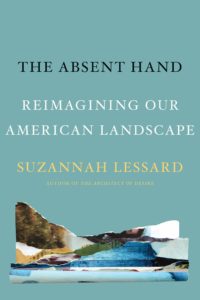 The Absent Hand: Reimagining our American Landscape Suzannah Lessard (Counterpoint) $26.00 I try to pay attention to the releases from this important publishing imprint (known for doing some of Wendell Berry’s best work) as they always do handsome books that are well written and substantive. This one was by a writer who has done highly respected, well-crafted pieces of journalism for The New Yorker for decades and was a founded editor of The Washington Monthly and who was known for the very wonderful The Architect of Desire: Beauty and Desire in the Stanford White Family.
The Absent Hand: Reimagining our American Landscape Suzannah Lessard (Counterpoint) $26.00 I try to pay attention to the releases from this important publishing imprint (known for doing some of Wendell Berry’s best work) as they always do handsome books that are well written and substantive. This one was by a writer who has done highly respected, well-crafted pieces of journalism for The New Yorker for decades and was a founded editor of The Washington Monthly and who was known for the very wonderful The Architect of Desire: Beauty and Desire in the Stanford White Family. 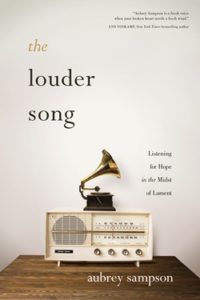 The Louder Song: Listening for Hope in the Midst of Lament Aubrey Sampson (NavPress) $15.99 When we promoted this as a pre-order early last year we called it “stunning.” Here is what else we wrote about it:
The Louder Song: Listening for Hope in the Midst of Lament Aubrey Sampson (NavPress) $15.99 When we promoted this as a pre-order early last year we called it “stunning.” Here is what else we wrote about it: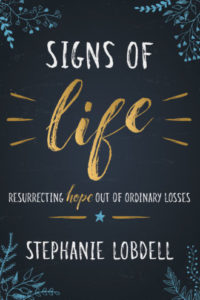 Signs of Life: Resurrection Hope Out of Ordinary Losses Stephanie Lobdell (Herald Press) $16.99 There are so many books written about coping with life’s hardships, with grief and loss and moving on and getting buy. So many tell hard stories, or they tell fairly ordinary stories in dynamic ways. A lot of them are pretty energizing and some have deep wisdom. But something often seems off; they are too glowing or too formulaic. Even the ones promising passion and authenticity and guts and grit are written by pretty bloggers who, if their lives were as raw as they claim, wouldn’t have time or the stomach for that kind of photo shoot and platform. There are a lot of fine books that are popular and helpful, but I’m impressed most with ones like this. This is wonderfully written without a lot of extraordinary drama or visionary zeal. She’s what we sometimes call “the real deal” or “salt of the Earth.”
Signs of Life: Resurrection Hope Out of Ordinary Losses Stephanie Lobdell (Herald Press) $16.99 There are so many books written about coping with life’s hardships, with grief and loss and moving on and getting buy. So many tell hard stories, or they tell fairly ordinary stories in dynamic ways. A lot of them are pretty energizing and some have deep wisdom. But something often seems off; they are too glowing or too formulaic. Even the ones promising passion and authenticity and guts and grit are written by pretty bloggers who, if their lives were as raw as they claim, wouldn’t have time or the stomach for that kind of photo shoot and platform. There are a lot of fine books that are popular and helpful, but I’m impressed most with ones like this. This is wonderfully written without a lot of extraordinary drama or visionary zeal. She’s what we sometimes call “the real deal” or “salt of the Earth.”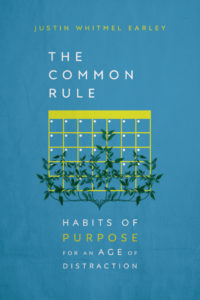 The Common Rule: Habits of Purpose for an Age of Distraction Justin Whitmel Earley (IVP) $18.00 I do not do well with time management books, admittedly to my detriment (and the detriment of those who have to wait for me, or live in my unsettled wake. I know.) I do not think I’m alone in finding guidebooks and manuals, workbooks and formulas, rules of life and programs for this or that a bit off-putting (and, in any event, not very effective.) How can we live into a balanced and thoughtful way of life that makes sense of things, helps us say yes and say no to stuff, live well with such a grand quest for margin and balance turning into a shtick or formula?
The Common Rule: Habits of Purpose for an Age of Distraction Justin Whitmel Earley (IVP) $18.00 I do not do well with time management books, admittedly to my detriment (and the detriment of those who have to wait for me, or live in my unsettled wake. I know.) I do not think I’m alone in finding guidebooks and manuals, workbooks and formulas, rules of life and programs for this or that a bit off-putting (and, in any event, not very effective.) How can we live into a balanced and thoughtful way of life that makes sense of things, helps us say yes and say no to stuff, live well with such a grand quest for margin and balance turning into a shtick or formula?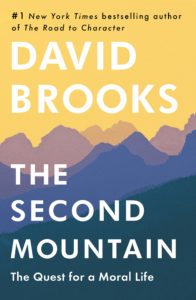 The Second Mountain: The Quest for a Moral Life David Brooks (Random House) $28.00 If you haven’t heard of this, you should know it – Second Mountain has been a big seller across the country and Mr. Brooks is known widely (as a fairly conservative columnist for the New York Times and a regular on NPR and PBS as a political pundit.) We have adored his many New York Times best-selling books – I still count Bobos in Paradise as one of my all time favs – and have admired how he brings together some of the best instincts of those on both sides of the political spectrum. For many liberals he is their favorite conservative and for many conservatives, they jokingly call him their favorite liberal.
The Second Mountain: The Quest for a Moral Life David Brooks (Random House) $28.00 If you haven’t heard of this, you should know it – Second Mountain has been a big seller across the country and Mr. Brooks is known widely (as a fairly conservative columnist for the New York Times and a regular on NPR and PBS as a political pundit.) We have adored his many New York Times best-selling books – I still count Bobos in Paradise as one of my all time favs – and have admired how he brings together some of the best instincts of those on both sides of the political spectrum. For many liberals he is their favorite conservative and for many conservatives, they jokingly call him their favorite liberal.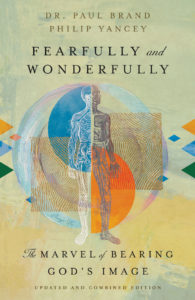 Fearfully and Wonderfully: The Marvel of Bearing God’s Image updated and combined edition Dr. Paul Brand & Philip Yancey (IVP) $25.00 We, of course, as any good bookstore would, stock all of Phil Yancey’s thoughtful and often exquisite books. One of his good friends and heroes (he was, by all accounts, a hero to anyone who knew him) Dr Paul Brand, was a missionary doctor (who specialized in hand surgery, learned in the hard school of treating leprosy in India.) The two of them team up to create to books that ruminated on the physiology of the human body – blood, skin, bones, cells, eyeballs and the like, studying things like breath and balance and pain. Their two books were called Fearfully and Wonderfully Made and In His Image. I had given the first as gifts before we even opened the bookstore, so we, naturally, have long loved these studies.
Fearfully and Wonderfully: The Marvel of Bearing God’s Image updated and combined edition Dr. Paul Brand & Philip Yancey (IVP) $25.00 We, of course, as any good bookstore would, stock all of Phil Yancey’s thoughtful and often exquisite books. One of his good friends and heroes (he was, by all accounts, a hero to anyone who knew him) Dr Paul Brand, was a missionary doctor (who specialized in hand surgery, learned in the hard school of treating leprosy in India.) The two of them team up to create to books that ruminated on the physiology of the human body – blood, skin, bones, cells, eyeballs and the like, studying things like breath and balance and pain. Their two books were called Fearfully and Wonderfully Made and In His Image. I had given the first as gifts before we even opened the bookstore, so we, naturally, have long loved these studies.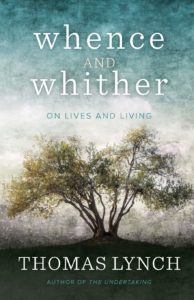 Whence and Whither: On Lives and Living Thomas Lynch (Westminster John Knox Press) $18.00 You know the way it is with us book lovers when we adore an author. We love his or her writing, sigh deeply over the word choices and remarkable sentence structure, admire his or her craft, and eagerly keep eyes peeled for new essays, perhaps, magazine pieces, or, please, maybe even a new book. Or – stop by beating heart! – two books.
Whence and Whither: On Lives and Living Thomas Lynch (Westminster John Knox Press) $18.00 You know the way it is with us book lovers when we adore an author. We love his or her writing, sigh deeply over the word choices and remarkable sentence structure, admire his or her craft, and eagerly keep eyes peeled for new essays, perhaps, magazine pieces, or, please, maybe even a new book. Or – stop by beating heart! – two books.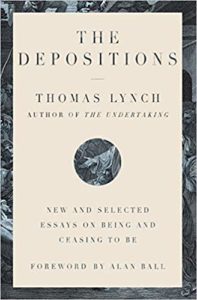 The Depositions: New and Selected Essays on Being and Ceasing to Be Thomas Lynch (Norton) $27.95 Imagine, if you are a serious music fan, consider: if your favorite group, critically acclaimed, intelligent, and a blast to enjoy, did a big, double greatest hits album with some new material (not just one new cut, but five!) You’d just have to get it, right? We are happy to promote this hefty, handsome hardback, a greatest hits release with new content. The publisher calls it “a wry and compassionate” collection so I mean nothing demeaning by calling it a greatest hits double album; it is mature and wonderful and valuable. One reviewer reminds us, plainly, that “for nearly four decades, poet, essayist, and small-town funeral director Thomas Lynch has probed the relations between the literary and mortuary arts…” which is true and notes his “signature blend of memoir, meditation, gallows humor, and poetic precision.” So much more could be said.
The Depositions: New and Selected Essays on Being and Ceasing to Be Thomas Lynch (Norton) $27.95 Imagine, if you are a serious music fan, consider: if your favorite group, critically acclaimed, intelligent, and a blast to enjoy, did a big, double greatest hits album with some new material (not just one new cut, but five!) You’d just have to get it, right? We are happy to promote this hefty, handsome hardback, a greatest hits release with new content. The publisher calls it “a wry and compassionate” collection so I mean nothing demeaning by calling it a greatest hits double album; it is mature and wonderful and valuable. One reviewer reminds us, plainly, that “for nearly four decades, poet, essayist, and small-town funeral director Thomas Lynch has probed the relations between the literary and mortuary arts…” which is true and notes his “signature blend of memoir, meditation, gallows humor, and poetic precision.” So much more could be said.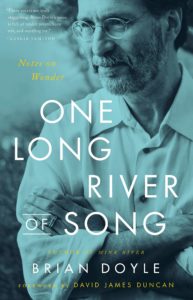 One Long River of Joy: Notes on Wonder Brian Doyle (Little, Brown) $27.00 I mentioned above that it was my friend Tom Osenbach that first encouraged me to read undertaker Tom Lynch. Brian Doyle is another author that we carried (well, at first at least a few of his quirky, artsy books, years ago) who was one of Tom’s favorites, an author that I knew was lovely and creative, but that I just didn’t quite read. In his many years coming in here before his unexpected death this past year, Tom reminded me how much he loved Brian Doyle, his novels, his essays, his poetry, his articles, his short stories. Doyle was an expansive thinker, at turns gentle and quiet, sometimes very funny, often unexpectedly furious, usually gentle and winsome and tender and wise. Tom read almost everything Doyle wrote; he often said that he sent donations to a Catholic College just so he could could get their brilliant alumni journal, a literary mag called The Portland Review for which Doyle regularly wrote and edited. Talk about a loyal reader. When we got One Long River of Joy this December I shed a tear or two, knowing I would have called Tom the day it arrived and he would have come in promptly for it.
One Long River of Joy: Notes on Wonder Brian Doyle (Little, Brown) $27.00 I mentioned above that it was my friend Tom Osenbach that first encouraged me to read undertaker Tom Lynch. Brian Doyle is another author that we carried (well, at first at least a few of his quirky, artsy books, years ago) who was one of Tom’s favorites, an author that I knew was lovely and creative, but that I just didn’t quite read. In his many years coming in here before his unexpected death this past year, Tom reminded me how much he loved Brian Doyle, his novels, his essays, his poetry, his articles, his short stories. Doyle was an expansive thinker, at turns gentle and quiet, sometimes very funny, often unexpectedly furious, usually gentle and winsome and tender and wise. Tom read almost everything Doyle wrote; he often said that he sent donations to a Catholic College just so he could could get their brilliant alumni journal, a literary mag called The Portland Review for which Doyle regularly wrote and edited. Talk about a loyal reader. When we got One Long River of Joy this December I shed a tear or two, knowing I would have called Tom the day it arrived and he would have come in promptly for it.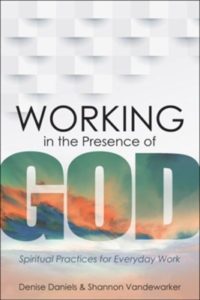 Working in the Presence of God: Spiritual Practices for Everyday Work Denise Daniels & Shannon Vandewarker (Hendrickson) $24.95 Many years there are bunches of books vying for my attention to name and mention at the end of the year. This year is no exception, as you can see – it is hard to name the best book in a given category. However, in this field, although there’s been other very good ones, this book is such a stand out, I must name it as a clear award winner. In our large selection of books in this field (some old, some fairly recent, and some quite new) Working in the Presence of God brings some very, very good contributions and even correctives. We are glad for it, and I must say I enjoyed it quite a lot.
Working in the Presence of God: Spiritual Practices for Everyday Work Denise Daniels & Shannon Vandewarker (Hendrickson) $24.95 Many years there are bunches of books vying for my attention to name and mention at the end of the year. This year is no exception, as you can see – it is hard to name the best book in a given category. However, in this field, although there’s been other very good ones, this book is such a stand out, I must name it as a clear award winner. In our large selection of books in this field (some old, some fairly recent, and some quite new) Working in the Presence of God brings some very, very good contributions and even correctives. We are glad for it, and I must say I enjoyed it quite a lot.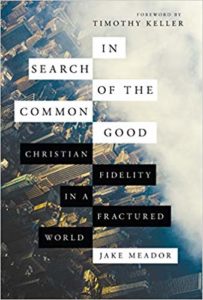 In Search of the Common Good: Christian Fidelity in a Fractured World Jake Meador (IVP) $23.00 As you know, I really like books about faith and public life, those whose Kingdom vision is about the Lordship of Christ over all of life. We are avid church folk and are mildly involved in the lives of several denominations and countless pastors, but I’m really most interested in the non-churchy aspects of Christian discipleship – missional, wholistic, what Steve Garber calls “seamless.” And so, I naturally was immediately drawn to this.
In Search of the Common Good: Christian Fidelity in a Fractured World Jake Meador (IVP) $23.00 As you know, I really like books about faith and public life, those whose Kingdom vision is about the Lordship of Christ over all of life. We are avid church folk and are mildly involved in the lives of several denominations and countless pastors, but I’m really most interested in the non-churchy aspects of Christian discipleship – missional, wholistic, what Steve Garber calls “seamless.” And so, I naturally was immediately drawn to this.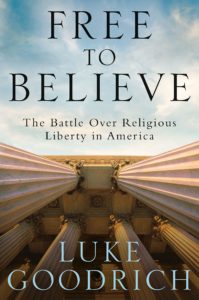 Free To Believe: The Battle over Religious Liberty in America Luke Goodrich (Multnomah) $24.00 I have read a number of books (from several perspectives) about this thorny question of faith-based conscientious objection, about whether or not there should be religious freedom exceptions (such as the bi-partisan policies set in place during the Clinton years which later were codified as RIFRA.) Luke Goodrich works for the fair-minded, pro-religious liberty legal group (The Beckett Fund) that wants to preserve the freedom of religious conscious in a pluralistic society. For instance, his organization (along with other such advocates for religious toleration such as the Christian Legal Society) have worked for the rights of (just for instance) Muslim prisoners to maintain beards while incarcerated as a matter of their religious practice and for the right of certain Native tribes to use otherwise illegal peyote for their religious ceremonies. Naturally, they have sided with the likes of Hobby Lobby and Masterpiece Cake insisting that, agree or not with their conservative convictions about certain sorts of birth control or marriage equality it’s unjust for the State to compel people to betray their deepest, religiously held principles.
Free To Believe: The Battle over Religious Liberty in America Luke Goodrich (Multnomah) $24.00 I have read a number of books (from several perspectives) about this thorny question of faith-based conscientious objection, about whether or not there should be religious freedom exceptions (such as the bi-partisan policies set in place during the Clinton years which later were codified as RIFRA.) Luke Goodrich works for the fair-minded, pro-religious liberty legal group (The Beckett Fund) that wants to preserve the freedom of religious conscious in a pluralistic society. For instance, his organization (along with other such advocates for religious toleration such as the Christian Legal Society) have worked for the rights of (just for instance) Muslim prisoners to maintain beards while incarcerated as a matter of their religious practice and for the right of certain Native tribes to use otherwise illegal peyote for their religious ceremonies. Naturally, they have sided with the likes of Hobby Lobby and Masterpiece Cake insisting that, agree or not with their conservative convictions about certain sorts of birth control or marriage equality it’s unjust for the State to compel people to betray their deepest, religiously held principles.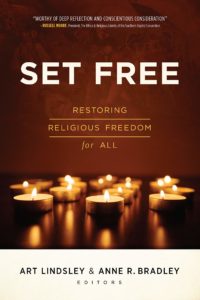 Set Free: Restoring Religious Freedom for All Art Lindsley & Anne Bradley (Abilene Christian University Press) $27.99 You may know my fondness for collections of essays, anthologies which you can dip into and read a chapter or two and move on to yet another chapter or two from a different author or with a different angle. Such collections are not big sellers, oddly, because they seem so very useful. Set Free is just this kind of invaluable resource. Neither Lindsley nor Bradley are lawyers or Constitutional scholars but they contracted some kind of a grant to do this project and set out to find those who could best help us all understand the foundational questions, the solid theology and the controversies around how to build “liberty and justice for all” in our pluralistic culture.
Set Free: Restoring Religious Freedom for All Art Lindsley & Anne Bradley (Abilene Christian University Press) $27.99 You may know my fondness for collections of essays, anthologies which you can dip into and read a chapter or two and move on to yet another chapter or two from a different author or with a different angle. Such collections are not big sellers, oddly, because they seem so very useful. Set Free is just this kind of invaluable resource. Neither Lindsley nor Bradley are lawyers or Constitutional scholars but they contracted some kind of a grant to do this project and set out to find those who could best help us all understand the foundational questions, the solid theology and the controversies around how to build “liberty and justice for all” in our pluralistic culture.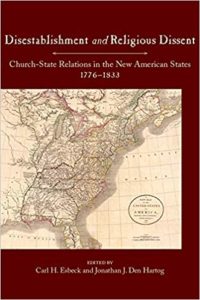 such. Beth and I had the opportunity to premier an amazing book on this with our friend Dr. Carl Esbeck this fall in Chicago. See the new and notable book he co-edited with Jonathan J. Den Hartog Disestablishment and Religious Dissent: Church-State Relations in the New American States, 1776-1833 University of Missouri Press; $45.00.) Congrats to him for editing such a fine book which studies each of the early colonies and how they moved towards this important, essential status. (Perhaps, though, I should get an award for dumbest move of a bookseller this year. When I first heard about this coming out I tried to sell it, sight unseen at that point, to Dr. John Fea, a customer and noted colonial historian. Little did I know at that point that John has a good chapter in it — chapter two, on New Jersey. Well, I tried. Ha.)
such. Beth and I had the opportunity to premier an amazing book on this with our friend Dr. Carl Esbeck this fall in Chicago. See the new and notable book he co-edited with Jonathan J. Den Hartog Disestablishment and Religious Dissent: Church-State Relations in the New American States, 1776-1833 University of Missouri Press; $45.00.) Congrats to him for editing such a fine book which studies each of the early colonies and how they moved towards this important, essential status. (Perhaps, though, I should get an award for dumbest move of a bookseller this year. When I first heard about this coming out I tried to sell it, sight unseen at that point, to Dr. John Fea, a customer and noted colonial historian. Little did I know at that point that John has a good chapter in it — chapter two, on New Jersey. Well, I tried. Ha.)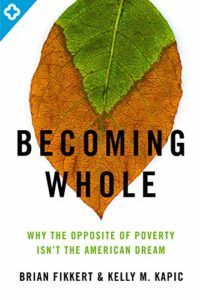 Becoming Whole: Why The Opposite of Poverty Isn’t the American Dream Brian Fikkert & Kelly M. Kapic (Moody Press) $15.99 I described this beautifully made paperback book at great length at a BookNotes column when it came out last Spring. I thought then, and continue to think now, that it is one of the best books of this sort I read this year. It is about worldviews and narratives and social imaginaries, so to speak, and it is a critique of the way in which too many church folks have allowed false stories such as the American Dream to shape our orienting principles, our own story. Yes, Becoming Whole is a prequel to the famous When Helping Hurts so it does get into anti-poverty ministries and alleviating brokenness from the lives of the marginalized. But it is more than a ‘social justice’ manifesto or a handbook for helping wisely. It is a grand vision of how to think about life from God’s perspective. What a clear-headed, helpful teaching tool it is for any of us tempted by the false hopes of the American dream, consumerism, individualism, autonomy, and self-actualization. There really is a better story.
Becoming Whole: Why The Opposite of Poverty Isn’t the American Dream Brian Fikkert & Kelly M. Kapic (Moody Press) $15.99 I described this beautifully made paperback book at great length at a BookNotes column when it came out last Spring. I thought then, and continue to think now, that it is one of the best books of this sort I read this year. It is about worldviews and narratives and social imaginaries, so to speak, and it is a critique of the way in which too many church folks have allowed false stories such as the American Dream to shape our orienting principles, our own story. Yes, Becoming Whole is a prequel to the famous When Helping Hurts so it does get into anti-poverty ministries and alleviating brokenness from the lives of the marginalized. But it is more than a ‘social justice’ manifesto or a handbook for helping wisely. It is a grand vision of how to think about life from God’s perspective. What a clear-headed, helpful teaching tool it is for any of us tempted by the false hopes of the American dream, consumerism, individualism, autonomy, and self-actualization. There really is a better story.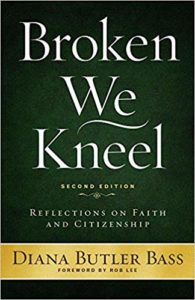 Broken We Kneel: Reflections of Faith and Citizenship second edition Diana Butler Bass (Church Publishing) $18.95 Oh my, I almost started a separate category for this award — “The Best Book to Be Re-Published This Year” or a gold medal for “the most important book I’ve wanted to see come back in print that finally did.” I’m glad for this (and gladly honor it here as I look back at 2019) in part because I just so very much loved it when it came out amidst the war cries and patriotism post-9-11. As a reasonable, thoughtful, Christ-like study of church-state stuff, it is fine. But it is written nearly as a memoir (the sort of personally embedded journalism Diana Butler Bass did so well in her spiritual memoir of various congregations she had been a part of in the lovely and insightful Strength for the Journey: A Pilgrimage of Faith in Community.) In Broken We Kneel she writes poignantly and even painfully about losing a church position because of her disagreements with the flag-waving in the sanctuary. Idolatrous civil religion and “my country right or wrong” dogmatism apparently are not only found among Southern Bible belt evangelicals, but among those who are sophisticated and liturgical and read Bonhoeffer and such. And so she quit.
Broken We Kneel: Reflections of Faith and Citizenship second edition Diana Butler Bass (Church Publishing) $18.95 Oh my, I almost started a separate category for this award — “The Best Book to Be Re-Published This Year” or a gold medal for “the most important book I’ve wanted to see come back in print that finally did.” I’m glad for this (and gladly honor it here as I look back at 2019) in part because I just so very much loved it when it came out amidst the war cries and patriotism post-9-11. As a reasonable, thoughtful, Christ-like study of church-state stuff, it is fine. But it is written nearly as a memoir (the sort of personally embedded journalism Diana Butler Bass did so well in her spiritual memoir of various congregations she had been a part of in the lovely and insightful Strength for the Journey: A Pilgrimage of Faith in Community.) In Broken We Kneel she writes poignantly and even painfully about losing a church position because of her disagreements with the flag-waving in the sanctuary. Idolatrous civil religion and “my country right or wrong” dogmatism apparently are not only found among Southern Bible belt evangelicals, but among those who are sophisticated and liturgical and read Bonhoeffer and such. And so she quit.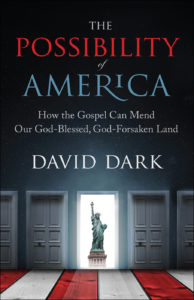 The Possibility of America: How the Gospel Can Mend Our God-Blessed, God-Forsaken Land David Dark (WJK) $17.00 I have been pondering this book for years, it seems. A somewhat different version with a different title came out in 2005 and we raved about it then. This is a considerably re-worked, expanded and obviously updated edition, and it deserves once again to be named as a grave and requisite voice.
The Possibility of America: How the Gospel Can Mend Our God-Blessed, God-Forsaken Land David Dark (WJK) $17.00 I have been pondering this book for years, it seems. A somewhat different version with a different title came out in 2005 and we raved about it then. This is a considerably re-worked, expanded and obviously updated edition, and it deserves once again to be named as a grave and requisite voice.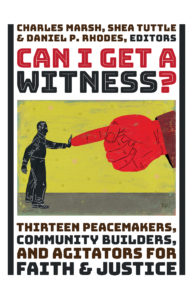 Dark, by the way, did a marvelous chapter on Fr. Berrigan in an excellent anthology edited by Charles Marsh, Shea Tuttle, and Daniel Rhodes called Can I Get a Witness: Thirteen Peacemakers, Community Builders, and Agitators for Faith & Justice (Eerdmans; $26.99) that was created in conjunction with the Project of Lived Theology at the University of Virginia. It, too, deserves acclaim as a notable book of 2019. There are 13 different chapters by 13 excellent writers and thinkers, exploring the embodiment of faith and compassion among 13 faith-based community activists such as Cesar Chavez, Mahalia Jackson, Dorothy Day, and Richard Twiss.
Dark, by the way, did a marvelous chapter on Fr. Berrigan in an excellent anthology edited by Charles Marsh, Shea Tuttle, and Daniel Rhodes called Can I Get a Witness: Thirteen Peacemakers, Community Builders, and Agitators for Faith & Justice (Eerdmans; $26.99) that was created in conjunction with the Project of Lived Theology at the University of Virginia. It, too, deserves acclaim as a notable book of 2019. There are 13 different chapters by 13 excellent writers and thinkers, exploring the embodiment of faith and compassion among 13 faith-based community activists such as Cesar Chavez, Mahalia Jackson, Dorothy Day, and Richard Twiss.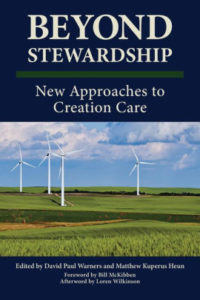 Beyond Stewardship: New Approaches to Creation Care edited by David Paul Warners & Matthew Kuperus Heun with a foreword by Bill McKibben (Calvin College Press) $17.00 I hate to sound like a broken record but it isn’t uncommon that my favorite books of the year and my choices for the most important books of the year are, in fact, books I’ve already reviewed here at BookNotes. When I heard about this one being put together by a team from Calvin University, I knew it would be great. Because one of the dearest friends to Beth and me (Gail Guenst Heffner) was deeply involved in the project, I started to read it the hour it arrived. (Sorry to our staff who sometimes wonders why I’ve disappeared in the middle of the day.) It didn’t take long for me to realize these were ground-breaking, profound, serious, yet accessible essays, and that Beyond Stewardship would be one of the most important contributions to the conversations about Christian creation-care in many a year. A book of the year? Absolutely!
Beyond Stewardship: New Approaches to Creation Care edited by David Paul Warners & Matthew Kuperus Heun with a foreword by Bill McKibben (Calvin College Press) $17.00 I hate to sound like a broken record but it isn’t uncommon that my favorite books of the year and my choices for the most important books of the year are, in fact, books I’ve already reviewed here at BookNotes. When I heard about this one being put together by a team from Calvin University, I knew it would be great. Because one of the dearest friends to Beth and me (Gail Guenst Heffner) was deeply involved in the project, I started to read it the hour it arrived. (Sorry to our staff who sometimes wonders why I’ve disappeared in the middle of the day.) It didn’t take long for me to realize these were ground-breaking, profound, serious, yet accessible essays, and that Beyond Stewardship would be one of the most important contributions to the conversations about Christian creation-care in many a year. A book of the year? Absolutely!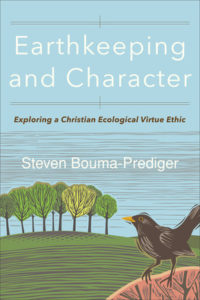 Earthkeeping and Character: Exploring a Christian Ecological Virtue Ethic Steven Bouma-Prediger (Baker Academic) $24.99 I wrote about this tremendous book at BookNotes this fall and I am fully glad to loudly say this was one of the best books I read this year. I loved its semi-scholarly ruminations on virtue theory and character formation and how the writing shifted a bit in tone, just when the going might have been getting heavy, with a splendid story, a surprisingly beautiful Bible exposition, or a mature insight about spiritual formation. In this sense, Bouma-Prediger reminds me a bit of his friend James K.A. Smith; that is, he’s a serious philosopher and a fully engaged cultural activist and a beloved, inspiring teacher with a gift of being a great communicator. He’s not an armchair philosopher or ivory tower thinker; deep as he may be, Bouma-Prediger does his ecological thinking fully immersed in the outdoors (and, it seems, in communion with a broader community of scholars, writers, activists and students.) The stories of taking students camping or backpacking or on ecological field tips make the book really come alive.
Earthkeeping and Character: Exploring a Christian Ecological Virtue Ethic Steven Bouma-Prediger (Baker Academic) $24.99 I wrote about this tremendous book at BookNotes this fall and I am fully glad to loudly say this was one of the best books I read this year. I loved its semi-scholarly ruminations on virtue theory and character formation and how the writing shifted a bit in tone, just when the going might have been getting heavy, with a splendid story, a surprisingly beautiful Bible exposition, or a mature insight about spiritual formation. In this sense, Bouma-Prediger reminds me a bit of his friend James K.A. Smith; that is, he’s a serious philosopher and a fully engaged cultural activist and a beloved, inspiring teacher with a gift of being a great communicator. He’s not an armchair philosopher or ivory tower thinker; deep as he may be, Bouma-Prediger does his ecological thinking fully immersed in the outdoors (and, it seems, in communion with a broader community of scholars, writers, activists and students.) The stories of taking students camping or backpacking or on ecological field tips make the book really come alive.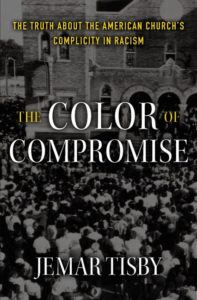 The Color of Compromise: The Truth about the American Church’s Complicity in Racism Jemar Tisby (Zondervan) $21.99 I hope you recall that we’ve mentioned this from time to time, reviewed it earlier at BookNotes and (if you have been with us at various events) may know we’ve pushed it hard. We sold out at Jubilee 2019 when it was new, and we hope the buzz on this book has not subsided. It truly is an historic book in many ways.
The Color of Compromise: The Truth about the American Church’s Complicity in Racism Jemar Tisby (Zondervan) $21.99 I hope you recall that we’ve mentioned this from time to time, reviewed it earlier at BookNotes and (if you have been with us at various events) may know we’ve pushed it hard. We sold out at Jubilee 2019 when it was new, and we hope the buzz on this book has not subsided. It truly is an historic book in many ways.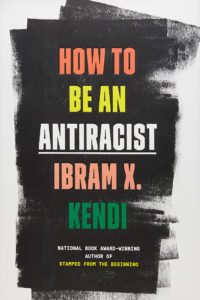 How To Be An Antiracist Ibram X, Kendi (One World) $27.00 You may know the 600+ page National Book Award-winning volume by Ibram X. Kendi called Stamped from the Beginning which was subtitled The Definitive History of Racist Ideas in America (Bold Type Books; $19.99.) It received remarkable attention, even as it was a dense (but readable) study of American anti-black ideas in the history of race. It was important. I mean very important.
How To Be An Antiracist Ibram X, Kendi (One World) $27.00 You may know the 600+ page National Book Award-winning volume by Ibram X. Kendi called Stamped from the Beginning which was subtitled The Definitive History of Racist Ideas in America (Bold Type Books; $19.99.) It received remarkable attention, even as it was a dense (but readable) study of American anti-black ideas in the history of race. It was important. I mean very important.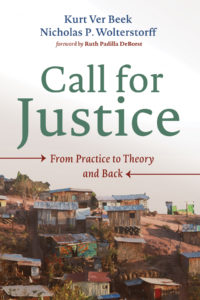 Call for Justice: From Practice to Theory and Back Kurt Ver Beek & Nicholas P. Wolterstorff (Cascade) $26.00 This book just came out at the end of the year and although there are a plethora of great books on social justice, wholistic evangelism, Kingdom mission, and such, there is simply no book we know of that does what this does. It is remarkable and deserves to be celebrated and honored. We are naming it one of the great books of 2019.
Call for Justice: From Practice to Theory and Back Kurt Ver Beek & Nicholas P. Wolterstorff (Cascade) $26.00 This book just came out at the end of the year and although there are a plethora of great books on social justice, wholistic evangelism, Kingdom mission, and such, there is simply no book we know of that does what this does. It is remarkable and deserves to be celebrated and honored. We are naming it one of the great books of 2019.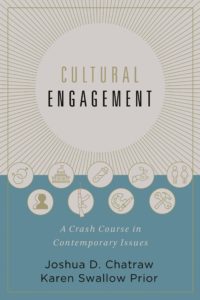 Cultural Engagement: A Crash Course in Contemporary Issues Joshua Chatraw & Karen Swallow Prior (Zondervan) $29.99 I am not always confident that these books that have a dozen different topics in them are that useful. The viewpoints may be shallow or overly biased in one or the other directions and the topics covered may or may not be the most timely. Happily, Cultural Engagement gets is pretty right on both scores.
Cultural Engagement: A Crash Course in Contemporary Issues Joshua Chatraw & Karen Swallow Prior (Zondervan) $29.99 I am not always confident that these books that have a dozen different topics in them are that useful. The viewpoints may be shallow or overly biased in one or the other directions and the topics covered may or may not be the most timely. Happily, Cultural Engagement gets is pretty right on both scores.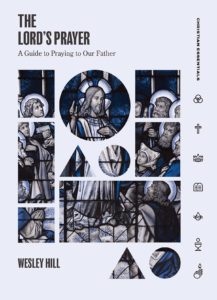 The Lord’s Prayer: A Guide to the Our Father Wesley Hill (Lexham Press) $15.99 I want to be brief in my explanation of this because it is such a wonderful little book that deserves to be encountered by you, gentle reader, in a fresh way, without me citing too much. I will, as is sometimes my approach, just tell you a bit about the author and the book and invite you to trust me on this: it is a marvelous read, spiritually edifying, good for those who are just beginning to study the topic of prayer and good for those who want a brief but lucid theological account of the famous passage in Matthew now called “The Lord’s Prayer” or “The Our Father.”
The Lord’s Prayer: A Guide to the Our Father Wesley Hill (Lexham Press) $15.99 I want to be brief in my explanation of this because it is such a wonderful little book that deserves to be encountered by you, gentle reader, in a fresh way, without me citing too much. I will, as is sometimes my approach, just tell you a bit about the author and the book and invite you to trust me on this: it is a marvelous read, spiritually edifying, good for those who are just beginning to study the topic of prayer and good for those who want a brief but lucid theological account of the famous passage in Matthew now called “The Lord’s Prayer” or “The Our Father.”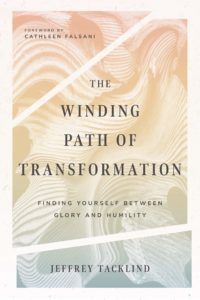 The Winding Path of Transformation: Finding Yourself Between Glory and Humility Jeffrey Tacklind (IVP/formatio) $17.00 We stock all the excellent and moving books in the formatio line published by IVP and they remain some of the best books being published these days on the interior life, spirituality, and walking deeply in ways shaped by the practices of faith that lead us into the ways of Jesus. Yes, that’s a mouthful and while we could just say books in the formatio line are about spirituality, they are not all about prayer and monasticism. As with The Winding Path by Jeffrey Tacklind, many of their books are beautifully written and as much about living a vibrant life in the world as finding that inner quietude that we sometimes think of as spirituality.
The Winding Path of Transformation: Finding Yourself Between Glory and Humility Jeffrey Tacklind (IVP/formatio) $17.00 We stock all the excellent and moving books in the formatio line published by IVP and they remain some of the best books being published these days on the interior life, spirituality, and walking deeply in ways shaped by the practices of faith that lead us into the ways of Jesus. Yes, that’s a mouthful and while we could just say books in the formatio line are about spirituality, they are not all about prayer and monasticism. As with The Winding Path by Jeffrey Tacklind, many of their books are beautifully written and as much about living a vibrant life in the world as finding that inner quietude that we sometimes think of as spirituality.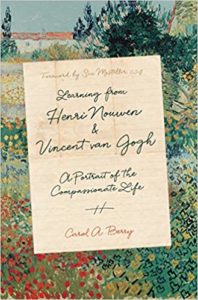 Learning from Henri Nouwen & Vincent van Gogh: A Portrait of the Compassionate Life Carol. A Berry (IVP/formatio) $22.00 For anyone who cares about Henri Nouwen and his gentle, often incisive insights into the interior life, a new book about his teachings would be seen as a notable book any year. Worthy of special celebration — and kudos to IVP for helping bring this to light — is the extraordinary story behind Carol Berry’s Learning from Nouwen and Van Gogh book. You may know that Henri was early in his career a chaplain at Yale and he famously taught a few classes at the Divinity school there. (The fruit of one of those is the popular book Compassion that Nouwen co-wrote.) Just one year he taught a course on the virtues and pains of living a compassionate life and he drew in that class on the life, pain, vision, art, and spiritual of Vincent Van Gogh. Many of often wondered what that class was like, but until recently no one who was actually in the class came forward.
Learning from Henri Nouwen & Vincent van Gogh: A Portrait of the Compassionate Life Carol. A Berry (IVP/formatio) $22.00 For anyone who cares about Henri Nouwen and his gentle, often incisive insights into the interior life, a new book about his teachings would be seen as a notable book any year. Worthy of special celebration — and kudos to IVP for helping bring this to light — is the extraordinary story behind Carol Berry’s Learning from Nouwen and Van Gogh book. You may know that Henri was early in his career a chaplain at Yale and he famously taught a few classes at the Divinity school there. (The fruit of one of those is the popular book Compassion that Nouwen co-wrote.) Just one year he taught a course on the virtues and pains of living a compassionate life and he drew in that class on the life, pain, vision, art, and spiritual of Vincent Van Gogh. Many of often wondered what that class was like, but until recently no one who was actually in the class came forward.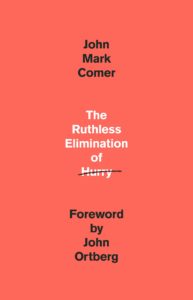 The Ruthless Elimination of Hurry John Mark Comer (Waterbrook) $23.99 This is a book that I’ve mentioned several times at BookNotes, so here is what I wrote right before Christmas when I was touting it as a great gift book. I’m happy to note it here, yet again, as one of my favorite reads of 2019.
The Ruthless Elimination of Hurry John Mark Comer (Waterbrook) $23.99 This is a book that I’ve mentioned several times at BookNotes, so here is what I wrote right before Christmas when I was touting it as a great gift book. I’m happy to note it here, yet again, as one of my favorite reads of 2019.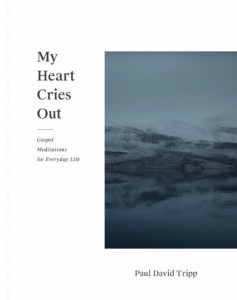 My Heart Cries Out: Gospel Meditations for Everyday Life Paul David Tripp (Crossway) $24.99 This is a book that deserves some award, some honorary mention for a number of compelling reasons, I think. Kudos to the publisher for doing this book so nicely, in a larger sized paperback with full color photos includes. Perhaps a lesser-known author wouldn’t have been given the opportunity to do this outside-of-the box book, but we are glad. Tripp is the author of a number of books which offer a clear sense of the gospel – salvation through faith alone, justification through the Cross of Christ, healthy human restoration based on the hope of God’s mercy, inviting us to grit and glory inspired by gospel-centered teaching that is solid and profound. He’s a counselor and author of books about Biblical counseling. He has written about redemptive understandings to money, to sexuality, to marriage and parenting. He has a book on awe, a book on helping others. His biggest seller, though, is a year-long devotional called New Morning Mercies. It is very good. Here, though, he has given us a book of devotional poetry.
My Heart Cries Out: Gospel Meditations for Everyday Life Paul David Tripp (Crossway) $24.99 This is a book that deserves some award, some honorary mention for a number of compelling reasons, I think. Kudos to the publisher for doing this book so nicely, in a larger sized paperback with full color photos includes. Perhaps a lesser-known author wouldn’t have been given the opportunity to do this outside-of-the box book, but we are glad. Tripp is the author of a number of books which offer a clear sense of the gospel – salvation through faith alone, justification through the Cross of Christ, healthy human restoration based on the hope of God’s mercy, inviting us to grit and glory inspired by gospel-centered teaching that is solid and profound. He’s a counselor and author of books about Biblical counseling. He has written about redemptive understandings to money, to sexuality, to marriage and parenting. He has a book on awe, a book on helping others. His biggest seller, though, is a year-long devotional called New Morning Mercies. It is very good. Here, though, he has given us a book of devotional poetry.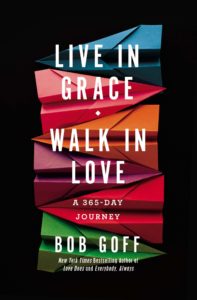 Live in Grace, Walk in Love: A 365-Day Journey Bob Goff (Thomas Nelson) $16.99 We have mentioned this several times at BookNotes, from when we first announced it as a pre-order to suggesting it as a Christmas gift. I have to admit I didn’t read this an entry a day as you’re suppose to, but plowed through dozens of pages at a sitting. I just couldn’t stop – what fun, what good advice, how helpful, inspiring and challenging. I am confident I want to name it as a favorite book of the year, but not sure it should be listed here in this category of books about spirituality; it is not about contemplation or prayerfulness, really, doesn’t cite Henri Nouwen or Ruth Haley Barton or Richard Rohr. But it is (supposed to be) a daily devotional, so I’ll list it here, anyway. Read in prayerfully each day for a year, or swallow it in big gulps. Live in Grace… is a gem that will help you in your faith and discipleship, yes, your knowledge of God and your joy in the Lord.
Live in Grace, Walk in Love: A 365-Day Journey Bob Goff (Thomas Nelson) $16.99 We have mentioned this several times at BookNotes, from when we first announced it as a pre-order to suggesting it as a Christmas gift. I have to admit I didn’t read this an entry a day as you’re suppose to, but plowed through dozens of pages at a sitting. I just couldn’t stop – what fun, what good advice, how helpful, inspiring and challenging. I am confident I want to name it as a favorite book of the year, but not sure it should be listed here in this category of books about spirituality; it is not about contemplation or prayerfulness, really, doesn’t cite Henri Nouwen or Ruth Haley Barton or Richard Rohr. But it is (supposed to be) a daily devotional, so I’ll list it here, anyway. Read in prayerfully each day for a year, or swallow it in big gulps. Live in Grace… is a gem that will help you in your faith and discipleship, yes, your knowledge of God and your joy in the Lord.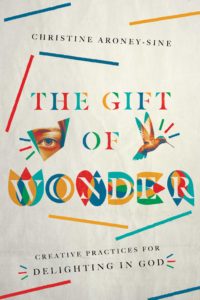 The Gift of Wonder: Creative Practices for Delighting in God Christine Aroney-Sine (IVP) $16.00 There are many books these days that invite us to find God in the ordinary. We have a whole section of books like this with more than a dozen mediations on the spirituality of the mundane. This is one that almost didn’t capture my attention – something about the cover really turned me off – but I know the author and respect her immensely. I’ve read other books of hers about contemplative spirituality and her great little morning and evening prayer book. I also respect her husband, Tom Sine, and appreciate his feisty books to be involved in social change (including the recent Live Like You Give a Damn – Join the Changemaking Celebration.)Together, Tom and Christine have forged an innovative life of service, justice, community, and celebration. If she has insights about living well in the real world, I want to hear them.
The Gift of Wonder: Creative Practices for Delighting in God Christine Aroney-Sine (IVP) $16.00 There are many books these days that invite us to find God in the ordinary. We have a whole section of books like this with more than a dozen mediations on the spirituality of the mundane. This is one that almost didn’t capture my attention – something about the cover really turned me off – but I know the author and respect her immensely. I’ve read other books of hers about contemplative spirituality and her great little morning and evening prayer book. I also respect her husband, Tom Sine, and appreciate his feisty books to be involved in social change (including the recent Live Like You Give a Damn – Join the Changemaking Celebration.)Together, Tom and Christine have forged an innovative life of service, justice, community, and celebration. If she has insights about living well in the real world, I want to hear them.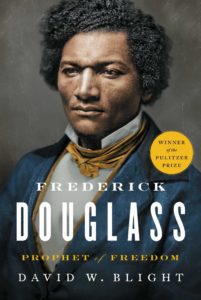 Frederick Douglas: Prophet of Freedom David Blight (Simon and Schuster) $22.00 Okay, I’m not going to actually review this since I have not nearly finished it yet and am hardly competent to do so. (It is over 900 pages, after all; I’m not going to lie – I have a ways to go. But, oh my…) It came out at the end of 2018 and was a pricey, if gorgeous, thick, deckle-edged hardback. It had full-page ads in places like The New York Times Book Review laden with quotes saying it was one of the best books of our time, magisterial, etc. It sold out everywhere immediately and was unavailable for the rest of the year. Early in 2019 it won the Pulitzer Prize in History, earned the coveted Bancroft Prize and the prestigious Lincoln award. I had hoped the paperback would land in 2019 so I could name it as the best paperback release of a former hardback. Given its extraordinary attention and rave reviews (both as a wonderfully-written historical biography and as a every so timely, urgently important reflection on an under-appreciated racial justice warrior) it was highly anticipated and eagerly awaited. Alas, it came the first week of January bearing a 2020 pub date.
Frederick Douglas: Prophet of Freedom David Blight (Simon and Schuster) $22.00 Okay, I’m not going to actually review this since I have not nearly finished it yet and am hardly competent to do so. (It is over 900 pages, after all; I’m not going to lie – I have a ways to go. But, oh my…) It came out at the end of 2018 and was a pricey, if gorgeous, thick, deckle-edged hardback. It had full-page ads in places like The New York Times Book Review laden with quotes saying it was one of the best books of our time, magisterial, etc. It sold out everywhere immediately and was unavailable for the rest of the year. Early in 2019 it won the Pulitzer Prize in History, earned the coveted Bancroft Prize and the prestigious Lincoln award. I had hoped the paperback would land in 2019 so I could name it as the best paperback release of a former hardback. Given its extraordinary attention and rave reviews (both as a wonderfully-written historical biography and as a every so timely, urgently important reflection on an under-appreciated racial justice warrior) it was highly anticipated and eagerly awaited. Alas, it came the first week of January bearing a 2020 pub date.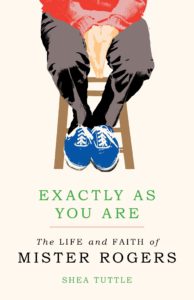 Exactly As You Are: The Life and Faith of Mr. Rogers Shea Tuttle (Eerdmans) $23.99 I know I don’t need to tell you much about the beloved Mr. Rogers. This book has garnered rave reviews from the standard bookish reviewers – The Library Journal gave it a starred review calling it “warmly written.” Publishers Weekly calls it “delightful” and “satisfying” and more. Most importantly, Michael Long, who wrote the must read study Peaceful Neighbor: Discovering the Countercultural Mister Roberts says it is “By far the best book available on America’s beloved neighbor.” It becomes clear for those who have eyes to see it that Ms Tuttle has taken great (as she says in her delightful acknowledgements) encouragement from Mike Long and that she relied on some of his archival research into Fred Rogers’ letters where he often explained the meaning of various episodes. If Long gave us background and context for the Presbyterian clergyman’s television ministry, Tuttle fleshes it out in a full on, serious, wonderfully-written biography.
Exactly As You Are: The Life and Faith of Mr. Rogers Shea Tuttle (Eerdmans) $23.99 I know I don’t need to tell you much about the beloved Mr. Rogers. This book has garnered rave reviews from the standard bookish reviewers – The Library Journal gave it a starred review calling it “warmly written.” Publishers Weekly calls it “delightful” and “satisfying” and more. Most importantly, Michael Long, who wrote the must read study Peaceful Neighbor: Discovering the Countercultural Mister Roberts says it is “By far the best book available on America’s beloved neighbor.” It becomes clear for those who have eyes to see it that Ms Tuttle has taken great (as she says in her delightful acknowledgements) encouragement from Mike Long and that she relied on some of his archival research into Fred Rogers’ letters where he often explained the meaning of various episodes. If Long gave us background and context for the Presbyterian clergyman’s television ministry, Tuttle fleshes it out in a full on, serious, wonderfully-written biography.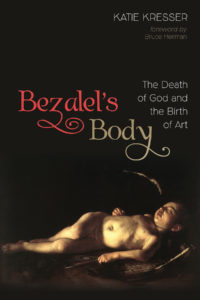 Bezalel’s Body: The Death of God and the Birth of Art Katie Kresser (Cascade) $28.00 I am not positive this deserves a “Best Book of 2019” and I am not finished my work with it yet. But I can assure you that for anyone who has read in the “faith and the arts” movement, who is part of organizations like CIVA (Christians in the Visual Arts), you will find Katie Kresser’s work to be an invaluable encouragement to your own on-going thinking and re-thinking about the very meaning and purpose and value of art. Dr. Kresser is Professor of Art History at Seattle Pacific University. She received her PhD from Harvard. This is a very studious and notable work.
Bezalel’s Body: The Death of God and the Birth of Art Katie Kresser (Cascade) $28.00 I am not positive this deserves a “Best Book of 2019” and I am not finished my work with it yet. But I can assure you that for anyone who has read in the “faith and the arts” movement, who is part of organizations like CIVA (Christians in the Visual Arts), you will find Katie Kresser’s work to be an invaluable encouragement to your own on-going thinking and re-thinking about the very meaning and purpose and value of art. Dr. Kresser is Professor of Art History at Seattle Pacific University. She received her PhD from Harvard. This is a very studious and notable work.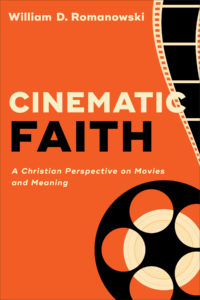 Cinematic Faith: A Christian Perspective on Movies and Meaning William David Romanowski (Baker Academic) $22.99 When I think back of the many long — some too long, I’m told — reviews I did in this past years, one of the ones I’m most proud of was done in mid-June 2016 and it was a pretty major review of a book by an old friend, an esteemed film scholar and professor at Calvin University. I had to mention a ton of other books first, and rumninate a bit on some other titles before, about half-way through that particular BookNotes column, I got around to the major task of explaining this extraordinary book. I don’t want to reprint it all here, but you may want to read it back at BookNotes,
Cinematic Faith: A Christian Perspective on Movies and Meaning William David Romanowski (Baker Academic) $22.99 When I think back of the many long — some too long, I’m told — reviews I did in this past years, one of the ones I’m most proud of was done in mid-June 2016 and it was a pretty major review of a book by an old friend, an esteemed film scholar and professor at Calvin University. I had to mention a ton of other books first, and rumninate a bit on some other titles before, about half-way through that particular BookNotes column, I got around to the major task of explaining this extraordinary book. I don’t want to reprint it all here, but you may want to read it back at BookNotes, 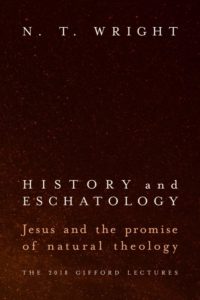 History and Eschatology: Jesus and the Promise of Natural Theology N.T. Wright (Baylor University Press) $34.95 [no discount on this time, sorry.] This may be the most scholarly book yet done by N.T. Wright and certainly he is in exquisitely academic company in being asked to do the famous, prestigious Gifford Lectures. This book offers us all a chance to take in those lectures; in a clever personal note at the beginning (which I shared the last time I wrote about this at BookNotes, I believe) he explained the significance of this lectureship and what he hoped to accomplish in them. “My goodness,” his mother said, “I’m glad I didn’t have to listen to those lectures.” He good-naturedly invites his readers to abandon the book henceforth if they find it a bit obscure. I get that.
History and Eschatology: Jesus and the Promise of Natural Theology N.T. Wright (Baylor University Press) $34.95 [no discount on this time, sorry.] This may be the most scholarly book yet done by N.T. Wright and certainly he is in exquisitely academic company in being asked to do the famous, prestigious Gifford Lectures. This book offers us all a chance to take in those lectures; in a clever personal note at the beginning (which I shared the last time I wrote about this at BookNotes, I believe) he explained the significance of this lectureship and what he hoped to accomplish in them. “My goodness,” his mother said, “I’m glad I didn’t have to listen to those lectures.” He good-naturedly invites his readers to abandon the book henceforth if they find it a bit obscure. I get that.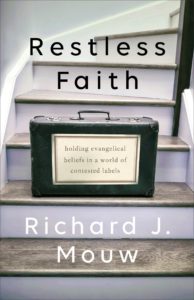 Restless Faith Holding Evangelical Beliefs in a World of Contested Labels Richard Mouw (Brazos) $19.99 This was a year of some very important theological works and some were even fairly widely known and/or discussed. Think of the writer with an unparalleled vocabulary, the too-feisty Hart who wrote on Yale University Press the important That All May be Saved or
Restless Faith Holding Evangelical Beliefs in a World of Contested Labels Richard Mouw (Brazos) $19.99 This was a year of some very important theological works and some were even fairly widely known and/or discussed. Think of the writer with an unparalleled vocabulary, the too-feisty Hart who wrote on Yale University Press the important That All May be Saved or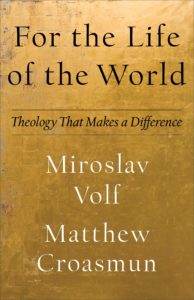 For the Life of the World: Theology That Makes a Difference Miroslav Volf & Matthew Croasmun (Brazos Press) $21.99 Not all of us can wade through heady, abstract theology, and this book deserves our accolades here at year’s end because it was a book that, in fact, tried to address that. Not that they suggest all academic theology should just be less scholarly. No, they are asking a more fundamental question, it seems: what is the point of theology if it does not make a difference in help us, as individuals, churches, and society at large, more full of God’s shalom? That is, does it make us flourish? There are bold and some may protest, but they are asking if theology can actually address the actual question of what makes for human happiness. If some research on this has been done (and it has) then how can theology help us construe and live a life of meaning? Wow.
For the Life of the World: Theology That Makes a Difference Miroslav Volf & Matthew Croasmun (Brazos Press) $21.99 Not all of us can wade through heady, abstract theology, and this book deserves our accolades here at year’s end because it was a book that, in fact, tried to address that. Not that they suggest all academic theology should just be less scholarly. No, they are asking a more fundamental question, it seems: what is the point of theology if it does not make a difference in help us, as individuals, churches, and society at large, more full of God’s shalom? That is, does it make us flourish? There are bold and some may protest, but they are asking if theology can actually address the actual question of what makes for human happiness. If some research on this has been done (and it has) then how can theology help us construe and live a life of meaning? Wow.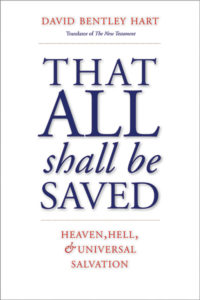 That All Shall Be Saved: Heaven, Hell, & Universal Salvation David Bentley Hart (Yale University Press) $26.00 I didn’t read this. Okay, so sue me – I’m naming it, anyway. There is little doubt in my mind that there is no other theological books that was published this year that got as much scholarly attention, was as seriously reviewed, as hotly debated and became a big seller as this obtuse and heavy volume published by one of the most intellectually hefty writers of our time.
That All Shall Be Saved: Heaven, Hell, & Universal Salvation David Bentley Hart (Yale University Press) $26.00 I didn’t read this. Okay, so sue me – I’m naming it, anyway. There is little doubt in my mind that there is no other theological books that was published this year that got as much scholarly attention, was as seriously reviewed, as hotly debated and became a big seller as this obtuse and heavy volume published by one of the most intellectually hefty writers of our time.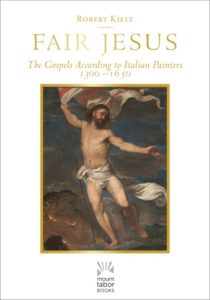 Naturally, this is a time to refocus on Christ, on His saving power, his merciful grace, the way the Wise men culminate what we already know in the incarnation — that Christ comes also for those outside of Israel. (Ahhh, just think of those four women named in the genealogy in Matthew!). I was drawn this past season to a book we mentioned a week or so ago which was a hefty hardback full of great reproductions of renaissance paintings of Jesus. It is called Fair Jesus: The Gospels According to Italian Painters 1300 – 1650 by Robert Kiely (Paraclete Press; $39.99.) We still have it at that announced 20% off (making it $31.99) and it might be a good resource for your meditations this season, or any.
Naturally, this is a time to refocus on Christ, on His saving power, his merciful grace, the way the Wise men culminate what we already know in the incarnation — that Christ comes also for those outside of Israel. (Ahhh, just think of those four women named in the genealogy in Matthew!). I was drawn this past season to a book we mentioned a week or so ago which was a hefty hardback full of great reproductions of renaissance paintings of Jesus. It is called Fair Jesus: The Gospels According to Italian Painters 1300 – 1650 by Robert Kiely (Paraclete Press; $39.99.) We still have it at that announced 20% off (making it $31.99) and it might be a good resource for your meditations this season, or any.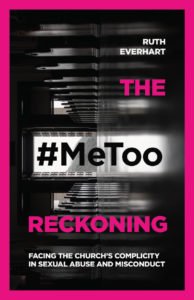 The #MeToo Reckoning: Facing the Church’s Complicity in Sexual Abuse and Misconduct Ruth Everhart (IVP) $17.00 You may remember that we reviewed the amazing, gripping, important memoir, Ruined, Everhart wrote about being raped as a college student decades ago and how her conservative Christian college, admirable in so many ways, didn’t seem to have the heart or mind, the resources or interests, to help her much. As we learned in that book Ms. Everhart went on to get a seminary degree and was called into ordained ministry through the PC(USA.). She has served several churches in her calling (rural and suburban, multi-staff and smaller.) As a loyal shepherd in Christ’s church she continues to care for those who have been abused and has, in fact, be involved in churches where there has been sexual misconduct. Not every pastor faces this ugly stuff, but more do than you might realize.
The #MeToo Reckoning: Facing the Church’s Complicity in Sexual Abuse and Misconduct Ruth Everhart (IVP) $17.00 You may remember that we reviewed the amazing, gripping, important memoir, Ruined, Everhart wrote about being raped as a college student decades ago and how her conservative Christian college, admirable in so many ways, didn’t seem to have the heart or mind, the resources or interests, to help her much. As we learned in that book Ms. Everhart went on to get a seminary degree and was called into ordained ministry through the PC(USA.). She has served several churches in her calling (rural and suburban, multi-staff and smaller.) As a loyal shepherd in Christ’s church she continues to care for those who have been abused and has, in fact, be involved in churches where there has been sexual misconduct. Not every pastor faces this ugly stuff, but more do than you might realize.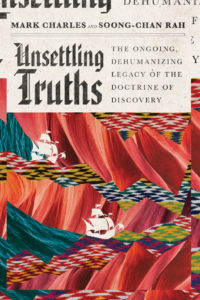 Unsettling Truths: The Ongoing Dehumanizing Legacy of the Doctrine of Discovery Mark Charles and Soong-Chan Rah (InterVarsity Press) $18.00 This recent release has been a much-anticipated book, in part because Mark Charles, a man of Navajo and Dutch American descent, has been a tireless speaker, an inspiring and powerful teacher, and a helpful mentor to many, speaking out about Native issues for years. Soong-Chan Rah is also quite well known (he teaches Church Growth and Evangelism at North Park Theological Seminary) and has published several important books. This recent one is perhaps the first in its genre being published within the evangelical world so it is, in a way, historic; it is a strong theological critique of the fifteenth century church edict which gave Christian explorers the right to claim territories they “discovered.” Exploration, missionary work and crass colonialism combined in ways that were hardly ever helpful for indigenous people. (See the powerful award winning film The Mission for a compelling, tragic, beautiful treatment.)
Unsettling Truths: The Ongoing Dehumanizing Legacy of the Doctrine of Discovery Mark Charles and Soong-Chan Rah (InterVarsity Press) $18.00 This recent release has been a much-anticipated book, in part because Mark Charles, a man of Navajo and Dutch American descent, has been a tireless speaker, an inspiring and powerful teacher, and a helpful mentor to many, speaking out about Native issues for years. Soong-Chan Rah is also quite well known (he teaches Church Growth and Evangelism at North Park Theological Seminary) and has published several important books. This recent one is perhaps the first in its genre being published within the evangelical world so it is, in a way, historic; it is a strong theological critique of the fifteenth century church edict which gave Christian explorers the right to claim territories they “discovered.” Exploration, missionary work and crass colonialism combined in ways that were hardly ever helpful for indigenous people. (See the powerful award winning film The Mission for a compelling, tragic, beautiful treatment.)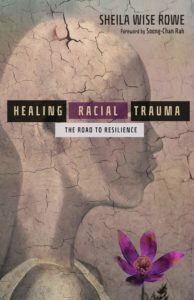 Healing Racial Trauma: The Road to Resilience Sheila Wise Rowe (InterVarsity Press) $17.00 This is a brand new book and we must say that there is, to the best of our knowledge, nothing in print that approximates it. This is not a general book about racial injustices, not just a call to racial justice and reconciliation, not even a handbook for minority Christians to navigate the tensions of living and working in largely white culture and institutions. There are many good books on those topics, many done by this same publisher (who has by far contributed more to evangelical awareness of racial and ethnic concerns and ministries that any other publisher in the last 50 years) but this, this is something unique. It is, as the title plainly notes, a book about healing from trauma caused by racism. Ms Rowe’s Healing Racial Trauma is a rare and important book.
Healing Racial Trauma: The Road to Resilience Sheila Wise Rowe (InterVarsity Press) $17.00 This is a brand new book and we must say that there is, to the best of our knowledge, nothing in print that approximates it. This is not a general book about racial injustices, not just a call to racial justice and reconciliation, not even a handbook for minority Christians to navigate the tensions of living and working in largely white culture and institutions. There are many good books on those topics, many done by this same publisher (who has by far contributed more to evangelical awareness of racial and ethnic concerns and ministries that any other publisher in the last 50 years) but this, this is something unique. It is, as the title plainly notes, a book about healing from trauma caused by racism. Ms Rowe’s Healing Racial Trauma is a rare and important book.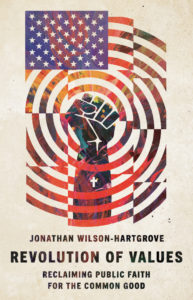 Revolution of Values: Reclaiming Public Faith for the Common Good Jonathan Wilson-Hartgrove (InterVarsity Press) $22.00 Talk about bringing things into the light. I am nearly positive that you will learn things in this book you didn’t know, you will be inspired to hear about stories you may have not heard about, and you will see things — mostly, the Bible and the social ethics demanded by a Christ-like worldview — in a very new way. Might I say, in a new Light?
Revolution of Values: Reclaiming Public Faith for the Common Good Jonathan Wilson-Hartgrove (InterVarsity Press) $22.00 Talk about bringing things into the light. I am nearly positive that you will learn things in this book you didn’t know, you will be inspired to hear about stories you may have not heard about, and you will see things — mostly, the Bible and the social ethics demanded by a Christ-like worldview — in a very new way. Might I say, in a new Light?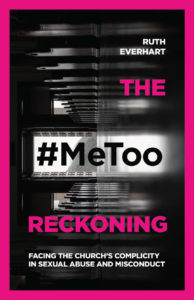
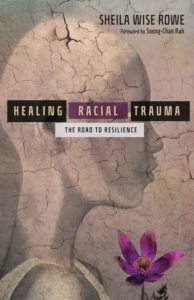
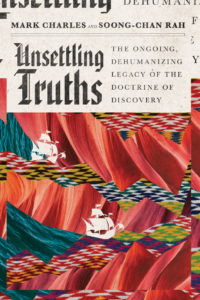
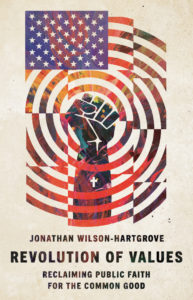
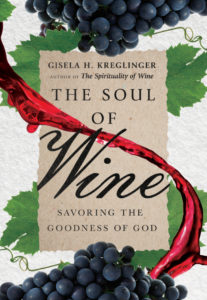 The Soul of Wine: Savoring the Goodness of God Gisela H. Kreglinger (IVP) $16.00 This is one of those wonderful compact sized hardbacks, a less heady, more accesible, and more inspiring version of her fabulous Eerdman’s book, The Spirituality of Wine. This new one is great book for anyone who appreciates fine wine, or those who want a deeply Christian entre to the fermented fruit of the vine (reminding us and evoking a robust theology of creation, the goodness of God’s world and God’s good gifts, in both joy and grief.) Blurbs on the back include raves from Andy Crouch and Sandra McCracken and even Karen MacNeil (author of The Wine Bible.) There’s a wine-tasting guide and book club guide, too. This makes a perfect New Year’s Eve gift, too.
The Soul of Wine: Savoring the Goodness of God Gisela H. Kreglinger (IVP) $16.00 This is one of those wonderful compact sized hardbacks, a less heady, more accesible, and more inspiring version of her fabulous Eerdman’s book, The Spirituality of Wine. This new one is great book for anyone who appreciates fine wine, or those who want a deeply Christian entre to the fermented fruit of the vine (reminding us and evoking a robust theology of creation, the goodness of God’s world and God’s good gifts, in both joy and grief.) Blurbs on the back include raves from Andy Crouch and Sandra McCracken and even Karen MacNeil (author of The Wine Bible.) There’s a wine-tasting guide and book club guide, too. This makes a perfect New Year’s Eve gift, too.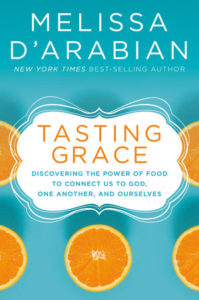 Tasting Grace: Discovering the Power of Food to Connect Us to God, One Another, and Ourselves Melissa d’Arabian (Waterbrook) $21.99 We have a large section of books about food and farming here in the shop and I’ve written before about many of our lovely favorites (and that doesn’t even mention cookbooks, from last year’s Salt, Fat, Acid, Heat to the old standby More-With-Less Cookbook.) Some are so, so good, mature and deep and well written. From the Episcopal theologian and food writer Robert Capon’s classic, Supper of the Lamb, to the extraordinary anthology The Spirit of Food: Thirty-Four Writers on Feasting and Fasting Toward God (edited by Leslie Leyland Fields — one of my favorite writers) we love telling people about these sorts of books. Tasting Grace is a new one by a writer that we did not know. She is apparently a bit of a celebrity chef, television host and the winner of The Next Food Network Star season five. She wrote two down-to-Earth books called Ten Dollar Dinners and Supermarket Healthy, illustrating her own passion for family meals and common food to nourish body and soul. Anyway, she has now offered this overtly Christian reflection, telling her own story, speaking with wisdom and goodness and grace. She’s seen a lot — from food addictions to the whole TV thing, so this helps us learn about life along with her, reminding us of delight and stewardship, about hospitality and comfort, about creation and redemption. She invites us to “lean into God” and find God in the ingredients, even as we worship only Him.
Tasting Grace: Discovering the Power of Food to Connect Us to God, One Another, and Ourselves Melissa d’Arabian (Waterbrook) $21.99 We have a large section of books about food and farming here in the shop and I’ve written before about many of our lovely favorites (and that doesn’t even mention cookbooks, from last year’s Salt, Fat, Acid, Heat to the old standby More-With-Less Cookbook.) Some are so, so good, mature and deep and well written. From the Episcopal theologian and food writer Robert Capon’s classic, Supper of the Lamb, to the extraordinary anthology The Spirit of Food: Thirty-Four Writers on Feasting and Fasting Toward God (edited by Leslie Leyland Fields — one of my favorite writers) we love telling people about these sorts of books. Tasting Grace is a new one by a writer that we did not know. She is apparently a bit of a celebrity chef, television host and the winner of The Next Food Network Star season five. She wrote two down-to-Earth books called Ten Dollar Dinners and Supermarket Healthy, illustrating her own passion for family meals and common food to nourish body and soul. Anyway, she has now offered this overtly Christian reflection, telling her own story, speaking with wisdom and goodness and grace. She’s seen a lot — from food addictions to the whole TV thing, so this helps us learn about life along with her, reminding us of delight and stewardship, about hospitality and comfort, about creation and redemption. She invites us to “lean into God” and find God in the ingredients, even as we worship only Him. When Poets Pray Marilyn McEntyre (Eerdmans) $19.99 Oh my my, this is a tremendous book, a must for poetry lovers and a helpful guide for those who maybe aren’t drawn to poems. (Or conversely, since it is also a book about praying, it might appeal to those who like prayer books.) Marilyn McEntyre, both a literate critic and a poet herself, imagines what it might be like if certain poems were, in fact, prayers. Or, at least, if we used them as such. What a great idea — a bit of literary insight, a creative reading of good poems, and a fresh way to enhance one’s prayer life. We recommend Ms. McEntyre regularly, including her must-read Caring for Words in a Culture of Lies, the lovely word-oriented devotional called Word by Word, and the almost self-helpy handbook called Make a List: How a Simple Practice Can Change Our Lives and Open Our Hearts. These books are just a touch allusive and creative but not at all odd or eccentric, making them suitable to share with almost anyone. You’ll see When Poets Pray on our “Best Books of 2019” list soon… order one today!
When Poets Pray Marilyn McEntyre (Eerdmans) $19.99 Oh my my, this is a tremendous book, a must for poetry lovers and a helpful guide for those who maybe aren’t drawn to poems. (Or conversely, since it is also a book about praying, it might appeal to those who like prayer books.) Marilyn McEntyre, both a literate critic and a poet herself, imagines what it might be like if certain poems were, in fact, prayers. Or, at least, if we used them as such. What a great idea — a bit of literary insight, a creative reading of good poems, and a fresh way to enhance one’s prayer life. We recommend Ms. McEntyre regularly, including her must-read Caring for Words in a Culture of Lies, the lovely word-oriented devotional called Word by Word, and the almost self-helpy handbook called Make a List: How a Simple Practice Can Change Our Lives and Open Our Hearts. These books are just a touch allusive and creative but not at all odd or eccentric, making them suitable to share with almost anyone. You’ll see When Poets Pray on our “Best Books of 2019” list soon… order one today!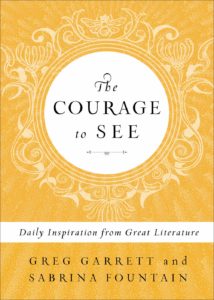 The Courage to See: Daily Inspiration from Great Literature Greg Garrett & Sabrina Fountain (WJK) $20.00This is such a great idea, a lit-based daily devo. They aren’t the first to do this, but The Courage to See may be the best yet. It features inspiring words from Maya Angelou, Jane Austen, James Baldwin, Annie Dillard, C.S. Lewis, J.K. Rowling, Zadie Smith, and more. Garrett has written memoir (Crossing Myself) and theological studies of various pop culture projects (The Gospel in Hollywood) and teaches English at Baylor. Fountain is a write on art and culture. Nicely done.
The Courage to See: Daily Inspiration from Great Literature Greg Garrett & Sabrina Fountain (WJK) $20.00This is such a great idea, a lit-based daily devo. They aren’t the first to do this, but The Courage to See may be the best yet. It features inspiring words from Maya Angelou, Jane Austen, James Baldwin, Annie Dillard, C.S. Lewis, J.K. Rowling, Zadie Smith, and more. Garrett has written memoir (Crossing Myself) and theological studies of various pop culture projects (The Gospel in Hollywood) and teaches English at Baylor. Fountain is a write on art and culture. Nicely done.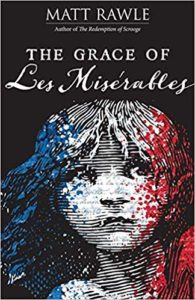 The Grace of Les Miserables Matt Rawle (Abingdon) $16.99 This is not super heavy but is a lovely, useful, starter guide to this great conversation — how does Christian theology show up in great literature, in this case, the enduring novel by Victor Hugo. Rawle has done other such books (a nice one on To Kill at Mockingbird and one on Scrooge and Charles Dickens. They each are available also as a six-session DVD for small group use. What fun. (Yes, you can have a small group or Adult Ed forum on the DVD The Grace of Les Miserables and you can purchase a Leader’s Guide to utilize it.) The book, though, is fun to read on its own, in six good chapters covering grace, justice, poverty, revolution, love, and hope. Perhaps you should give it to someone now and they might consider it as a Lenten study. Nice!
The Grace of Les Miserables Matt Rawle (Abingdon) $16.99 This is not super heavy but is a lovely, useful, starter guide to this great conversation — how does Christian theology show up in great literature, in this case, the enduring novel by Victor Hugo. Rawle has done other such books (a nice one on To Kill at Mockingbird and one on Scrooge and Charles Dickens. They each are available also as a six-session DVD for small group use. What fun. (Yes, you can have a small group or Adult Ed forum on the DVD The Grace of Les Miserables and you can purchase a Leader’s Guide to utilize it.) The book, though, is fun to read on its own, in six good chapters covering grace, justice, poverty, revolution, love, and hope. Perhaps you should give it to someone now and they might consider it as a Lenten study. Nice!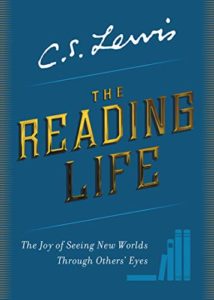 The Reading Life: The Joy of Seeing New Worlds Through Other’s Eyes C.S. Lewis (HarperCollins) $19.99 A perfect hand sized shape in a classy hardback offering insights from Lewis on reading, literature and the meaning of the literary experience. Lewis reminds us, literature can “heal the wound”… and in reading great literature we expand our vision. Lewis writes, about taking up good books:
The Reading Life: The Joy of Seeing New Worlds Through Other’s Eyes C.S. Lewis (HarperCollins) $19.99 A perfect hand sized shape in a classy hardback offering insights from Lewis on reading, literature and the meaning of the literary experience. Lewis reminds us, literature can “heal the wound”… and in reading great literature we expand our vision. Lewis writes, about taking up good books: Sister Wendy’s 100 Best-loved Paintings Sister Wendy Beckett (SPCK) 35.00 Wow, what a book, a smallish coffee table book that has lovely reproductions of Sister Wendy’s most beloved and most often described artworks. She was putting the final touches on this one-of-a-kind anthology when she died in December 2018. The result is (as it says on the back cover): “this enthralling collection of 100 famous and lesser-known masterpieces of Western art, ranging from the sixth century to the present.” This is beautifully produced and, as British broadcaster Peter Stafford puts it, it is “a fitting tribute to the unique Sister Wendy. Prepare yourself to be surprised.”
Sister Wendy’s 100 Best-loved Paintings Sister Wendy Beckett (SPCK) 35.00 Wow, what a book, a smallish coffee table book that has lovely reproductions of Sister Wendy’s most beloved and most often described artworks. She was putting the final touches on this one-of-a-kind anthology when she died in December 2018. The result is (as it says on the back cover): “this enthralling collection of 100 famous and lesser-known masterpieces of Western art, ranging from the sixth century to the present.” This is beautifully produced and, as British broadcaster Peter Stafford puts it, it is “a fitting tribute to the unique Sister Wendy. Prepare yourself to be surprised.”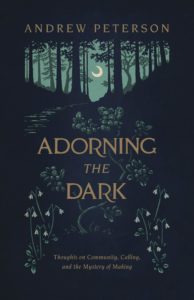 Adorning the Dark: Thoughts on Community, Calling, and the Mystery of Making Andrew Peterson (B+H Publishing) $16.99 This handsome paperback was award one of the coveted Books of the Year awards from Christianity Today and we heartily concur. Peterson is a smart, thoughtful, singer-songwriter (his Behold the Lamb of God is a great Advent/Christian concept album.) In recent years he is well known for his role in the Rabbit Room community and publishing venture in Nashville. He released a wonderful, witty, fantasy series called the Wingfeather Saga. (We still have some of the paperbacks of On the Edge of the Dark Sea of Darkness and North! Or Be Eaten which will be coming out in hardcover editions in March 2020.) If you know any writers, storytellers, artists, or cultural creatives, this set of essays would be a wonderful blessing for them. What a line for an aesthetic manifesto — “adorning the dark.” Order one or two today and share generously.
Adorning the Dark: Thoughts on Community, Calling, and the Mystery of Making Andrew Peterson (B+H Publishing) $16.99 This handsome paperback was award one of the coveted Books of the Year awards from Christianity Today and we heartily concur. Peterson is a smart, thoughtful, singer-songwriter (his Behold the Lamb of God is a great Advent/Christian concept album.) In recent years he is well known for his role in the Rabbit Room community and publishing venture in Nashville. He released a wonderful, witty, fantasy series called the Wingfeather Saga. (We still have some of the paperbacks of On the Edge of the Dark Sea of Darkness and North! Or Be Eaten which will be coming out in hardcover editions in March 2020.) If you know any writers, storytellers, artists, or cultural creatives, this set of essays would be a wonderful blessing for them. What a line for an aesthetic manifesto — “adorning the dark.” Order one or two today and share generously. Cinematic Faith: A Christian Perspective on Movies and Meaning Years William D. Romanowski (Baker Academic) $ 22.99 Years in the making, we are very, very glad to remind you of a recent book by professor Romanowski of Calvin University in Grand Rapids. As an old college friend of the author, I am drawn to his work (and have read it twice, actually) but, I must say, even if he wasn’t a pal of Hearts & Minds, we’d be insisting this is very important and would be recommending it earnestly. For anyone who likes going to the movies or can’t wait for the next NetFlex DVD to show up (please don’t tell me you watch films on your little phone!) or streams movies often, this big book will be an education and a joy. It isn’t preachy and it isn’t simplistic but it isn’t overly academic. If you love movies, you need this book. It will help you understand the art of film and more.
Cinematic Faith: A Christian Perspective on Movies and Meaning Years William D. Romanowski (Baker Academic) $ 22.99 Years in the making, we are very, very glad to remind you of a recent book by professor Romanowski of Calvin University in Grand Rapids. As an old college friend of the author, I am drawn to his work (and have read it twice, actually) but, I must say, even if he wasn’t a pal of Hearts & Minds, we’d be insisting this is very important and would be recommending it earnestly. For anyone who likes going to the movies or can’t wait for the next NetFlex DVD to show up (please don’t tell me you watch films on your little phone!) or streams movies often, this big book will be an education and a joy. It isn’t preachy and it isn’t simplistic but it isn’t overly academic. If you love movies, you need this book. It will help you understand the art of film and more.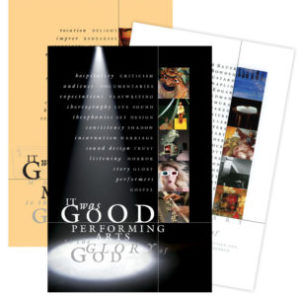 It Was Good: Making Art to the Glory of God edited by Ned Bustard (Square Halo Books) $24.99
It Was Good: Making Art to the Glory of God edited by Ned Bustard (Square Halo Books) $24.99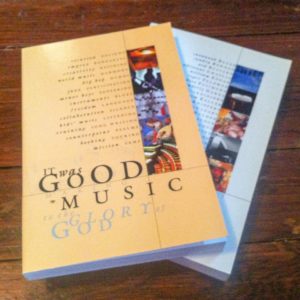 It Was Good: Making Music to the Glory of God edited by Ned Bustard (Square Halo Books) $24.99 It Was Good: Performing Arts to the Glory of God edited by Ned Bustard (Square Halo Books) $19.99
It Was Good: Making Music to the Glory of God edited by Ned Bustard (Square Halo Books) $24.99 It Was Good: Performing Arts to the Glory of God edited by Ned Bustard (Square Halo Books) $19.99 Exactly As You Are: The Life and Faith of Mister Rogers Shea Tuttle (Eerdmans) $23.99 There is so much written, now, about Mister Rogers and we are grateful; he was a complex figure, important (and, in case you didn’t hear it yet, a Presbyterian minister.) This recent release is a delightful, serious, insightful biography, warmly written and (as Publishers Weekly put it) explored with “a keen sense of the deeply religious forces” behind “the classic TV show and its widely lauded creator.” One of the very best biographies of Roger’s yet, by a woman affiliated with the notable “Lived Theology” project at University of Virginia. She holds an MDiv from Chandler at Emory. Great!
Exactly As You Are: The Life and Faith of Mister Rogers Shea Tuttle (Eerdmans) $23.99 There is so much written, now, about Mister Rogers and we are grateful; he was a complex figure, important (and, in case you didn’t hear it yet, a Presbyterian minister.) This recent release is a delightful, serious, insightful biography, warmly written and (as Publishers Weekly put it) explored with “a keen sense of the deeply religious forces” behind “the classic TV show and its widely lauded creator.” One of the very best biographies of Roger’s yet, by a woman affiliated with the notable “Lived Theology” project at University of Virginia. She holds an MDiv from Chandler at Emory. Great! Miracles and Other Reasonable Things: A Story of Unlearning and Relearning God Sarah Bessey (Howard Books) $26.00 What a great writer Sarah is — you may know her previous books (Jesus Feminist and Out of Sorts.) There is a foreword to this new one by Shauna Niequist and great blurbs on the back by Jen Hatmaker, Kate Bowler, Peter Enns, and the exquisite writer Barbara Brown Taylor. Miracles… tells a bit of her journey away from conventional, conservative, fundamentalism and towards a different sort of evolving faith, but then the whole thing takes a painful twist as she experiences an serious car accident, suffering with chronic pain and the like. And then, surprisingly, an extraordinary miracle of healing and what that means for her. There is so much going on here, it is hard to summarized. The narrative is filled with theological thinking but is rooted in her own story. She is a compelling writer, a beautiful writer, a fun and funny writer. Jonathan Martin (whose Prototype on Jesus is superb) says Miracles and Other Reasonable Things is “trailblazing and bush-burning.” I am grateful for her story and how she talks about sickness, hope, healing, and the like.
Miracles and Other Reasonable Things: A Story of Unlearning and Relearning God Sarah Bessey (Howard Books) $26.00 What a great writer Sarah is — you may know her previous books (Jesus Feminist and Out of Sorts.) There is a foreword to this new one by Shauna Niequist and great blurbs on the back by Jen Hatmaker, Kate Bowler, Peter Enns, and the exquisite writer Barbara Brown Taylor. Miracles… tells a bit of her journey away from conventional, conservative, fundamentalism and towards a different sort of evolving faith, but then the whole thing takes a painful twist as she experiences an serious car accident, suffering with chronic pain and the like. And then, surprisingly, an extraordinary miracle of healing and what that means for her. There is so much going on here, it is hard to summarized. The narrative is filled with theological thinking but is rooted in her own story. She is a compelling writer, a beautiful writer, a fun and funny writer. Jonathan Martin (whose Prototype on Jesus is superb) says Miracles and Other Reasonable Things is “trailblazing and bush-burning.” I am grateful for her story and how she talks about sickness, hope, healing, and the like. Consumed by Hate, Redeemed by Love: How a Violent Klansman Became a Champion of Racial Reconciliation Thomas Tarrants (Thomas Nelson) $24.99 This stunning story hardly needs the front-cover blurb by hair-raising, edge-of-your-seat author John Grisham who calls it “riveting” and a truly “remarkable memoir” since the very subtitle speaks volumes. But, for what it is worth, Grisham — who has seen his share of wild stuff and imagines even more — is spot on. This page-turner of a story is beyond remarkable, it is the sign of a miracle. Those of us who have had the pleasure of knowing Tom (he was the Director for many good years of the DC-area C.S. Lewis Institute) could hardly believe it when stories of his past came out. Humble, gentle, kind, impeccably orthodox in faith and behavior, Tom is a beautiful, generous friend and brother. As this book shows, it has not always been this way.
Consumed by Hate, Redeemed by Love: How a Violent Klansman Became a Champion of Racial Reconciliation Thomas Tarrants (Thomas Nelson) $24.99 This stunning story hardly needs the front-cover blurb by hair-raising, edge-of-your-seat author John Grisham who calls it “riveting” and a truly “remarkable memoir” since the very subtitle speaks volumes. But, for what it is worth, Grisham — who has seen his share of wild stuff and imagines even more — is spot on. This page-turner of a story is beyond remarkable, it is the sign of a miracle. Those of us who have had the pleasure of knowing Tom (he was the Director for many good years of the DC-area C.S. Lewis Institute) could hardly believe it when stories of his past came out. Humble, gentle, kind, impeccably orthodox in faith and behavior, Tom is a beautiful, generous friend and brother. As this book shows, it has not always been this way.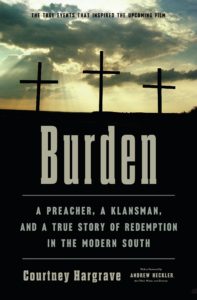 Burden: A Preacher, a Klansman, and a True Story of Redemption in the Modern South Courtney Hartgrove (Convergent) $26.00 Perhaps you’ve seen the powerful trailer about the film version of this that is coming out in March. (
Burden: A Preacher, a Klansman, and a True Story of Redemption in the Modern South Courtney Hartgrove (Convergent) $26.00 Perhaps you’ve seen the powerful trailer about the film version of this that is coming out in March. (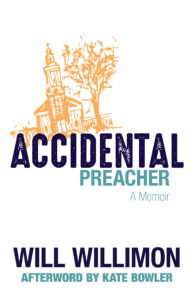 Accidental Preacher: A Memoir Will Willimon (Eerdmans) $24.99 If you’ve been around the broader Christian world at all in the last 40 years you probably know Will Willimon, renowned scholar, preacher, pastor, former Chaplain of the Duke chapel, United Methodist Bishop, and very, very prolific writer. For years people have been bugging him to write down more of his own life stories, to draft a memoir, to tell about his life as he has seen it. We’ve been waiting for this, a fabulous book to crown the career (at least this part of it, since he ain’t dead yet) of this curious, brave, witty, Southern preacher. The endorsements are themselves a hoot — Lillian Daniels (a UCC preacher) says “If I believed in bishops, I’d want one like Will Willimon — flawed, fearless, and wickedly funny.” Richard Lischer (a Lutheran) says, “If Mark Twain had been a Methodist, his name would have been Will Willimon.) I like that the African American preacher and scholar now at Duke University Chapel, Luke Powery, says “Bishop Willimon is a Jesus-loving, story-telling, truth-talking, laugh-generating gift from God for the church.”
Accidental Preacher: A Memoir Will Willimon (Eerdmans) $24.99 If you’ve been around the broader Christian world at all in the last 40 years you probably know Will Willimon, renowned scholar, preacher, pastor, former Chaplain of the Duke chapel, United Methodist Bishop, and very, very prolific writer. For years people have been bugging him to write down more of his own life stories, to draft a memoir, to tell about his life as he has seen it. We’ve been waiting for this, a fabulous book to crown the career (at least this part of it, since he ain’t dead yet) of this curious, brave, witty, Southern preacher. The endorsements are themselves a hoot — Lillian Daniels (a UCC preacher) says “If I believed in bishops, I’d want one like Will Willimon — flawed, fearless, and wickedly funny.” Richard Lischer (a Lutheran) says, “If Mark Twain had been a Methodist, his name would have been Will Willimon.) I like that the African American preacher and scholar now at Duke University Chapel, Luke Powery, says “Bishop Willimon is a Jesus-loving, story-telling, truth-talking, laugh-generating gift from God for the church.”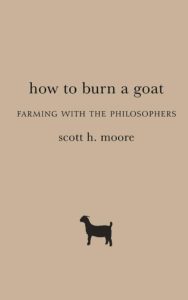 How to Burn a Goat: Farming With the Philosophers Scott H. Moore (Baylor University Press) $34.00 Okay, this isn’t exactly a memoir, but a collection of first hand, personal essays. I think of Farmer Moore as sort of a more brainy and professional Michael Perry, after all, besides working his farm, he’s a college prof. How to Burn… is a bit pricy although it is very well bound, nicely designed trim hardback. And it’s worth every penny, as it is amazingly eloquent, if plain-spoken, and a nearly brilliant set of farming essays that are intelligent, but not academic. Yes, Moore is a philosophy professor and on occasion brings in a theory of Wittgenstein or discusses the relationship of Plato and pigs. But it includes a lot of his own story, plenty of entertaining and even inspiring stories from his farm, and is less “philosophical” than the subtitle suggests. Texas pastor Kyle Childress is right to say it is a fun book — I so enjoyed it and read parts out loud to Beth. Listen to this great quote from Childress:
How to Burn a Goat: Farming With the Philosophers Scott H. Moore (Baylor University Press) $34.00 Okay, this isn’t exactly a memoir, but a collection of first hand, personal essays. I think of Farmer Moore as sort of a more brainy and professional Michael Perry, after all, besides working his farm, he’s a college prof. How to Burn… is a bit pricy although it is very well bound, nicely designed trim hardback. And it’s worth every penny, as it is amazingly eloquent, if plain-spoken, and a nearly brilliant set of farming essays that are intelligent, but not academic. Yes, Moore is a philosophy professor and on occasion brings in a theory of Wittgenstein or discusses the relationship of Plato and pigs. But it includes a lot of his own story, plenty of entertaining and even inspiring stories from his farm, and is less “philosophical” than the subtitle suggests. Texas pastor Kyle Childress is right to say it is a fun book — I so enjoyed it and read parts out loud to Beth. Listen to this great quote from Childress: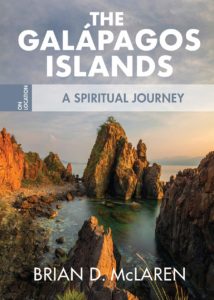 The Galapagos Island: A Spiritual Journey Brian McLaren (Fortress) $16.99 You could give this to any number of folks — anyone who reads McLaren, of course, will want this book which is a new genre for him — very much a memoir. A travel memoir, to be exact, reflecting on his journey to the famous islands. You may recall that the study of these famous South American islands (that figured into the research of Charles Darwin) figured into one of Brian’s earlier novels (A New Kind of Christian) but this report is for real. You get to travel with McLaren on what could be called “a spiritual pilgrimage to one of the world’s most fragile ecosystems.” So, gift it to anyone who likes reading about pilgrimages, or anyone interesest in either the interface of faith and science, or who is curious about ecological studies. This is part of a new series called “On Location” and carries blurbs on the back by Barbara Brown Taylor, Mike (Science Mike) McHargue, and Bill McKibben. Wow.
The Galapagos Island: A Spiritual Journey Brian McLaren (Fortress) $16.99 You could give this to any number of folks — anyone who reads McLaren, of course, will want this book which is a new genre for him — very much a memoir. A travel memoir, to be exact, reflecting on his journey to the famous islands. You may recall that the study of these famous South American islands (that figured into the research of Charles Darwin) figured into one of Brian’s earlier novels (A New Kind of Christian) but this report is for real. You get to travel with McLaren on what could be called “a spiritual pilgrimage to one of the world’s most fragile ecosystems.” So, gift it to anyone who likes reading about pilgrimages, or anyone interesest in either the interface of faith and science, or who is curious about ecological studies. This is part of a new series called “On Location” and carries blurbs on the back by Barbara Brown Taylor, Mike (Science Mike) McHargue, and Bill McKibben. Wow.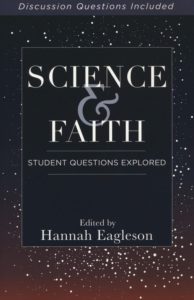 Science & Faith: Student Questions Explored edited by Hannah Eagleson (Hendrickson) $14.95 This little paperback deserves much applause and I’m sure you could give it to anyone interested in the basics of a serious explorations of the faith/science conversation these days. Created by the Emerging Scholars Network (a ministry of the Graduate Student and Faculty ministry of InterVarsity Christian Fellowship) it offers thoughtful essays by rising young scholars and is a great tool for conversations; there is a very useful discussion guide, with questions at the end of each chapter. The emerging scholars here are experts in the fields of aeronautics, molecular biology, chemistry, physics, philosophy of science and more.
Science & Faith: Student Questions Explored edited by Hannah Eagleson (Hendrickson) $14.95 This little paperback deserves much applause and I’m sure you could give it to anyone interested in the basics of a serious explorations of the faith/science conversation these days. Created by the Emerging Scholars Network (a ministry of the Graduate Student and Faculty ministry of InterVarsity Christian Fellowship) it offers thoughtful essays by rising young scholars and is a great tool for conversations; there is a very useful discussion guide, with questions at the end of each chapter. The emerging scholars here are experts in the fields of aeronautics, molecular biology, chemistry, physics, philosophy of science and more. Fearfully and Wonderfully: The Marvel of Bearing God’s Image updated and combined edition Dr. Paul Brand and Philip Yancey (IVP) $25.00 Perhaps you recall our announcement of this late last summer, a marvelous hardback combining newly edited versions of Fearfully and Wonderfully and its sequel, In His Image. Here the world famous hand surgeon and the talented and wise Christian writer combine to offer a uniquely Christian look at the glorious of the human body. Each chapter is on a part of the human body — blood, skin, eyeballs, brain, bones, etc — which opens up conversations about the richness of life, the role of community, the value of pain and more. The blurb on the back includes a lovely endorsement by Shane Claiborne and another by the famous former Surgeon General, C. Everett Koop. There’s a study guide, too, done by one of our very own customers here in Dallastown. Give it to anyone interested in medicine, physical therapy, science, the body, athleticism, or the structures of God’s creation. It’s a great, great read.
Fearfully and Wonderfully: The Marvel of Bearing God’s Image updated and combined edition Dr. Paul Brand and Philip Yancey (IVP) $25.00 Perhaps you recall our announcement of this late last summer, a marvelous hardback combining newly edited versions of Fearfully and Wonderfully and its sequel, In His Image. Here the world famous hand surgeon and the talented and wise Christian writer combine to offer a uniquely Christian look at the glorious of the human body. Each chapter is on a part of the human body — blood, skin, eyeballs, brain, bones, etc — which opens up conversations about the richness of life, the role of community, the value of pain and more. The blurb on the back includes a lovely endorsement by Shane Claiborne and another by the famous former Surgeon General, C. Everett Koop. There’s a study guide, too, done by one of our very own customers here in Dallastown. Give it to anyone interested in medicine, physical therapy, science, the body, athleticism, or the structures of God’s creation. It’s a great, great read.
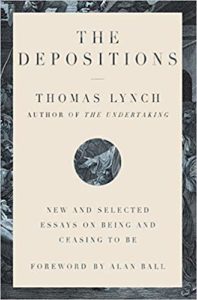 The Depositions: New and Selected Essays on Being and Ceasing to Be Thomas Lynch (Norton) $27.95 We were so glad, earlier this year, to see the long-awaiting release of a new collection of essays by undertaker and poet and essayist Thomas Lynch, Whence and Whither: On Lives and Living (WJK; $18.00.) It was marvelous and I know book lovers and Thomas Lynch fans were delighted by it. It’s a paperback with a striking cover and deckled pages and makes a nice inexpensive gift.
The Depositions: New and Selected Essays on Being and Ceasing to Be Thomas Lynch (Norton) $27.95 We were so glad, earlier this year, to see the long-awaiting release of a new collection of essays by undertaker and poet and essayist Thomas Lynch, Whence and Whither: On Lives and Living (WJK; $18.00.) It was marvelous and I know book lovers and Thomas Lynch fans were delighted by it. It’s a paperback with a striking cover and deckled pages and makes a nice inexpensive gift.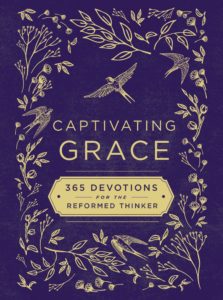 Captivating Grace: 365 Devotions for the Reformed Thinker compiled by Susan Hill, with a foreword by Scott Sauls (Zondervan) $19.99 What a beautiful book, a solid cloth/embossed hardback with sturdy paper, offering a daily devotional full of thoughts and prayers and reflections from the likes of Luther, Calvin, Beza, Zwingli, Turretin, Jonathan Edwards, Charles Spurgeon and more… It is nicely arranged in five units, with devotionals themed in each section by the historic five “Solas” of the Reformation era — Christ alone, Faith alone, Grace alone, the Scriptures alone, and for the Glory of God alone.
Captivating Grace: 365 Devotions for the Reformed Thinker compiled by Susan Hill, with a foreword by Scott Sauls (Zondervan) $19.99 What a beautiful book, a solid cloth/embossed hardback with sturdy paper, offering a daily devotional full of thoughts and prayers and reflections from the likes of Luther, Calvin, Beza, Zwingli, Turretin, Jonathan Edwards, Charles Spurgeon and more… It is nicely arranged in five units, with devotionals themed in each section by the historic five “Solas” of the Reformation era — Christ alone, Faith alone, Grace alone, the Scriptures alone, and for the Glory of God alone.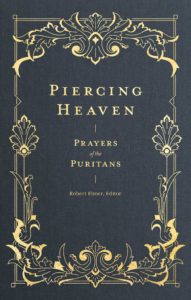 Piercing Heaven: Prayers of the Puritans edited by Robert Elmer (Lexham Press) $23.99 As it says on the back promotional paper insert, “For the Puritans, prayer was neither casual nor dull. Their prayers were passionate affairs, from earnestly pleading for mercy to joyful praise. These rich expressions of deep Christian faith are shining examples…” And indeed they are.
Piercing Heaven: Prayers of the Puritans edited by Robert Elmer (Lexham Press) $23.99 As it says on the back promotional paper insert, “For the Puritans, prayer was neither casual nor dull. Their prayers were passionate affairs, from earnestly pleading for mercy to joyful praise. These rich expressions of deep Christian faith are shining examples…” And indeed they are.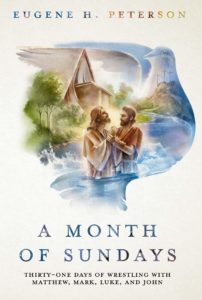 A Month of Sundays: Thirty-One Days of Wrestling with Matthew, Mark, Luke, and John Eugene Peterson (Waterbrook) $16.99 This is a never-before published collection of thirty one reflections on the gospel — a compact sized hardback, perfect for a monthlong journey into the life of Jesus — were first preached by Peterson in his role as pastor of Christ our King Presbyterian Church in Bel Air, Maryland. These are not necessarily cozy, inspiring devotionals that offer cheap inspiration but are solid explorations of the “big ideas, hard choices, and intimate conversations” that help you wrestle along side Matthew, Mark, Luke, and John.
A Month of Sundays: Thirty-One Days of Wrestling with Matthew, Mark, Luke, and John Eugene Peterson (Waterbrook) $16.99 This is a never-before published collection of thirty one reflections on the gospel — a compact sized hardback, perfect for a monthlong journey into the life of Jesus — were first preached by Peterson in his role as pastor of Christ our King Presbyterian Church in Bel Air, Maryland. These are not necessarily cozy, inspiring devotionals that offer cheap inspiration but are solid explorations of the “big ideas, hard choices, and intimate conversations” that help you wrestle along side Matthew, Mark, Luke, and John. Live in Grace, Walk in Love: A 365-Day Journey Bob Goff (Thomas Nelson) $16.99 This is a bargain price for this great, solid hardback. As we’ve described it at BookNotes before, it is a year’s worth of all new inspiring stories from Bob’s one-of-a-kind, dream-big, love does, kinda of life. The publisher says it offers “unexpected, thought-provoking teaching that will prepare Christians for the days ahead.” Yes, that’s true. But Bob would want you to live big and love well right now. There’s interesting Bible reflection here and tons of Goffian shenanigans, holy capers, stories of loving everybody always, offered with a whimsical nod and a gracious prayer. You could give this out to almost anybody as it is fun, humane, upbeat, and incredibly interesting. Yes!
Live in Grace, Walk in Love: A 365-Day Journey Bob Goff (Thomas Nelson) $16.99 This is a bargain price for this great, solid hardback. As we’ve described it at BookNotes before, it is a year’s worth of all new inspiring stories from Bob’s one-of-a-kind, dream-big, love does, kinda of life. The publisher says it offers “unexpected, thought-provoking teaching that will prepare Christians for the days ahead.” Yes, that’s true. But Bob would want you to live big and love well right now. There’s interesting Bible reflection here and tons of Goffian shenanigans, holy capers, stories of loving everybody always, offered with a whimsical nod and a gracious prayer. You could give this out to almost anybody as it is fun, humane, upbeat, and incredibly interesting. Yes! Rings of Fire: Walking in Faith Through a Volcanic Future Leonard Sweet (NavPress) $17.99 I hope you have somebody in your circle of friends and loved ones or church members who are fans of Leonard Sweet. A futurist by trade, a United Methodist gadfly and instigator of studies and projects and leadership initiatives, Sweet is one of the most widely read, brilliant thinkers I’ve ever come across. He maps out trends and concerns of the future as it relates to the church, now, and invites us — insists! — that to be faithful we have to allow God’s Kingdom which is coming to pull us into the future. He calls us to less handwringing and more action, more stimulating (prophetic) critique and less simple accommodation. As I often say, he is witty, creative, delights in wordplay (and all kind of play, a theme that shows up in his many books) so he’s a hoot to read. Even his (copious) footnotes are an education in itself. This book is worth twice the price.
Rings of Fire: Walking in Faith Through a Volcanic Future Leonard Sweet (NavPress) $17.99 I hope you have somebody in your circle of friends and loved ones or church members who are fans of Leonard Sweet. A futurist by trade, a United Methodist gadfly and instigator of studies and projects and leadership initiatives, Sweet is one of the most widely read, brilliant thinkers I’ve ever come across. He maps out trends and concerns of the future as it relates to the church, now, and invites us — insists! — that to be faithful we have to allow God’s Kingdom which is coming to pull us into the future. He calls us to less handwringing and more action, more stimulating (prophetic) critique and less simple accommodation. As I often say, he is witty, creative, delights in wordplay (and all kind of play, a theme that shows up in his many books) so he’s a hoot to read. Even his (copious) footnotes are an education in itself. This book is worth twice the price. Not From Around Here: What Unites Us, What Divides Us, and How We Can Move Forward Brandon O’Brien (Moody Press) $13.99 We’ve recommended books by this author before. He’s a curious fellow, brilliant, really, working now for Redeemer’s City to City with Tim Keller, but having written a book for small congregations which we like and another on a religious liberty advocate from during the colonial era Demanding Liberty: An Untold Story of American Religious Freedom and co-authored a near classic called Misreading Scripture with Western Eyes: Removing Cultural Blinders to Better Understand the Bible. He thinks widely about a lot and is Biblically informed, theologically reliable, and yet seems open to new ideas and is always learning. So when we heard about this new book, I couldn’t wait. It is not only about the fragmented nature of our polarized society, but, most foundationally, about the divide between rural and urban folks. We have these tidy categories, or at least it seems the media often presents tidy categories, but, as he says “people are more complex up close.”
Not From Around Here: What Unites Us, What Divides Us, and How We Can Move Forward Brandon O’Brien (Moody Press) $13.99 We’ve recommended books by this author before. He’s a curious fellow, brilliant, really, working now for Redeemer’s City to City with Tim Keller, but having written a book for small congregations which we like and another on a religious liberty advocate from during the colonial era Demanding Liberty: An Untold Story of American Religious Freedom and co-authored a near classic called Misreading Scripture with Western Eyes: Removing Cultural Blinders to Better Understand the Bible. He thinks widely about a lot and is Biblically informed, theologically reliable, and yet seems open to new ideas and is always learning. So when we heard about this new book, I couldn’t wait. It is not only about the fragmented nature of our polarized society, but, most foundationally, about the divide between rural and urban folks. We have these tidy categories, or at least it seems the media often presents tidy categories, but, as he says “people are more complex up close.” Working in the Presence of God: Spiritual Practices for Everyday Work Denise Daniels & Shannon Vandewarker (Hendrickson) $24.95 I suppose this isn’t exactly cultural criticism, but it does move us into the culture at large, helping us think about faith and vocations, the common good and the ways unbiblical dualism has kept us from thinking well about work and finances. These women work well in corporate America and while there has been a generous batch of books released in recent years on marketplace ministry and Christian fidelity in the work world, few have been as insightful as this, and even fewer have been written by women. My, my, you could give this to anyone interested in this faith and work movement, about whole-life spirituality, about how spiritual disciplines (sabbath, lament, solitude) can be useful in formation for our work-world service.
Working in the Presence of God: Spiritual Practices for Everyday Work Denise Daniels & Shannon Vandewarker (Hendrickson) $24.95 I suppose this isn’t exactly cultural criticism, but it does move us into the culture at large, helping us think about faith and vocations, the common good and the ways unbiblical dualism has kept us from thinking well about work and finances. These women work well in corporate America and while there has been a generous batch of books released in recent years on marketplace ministry and Christian fidelity in the work world, few have been as insightful as this, and even fewer have been written by women. My, my, you could give this to anyone interested in this faith and work movement, about whole-life spirituality, about how spiritual disciplines (sabbath, lament, solitude) can be useful in formation for our work-world service.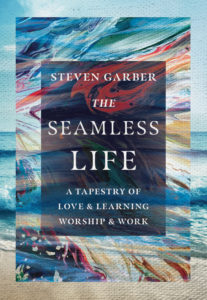 The Seamless Life: A Tapestry of Love and Learning, Worship and Work Steven Garber (IVP) $20.00 If you saw the big celebration we did about this brand new book at BookNotes a week or so ago you’ll know it is one of the most amazing books we’ve discussed this year. It is a lovely collection of short essays on a variety of topics related by the deep desire of the author to live a coherent life, one that hangs together, with seamlessness. From church life to work, from global justice to family matters, from reading novels to speaking with corporate leaders about the meaning of just profits, Steve reminds us it is all worship, that it all matters. It should be obvious, but in this distracted consumerist age it may not be, that we hunger for meaning and purpose; the live well This book ponders these things without silliness or cheesy zeal; his struggle for a seamless life is hard-earned and has integrity. These elegant essays are accompanied by photos of Steve’s travels, giving this a “report from the road” sort of feel. (And he has seen some remarkable stuff, making this in its own quiet way, a real page-turner.) It is a hand-sized hardback, with textured paper dust jacket, and makes a truly beautiful little gift. I find it hard to express how much this book means to me, and Beth and I would be pleased if you ordered some to share during this holiday season.
The Seamless Life: A Tapestry of Love and Learning, Worship and Work Steven Garber (IVP) $20.00 If you saw the big celebration we did about this brand new book at BookNotes a week or so ago you’ll know it is one of the most amazing books we’ve discussed this year. It is a lovely collection of short essays on a variety of topics related by the deep desire of the author to live a coherent life, one that hangs together, with seamlessness. From church life to work, from global justice to family matters, from reading novels to speaking with corporate leaders about the meaning of just profits, Steve reminds us it is all worship, that it all matters. It should be obvious, but in this distracted consumerist age it may not be, that we hunger for meaning and purpose; the live well This book ponders these things without silliness or cheesy zeal; his struggle for a seamless life is hard-earned and has integrity. These elegant essays are accompanied by photos of Steve’s travels, giving this a “report from the road” sort of feel. (And he has seen some remarkable stuff, making this in its own quiet way, a real page-turner.) It is a hand-sized hardback, with textured paper dust jacket, and makes a truly beautiful little gift. I find it hard to express how much this book means to me, and Beth and I would be pleased if you ordered some to share during this holiday season. The Library Book Susan Orlean (Simon & Schuster) $16.99 I had heard such good things about this remarkably written, meticulously researched study of the largest library fire in the US (April 29th,1986) but for some reason waited until it recently came out in paperback to pick it up. What was I thinking — it took my breath away on the first page and didn’t let up; it has been a constant pleasure to read, page by page. It is, without a doubt, one of the most captivating and well written books — heartbreaking and exciting, edge-of-your-seat, stuff as she investigates the arson accusations, the impact of the fire, and the remarkable civic spirit of the librarians.
The Library Book Susan Orlean (Simon & Schuster) $16.99 I had heard such good things about this remarkably written, meticulously researched study of the largest library fire in the US (April 29th,1986) but for some reason waited until it recently came out in paperback to pick it up. What was I thinking — it took my breath away on the first page and didn’t let up; it has been a constant pleasure to read, page by page. It is, without a doubt, one of the most captivating and well written books — heartbreaking and exciting, edge-of-your-seat, stuff as she investigates the arson accusations, the impact of the fire, and the remarkable civic spirit of the librarians. On Mission Together: Integrating Missions Into the Local Church Richard Noble, with a foreword by Peter Kuzmic (Falls City Press) $14.99 A very, very good friend out in Beaver Falls, PA (home of Geneva College) started a few years ago what he affectionately called a “micro-press.” (Sort of like micro-brew, I guess; small, local, tasty; indeed, Falls City is classy, thoughtful, unique — a boutique shop doing important little books that deserve a hearing. This is there latest and you should know about it.
On Mission Together: Integrating Missions Into the Local Church Richard Noble, with a foreword by Peter Kuzmic (Falls City Press) $14.99 A very, very good friend out in Beaver Falls, PA (home of Geneva College) started a few years ago what he affectionately called a “micro-press.” (Sort of like micro-brew, I guess; small, local, tasty; indeed, Falls City is classy, thoughtful, unique — a boutique shop doing important little books that deserve a hearing. This is there latest and you should know about it.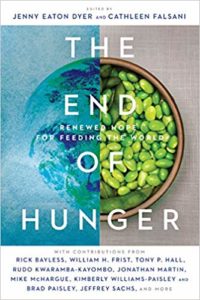 The End of Hunger: Renewed Hope for Feeding the World edited by Jenny Eaton Dyer and Cathleen Falsani (IVP) $17.00 I raved about this earlier this fall and wanted to recommend it again, now. I guess it may not be the most common gift idea for seasonal gift giving but you know there are folks in your circles who are (or ought to be) very keen on learning about global justice. What missions committee doesn’t at least pay some attention to global development and world-wide poverty and starvation. As I said before, this truly is one of the best resources we’ve get seen — very engaging, lots of stories, plenty of big picture analysis and lots of concrete steps for taking up action on a special aspects of global hunger. This is a great little book and we highly recommend it.
The End of Hunger: Renewed Hope for Feeding the World edited by Jenny Eaton Dyer and Cathleen Falsani (IVP) $17.00 I raved about this earlier this fall and wanted to recommend it again, now. I guess it may not be the most common gift idea for seasonal gift giving but you know there are folks in your circles who are (or ought to be) very keen on learning about global justice. What missions committee doesn’t at least pay some attention to global development and world-wide poverty and starvation. As I said before, this truly is one of the best resources we’ve get seen — very engaging, lots of stories, plenty of big picture analysis and lots of concrete steps for taking up action on a special aspects of global hunger. This is a great little book and we highly recommend it.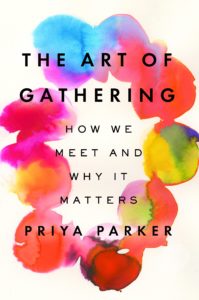 The Art of Gathering: How We Meet and Why It Matters Priya Parker (Riverhead Books) $28.00 What an amazing book this is, released this fall on the significant, storied publishing imprint. This is a book that is hard to describe but will be of interest to those who plan meetings, do programming, teach informal classes, whether in the work-world, the nonprofit sector, or, I’d say, in the local church or para-church. It is charming, fascinating, full of insight about the meaning of encounters, of gathering. What happens in meetings and how do the arrangement of the room matter? How does the mood and tone affect the participants? Why settle for lackluster and unproductive meetings? Why gather in ways that aren’t memorable (or even meaningful)? Parker is not a scold and although she is astute in her critique of many status quo kind of practices, she is upbeat and stimulating.
The Art of Gathering: How We Meet and Why It Matters Priya Parker (Riverhead Books) $28.00 What an amazing book this is, released this fall on the significant, storied publishing imprint. This is a book that is hard to describe but will be of interest to those who plan meetings, do programming, teach informal classes, whether in the work-world, the nonprofit sector, or, I’d say, in the local church or para-church. It is charming, fascinating, full of insight about the meaning of encounters, of gathering. What happens in meetings and how do the arrangement of the room matter? How does the mood and tone affect the participants? Why settle for lackluster and unproductive meetings? Why gather in ways that aren’t memorable (or even meaningful)? Parker is not a scold and although she is astute in her critique of many status quo kind of practices, she is upbeat and stimulating. The Absent Hand: Reimagining Our American Landscape Susan Lessard (Counterpoint) $26.00 You will see this shortly in our list of my favorite books of 2019. It is intellectually rich, beautifully written, elegant at time, fierce, heady, yet full of insight as she longs for what we miss when we lose natural landscapes. Lessard, who was a staff writer for decades at the New Yorker studies remarkable places (including the “geography of nowhere” in King of Prussia, Pennsylvania, and the nearly sacred, civic space in Gettysburg) Part Annie Dillard, part Howard Kunstler, part Witold Rybczynski (who, by the way, called it “Whitman-esque”) this is a book I savored.
The Absent Hand: Reimagining Our American Landscape Susan Lessard (Counterpoint) $26.00 You will see this shortly in our list of my favorite books of 2019. It is intellectually rich, beautifully written, elegant at time, fierce, heady, yet full of insight as she longs for what we miss when we lose natural landscapes. Lessard, who was a staff writer for decades at the New Yorker studies remarkable places (including the “geography of nowhere” in King of Prussia, Pennsylvania, and the nearly sacred, civic space in Gettysburg) Part Annie Dillard, part Howard Kunstler, part Witold Rybczynski (who, by the way, called it “Whitman-esque”) this is a book I savored.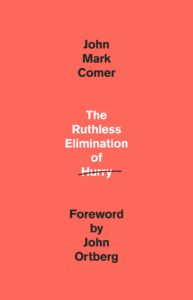 The Ruthless Elimination of Hurry John Mark Comer (Waterbrook) $23.99 I did a long, breathy review of this earlier this fall and the book quickly became one of our best selling titles of the year. John Mark Comer is fun and cool, the design is hip and youthful, but the content — riffing on a line from Dallas Willard — is perennial, good for anyone who wants to deepen their spiritual lives by slowing down, learning to be mindful, and create transforming space to know God more intimately, so to be remade into the image of Christ. Fun and clever as this is, reading The Ruthless Elimination of Hurry becomes a great way into conversations about spirituality, lifestyles, pace of life, serenity, repentance, discipleship. He writes movingly about Christ’s (easy) yoke. About being an apprentice of the true Lord who shows us what it means to be human. Comer’s Garden City is about vocation and calling, work and rest. It is about being made in God’s image and you can see this new one as a natural follow up, focusing less on the call to work, and more on the call to rest. There is a great foreword by John Ortberg, who calls Ruthless Elimination… a “prophetic word for our time.” It is clearly pitched to young adult readers, but this old guy turning 65 this week thinks it is one of the books of the year!
The Ruthless Elimination of Hurry John Mark Comer (Waterbrook) $23.99 I did a long, breathy review of this earlier this fall and the book quickly became one of our best selling titles of the year. John Mark Comer is fun and cool, the design is hip and youthful, but the content — riffing on a line from Dallas Willard — is perennial, good for anyone who wants to deepen their spiritual lives by slowing down, learning to be mindful, and create transforming space to know God more intimately, so to be remade into the image of Christ. Fun and clever as this is, reading The Ruthless Elimination of Hurry becomes a great way into conversations about spirituality, lifestyles, pace of life, serenity, repentance, discipleship. He writes movingly about Christ’s (easy) yoke. About being an apprentice of the true Lord who shows us what it means to be human. Comer’s Garden City is about vocation and calling, work and rest. It is about being made in God’s image and you can see this new one as a natural follow up, focusing less on the call to work, and more on the call to rest. There is a great foreword by John Ortberg, who calls Ruthless Elimination… a “prophetic word for our time.” It is clearly pitched to young adult readers, but this old guy turning 65 this week thinks it is one of the books of the year!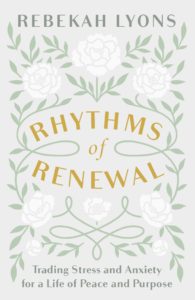 Rhythms of Renewal: Trading Stress and Anxiety for a Life of Peace and Purpose Rebekah Lyons (Zondervan) $24.99 Perhaps this is a bit of a theme (see the JMC book above) as we tire of our fast-paced, hot-wired lifestyles. Like Comer, Rebekah Lyons isn’t just inviting us to be more healthy, avoid stress and burnout, being more calm and present. Although, heavens, we need help with that. For her, though, the “rhythms of renewal” are gateways to deeper, more wholesome and sustainable spirituality. Comer admits that as the pastor of a large, multi-site church, and a global conversation partner around theme of social and cultural engagement, he has an unusual amount of stress. And in the past has struggled with depression and anxiety. This is Rebekah’s story, too — her anxiety and panic attacks are vivid and she is honest about how, even as a leader in the Q movement (her husband is Gabe, founder of Q) she is often debilitated by the stress of her callings. There are lovely blurbs on this book — clearly written in a woman’s voice — by the likes of Bob Goff, John Townsend, and Lysa Terkeurst.
Rhythms of Renewal: Trading Stress and Anxiety for a Life of Peace and Purpose Rebekah Lyons (Zondervan) $24.99 Perhaps this is a bit of a theme (see the JMC book above) as we tire of our fast-paced, hot-wired lifestyles. Like Comer, Rebekah Lyons isn’t just inviting us to be more healthy, avoid stress and burnout, being more calm and present. Although, heavens, we need help with that. For her, though, the “rhythms of renewal” are gateways to deeper, more wholesome and sustainable spirituality. Comer admits that as the pastor of a large, multi-site church, and a global conversation partner around theme of social and cultural engagement, he has an unusual amount of stress. And in the past has struggled with depression and anxiety. This is Rebekah’s story, too — her anxiety and panic attacks are vivid and she is honest about how, even as a leader in the Q movement (her husband is Gabe, founder of Q) she is often debilitated by the stress of her callings. There are lovely blurbs on this book — clearly written in a woman’s voice — by the likes of Bob Goff, John Townsend, and Lysa Terkeurst.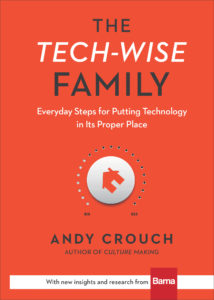 The Tech-Wise Family: Everyday Steps for Putting Technology in Its Proper Place Andy Crouch (Baker) $15.99 This is not new, but if you don’t know it, or haven’t given it, it ought to be on your own radar screen (to use an older technological image.) There are lots of books that have come out in recent years documenting the dangers of over-doing digital technologies and there are plenty of books for parents of teens or youth, helping offer guidance and prudence, strength and insight, about how to use technology well.
The Tech-Wise Family: Everyday Steps for Putting Technology in Its Proper Place Andy Crouch (Baker) $15.99 This is not new, but if you don’t know it, or haven’t given it, it ought to be on your own radar screen (to use an older technological image.) There are lots of books that have come out in recent years documenting the dangers of over-doing digital technologies and there are plenty of books for parents of teens or youth, helping offer guidance and prudence, strength and insight, about how to use technology well.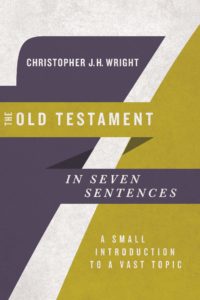 The Old Testament in Seven Sentences: A Small Introduction to a Vast Topic Christopher Wright (IVP) $16.00 There are plenty of books which offer fine, even fabulous overviews of the Old Testament and its coherent story. This one (in part because of the clever and succinct seven sentences approach) is fantastic. Chris Wright is one of the great Old Testament scholars of our time and an important leader in wholistic ministry (working out of the Langham Trust in the UK.) The publisher says about it:
The Old Testament in Seven Sentences: A Small Introduction to a Vast Topic Christopher Wright (IVP) $16.00 There are plenty of books which offer fine, even fabulous overviews of the Old Testament and its coherent story. This one (in part because of the clever and succinct seven sentences approach) is fantastic. Chris Wright is one of the great Old Testament scholars of our time and an important leader in wholistic ministry (working out of the Langham Trust in the UK.) The publisher says about it: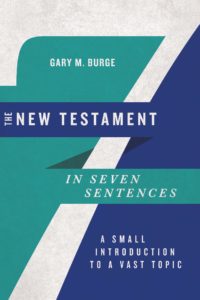 The New Testament in Seven Sentences: A Small Introduction to a Vast Topic Gary Burge (IVP) $16.00 A great companion to the one above, this, too, is a clever way to do a fabulous overview of the key plot and teachings of the entire New Testament. I like Burge a lot (and value his insight into the cultural backgrounds and contexts of Jesus and the rest of the New Testament.)
The New Testament in Seven Sentences: A Small Introduction to a Vast Topic Gary Burge (IVP) $16.00 A great companion to the one above, this, too, is a clever way to do a fabulous overview of the key plot and teachings of the entire New Testament. I like Burge a lot (and value his insight into the cultural backgrounds and contexts of Jesus and the rest of the New Testament.)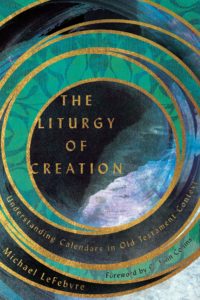 The Liturgy of Creation: Understanding Calendars in Old Testament Context
The Liturgy of Creation: Understanding Calendars in Old Testament Context  Romans Disarmed: Resisting Empire/Demanding Justice Sylvia Keesmaat & Brian Walsh (Brazos Press) $26.99 Well. I reviewed this audacious book at great length at a major BookNotes announcement about it when it first came out and said then that I’m sure it will be on our “Best Books of 2019” of the year award. It is a detailed, creative, imaginative, hard-hitting, insistent study of epistle of Paul to the Romans and insists that the bigger point and context was for Paul to encourage church unity as a witness to the coming upside-down Kingdom of Christ which was explicitly anti-Imperial. That is, this is a reading of the famous book of the Bible, a letter, really, that has been dis-armed or maybe newly weaponized for the nonviolent struggle for peace, justice, reconciliation, ecological sanity and full inclusion of all people in the open table of God’s own. Yes, the authors argue (convincingly, I believe) that Romans has been misconstrued as an abstract theological lesson and that reading has been used to bully people, shutting down the impulse of hospitality that is at the heart of the epistle itself. So the letter — or, more precisely, our interpretations and applications — needs to be disarmed. And they show us exactly how, but experiencing the letter as it first might have been experience, calling us to be the sort of justice-seeking community that grieves with the hurting and welcomes the marginalized, as the book of Romans tells us to.
Romans Disarmed: Resisting Empire/Demanding Justice Sylvia Keesmaat & Brian Walsh (Brazos Press) $26.99 Well. I reviewed this audacious book at great length at a major BookNotes announcement about it when it first came out and said then that I’m sure it will be on our “Best Books of 2019” of the year award. It is a detailed, creative, imaginative, hard-hitting, insistent study of epistle of Paul to the Romans and insists that the bigger point and context was for Paul to encourage church unity as a witness to the coming upside-down Kingdom of Christ which was explicitly anti-Imperial. That is, this is a reading of the famous book of the Bible, a letter, really, that has been dis-armed or maybe newly weaponized for the nonviolent struggle for peace, justice, reconciliation, ecological sanity and full inclusion of all people in the open table of God’s own. Yes, the authors argue (convincingly, I believe) that Romans has been misconstrued as an abstract theological lesson and that reading has been used to bully people, shutting down the impulse of hospitality that is at the heart of the epistle itself. So the letter — or, more precisely, our interpretations and applications — needs to be disarmed. And they show us exactly how, but experiencing the letter as it first might have been experience, calling us to be the sort of justice-seeking community that grieves with the hurting and welcomes the marginalized, as the book of Romans tells us to. 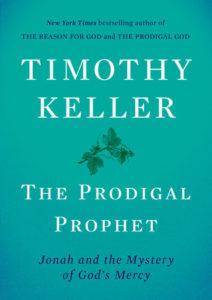 The Prodigal Prophet: Jonah and the Mystery of God’s Mercy Timothy Keller (Viking) $20.00 Another one of these compact sized hardbacks that make a nice little gift. And, seriously, this is fascinating. Not only is Keller always clear and thoughtful and widely read, this is recent and provocative. It’s about the prophet Jonah, of course, and that’s always a blast, ending as it does under the unpredictable plant, as Eugene Peterson put it. Here, Keller makes a creative move and connects Jonah to the parable of the Prodigal Son. Nice!
The Prodigal Prophet: Jonah and the Mystery of God’s Mercy Timothy Keller (Viking) $20.00 Another one of these compact sized hardbacks that make a nice little gift. And, seriously, this is fascinating. Not only is Keller always clear and thoughtful and widely read, this is recent and provocative. It’s about the prophet Jonah, of course, and that’s always a blast, ending as it does under the unpredictable plant, as Eugene Peterson put it. Here, Keller makes a creative move and connects Jonah to the parable of the Prodigal Son. Nice!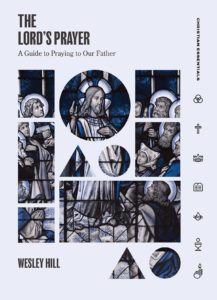 The Lord’s Prayer: A Guide to Praying to Our Father Wesley Hill (Lexham Press) $15.99 This is a very small, compact-sized guide that is more meaty and generative and useful than some books twice the size. Hill is a New Testament scholar and a dear man and a clear (but never stuffy) writer. He’s created a very solid, useful book.
The Lord’s Prayer: A Guide to Praying to Our Father Wesley Hill (Lexham Press) $15.99 This is a very small, compact-sized guide that is more meaty and generative and useful than some books twice the size. Hill is a New Testament scholar and a dear man and a clear (but never stuffy) writer. He’s created a very solid, useful book.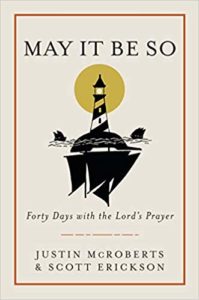 May It Be So: Forty Days with the Lord’s Prayer Justin McRoberts & Scott Erickson (Waterbrook) $16.99 This will make a great gift for a special someone, but, admittedly, may not be for everyone. Justin McRoberts is a recording artist, writer, retreat leader who brings raw truth and hard-hitting insight about our longings for a better discipleship and Scott Erickson is an edgy sort of artists and graphic designer. So May It Be So has a very contemporary, design forward feel, with graphic art (with a silkscreen sort of appearance.) In fact, the hip art pieces are invitation to ponder — they are remarkably allusive and evocative, designed to help us enter into a more meditative and curiously thoughtful space, and Justin’s meditations are perfect supplements. These two guys are convinced that humans long for connections, for prayer, for a deeper sort of spirituality that may seem just beyond our reach. Good books on the theology of prayer are important, but they are not enough. We need prompts and on-ramps and stories so we can not sure think about praying, but actually do it.
May It Be So: Forty Days with the Lord’s Prayer Justin McRoberts & Scott Erickson (Waterbrook) $16.99 This will make a great gift for a special someone, but, admittedly, may not be for everyone. Justin McRoberts is a recording artist, writer, retreat leader who brings raw truth and hard-hitting insight about our longings for a better discipleship and Scott Erickson is an edgy sort of artists and graphic designer. So May It Be So has a very contemporary, design forward feel, with graphic art (with a silkscreen sort of appearance.) In fact, the hip art pieces are invitation to ponder — they are remarkably allusive and evocative, designed to help us enter into a more meditative and curiously thoughtful space, and Justin’s meditations are perfect supplements. These two guys are convinced that humans long for connections, for prayer, for a deeper sort of spirituality that may seem just beyond our reach. Good books on the theology of prayer are important, but they are not enough. We need prompts and on-ramps and stories so we can not sure think about praying, but actually do it.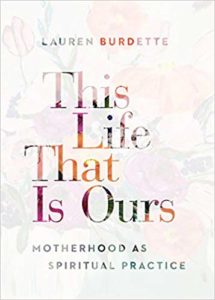 This Life That Is Ours: Motherhood as a Spiritual Practice Lauren Burdette (Upper Room Books) $12.99 What mom wouldn’t like a small, compact, meditatively written book about the spirituality of mothering? This is reflective, lovely, moving, even… a great gift. Lauren is part of a wonderful, small Presbyterian church we know in Pittsburgh — missional, visionary, yet deeply rooted in ancient spiritual practices. In this context she reflected on her own calling as a new mother, and how these habits of doing her daily mothering stuff were, in fact, shaping her, and have the potential to shape other moms, in profound ways.
This Life That Is Ours: Motherhood as a Spiritual Practice Lauren Burdette (Upper Room Books) $12.99 What mom wouldn’t like a small, compact, meditatively written book about the spirituality of mothering? This is reflective, lovely, moving, even… a great gift. Lauren is part of a wonderful, small Presbyterian church we know in Pittsburgh — missional, visionary, yet deeply rooted in ancient spiritual practices. In this context she reflected on her own calling as a new mother, and how these habits of doing her daily mothering stuff were, in fact, shaping her, and have the potential to shape other moms, in profound ways.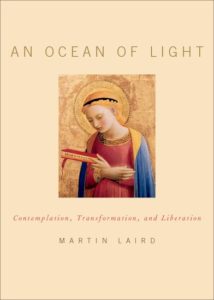 An Ocean of Light: Contemplation, Transformation, and Liberation Martin Laird (Oxford University Press) $18.95 Again, a small hardback that is somehow weighty, serious, but yet a perfect shape in the hand to take on retreat or to a quiet chair. This is one that truly gets to be described as “beautifully written” combining scholarly awareness of the deepest mystical tradition and warm and enticing stories of his own life as a conetmpatlive and spiritual director.
An Ocean of Light: Contemplation, Transformation, and Liberation Martin Laird (Oxford University Press) $18.95 Again, a small hardback that is somehow weighty, serious, but yet a perfect shape in the hand to take on retreat or to a quiet chair. This is one that truly gets to be described as “beautifully written” combining scholarly awareness of the deepest mystical tradition and warm and enticing stories of his own life as a conetmpatlive and spiritual director.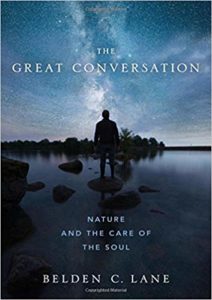 The Great Conversation: Nature and the Care of the Soul Belden Lane (Oxford University Press) $29.95 I hesitate to call this spirituality, proper — it is actually written as memoir, as most of it is in the first person as Lane — who has written similar books like Backpacking with the Saints — tells of his extraordinary adventures finding God in creation. (And they are extraordinary, spiritually, yes, but just in terms of the places he visits and tells about, literally all over the globe. Wow.) James Martin, S.J. calls The Great Conversation “luminous” and Presbyterian spiritual life professor Elizabeth Liebert says it is “scholarship born of passion, love, and commitment to the continuing existence and well-being of fellow creatures.” He is a good writer, he is passionate, and his experiments in relating to the world around us as he hikes and attends are really fabulously interesting.
The Great Conversation: Nature and the Care of the Soul Belden Lane (Oxford University Press) $29.95 I hesitate to call this spirituality, proper — it is actually written as memoir, as most of it is in the first person as Lane — who has written similar books like Backpacking with the Saints — tells of his extraordinary adventures finding God in creation. (And they are extraordinary, spiritually, yes, but just in terms of the places he visits and tells about, literally all over the globe. Wow.) James Martin, S.J. calls The Great Conversation “luminous” and Presbyterian spiritual life professor Elizabeth Liebert says it is “scholarship born of passion, love, and commitment to the continuing existence and well-being of fellow creatures.” He is a good writer, he is passionate, and his experiments in relating to the world around us as he hikes and attends are really fabulously interesting. On the Road with Saint Augustine: A Real World Spirituality for Restless Hearts James K.A. Smith (Brazos Press) $24.99 Okay, hear me out: this is one of the most important, and best, and most discussed serious Christian books of 2019. It’ll be on the top of our “Best of” awards list in a week or two. You should buy two to give away, and one for yourself (duh) if you haven’t yet. We are glad so many Hearts & Minds customers have ordered it this fall, and we hope to continue to promote it almost anywhere we go. It is just one of those books that discriminating buyers of religious books should get.
On the Road with Saint Augustine: A Real World Spirituality for Restless Hearts James K.A. Smith (Brazos Press) $24.99 Okay, hear me out: this is one of the most important, and best, and most discussed serious Christian books of 2019. It’ll be on the top of our “Best of” awards list in a week or two. You should buy two to give away, and one for yourself (duh) if you haven’t yet. We are glad so many Hearts & Minds customers have ordered it this fall, and we hope to continue to promote it almost anywhere we go. It is just one of those books that discriminating buyers of religious books should get.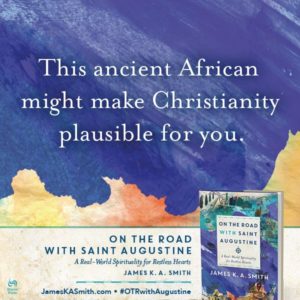 community and homecoming. There is stuff about “how to believe” and “how to hope” and what it means to aspire or connect and protest and hope. It is rare, I think, to have such a wise guidebook that is also so philosophical, drawing on history and telling about the lives of figures as diverse as Albert Camus and Leslie Jamison and books and films and pop music from Don Quixote to the movies of Wes Anderson the the haunting songs of The Postal Service. That he is able to move so effortlessly between what feels like an upbeat, illuminated philosophy class and a quiet moment of spiritual direction and a rowdy conversation over drinks after hours is one of the glories of this book. For those willing to work through a few of the dense parts, there’s plenty of fun reading and lots of deep, profound Christian truth.
community and homecoming. There is stuff about “how to believe” and “how to hope” and what it means to aspire or connect and protest and hope. It is rare, I think, to have such a wise guidebook that is also so philosophical, drawing on history and telling about the lives of figures as diverse as Albert Camus and Leslie Jamison and books and films and pop music from Don Quixote to the movies of Wes Anderson the the haunting songs of The Postal Service. That he is able to move so effortlessly between what feels like an upbeat, illuminated philosophy class and a quiet moment of spiritual direction and a rowdy conversation over drinks after hours is one of the glories of this book. For those willing to work through a few of the dense parts, there’s plenty of fun reading and lots of deep, profound Christian truth.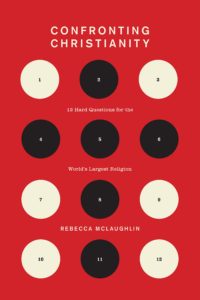 Confronting Christianity: 12 Hard Questions for the World’s Largest Religion Rebecca mcLaughlin (Crossway) $24.99 If you want to give a gift for someone who wouldn’t resonate with Smith’s rambling, complex, beautiful guide through our search for identity and roots and hope by way of studying a third century seeker, maybe a more straight-away gift would be appreciated. Confronting Christianity admits that those who advocate and live out the Christian faith simply must cope with a few key, legitimate, important questions. Some of these are general questions being asked by secularists (“Aren’t we better off without Religion” and “Doesn’t Religion Cause Violence?” and the questions about religion and science) and others are questions specifically about the Christian religion — does the Bible condone slavery?, isn’t Christianity homophobic?, how can you say there is only one way?, and the like. These sort of collections of honest answers to hard questions are plentiful, but this one is very smart and fair-minded. It won a Christianity Today Best Book award a few weeks ago and has endorsements by the likes of Oxford University mathematics professor John Lennox and Harvard University epidemiologist Tyler Vanderweele. MIT prof Ian Hutchinson calls is “deep and caring” and “not an easy stroll through imagined virtual reality but an adventurous rocky pathway through true and abundant life.”
Confronting Christianity: 12 Hard Questions for the World’s Largest Religion Rebecca mcLaughlin (Crossway) $24.99 If you want to give a gift for someone who wouldn’t resonate with Smith’s rambling, complex, beautiful guide through our search for identity and roots and hope by way of studying a third century seeker, maybe a more straight-away gift would be appreciated. Confronting Christianity admits that those who advocate and live out the Christian faith simply must cope with a few key, legitimate, important questions. Some of these are general questions being asked by secularists (“Aren’t we better off without Religion” and “Doesn’t Religion Cause Violence?” and the questions about religion and science) and others are questions specifically about the Christian religion — does the Bible condone slavery?, isn’t Christianity homophobic?, how can you say there is only one way?, and the like. These sort of collections of honest answers to hard questions are plentiful, but this one is very smart and fair-minded. It won a Christianity Today Best Book award a few weeks ago and has endorsements by the likes of Oxford University mathematics professor John Lennox and Harvard University epidemiologist Tyler Vanderweele. MIT prof Ian Hutchinson calls is “deep and caring” and “not an easy stroll through imagined virtual reality but an adventurous rocky pathway through true and abundant life.”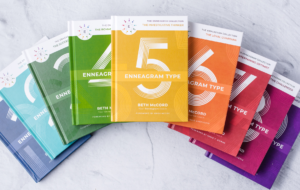 Enneagram Type 1 Enneagram Type 2 Enneagram Type 3 Enneagram Type 4 Enneagram Type 5 Enneagram Type 6 Enneagram Type 7 Enneagram Type 8 Enneagram Type 9
Enneagram Type 1 Enneagram Type 2 Enneagram Type 3 Enneagram Type 4 Enneagram Type 5 Enneagram Type 6 Enneagram Type 7 Enneagram Type 8 Enneagram Type 9 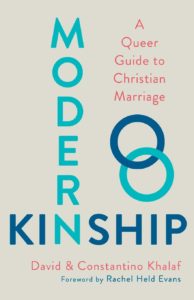 Modern Kinship: A Queer Guide to Christian Marriage David & Constantino Khalaf (WJK) $16.00 I love the story about Mark Twain’s reply when he was asked if he believed in infant baptism. “Believe in it?”, he retorted, “Why, I’ve seen it.” Whether you “believe in” marriage equality or not, you most likely have seen it. You may have gay people you care about who are married. Why not wish them well and offer them some faith-based insight about the complexities of navigating their admittedly unusual marriage situation? This is the only overtly Christian book for gay folks (men or women) talking candidly about a Christian marriage. Most often, for obvious reasons, queer folks who are churched are involved in mainline or progressive sorts of congregations, but not always; in any case, this is no fundamentalist scold. The couple who wrote the book together themselves have to navigate their different religious backgrounds; one spouse was rooted in a more traditionalist mainline church tradition while the other was non-denominationally evangelical. I have to admit I read a lot of books about marriage (including memoirs of marriage) and I found this hard to put down.
Modern Kinship: A Queer Guide to Christian Marriage David & Constantino Khalaf (WJK) $16.00 I love the story about Mark Twain’s reply when he was asked if he believed in infant baptism. “Believe in it?”, he retorted, “Why, I’ve seen it.” Whether you “believe in” marriage equality or not, you most likely have seen it. You may have gay people you care about who are married. Why not wish them well and offer them some faith-based insight about the complexities of navigating their admittedly unusual marriage situation? This is the only overtly Christian book for gay folks (men or women) talking candidly about a Christian marriage. Most often, for obvious reasons, queer folks who are churched are involved in mainline or progressive sorts of congregations, but not always; in any case, this is no fundamentalist scold. The couple who wrote the book together themselves have to navigate their different religious backgrounds; one spouse was rooted in a more traditionalist mainline church tradition while the other was non-denominationally evangelical. I have to admit I read a lot of books about marriage (including memoirs of marriage) and I found this hard to put down.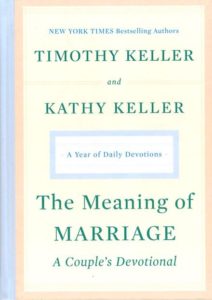 The Meaning of Marriage: A Couple’s Devotional – a Year of Daily Devotions Timothy & Kathy Keller (Viking) $20.00 I have said that, with a few qualifications, I think Tim & Kathy Keller’s 2011 release, The Meaning of Marriage, is one of the better books on a theology of marriage I’ve ever read. It is interesting, Biblical, culturally aware, and quite thoughtful. We are happy to promote all of Keller’s many books (including the other two devotionals that he wrote with his wife, The Songs of Jesus, on the Psalms, and God’s Wisdom for Navigating Life on Proverbs) and were so very glad to see this gifty looking small daily devotional of 365 readings to supplement their Meaning of Marriage.
The Meaning of Marriage: A Couple’s Devotional – a Year of Daily Devotions Timothy & Kathy Keller (Viking) $20.00 I have said that, with a few qualifications, I think Tim & Kathy Keller’s 2011 release, The Meaning of Marriage, is one of the better books on a theology of marriage I’ve ever read. It is interesting, Biblical, culturally aware, and quite thoughtful. We are happy to promote all of Keller’s many books (including the other two devotionals that he wrote with his wife, The Songs of Jesus, on the Psalms, and God’s Wisdom for Navigating Life on Proverbs) and were so very glad to see this gifty looking small daily devotional of 365 readings to supplement their Meaning of Marriage.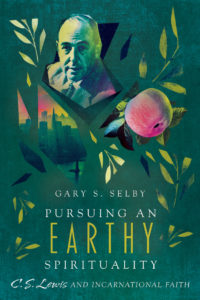 Pursuing an Earthy Spirituality: C. S. Lewis and Incarnational Faith Gary S. Selby (IVP Academic) $22.00 I don’t need to say much about this. You know, I hope, that Lewis wrote much about the joy of human pleasures and the goodness of creation. He wrote the forward to a famous edition of Saint Athanasius’s On the Incarnation. His vision of the cosmic nature of sin and salvation makes his fiction so earthy. Without much bluster, he calmly reminded us in so many ways that gnosticism is not Christian. So, if spirituality is “earthy” what, then, does that mean? What does it look like? Can the old Oxford don help us with a “down to Earth” holy worldliness? Can we live out of an incarnational worldview? What in this world is “Earthy spirituality”? This is a suburb book for anyone wanting to think more deeply about spiritual formation and whole-life discipleship, but it is a gem for anyone who likes drawing on Mr. Lewis. A great book, highly recommended.
Pursuing an Earthy Spirituality: C. S. Lewis and Incarnational Faith Gary S. Selby (IVP Academic) $22.00 I don’t need to say much about this. You know, I hope, that Lewis wrote much about the joy of human pleasures and the goodness of creation. He wrote the forward to a famous edition of Saint Athanasius’s On the Incarnation. His vision of the cosmic nature of sin and salvation makes his fiction so earthy. Without much bluster, he calmly reminded us in so many ways that gnosticism is not Christian. So, if spirituality is “earthy” what, then, does that mean? What does it look like? Can the old Oxford don help us with a “down to Earth” holy worldliness? Can we live out of an incarnational worldview? What in this world is “Earthy spirituality”? This is a suburb book for anyone wanting to think more deeply about spiritual formation and whole-life discipleship, but it is a gem for anyone who likes drawing on Mr. Lewis. A great book, highly recommended.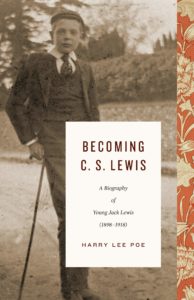 Becoming C.S. Lewis: A Biography of Young Jack Lewis (1898 – 1918) Harry Lee Poe (Crossway) $22.00 With the slightly textured dust jacked, the old fashioned photo and the wallpaper-like flyleaves, this book itself is so handsome it almost feels vintage. It is what is says, a biography of Lewis’s youth. It is the first part of what will be a massive and major three part biography. So far, it is off to a conspicuous start — some reviewers insist this is a must-read and more than one has observed that there is material in here that has not been explored in any previous Lewis biography.
Becoming C.S. Lewis: A Biography of Young Jack Lewis (1898 – 1918) Harry Lee Poe (Crossway) $22.00 With the slightly textured dust jacked, the old fashioned photo and the wallpaper-like flyleaves, this book itself is so handsome it almost feels vintage. It is what is says, a biography of Lewis’s youth. It is the first part of what will be a massive and major three part biography. So far, it is off to a conspicuous start — some reviewers insist this is a must-read and more than one has observed that there is material in here that has not been explored in any previous Lewis biography.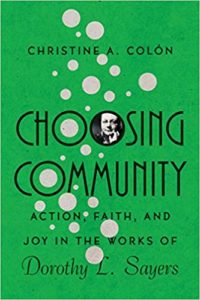 Choosing Community: Action, Faith, and Joy in the Works of Dorothy Sayers Christine Colon (IVP) $16.00 Released under the auspices of the Marion Wade Center at Wheaton College, this is one of the most accesible and important new books on Inkling Dorothy Sayers yet done. Colon is a professor of English and a scholar of the Victorian Literary tradition and a sharp. popular instructor. Choosing Community was initially presented as part of the prestigious Hansen Lectureship series and it was very positively received. There is a lot here on the Lord Peter Whimsey detective novels so this could make a great gift for anybody who enjoys that mystery genre or that knows of Sayers’ literary work. (For instance, her significant work translating Dante.) The book cites unpublished letters of Sayers and works well with her religious drama and theatrical work, too. Nearly everyone who specializes in this field seems to shout “bravo” to Colon for her meticulous research, her good writing, and the urgently necessary vision of a broad and caring sort of beautifully orthodox faith.
Choosing Community: Action, Faith, and Joy in the Works of Dorothy Sayers Christine Colon (IVP) $16.00 Released under the auspices of the Marion Wade Center at Wheaton College, this is one of the most accesible and important new books on Inkling Dorothy Sayers yet done. Colon is a professor of English and a scholar of the Victorian Literary tradition and a sharp. popular instructor. Choosing Community was initially presented as part of the prestigious Hansen Lectureship series and it was very positively received. There is a lot here on the Lord Peter Whimsey detective novels so this could make a great gift for anybody who enjoys that mystery genre or that knows of Sayers’ literary work. (For instance, her significant work translating Dante.) The book cites unpublished letters of Sayers and works well with her religious drama and theatrical work, too. Nearly everyone who specializes in this field seems to shout “bravo” to Colon for her meticulous research, her good writing, and the urgently necessary vision of a broad and caring sort of beautifully orthodox faith.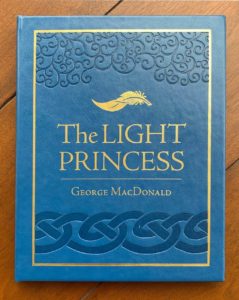 The Light Princess George MacDonald with illustrations by Ned Bustard (Rabbit Room Press) $18.00 Those who have followed Hearts & Minds for decades know that we used to feature lots of the great novels — children’s and Victorian adult novels — of the brilliant writer, orator, preacher, and artiste, George MacDonald, may of which are now out of print. Many know of how C.S. Lewis even edited an anthology of his favorite MacDonald quotes. Sadly, many editions of many MacDonald books have been dropped by legitimate publishers and few stellar editions of his volumes are readily available. We are so, so glad that the classy and fun Rabbit Room crew of Rabbit Room Press released a new edition of the fairy story The Light Princess.
The Light Princess George MacDonald with illustrations by Ned Bustard (Rabbit Room Press) $18.00 Those who have followed Hearts & Minds for decades know that we used to feature lots of the great novels — children’s and Victorian adult novels — of the brilliant writer, orator, preacher, and artiste, George MacDonald, may of which are now out of print. Many know of how C.S. Lewis even edited an anthology of his favorite MacDonald quotes. Sadly, many editions of many MacDonald books have been dropped by legitimate publishers and few stellar editions of his volumes are readily available. We are so, so glad that the classy and fun Rabbit Room crew of Rabbit Room Press released a new edition of the fairy story The Light Princess.  Kudos to all at Rabbit Room Books for doing this lovely edition of this great old tale. But we offer special hat tips to Mr. Bustard for his playful linographs, his titling characters, and his other design work on the volume, making it a most handsome, almost exquisite, edition.
Kudos to all at Rabbit Room Books for doing this lovely edition of this great old tale. But we offer special hat tips to Mr. Bustard for his playful linographs, his titling characters, and his other design work on the volume, making it a most handsome, almost exquisite, edition.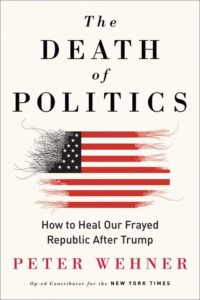 The Death of Politics: How to Heal Our Frayed Republic After Trump Peter Wehner (HarperOne) $25.99 As we’ve shown at BookNotes, there are a bunch of books on civility, or finding common ground, but on also being principled and integrally Christian in our citizenship lives. You may know that Wehner worked in the Reagan administration has been a major voice in thoughtful Republican and conservative circles and because of his deep involvement with the Right is now outspoken about the vulgar and immoral ways of the current administration. He is frustrated about his own movement’s lack of coherent, abiding principles but he is also alarmed — as we all should be –about the fraying body politic, about culture wars and anger and fragmentation. He believe that politics can be a noble calling but that this has been corrupted, not least by Donald Trump.
The Death of Politics: How to Heal Our Frayed Republic After Trump Peter Wehner (HarperOne) $25.99 As we’ve shown at BookNotes, there are a bunch of books on civility, or finding common ground, but on also being principled and integrally Christian in our citizenship lives. You may know that Wehner worked in the Reagan administration has been a major voice in thoughtful Republican and conservative circles and because of his deep involvement with the Right is now outspoken about the vulgar and immoral ways of the current administration. He is frustrated about his own movement’s lack of coherent, abiding principles but he is also alarmed — as we all should be –about the fraying body politic, about culture wars and anger and fragmentation. He believe that politics can be a noble calling but that this has been corrupted, not least by Donald Trump.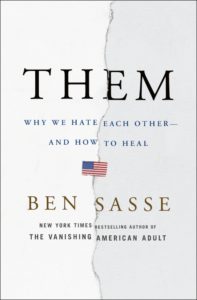 Them: Why We Hate Each Other– And How to Heal Ben Sasse (St. Martin’s Press) $17.99 We had reviewed this at BookNotes when it was still only in hardback and it has just recently come out in paperback (with a new preface from the author.) I think Mr. Sasse is a better thinker and writer than he is a Senator, but, no matter what you think of his voting record, he argues here that our crisis is deeper than partisan politics. He writes about the epidemic of loneliness and a path forward that is rooted in paying attention to place. In fact rootedness is a theme of the book. NPR says even if you disagree with his ideas, this book is well worth reading and we agree.
Them: Why We Hate Each Other– And How to Heal Ben Sasse (St. Martin’s Press) $17.99 We had reviewed this at BookNotes when it was still only in hardback and it has just recently come out in paperback (with a new preface from the author.) I think Mr. Sasse is a better thinker and writer than he is a Senator, but, no matter what you think of his voting record, he argues here that our crisis is deeper than partisan politics. He writes about the epidemic of loneliness and a path forward that is rooted in paying attention to place. In fact rootedness is a theme of the book. NPR says even if you disagree with his ideas, this book is well worth reading and we agree.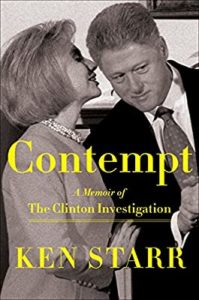 Contempt: A Memoir of the Clinton Investigation Ken Starr (Sentinel) $28.00 It seems that if one is following the ups and downs of the current impeachment controversy, it would be helpful and certainly interesting to compare it with the other memorable impeachment from a few administrations back. As you should know, Ken Starr, a conservative, Christian, kindly, constitutional law scholar, a thoughtful law professor and attorney (who, by the way, was under consideration for a nomination for the Supreme Court) was given the unsavory and complicated task of investigating financial shenanigans (of which people were indicted and went to jail) in which both President Clinton and the First Lady were deeply involved. There was legal stuff, grand juries, investigations, subpoenas, lawsuits, and, eventually pretty obvious contempt from the First Lady and, then, perjury from the President of the United States. The President’s own Attorney General (Janet Reno) commissioned Mr. Starr to lead the team doing the investigation into the President’s financial craziness that became known as the Whitewater scandal. As Starr says (and I have good reason to believe him) he did this a bit reluctantly, but out of civic duty as a public servant, knowing it would delay his own career goals and perhaps bring anxiety to his family; that is, it was not his great desire to become known for this. (Little did he know that he would soon have to have armed security guards, as would his young adult children when they went off to college, and that he would get pulled into years and years worth of complicated, controversial, even tragic work.)
Contempt: A Memoir of the Clinton Investigation Ken Starr (Sentinel) $28.00 It seems that if one is following the ups and downs of the current impeachment controversy, it would be helpful and certainly interesting to compare it with the other memorable impeachment from a few administrations back. As you should know, Ken Starr, a conservative, Christian, kindly, constitutional law scholar, a thoughtful law professor and attorney (who, by the way, was under consideration for a nomination for the Supreme Court) was given the unsavory and complicated task of investigating financial shenanigans (of which people were indicted and went to jail) in which both President Clinton and the First Lady were deeply involved. There was legal stuff, grand juries, investigations, subpoenas, lawsuits, and, eventually pretty obvious contempt from the First Lady and, then, perjury from the President of the United States. The President’s own Attorney General (Janet Reno) commissioned Mr. Starr to lead the team doing the investigation into the President’s financial craziness that became known as the Whitewater scandal. As Starr says (and I have good reason to believe him) he did this a bit reluctantly, but out of civic duty as a public servant, knowing it would delay his own career goals and perhaps bring anxiety to his family; that is, it was not his great desire to become known for this. (Little did he know that he would soon have to have armed security guards, as would his young adult children when they went off to college, and that he would get pulled into years and years worth of complicated, controversial, even tragic work.)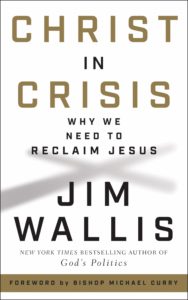 Christ in Crisis: Why We Need to Reclaim Jesus Jim Wallis (HarperOne) $25.99 I’ve heard a few conservative-leaning persons suggest that they know what Wallis thinks, don’t need the book, and that may mostly be so. He’s written books like God’s Politics and continues to edit the lefty, social justice rag, Sojo. But I’m not sure I get the ambivalence to this: each chapter is about a question Jesus asked and the implications such holy questioning might have on our body politic. Yes, it is an anti-Trump manifesto, but more, it is an insistence that we take Jesus seriously. He does admit that good people can disagree in good faith and he does not say that one cannot support Trump and be a sincere disciple. But if he leans towards those convictions, he tries to be civil and play fair, and he does continue to tell stories and make applications from the gospel texts. There are level-headed folks offering endorsing blurbs, from Senator Chris Coons to Princeton professor Eddie Glaude to Fuller Theological Seminary president, Mark Labberton.
Christ in Crisis: Why We Need to Reclaim Jesus Jim Wallis (HarperOne) $25.99 I’ve heard a few conservative-leaning persons suggest that they know what Wallis thinks, don’t need the book, and that may mostly be so. He’s written books like God’s Politics and continues to edit the lefty, social justice rag, Sojo. But I’m not sure I get the ambivalence to this: each chapter is about a question Jesus asked and the implications such holy questioning might have on our body politic. Yes, it is an anti-Trump manifesto, but more, it is an insistence that we take Jesus seriously. He does admit that good people can disagree in good faith and he does not say that one cannot support Trump and be a sincere disciple. But if he leans towards those convictions, he tries to be civil and play fair, and he does continue to tell stories and make applications from the gospel texts. There are level-headed folks offering endorsing blurbs, from Senator Chris Coons to Princeton professor Eddie Glaude to Fuller Theological Seminary president, Mark Labberton. Can I Get a Witness: Thirteen Peacemakers, Community Builders, and Agitators for Faith and Justice edited by Charles Marsh, Shea Tuttle, and Daniel Rhodes (Eerdmans) $26.00 Do you recall the review I did of this earlier this fall? This isn’t about statecraft and government, as such, but it is about public life, about Christians whose faith motivated them to be involved in matters of civic life, public justice, social concerns. My, my, what a great book, created out of the “Project on Lived Theology” at University of Virginia. There are fabulous theologians and public leaders (Soong-Chan Rah, Daniel Rhodes, Becca Stevens, David Dark, and more) teaching us very much about Cesar Chavez, Howard Thurman, Dorothy Day, Mahalia Jackson, Richard Twiss, and others. This book is mature and thoughtful, profound, even. Can we work towards the transformation of American culture through better religious convictions? Can those with helpful beliefs be inspired to live them out in public life by learning about these others that did so in other places and times? Of course. This is a sturdy, serious book and could be shared with anyone who loves history, biographies, or wants to explore the depths of wholistic, radical faith. Highly recommended.
Can I Get a Witness: Thirteen Peacemakers, Community Builders, and Agitators for Faith and Justice edited by Charles Marsh, Shea Tuttle, and Daniel Rhodes (Eerdmans) $26.00 Do you recall the review I did of this earlier this fall? This isn’t about statecraft and government, as such, but it is about public life, about Christians whose faith motivated them to be involved in matters of civic life, public justice, social concerns. My, my, what a great book, created out of the “Project on Lived Theology” at University of Virginia. There are fabulous theologians and public leaders (Soong-Chan Rah, Daniel Rhodes, Becca Stevens, David Dark, and more) teaching us very much about Cesar Chavez, Howard Thurman, Dorothy Day, Mahalia Jackson, Richard Twiss, and others. This book is mature and thoughtful, profound, even. Can we work towards the transformation of American culture through better religious convictions? Can those with helpful beliefs be inspired to live them out in public life by learning about these others that did so in other places and times? Of course. This is a sturdy, serious book and could be shared with anyone who loves history, biographies, or wants to explore the depths of wholistic, radical faith. Highly recommended. The Possibility of America: How the Gospel Can Mend our God-Blessed, God-Forsake Land David Dark (Westminster John Knox) $17.00 One of the most stimulating, thoughtful, remarkably-written, and provocative books I’ve read about the state of our times and the state of our union in these times is The Possibility of America: How the Gospel Can Mend our God-Blessed, God-Forsake Land written by my friend David Dark.
The Possibility of America: How the Gospel Can Mend our God-Blessed, God-Forsake Land David Dark (Westminster John Knox) $17.00 One of the most stimulating, thoughtful, remarkably-written, and provocative books I’ve read about the state of our times and the state of our union in these times is The Possibility of America: How the Gospel Can Mend our God-Blessed, God-Forsake Land written by my friend David Dark.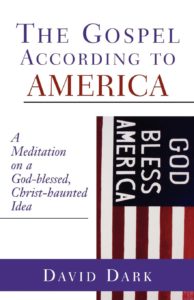 The Possibility of America: How the Gospel Can Mend our God-Blessed, God-Forsake Land is actually a considerable re-working and expanded edition of his 2005 book, The Gospel According to America: A Meditation on a Christ-haunted, God-blessed Idea. It is, for those who are familiar with that stimulating, much-discussed book, different enough that it demanded a new title; it is not just a “revised” edition. There’s so much new content in The Possibility of America that it earned a new title; not only is there considerable re-working and new content, the overall tone is a bit different. Understandably.
The Possibility of America: How the Gospel Can Mend our God-Blessed, God-Forsake Land is actually a considerable re-working and expanded edition of his 2005 book, The Gospel According to America: A Meditation on a Christ-haunted, God-blessed Idea. It is, for those who are familiar with that stimulating, much-discussed book, different enough that it demanded a new title; it is not just a “revised” edition. There’s so much new content in The Possibility of America that it earned a new title; not only is there considerable re-working and new content, the overall tone is a bit different. Understandably. That All Shall Be Saved: Heaven, Hell, & Universal Salvation David Bentley Hart (Yale University Press) $26.00 I may be one of the only half-way aware observers of contemporary theological conversations who doesn’t care much about this book, for whatever reason I can’t quite say, but for what it is worth, I can’t recall a bone fide book of serious academic theology that has been so hotly contested and greatly appreciated and widely reviewed. Hart is a good writer, except for when he’s showing off, drawing attention to his imposing vocabulary. HIs ideas are serious as you would expect from someone called “the most eminent living anglophone theologian” and his writing has been called “exacting” and “perspicuous.” The sensible, super smart Robert Louis Wilken says it is “original and lively.” Hart is Orthodox, used to write for First Things, and is discussed by the likes of John Milbank. Know anybody who wants to join the fun? We’re sitting on a small stack here.
That All Shall Be Saved: Heaven, Hell, & Universal Salvation David Bentley Hart (Yale University Press) $26.00 I may be one of the only half-way aware observers of contemporary theological conversations who doesn’t care much about this book, for whatever reason I can’t quite say, but for what it is worth, I can’t recall a bone fide book of serious academic theology that has been so hotly contested and greatly appreciated and widely reviewed. Hart is a good writer, except for when he’s showing off, drawing attention to his imposing vocabulary. HIs ideas are serious as you would expect from someone called “the most eminent living anglophone theologian” and his writing has been called “exacting” and “perspicuous.” The sensible, super smart Robert Louis Wilken says it is “original and lively.” Hart is Orthodox, used to write for First Things, and is discussed by the likes of John Milbank. Know anybody who wants to join the fun? We’re sitting on a small stack here.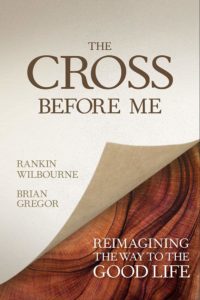 The Cross Before Me: Reimagining the Way to the Good Life Rankin Wilbourne & Brian Gregor (Cook) $22.99 Although this is tackling a meaty and nearly un-utterable mystery — the Cross of Christ — it is a topic that is endlessly open to new insights and always vital. For the Apostle Paul, it seems the like “the cross” is shorthand for the saving work of Christ, his suffering, his atonement, his resurrection power, the cosmic scope in his redeeming work, and the reality of the church as a sign of the Kingdom coming. Whew. Can all of that — that is, the cross — help our life flourish? Help us find meaning and even joy? Does understanding more about salvation help us find the way to what Jesus called “the abundant life”? Wilbourne and Gregor think so, although, like Jesus and Paul, they define “glory” in an upside down way. This is not a self help book, let alone a guide to “success” but it helps redefine the good life “as we learn to delight in losing ourselves to embrace the life-giving weakness of the cross.”
The Cross Before Me: Reimagining the Way to the Good Life Rankin Wilbourne & Brian Gregor (Cook) $22.99 Although this is tackling a meaty and nearly un-utterable mystery — the Cross of Christ — it is a topic that is endlessly open to new insights and always vital. For the Apostle Paul, it seems the like “the cross” is shorthand for the saving work of Christ, his suffering, his atonement, his resurrection power, the cosmic scope in his redeeming work, and the reality of the church as a sign of the Kingdom coming. Whew. Can all of that — that is, the cross — help our life flourish? Help us find meaning and even joy? Does understanding more about salvation help us find the way to what Jesus called “the abundant life”? Wilbourne and Gregor think so, although, like Jesus and Paul, they define “glory” in an upside down way. This is not a self help book, let alone a guide to “success” but it helps redefine the good life “as we learn to delight in losing ourselves to embrace the life-giving weakness of the cross.” Evangelicals: Who They Have Been, Are Now, and Could Be edited by Mark Noll, David Begginton & George Marsden (Eerdmans) $29.99 I would very much like to review this in greater detail once I spend more time with the many interesting chapters by so many remarkable scholars. Allow me to say that it is the opinion of many who read advanced copies, and my own hunch, that this will be known as the definitive study of this lively and diverse and important sub-culture on the conservative end of the theological spectrum. That many of us identify as some sort of evangelical (in distinction from harsh and often not too cultural savvy fundamentalism on one hand and an often bland and unbiblical sort of theological liberalism on the other) makes this that much more important. (For a really readable and lively collection by a group of concerned evangelicals about whether or not that phrase is worth holding on to, re-captured from the far right political folks who use it, see Still Evangelical?: Insiders Reconsider Political, Social, and Theological Meaning edited a year ago by Mark Labberton (published by IVP; $16.00.) I gave it a good review at BookNotes last winter.)
Evangelicals: Who They Have Been, Are Now, and Could Be edited by Mark Noll, David Begginton & George Marsden (Eerdmans) $29.99 I would very much like to review this in greater detail once I spend more time with the many interesting chapters by so many remarkable scholars. Allow me to say that it is the opinion of many who read advanced copies, and my own hunch, that this will be known as the definitive study of this lively and diverse and important sub-culture on the conservative end of the theological spectrum. That many of us identify as some sort of evangelical (in distinction from harsh and often not too cultural savvy fundamentalism on one hand and an often bland and unbiblical sort of theological liberalism on the other) makes this that much more important. (For a really readable and lively collection by a group of concerned evangelicals about whether or not that phrase is worth holding on to, re-captured from the far right political folks who use it, see Still Evangelical?: Insiders Reconsider Political, Social, and Theological Meaning edited a year ago by Mark Labberton (published by IVP; $16.00.) I gave it a good review at BookNotes last winter.)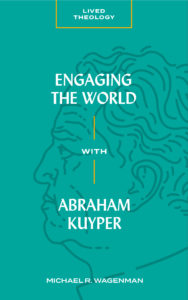 Engaging the World with Abraham Kuyper Michael Wagenman (Lexham) $12.99 Readers of our BookNotes newsletter may have noticed that we often recommend authors who are somehow connected to the heritage of the fascinating, unstoppable, pious leader of a cultural renewal in Holland at the turn of the 20th century, Abraham Kuyper. We’ve highlighted books that explain the broadest Kuyperian tradition (Contours of the Kuyperian Tradition by Craig Bartholomew is magisterial) and Abraham Kuyper: A Short and Personal Introduction by RichMouw that offers a great, but brief introduction to the robust thinker, leader, who eventually became Prime Minister. We’ve offered collections of articles about Kuyper and, of course James Bratt’s definitive biography published by Eerdmans, Abraham Kuyper: Modern Calvinist, Christian Democrat .
Engaging the World with Abraham Kuyper Michael Wagenman (Lexham) $12.99 Readers of our BookNotes newsletter may have noticed that we often recommend authors who are somehow connected to the heritage of the fascinating, unstoppable, pious leader of a cultural renewal in Holland at the turn of the 20th century, Abraham Kuyper. We’ve highlighted books that explain the broadest Kuyperian tradition (Contours of the Kuyperian Tradition by Craig Bartholomew is magisterial) and Abraham Kuyper: A Short and Personal Introduction by RichMouw that offers a great, but brief introduction to the robust thinker, leader, who eventually became Prime Minister. We’ve offered collections of articles about Kuyper and, of course James Bratt’s definitive biography published by Eerdmans, Abraham Kuyper: Modern Calvinist, Christian Democrat .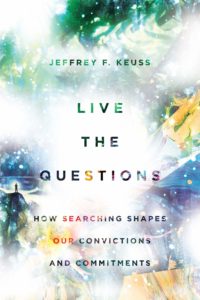 Live the Questions: How Searching Shapes Our Convictions and Commitments Jeffrey F. Keuss (IVP) $17.00 Admittedly, this isn’t precisely theology. It’s not academic or scholarly, But the author teaches undergrads in Christian ministry, theology, and culture at Seattle Pacific University, so I wanted to list it here. I read a book years ago that Keuss wrote about pop music (Your Neighbor’s Hymnal) and know he’s a good writer and a creative thinker. I am very, very impressed with this vital book about questions in Scripture.
Live the Questions: How Searching Shapes Our Convictions and Commitments Jeffrey F. Keuss (IVP) $17.00 Admittedly, this isn’t precisely theology. It’s not academic or scholarly, But the author teaches undergrads in Christian ministry, theology, and culture at Seattle Pacific University, so I wanted to list it here. I read a book years ago that Keuss wrote about pop music (Your Neighbor’s Hymnal) and know he’s a good writer and a creative thinker. I am very, very impressed with this vital book about questions in Scripture.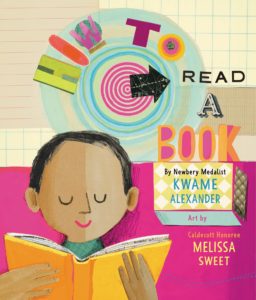 How to Read a Book Kwame Alexander, illustrated and art by Melissa Sweet (Harper) $17.99 OUR SALE PRICE = $14.39 Ms Sweet has been a Caldecott honoree for her amazingly creative art and her colorful paper cut patchwork style here (utilizing, among other things, actual printed pages) is a wild and sensational match for this poetic, almost zany (if at times tender) tribute to the art of opening and reading and power of a book. This is one energetic, fun, complex picture book that finally invites kids to dream and hope. Ages maybe 4 to 8 or 9… wow! If you want kids to value the beauty and joy of entering a world of imagination, this is a great, great gift. Let’s create young book lovers!!
How to Read a Book Kwame Alexander, illustrated and art by Melissa Sweet (Harper) $17.99 OUR SALE PRICE = $14.39 Ms Sweet has been a Caldecott honoree for her amazingly creative art and her colorful paper cut patchwork style here (utilizing, among other things, actual printed pages) is a wild and sensational match for this poetic, almost zany (if at times tender) tribute to the art of opening and reading and power of a book. This is one energetic, fun, complex picture book that finally invites kids to dream and hope. Ages maybe 4 to 8 or 9… wow! If you want kids to value the beauty and joy of entering a world of imagination, this is a great, great gift. Let’s create young book lovers!!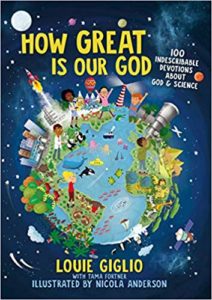 How Great is Our God: 100 Indescribable Devotions About God & Science Louie Giglio, illustrated by Nicola Anderson (Tommy Nelson) $17.99 OUR SALE PRICE = $14.39 One of our popular children’s books this past year or so was Giglio’s 2017 release Indescribable: 100 Devotions About God and Science. This new one is more of the same, perhaps even better and for slightly older kids. There are full color photos and nicely done art illustrations and great storytelling and plenty of whimsy as the author reminds us of fun facts about the creation that help us learn science while recalling that it comes from the hand of a good, good God. There are upbeat lessons that are so interesting about space and time, about earth and weather, about plants and climates. You will thrill to learn about our bodies, emotions, and imaginations even as we learn a bunch about animals (“from their habits to their habitats.” This does not (as far as we can tell) enter the debate about creationism or evolution, although it is clear that Giglio wants us to see scientific facts as pointers to the God of the Bible. This is great fun and inspiration for boys and girls in elementary school. Some have said it is best for ages 6 – 10, although maybe it’s a bit broader than that.
How Great is Our God: 100 Indescribable Devotions About God & Science Louie Giglio, illustrated by Nicola Anderson (Tommy Nelson) $17.99 OUR SALE PRICE = $14.39 One of our popular children’s books this past year or so was Giglio’s 2017 release Indescribable: 100 Devotions About God and Science. This new one is more of the same, perhaps even better and for slightly older kids. There are full color photos and nicely done art illustrations and great storytelling and plenty of whimsy as the author reminds us of fun facts about the creation that help us learn science while recalling that it comes from the hand of a good, good God. There are upbeat lessons that are so interesting about space and time, about earth and weather, about plants and climates. You will thrill to learn about our bodies, emotions, and imaginations even as we learn a bunch about animals (“from their habits to their habitats.” This does not (as far as we can tell) enter the debate about creationism or evolution, although it is clear that Giglio wants us to see scientific facts as pointers to the God of the Bible. This is great fun and inspiration for boys and girls in elementary school. Some have said it is best for ages 6 – 10, although maybe it’s a bit broader than that. Friends Around the World Atlas: A Compassionate Approach to Seeing the World Compassion International, illustrated by Emma Trithart (Tyndale Kids) $24.99 OUR SALE PRICE = $19.99 Children’s books showing in full color the way other kids live, guides to other countries and their geography and culture are a stable of globally-aware educators (and should be in the homes of your kids and grandkids and on the shelves of every Sunday school classroom.) Every now and then a new one comes out that is just stellar, up-to-date, colorful, interesting and we just have to rave and rave.
Friends Around the World Atlas: A Compassionate Approach to Seeing the World Compassion International, illustrated by Emma Trithart (Tyndale Kids) $24.99 OUR SALE PRICE = $19.99 Children’s books showing in full color the way other kids live, guides to other countries and their geography and culture are a stable of globally-aware educators (and should be in the homes of your kids and grandkids and on the shelves of every Sunday school classroom.) Every now and then a new one comes out that is just stellar, up-to-date, colorful, interesting and we just have to rave and rave.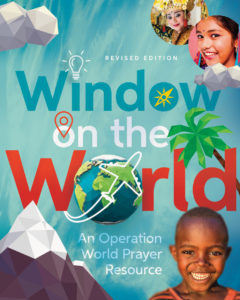 By the way, we’ve suggested other years and wanted to remind you again of the splendid, essential children’s prayer guide for praying about countries all over the globe called Window on the World: An Operation World Prayer Resource which was revised a year ago. It is published in the US by IVP and sells regularly for $25.00. (OUR SALE PRICE = $20.00.) Window on the World goes through the world alphabetically and gives details of important things to pray for in those various countries. It would make a great and more detailed pray guide and companion to the Atlas.
By the way, we’ve suggested other years and wanted to remind you again of the splendid, essential children’s prayer guide for praying about countries all over the globe called Window on the World: An Operation World Prayer Resource which was revised a year ago. It is published in the US by IVP and sells regularly for $25.00. (OUR SALE PRICE = $20.00.) Window on the World goes through the world alphabetically and gives details of important things to pray for in those various countries. It would make a great and more detailed pray guide and companion to the Atlas.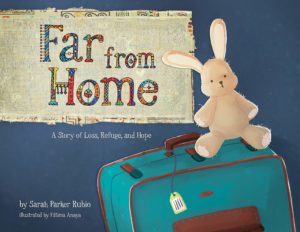 Far From Home: A Story of Loss, Refuge, and Hope Sarah Parker Rubio, illustrated by Fatima Anaya (Tyndale Kids) $14.99 OUR SALE PRICE = $11.99 Please, please, consider this. There is no doubt that immigration, migration, and refugee resettlement will be an important part of the life of your children as they grow up so you should prepare them now to have a compassionate, realistic understanding of the plight, fears, joys, and humanity of migrant families. It is hard to do a kids book that is colorful and interesting, honest and engaging without being dour or overly tragic. This book is brilliant in that regard and you’ll love the vivd art by Anaya. I’m not sure if stuffed animal rabbits are part of the real culture of the family illustrated here, but the child’s love for his toy is sweet and will surely resonate with your young one. As Mike Nawrocki (a co-creator of VeggieTales) says, Far From Home is “a fresh and inspired perspective on the refugee that will resonate with kids.” Beyond that, it will shape and form them in good, tender ways. By the way, there is this allusive few pages where an old lady tells the child about another person who had to leave his home — the illustrations make it clear it is about the incarnation of Jesus — and that brings another layer of moving thoughtfulness to discuss. It isn’t a Christmas book, but the last page does show a touching painting of the Holy Family fleeing to Egypt with the words of Matthew 2:13-14.) Highly recommended.
Far From Home: A Story of Loss, Refuge, and Hope Sarah Parker Rubio, illustrated by Fatima Anaya (Tyndale Kids) $14.99 OUR SALE PRICE = $11.99 Please, please, consider this. There is no doubt that immigration, migration, and refugee resettlement will be an important part of the life of your children as they grow up so you should prepare them now to have a compassionate, realistic understanding of the plight, fears, joys, and humanity of migrant families. It is hard to do a kids book that is colorful and interesting, honest and engaging without being dour or overly tragic. This book is brilliant in that regard and you’ll love the vivd art by Anaya. I’m not sure if stuffed animal rabbits are part of the real culture of the family illustrated here, but the child’s love for his toy is sweet and will surely resonate with your young one. As Mike Nawrocki (a co-creator of VeggieTales) says, Far From Home is “a fresh and inspired perspective on the refugee that will resonate with kids.” Beyond that, it will shape and form them in good, tender ways. By the way, there is this allusive few pages where an old lady tells the child about another person who had to leave his home — the illustrations make it clear it is about the incarnation of Jesus — and that brings another layer of moving thoughtfulness to discuss. It isn’t a Christmas book, but the last page does show a touching painting of the Holy Family fleeing to Egypt with the words of Matthew 2:13-14.) Highly recommended.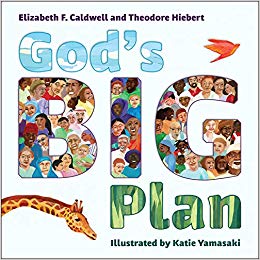 God’s Big Plan Elizabeth Caldwell & Theodore Hiebert (Flyaway Books) $17.00 OUR SALE PRICE = $13.60 We complimented this at BookNotes when this colorful gem came out last Spring, noting that Libby Caldwell is an esteemed Christian educator who has done research on how children learn, how they imaginatively engage the Bible, and, has, in fact, lead a team that created the fabulous children’s Bible Growing in God’s Love. We stock that big children’s Bible and Caldwell’s books about children and youth for adults.
God’s Big Plan Elizabeth Caldwell & Theodore Hiebert (Flyaway Books) $17.00 OUR SALE PRICE = $13.60 We complimented this at BookNotes when this colorful gem came out last Spring, noting that Libby Caldwell is an esteemed Christian educator who has done research on how children learn, how they imaginatively engage the Bible, and, has, in fact, lead a team that created the fabulous children’s Bible Growing in God’s Love. We stock that big children’s Bible and Caldwell’s books about children and youth for adults.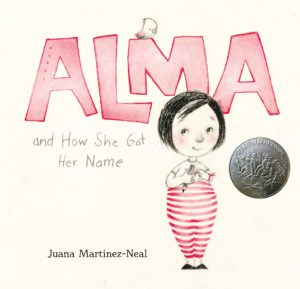 Alma and How She Got Her Name Juana Martinez-Neal (Candlewick) $15.99 OUR SALE PRICE = $12.79 This remarkable book won the esteemed Caldecott Award this past year (and our copies have the lovely silver seal.) At first one might wonder if this pencil (charcoal, maybe?) sketching — with pastel pink colors added — is deserving of a coveted Caldecott, but the more one explores it, looks and looks, reads and re-reads, one surely sees its creativity, its artfulness, its genius. What’s perhaps even better than the simple, sketchy, yet illuminating drawing art is the story itself– a young girl tracing back her ancestry and learning the varied relatives and their places who become part of her own name. You’ll learn to care for Alma and her family. Here is how the cover puts it:
Alma and How She Got Her Name Juana Martinez-Neal (Candlewick) $15.99 OUR SALE PRICE = $12.79 This remarkable book won the esteemed Caldecott Award this past year (and our copies have the lovely silver seal.) At first one might wonder if this pencil (charcoal, maybe?) sketching — with pastel pink colors added — is deserving of a coveted Caldecott, but the more one explores it, looks and looks, reads and re-reads, one surely sees its creativity, its artfulness, its genius. What’s perhaps even better than the simple, sketchy, yet illuminating drawing art is the story itself– a young girl tracing back her ancestry and learning the varied relatives and their places who become part of her own name. You’ll learn to care for Alma and her family. Here is how the cover puts it: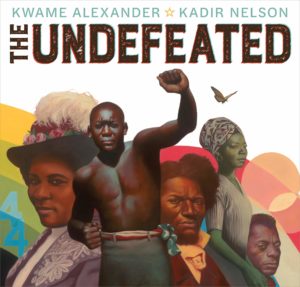 The Undefeated Kwame Alexander & Kadir Nelson (Versify/Houghton Mifflin Harcourt) $17.99 OUR SALE PRICE = $14.39 This is one of the most bright and vividly illustrated children’s books of the year, and it is strong, powerful, informative, enlightening. What genius to bring these two creators together, the poetic Alexander and the vivid visual artist Nelson! The Undefeated tells of jazz musicians and athletes and activists and writers and leaders and ordinary folks, those African American people who survived as they had to, who became “dreamers and doers.” Kwame Alexander has written nearly 30 books, some New York Times bestsellers and many award winners. Kadir Nelson, the artist, similarly is highly regarded (and has won two Caldecott Honors) and is a favorite of ours. (Maybe you know his cool book We Are the Ship which is an illustrated kid’s book on the Negro Baseball League, or the big, striking picture books on Coretta, on Martin, on Mandela, or the one on Harriet Tubman (simple called Moses) among many others. I can’t say enough about this powerful, righteous, book, and commend it to families across the land. Very nicely done, showing joys and hardships, tenacity and resilience.
The Undefeated Kwame Alexander & Kadir Nelson (Versify/Houghton Mifflin Harcourt) $17.99 OUR SALE PRICE = $14.39 This is one of the most bright and vividly illustrated children’s books of the year, and it is strong, powerful, informative, enlightening. What genius to bring these two creators together, the poetic Alexander and the vivid visual artist Nelson! The Undefeated tells of jazz musicians and athletes and activists and writers and leaders and ordinary folks, those African American people who survived as they had to, who became “dreamers and doers.” Kwame Alexander has written nearly 30 books, some New York Times bestsellers and many award winners. Kadir Nelson, the artist, similarly is highly regarded (and has won two Caldecott Honors) and is a favorite of ours. (Maybe you know his cool book We Are the Ship which is an illustrated kid’s book on the Negro Baseball League, or the big, striking picture books on Coretta, on Martin, on Mandela, or the one on Harriet Tubman (simple called Moses) among many others. I can’t say enough about this powerful, righteous, book, and commend it to families across the land. Very nicely done, showing joys and hardships, tenacity and resilience.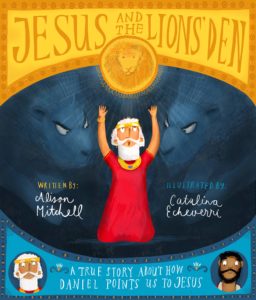 Jesus and the Lion’s Den: A True Story About How Daniel Points Us to Jesus Alison Mitchell, illustrated by Catalina Echeverri (The Good Book Company) $14.99 OUR SALE PRICE = $11.99 I am sure that those who follow BookNotes remember that we announce every new release in this fabulous series (“Tales That Tell the Truth”) that remind us that Christ is the center of the Biblical story and that creatively unpacks key Biblical stories in ways that delightfully point kids to a gospel-centered reading, a gospel-centered life. So, no, this isn’t a typo — as many Bible scholars remind us, the story isn’t about Daniel, after all, nor is it about King Darius. It is about the real King, the one whose birth we are celebrating this month. Happily, the book — like the others in the series such as the The One O’Clock Miracle or The Garden, the Curtain, and the Cross or God’s Very Good Idea
Jesus and the Lion’s Den: A True Story About How Daniel Points Us to Jesus Alison Mitchell, illustrated by Catalina Echeverri (The Good Book Company) $14.99 OUR SALE PRICE = $11.99 I am sure that those who follow BookNotes remember that we announce every new release in this fabulous series (“Tales That Tell the Truth”) that remind us that Christ is the center of the Biblical story and that creatively unpacks key Biblical stories in ways that delightfully point kids to a gospel-centered reading, a gospel-centered life. So, no, this isn’t a typo — as many Bible scholars remind us, the story isn’t about Daniel, after all, nor is it about King Darius. It is about the real King, the one whose birth we are celebrating this month. Happily, the book — like the others in the series such as the The One O’Clock Miracle or The Garden, the Curtain, and the Cross or God’s Very Good Idea 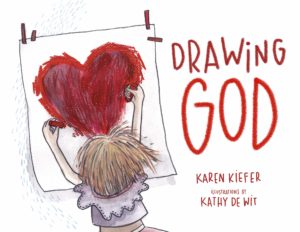 Drawing God Karen Kiefer, illustrated by Kathy DeWit (Paraclete) $17.99 OUR SALE PRICE = $14.39 This is, I think, a charming book, with fairly traditionalist little kids artwork and a profound story that is, on the face of it, pretty simple. A group of children go on a field trip to an art museum and young Emma is inspired to draw like Picasso, but wants to draw something really spectacular. She decides to draw God but immediately realizes that this is tricky. What does God look like? Here is how one reviewer summarized the story:
Drawing God Karen Kiefer, illustrated by Kathy DeWit (Paraclete) $17.99 OUR SALE PRICE = $14.39 This is, I think, a charming book, with fairly traditionalist little kids artwork and a profound story that is, on the face of it, pretty simple. A group of children go on a field trip to an art museum and young Emma is inspired to draw like Picasso, but wants to draw something really spectacular. She decides to draw God but immediately realizes that this is tricky. What does God look like? Here is how one reviewer summarized the story: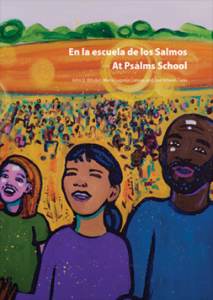 En la escuela de los Salmos/At Psalms School John D. Witvliet & Maria Eugenia Cornou, illustrated by Joel Schoon-Tanis (GIA Publications) $18.95 OUR SALE PRICE = $15.16 What an amazing new book, bi-lingual (obviously, in Spanish and English) offering a guide to using Psalms in worship. “Reading Psalms is kind of like going to school,” they write. “They teach us how to listen to and talk with God in worship, at church, and every day. What do we learn at Psalms School? Let’s read and find out!”
En la escuela de los Salmos/At Psalms School John D. Witvliet & Maria Eugenia Cornou, illustrated by Joel Schoon-Tanis (GIA Publications) $18.95 OUR SALE PRICE = $15.16 What an amazing new book, bi-lingual (obviously, in Spanish and English) offering a guide to using Psalms in worship. “Reading Psalms is kind of like going to school,” they write. “They teach us how to listen to and talk with God in worship, at church, and every day. What do we learn at Psalms School? Let’s read and find out!”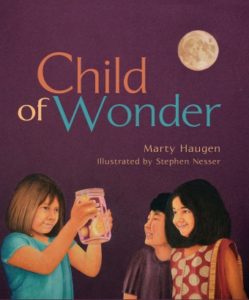 Child of Wonder Marty Haugen, illustrated by Stephen Nesser (GIA Publications) $16.95 OUR SALE PRICE = $13.56 While we’re recommending titles we carry from GIA, allow us to give a very large hat tip to this gloriously attractive, warm, evocative book of wonder. Marty Haugen is an old folksinger who was one of the pioneers of early contemporary liturgical songs (maybe known by those who remember the St. Louis Jesuits, David Haas, or the Monks of Weston Priory or more recently, say, Bryan Sirchio. Marty is a member of the UCC but writes music often for the Lutherans.) This lovely children’s book shows childhood rituals from all over the world so although it was composed for the baptism of his godson, the lyrics “celebrate the sacredness of human life and delight in the lives of children.” It’s tender and touching, beautiful and nicely multicultural. Included in the volume is a free mp3 download of the song itself, although one hardly needs to song to appreciate the lyrical cadence of the words of the book and the wonderful pictures.
Child of Wonder Marty Haugen, illustrated by Stephen Nesser (GIA Publications) $16.95 OUR SALE PRICE = $13.56 While we’re recommending titles we carry from GIA, allow us to give a very large hat tip to this gloriously attractive, warm, evocative book of wonder. Marty Haugen is an old folksinger who was one of the pioneers of early contemporary liturgical songs (maybe known by those who remember the St. Louis Jesuits, David Haas, or the Monks of Weston Priory or more recently, say, Bryan Sirchio. Marty is a member of the UCC but writes music often for the Lutherans.) This lovely children’s book shows childhood rituals from all over the world so although it was composed for the baptism of his godson, the lyrics “celebrate the sacredness of human life and delight in the lives of children.” It’s tender and touching, beautiful and nicely multicultural. Included in the volume is a free mp3 download of the song itself, although one hardly needs to song to appreciate the lyrical cadence of the words of the book and the wonderful pictures.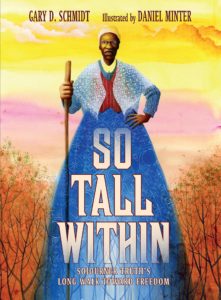 So Tall Within: Sojourner Truth’s Long Walk Toward Freedom Gary D. Schmidt, illustrated by Daniel Minter (Roaring Brook Press) $18.99 OUR SALE PRICE = $15.19 I wish I had time and energy and space to tell you the many details of why Beth and I think this is one of the very best children’s books of recent years — it should have been nominated for a Caldecott, at least! (And it has won a number of great accolades and awards!) You may know Gary Schmidt, a beloved English professor at Calvin University in Grand Rapids who has given us great middle-school age stories like the fabulous Lizzie Bright and the Buckminster Boy, The Wednesday Wars or Okay for Now among many others. Here Schmidt uses his great wordsmithing gifts to craft a moving tale about a woman named Isabella who took a new name: Sojourner Truth.
So Tall Within: Sojourner Truth’s Long Walk Toward Freedom Gary D. Schmidt, illustrated by Daniel Minter (Roaring Brook Press) $18.99 OUR SALE PRICE = $15.19 I wish I had time and energy and space to tell you the many details of why Beth and I think this is one of the very best children’s books of recent years — it should have been nominated for a Caldecott, at least! (And it has won a number of great accolades and awards!) You may know Gary Schmidt, a beloved English professor at Calvin University in Grand Rapids who has given us great middle-school age stories like the fabulous Lizzie Bright and the Buckminster Boy, The Wednesday Wars or Okay for Now among many others. Here Schmidt uses his great wordsmithing gifts to craft a moving tale about a woman named Isabella who took a new name: Sojourner Truth.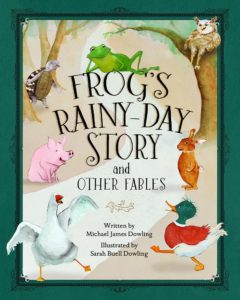 Frog’s Rainy-Day Story and Other Fables Michael James Dowling, illustrated by Sarah Buell Dowling (Carpenter’s Son Publishing) $19.95 OUR SALE PRICE = $15.96 Beth and I love the look of this recent book, and offer our congratulations to the author who worked on this a long time to get it just right. In a way, this is a playful effort to teach the values of a classic Christian worldview — using the device of these fables and parables, Biblical wisdom lived out by animals (have you heard of Aesops? Of course!) In one of the clever stories, Frog tries to write a story the letters decide to walk off the page, thinking they can make their own story without a Creator. Ha! In another, Gander gets an invitation from a King that upsets his plans. There are eight imaginative tales designed actually for the whole family — some of these will make you laugh and some might just make you think. Although the very professional water colors are perfect for kids, this almost could be a whimsical gift book for adults who want to use the stories for further conversation or cultural apologetics. As the alway brilliant Kenneth Boa says of it, Frog’s Rainy-Day Story “wonderfully contrasts the wisdom of this world with the wisdom of the Word.”
Frog’s Rainy-Day Story and Other Fables Michael James Dowling, illustrated by Sarah Buell Dowling (Carpenter’s Son Publishing) $19.95 OUR SALE PRICE = $15.96 Beth and I love the look of this recent book, and offer our congratulations to the author who worked on this a long time to get it just right. In a way, this is a playful effort to teach the values of a classic Christian worldview — using the device of these fables and parables, Biblical wisdom lived out by animals (have you heard of Aesops? Of course!) In one of the clever stories, Frog tries to write a story the letters decide to walk off the page, thinking they can make their own story without a Creator. Ha! In another, Gander gets an invitation from a King that upsets his plans. There are eight imaginative tales designed actually for the whole family — some of these will make you laugh and some might just make you think. Although the very professional water colors are perfect for kids, this almost could be a whimsical gift book for adults who want to use the stories for further conversation or cultural apologetics. As the alway brilliant Kenneth Boa says of it, Frog’s Rainy-Day Story “wonderfully contrasts the wisdom of this world with the wisdom of the Word.” What Boa is alluding to is more than the stories, actually, because at the end of each story there is a “wisdom of the world” quote (often by someone well known from popular culture or scholarship) contrasted and compared with Bible quotes. What a useful resource to invite reflection and conversation; heck, you might not even agree with the upshot of the story and what lesson is supposed to be learned. All the better for a learning resource, eh? There’s even a hefty glossary in the back. Like I said the author put a lot of effort into this labor of love.
What Boa is alluding to is more than the stories, actually, because at the end of each story there is a “wisdom of the world” quote (often by someone well known from popular culture or scholarship) contrasted and compared with Bible quotes. What a useful resource to invite reflection and conversation; heck, you might not even agree with the upshot of the story and what lesson is supposed to be learned. All the better for a learning resource, eh? There’s even a hefty glossary in the back. Like I said the author put a lot of effort into this labor of love.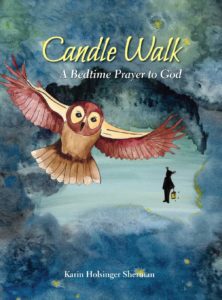 Candle Walk: A Bedtime Prayer to God Karin Holsinger Sherman (Church Publishing) $17.95 OUR SALE PRICE = $14.36 This is a bit quirky and we like to highlight some unique ones for those interested in harder to find books of children’s spirituality. As the solid Publishers Weekly writes, Candle Walk,
Candle Walk: A Bedtime Prayer to God Karin Holsinger Sherman (Church Publishing) $17.95 OUR SALE PRICE = $14.36 This is a bit quirky and we like to highlight some unique ones for those interested in harder to find books of children’s spirituality. As the solid Publishers Weekly writes, Candle Walk,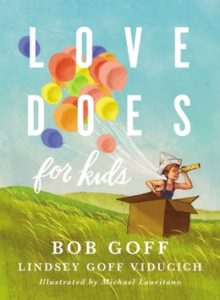 Love Does for Kids Bob Goff and Lindsey Goff Viduchich, illustrated by Michael Lauritano (Tommy Nelson) $16.99 OUR SALE PRICE = $13.59 Oh man, you know I’ve talked about this before and can’t say enough about it. The hand-sized hardback is comprised of great stories from our best-selling, exceptionally popular book by Bob Goff called Love Does: Discover a Secretly Incredible Life in an Ordinary World, re-told by his elementary school teacher daughter in a style a kid can enjoy. Yep, these are the best capers and Christ-like adventures and goofy escapades from Goff’s first book, written for children ages 6 – 10 or any elementary grade. What fun! What a great gift for a boy or girl.
Love Does for Kids Bob Goff and Lindsey Goff Viduchich, illustrated by Michael Lauritano (Tommy Nelson) $16.99 OUR SALE PRICE = $13.59 Oh man, you know I’ve talked about this before and can’t say enough about it. The hand-sized hardback is comprised of great stories from our best-selling, exceptionally popular book by Bob Goff called Love Does: Discover a Secretly Incredible Life in an Ordinary World, re-told by his elementary school teacher daughter in a style a kid can enjoy. Yep, these are the best capers and Christ-like adventures and goofy escapades from Goff’s first book, written for children ages 6 – 10 or any elementary grade. What fun! What a great gift for a boy or girl.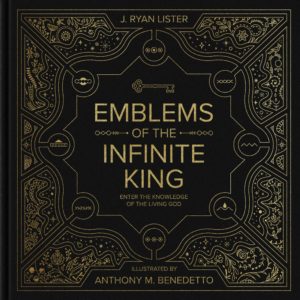 Emblems of the Infinite King: Enter the Knowledge of the Living God J. Ryan Lister, illustrated by Anthony M. Benedetto (Crossway) $24.99 OUR SALE PRICE = $19.99 Wow, this is an amazing looking book, created by the leaders of the hip-hop record label Humble Beast. (Perhaps you’ll recall us talking about Ryan Lister’s cool adult book on a theology of the arts, Images and Idols.) The artist involved here, Anthony Benedetto, is the cofounder of Nova Nimbus, a multidisciplinary creative studio so this isn’t a kiddie book. Emblems of the Infinite King is stunning — black and gold graphics, sometimes with reverse print (white print on black pages) with embossed gold edges and a black ribbon marker — which offers, in the words of Randy Alcorn,”a sound systematic theology conveyed to kids in a vibrant and accessible way.” It playfully uses the compelling notion of an ancient key and offers creative storytelling to bring theology to life. It has been called “strikingly imaginative” even as it pulls readers into the Throne Room of the great King to explain eight key core truths.
Emblems of the Infinite King: Enter the Knowledge of the Living God J. Ryan Lister, illustrated by Anthony M. Benedetto (Crossway) $24.99 OUR SALE PRICE = $19.99 Wow, this is an amazing looking book, created by the leaders of the hip-hop record label Humble Beast. (Perhaps you’ll recall us talking about Ryan Lister’s cool adult book on a theology of the arts, Images and Idols.) The artist involved here, Anthony Benedetto, is the cofounder of Nova Nimbus, a multidisciplinary creative studio so this isn’t a kiddie book. Emblems of the Infinite King is stunning — black and gold graphics, sometimes with reverse print (white print on black pages) with embossed gold edges and a black ribbon marker — which offers, in the words of Randy Alcorn,”a sound systematic theology conveyed to kids in a vibrant and accessible way.” It playfully uses the compelling notion of an ancient key and offers creative storytelling to bring theology to life. It has been called “strikingly imaginative” even as it pulls readers into the Throne Room of the great King to explain eight key core truths.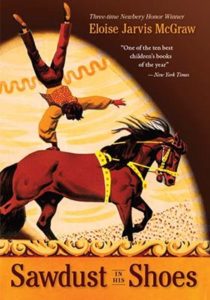 Sawdust in His Shoes Eloise Jarvis McGraw (Plough Publishing) $9.95 OUR SALE PRICE = $7.96 Space does not permit us to describe this in detail, but the fact that the thoughtful Plough Publishing (of Bruderhof fame) chose to find and re-publish this older classic (by a three-time Newberry Award winner) should be all you need to know; they are careful, literary, and esteem high-quality literature that has some sort of humane story and helpful values.
Sawdust in His Shoes Eloise Jarvis McGraw (Plough Publishing) $9.95 OUR SALE PRICE = $7.96 Space does not permit us to describe this in detail, but the fact that the thoughtful Plough Publishing (of Bruderhof fame) chose to find and re-publish this older classic (by a three-time Newberry Award winner) should be all you need to know; they are careful, literary, and esteem high-quality literature that has some sort of humane story and helpful values.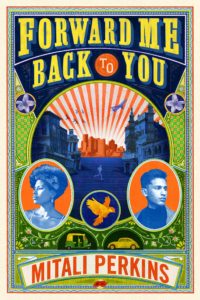 Forward Me Back To You Matali Perkins (Farrar Straus Giroux) $17.99 OUR SALE PRICE = $14.39 I’m not sure why, but it is a special delight to find a book that is getting some advanced buzz from the mainstream (secular?) YA establishment and then to discover that the author is a person of faith and that her story includes a plot line of great concern to many Christian readers. Obviously, many good books have no overt religious themes, nor should they, but when one comes up on a publishing house not affiliated with the religious publishing world, well, it is good. Forward Me Back to You is just such a book and we hope our readers might support it.
Forward Me Back To You Matali Perkins (Farrar Straus Giroux) $17.99 OUR SALE PRICE = $14.39 I’m not sure why, but it is a special delight to find a book that is getting some advanced buzz from the mainstream (secular?) YA establishment and then to discover that the author is a person of faith and that her story includes a plot line of great concern to many Christian readers. Obviously, many good books have no overt religious themes, nor should they, but when one comes up on a publishing house not affiliated with the religious publishing world, well, it is good. Forward Me Back to You is just such a book and we hope our readers might support it.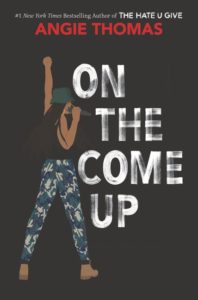 On the Come Up Angie Thomas (B+B) $18.99 OUR SALE PRICE = $15.19 I’m surprised we don’t have more customers asking about this — it came out this summer to some good acclaim, the eagerly anticipated (at least in some quarters) follow up to the YA phenomenon, The Hate U Give. That novel won some of the most coveted teen book awards there are — long-listed for the National Book Award, a Coretta Scot King Honor Book, a Boston-Globe Horn Book award winner, a Michael Printz honor book, and more.
On the Come Up Angie Thomas (B+B) $18.99 OUR SALE PRICE = $15.19 I’m surprised we don’t have more customers asking about this — it came out this summer to some good acclaim, the eagerly anticipated (at least in some quarters) follow up to the YA phenomenon, The Hate U Give. That novel won some of the most coveted teen book awards there are — long-listed for the National Book Award, a Coretta Scot King Honor Book, a Boston-Globe Horn Book award winner, a Michael Printz honor book, and more.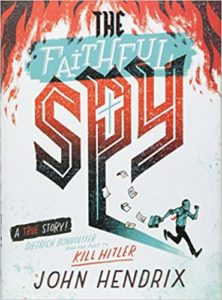 The Faithful Spy: A True Story – Graphic Novel John Hendrix (Amulet/Abrams) $16.99 OUR SALE PRICE – $13.59 We’ve recommended this before — oh yes! The Faithful Spy: A True Story is an expertly done graphic novel that anyone interested in the genre will appreciate. And it is about the life of Dietrich Bonhoeffer! John Hendrix is an accomplished and fascinating Christian author and artist and we can’t say enough about this colorful, serious story about the German pastor, Dietrich Bonhoeffer, and his efforts to stop Hitler’s campaign of terror. 175 pages, including hand-written text. Impressive.
The Faithful Spy: A True Story – Graphic Novel John Hendrix (Amulet/Abrams) $16.99 OUR SALE PRICE – $13.59 We’ve recommended this before — oh yes! The Faithful Spy: A True Story is an expertly done graphic novel that anyone interested in the genre will appreciate. And it is about the life of Dietrich Bonhoeffer! John Hendrix is an accomplished and fascinating Christian author and artist and we can’t say enough about this colorful, serious story about the German pastor, Dietrich Bonhoeffer, and his efforts to stop Hitler’s campaign of terror. 175 pages, including hand-written text. Impressive.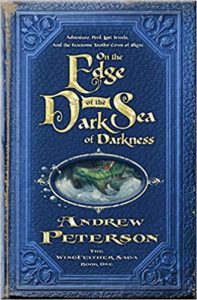 On the Edge of the Dark Sea of Darkness Andrew Peterson (Waterbrook) $15.99 OUR SALE PRICE = $12.70 This is the first installment of the popular Wingfeather Saga created by singer-songwriter, writer, recording artist, Rabbit Room founder, poet and all around creative thinker, Andrew Peterson. On the front cover of this swashbuckling fantasy it says this: Adventure. Peril. Lost Jewels. and the Fearsome Toothy Cows of Skree. Well, look out for that! This has been very popular this year (and, in a month or so, the first two Wingfeather Saga books will be re-issued in hardcover, which is a bit unusual, a sign of how they are catching on in a big way.) Great for Middle School readers, and up to at least younger teens.
On the Edge of the Dark Sea of Darkness Andrew Peterson (Waterbrook) $15.99 OUR SALE PRICE = $12.70 This is the first installment of the popular Wingfeather Saga created by singer-songwriter, writer, recording artist, Rabbit Room founder, poet and all around creative thinker, Andrew Peterson. On the front cover of this swashbuckling fantasy it says this: Adventure. Peril. Lost Jewels. and the Fearsome Toothy Cows of Skree. Well, look out for that! This has been very popular this year (and, in a month or so, the first two Wingfeather Saga books will be re-issued in hardcover, which is a bit unusual, a sign of how they are catching on in a big way.) Great for Middle School readers, and up to at least younger teens.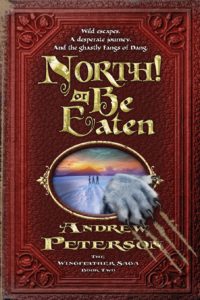 We have the second Peterson Wingfeather Saga volume, too, of couse —North! Or Be Eaten: Wild Escapes, a Desperate Journey, and the Ghastly Fangs of Dang Andrew Peterson (Waterbrook) $15.99 OUR SALE PRICE = $12.70 What a blast — this is sequel to Dark Sea of Darkness and equally adventurous, good stuff, thoughtful wise, even. We listed these curiously fascinating and well written fantasy stories here since they aren’t little children’s picture books. Teens and older fantasy lovers everywhere would like them but I think they are ideal for Middle School readers and younger teens. Flee, now, and watch those ghastly fangs of dang. Nobody wants to get eaten by fangs of dang.
We have the second Peterson Wingfeather Saga volume, too, of couse —North! Or Be Eaten: Wild Escapes, a Desperate Journey, and the Ghastly Fangs of Dang Andrew Peterson (Waterbrook) $15.99 OUR SALE PRICE = $12.70 What a blast — this is sequel to Dark Sea of Darkness and equally adventurous, good stuff, thoughtful wise, even. We listed these curiously fascinating and well written fantasy stories here since they aren’t little children’s picture books. Teens and older fantasy lovers everywhere would like them but I think they are ideal for Middle School readers and younger teens. Flee, now, and watch those ghastly fangs of dang. Nobody wants to get eaten by fangs of dang. This is a BookNotes post I’ve been eager to share as it is an announcement about a forthcoming book that is about to be released and, although it has an official 2020 publication date, will be here by mid-December. You can PRE-ORDER it now on sale as a Christmas gift and we promise to get it to you (or directly to your recipient) in plenty of time for gift giving on Christmas day.
This is a BookNotes post I’ve been eager to share as it is an announcement about a forthcoming book that is about to be released and, although it has an official 2020 publication date, will be here by mid-December. You can PRE-ORDER it now on sale as a Christmas gift and we promise to get it to you (or directly to your recipient) in plenty of time for gift giving on Christmas day.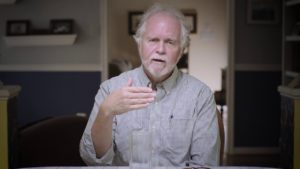 many more) and has talked about deep things with writers as diverse as rock poet Billy Corgan to the late urbane novelist Tom Wolfe to the great rural Wendell Berry. I say this not to name-drop or brag but to impress upon you that this quiet professor and skillful writer is a very, very interesting person who has been named as an influence upon important influencers. He talks about “conversations with consequence” and sometimes convenes gatherings with old
many more) and has talked about deep things with writers as diverse as rock poet Billy Corgan to the late urbane novelist Tom Wolfe to the great rural Wendell Berry. I say this not to name-drop or brag but to impress upon you that this quiet professor and skillful writer is a very, very interesting person who has been named as an influence upon important influencers. He talks about “conversations with consequence” and sometimes convenes gatherings with old theologians and modern makers, with writers and justice activists, with older scholars and young moms. He connects chefs and rock stars and poets and pastors. He cares about faithful Biblical thinking and beautiful, meaningful work in the world. He enjoys long walks outdoors. Like one of his mentors, Francis Schaeffer, he believes in honest answers to honest questions. With his sharp intellect and big picture of God’s work in the world and his patient capacity for long conversations over cups of hot tea, I have heard more than one informed person say he’s the closest thing to a combo of Edith and Francis Schaeffer we have these days.
theologians and modern makers, with writers and justice activists, with older scholars and young moms. He connects chefs and rock stars and poets and pastors. He cares about faithful Biblical thinking and beautiful, meaningful work in the world. He enjoys long walks outdoors. Like one of his mentors, Francis Schaeffer, he believes in honest answers to honest questions. With his sharp intellect and big picture of God’s work in the world and his patient capacity for long conversations over cups of hot tea, I have heard more than one informed person say he’s the closest thing to a combo of Edith and Francis Schaeffer we have these days.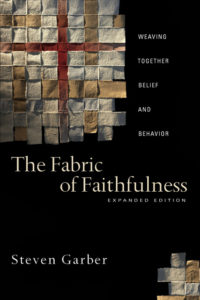 If you, like me, ever quote Steve’s previous two books, photocopy pages, cite certain stories or episodes, you will love The Seamless Life. It is eminently readable, quotable, and in that sense, very useful for those in ministry, who teach or preach or post. You can confidently give out this book as a gift even to those readers who you fear might not stick with his excursions into Michael Polanyi’s philosophy of science or Lesslie Newbigin’s view of truth or the political theory of Vaclav Havel (in Fabric) or the critique of the eroding influence of capitalism a la Wendell Berry or the notion of “proximate justice” (in
If you, like me, ever quote Steve’s previous two books, photocopy pages, cite certain stories or episodes, you will love The Seamless Life. It is eminently readable, quotable, and in that sense, very useful for those in ministry, who teach or preach or post. You can confidently give out this book as a gift even to those readers who you fear might not stick with his excursions into Michael Polanyi’s philosophy of science or Lesslie Newbigin’s view of truth or the political theory of Vaclav Havel (in Fabric) or the critique of the eroding influence of capitalism a la Wendell Berry or the notion of “proximate justice” (in 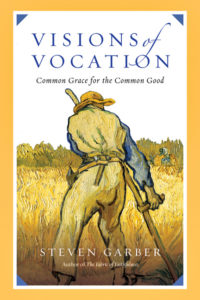 Visions.) Not that either of those two previous books are too academic (they are not written for the scholarly market, even though Fabric was most interested in how lasting faith is developed in the young adult years within the context of higher education) and not that Seamless is overly light or cheap. Garber can’t write a cheap phrase and is always profound, even in his gentle storytelling and good humor. But The Seamless Life: A Tapestry of Love and Learning, Worship and Work is an easier read than his previous two and so it’s great to give out, sure to please anyone interested in faith and public life, about honestly weaving together worship and work, wishing for a life that ties together, coherently, seamlessly, a long obedience in the same direction, hard as that may be for us frail humans.
Visions.) Not that either of those two previous books are too academic (they are not written for the scholarly market, even though Fabric was most interested in how lasting faith is developed in the young adult years within the context of higher education) and not that Seamless is overly light or cheap. Garber can’t write a cheap phrase and is always profound, even in his gentle storytelling and good humor. But The Seamless Life: A Tapestry of Love and Learning, Worship and Work is an easier read than his previous two and so it’s great to give out, sure to please anyone interested in faith and public life, about honestly weaving together worship and work, wishing for a life that ties together, coherently, seamlessly, a long obedience in the same direction, hard as that may be for us frail humans. (By the way, Visions of Vocation has been translated into Mandarin Chinese, into the language spoken in Indonesia, and, just recently, into Slovak. Steve has travelled to these places to teach and mentor and celebrate with those who have found enduring wisdom and sturdy, thoughtful value in his work. Did I mention that the photos and pieces in A Seamless Life are mostly reports from the road? Did I mention what a very interesting road he has been on? I sometimes think of him as a global Frodo…and he invites us to follow along.)
(By the way, Visions of Vocation has been translated into Mandarin Chinese, into the language spoken in Indonesia, and, just recently, into Slovak. Steve has travelled to these places to teach and mentor and celebrate with those who have found enduring wisdom and sturdy, thoughtful value in his work. Did I mention that the photos and pieces in A Seamless Life are mostly reports from the road? Did I mention what a very interesting road he has been on? I sometimes think of him as a global Frodo…and he invites us to follow along.) Even more than his previous books, The Seamless Life: A Tapestry of Love and Learning, Worship and Work tells more of Steve’s own story. He tells of his parents and grandparents, the geographies and places he has loved, writes sweetly about his beloved wife of many decades and his children (now grown) and ponders his various careers and callings, letting us in a bit more, telling great anecdotes about others, but also about himself. If you like his books or classes or legendary Facebook posts, you simply must read this. If it is a great gateway introduction for those who haven’t read him yet, it is also a perfect follow up and follow through to those who have been introduced to his good work in the previous books. Indeed, you will smile knowing a bit more about some of the folks that are mentioned in those previous volumes (like Hans of Elevation Burger and Bruno and Jay from the Mars Corporation Jubilee project.) Man, this is good stuff, and this new book delights to invite you into deeper membership of this broader circle of Garber’s friends and comrades.
Even more than his previous books, The Seamless Life: A Tapestry of Love and Learning, Worship and Work tells more of Steve’s own story. He tells of his parents and grandparents, the geographies and places he has loved, writes sweetly about his beloved wife of many decades and his children (now grown) and ponders his various careers and callings, letting us in a bit more, telling great anecdotes about others, but also about himself. If you like his books or classes or legendary Facebook posts, you simply must read this. If it is a great gateway introduction for those who haven’t read him yet, it is also a perfect follow up and follow through to those who have been introduced to his good work in the previous books. Indeed, you will smile knowing a bit more about some of the folks that are mentioned in those previous volumes (like Hans of Elevation Burger and Bruno and Jay from the Mars Corporation Jubilee project.) Man, this is good stuff, and this new book delights to invite you into deeper membership of this broader circle of Garber’s friends and comrades.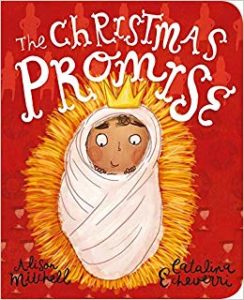 The Christmas Promise (board book) Alison Mitchell & Catalinea Echeverri (The Good Book Company) $7.99 We love the “Tales That Tell the Truth” series from this gospel-centered, British publisher, and we happily stock them all. (The most recent in this series by the same writer/artist team, by the way, in the standard 8 x 10 hardback size, is called Jesus and the Lions’ Den: A True Story about How Daniel Points Us to Jesus and is quite nice.) The Christmas Promise has been a staple for us as it highlights this profound theological insight that the Incarnation and Christ’s birth is a part of a story of promise, and God is faithful to the plot of the redemptive story. The standard one sells for $14.99 but, this year, they did the book in an inexpensive, smaller board book, and it’s very cool. Yay.
The Christmas Promise (board book) Alison Mitchell & Catalinea Echeverri (The Good Book Company) $7.99 We love the “Tales That Tell the Truth” series from this gospel-centered, British publisher, and we happily stock them all. (The most recent in this series by the same writer/artist team, by the way, in the standard 8 x 10 hardback size, is called Jesus and the Lions’ Den: A True Story about How Daniel Points Us to Jesus and is quite nice.) The Christmas Promise has been a staple for us as it highlights this profound theological insight that the Incarnation and Christ’s birth is a part of a story of promise, and God is faithful to the plot of the redemptive story. The standard one sells for $14.99 but, this year, they did the book in an inexpensive, smaller board book, and it’s very cool. Yay.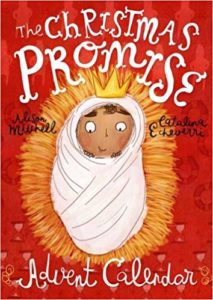 The Christmas Promise Advent Calendar and Family Devotional (The Good Book Company) $9.99 Oh, my, this is the same colorful, upbeat, but substantive approach as the book and/or board book, but in a contemporary Advent calendar and activity book. There is also a 32-page family devotional guide based on the book. This is great.
The Christmas Promise Advent Calendar and Family Devotional (The Good Book Company) $9.99 Oh, my, this is the same colorful, upbeat, but substantive approach as the book and/or board book, but in a contemporary Advent calendar and activity book. There is also a 32-page family devotional guide based on the book. This is great.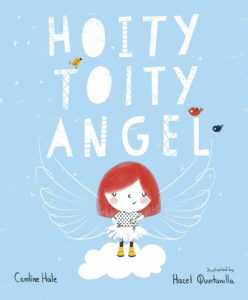 The Hoity Toity Angel Caroline Hoile, illustrated by Hazel Quintanilla (SPCK) $9.00 Ya just gotta love a book that has “hoity toity’ in the title. And it so works. You see, when the Angel Gabriel appears to Mary, the Hoity Toity Angel is not at all impressed — Mary isn’t even a Princess! As it says on the back cover, “And, later, how can her baby possibly be a king when he’s just been born in a scruffy old stable?”
The Hoity Toity Angel Caroline Hoile, illustrated by Hazel Quintanilla (SPCK) $9.00 Ya just gotta love a book that has “hoity toity’ in the title. And it so works. You see, when the Angel Gabriel appears to Mary, the Hoity Toity Angel is not at all impressed — Mary isn’t even a Princess! As it says on the back cover, “And, later, how can her baby possibly be a king when he’s just been born in a scruffy old stable?”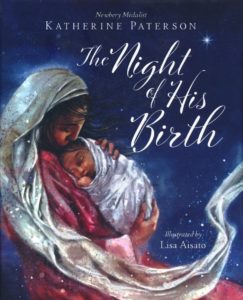 The Night of His Birth Katherine Paterson, illustrated by Lisa Aisato (Flyaway Books) $18.00 This may be one of the very best new seasonal books with lush and truly beautiful art and an eloquent, well-told rendering of the heart of the classic Christmas story. You may know of Katherine Paterson, a Newberry Award winner and one of the most esteemed (and beloved) YA authors of the last 40 years or so. She was born in China to Presbyterian missionary family and has served the church for decades (even having done some YA curriculum.) This is a story in her own style that appeared in a Presbyterian woman’s magazine maybe in the 80s, and it has been one of their most popular pieces used, read, reprinted, sought out. The poetic text is mostly about Mary pondering the newborn baby, looking so carefully and expressing such joy, knowing he is somehow God’s gift to the world. What a treat to take this wonderfully tender storytelling of the nativity night and pair it with exquisite, striking, and somewhat artfully modern wash. Aisato is an artist and children’s book author herself whose distinctive work has been published around the world. Highly recommended.
The Night of His Birth Katherine Paterson, illustrated by Lisa Aisato (Flyaway Books) $18.00 This may be one of the very best new seasonal books with lush and truly beautiful art and an eloquent, well-told rendering of the heart of the classic Christmas story. You may know of Katherine Paterson, a Newberry Award winner and one of the most esteemed (and beloved) YA authors of the last 40 years or so. She was born in China to Presbyterian missionary family and has served the church for decades (even having done some YA curriculum.) This is a story in her own style that appeared in a Presbyterian woman’s magazine maybe in the 80s, and it has been one of their most popular pieces used, read, reprinted, sought out. The poetic text is mostly about Mary pondering the newborn baby, looking so carefully and expressing such joy, knowing he is somehow God’s gift to the world. What a treat to take this wonderfully tender storytelling of the nativity night and pair it with exquisite, striking, and somewhat artfully modern wash. Aisato is an artist and children’s book author herself whose distinctive work has been published around the world. Highly recommended.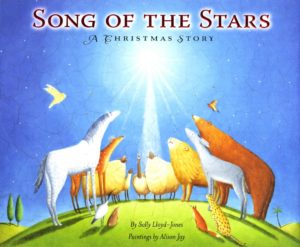 Song of the Stars: A Christmas Story Sally Lloyd-Jones, illustrated by Alison Joy (Zonderkidz) $16.99 or Board Book, $7.99 Forgive me for highlighting this once again — we do every year because it is so very good. It is subdued, yet passionate, simple — with an Americana sort of art, it seems rural, almost — and yet teaching the big, big truth that the whole creation gets in on this whole redemptive plan of God; even the animals realize that this is something they should care about. It has a touch of whimsy but it isn’t goofy. It has class, but yet isn’t stuffy. The art is expansive, the text beautiful, the simple allusive theology utterly pregnant with vast implications. We love this book, both the nice hardback and the smaller board book, although we favor the larger, bolder impact of the regularly sized 9 x 11″ one. If you order, tell us which you prefer.
Song of the Stars: A Christmas Story Sally Lloyd-Jones, illustrated by Alison Joy (Zonderkidz) $16.99 or Board Book, $7.99 Forgive me for highlighting this once again — we do every year because it is so very good. It is subdued, yet passionate, simple — with an Americana sort of art, it seems rural, almost — and yet teaching the big, big truth that the whole creation gets in on this whole redemptive plan of God; even the animals realize that this is something they should care about. It has a touch of whimsy but it isn’t goofy. It has class, but yet isn’t stuffy. The art is expansive, the text beautiful, the simple allusive theology utterly pregnant with vast implications. We love this book, both the nice hardback and the smaller board book, although we favor the larger, bolder impact of the regularly sized 9 x 11″ one. If you order, tell us which you prefer.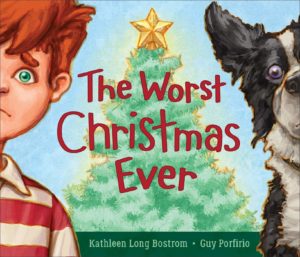 The Worst Christmas Ever Kathleen Long Bostrom, illustrated by Guy Porfirio (Flyaway Books) $17.00 Well, with this vivid, colorful cover of the wide eyed boy and his wide eyed dog, you know something is up. On the back cover there is spare art and one sentence reading, “Needed: One Christmas miracle.” You know your kid is going to want to know what’s up.
The Worst Christmas Ever Kathleen Long Bostrom, illustrated by Guy Porfirio (Flyaway Books) $17.00 Well, with this vivid, colorful cover of the wide eyed boy and his wide eyed dog, you know something is up. On the back cover there is spare art and one sentence reading, “Needed: One Christmas miracle.” You know your kid is going to want to know what’s up.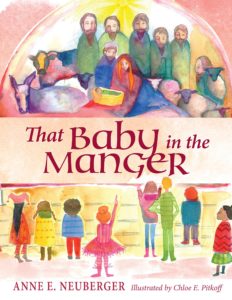 That Baby in the Manger Anne Neuberger, illustrated by Choloe Pitkoff (Paraclete Press) $15.99 This is one we’ve raved about before, a beautifully told and beautifully illustrated story of a Catholic school where the first-graders are gathering around the manger scene. The ethnically diverse school children realize that the baby jesus doesn’t look like them and an ingenious priest invites them to… well, you’ll have to read this lovely solution that reminds us all that Jesus came for everyone. This book is a delight and can open doors for all kinds of conversations about faith and race and ethnicity and God’s incarnation.
That Baby in the Manger Anne Neuberger, illustrated by Choloe Pitkoff (Paraclete Press) $15.99 This is one we’ve raved about before, a beautifully told and beautifully illustrated story of a Catholic school where the first-graders are gathering around the manger scene. The ethnically diverse school children realize that the baby jesus doesn’t look like them and an ingenious priest invites them to… well, you’ll have to read this lovely solution that reminds us all that Jesus came for everyone. This book is a delight and can open doors for all kinds of conversations about faith and race and ethnicity and God’s incarnation.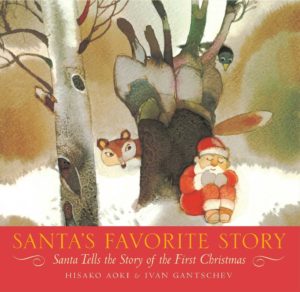 Santa’s Favorite Story: Santa Tells the Story of the First Christmas Hisako Aiki & Ivan Gantschev (Simon & Schuster) $9.99 I think when we discovered this nice hardback decades ago, it was for many of our young parent peers a godsend — so artful, international, clever, done in soft watercolors with some pleasant, unique touches. Mostly, though, it was an answer to the perennial quandary: what to do about Santa? Here’s the simple answer this book so artfully offers: in the story, Santa himself has to gather the animals around to insist to them that he is not what Christmas is all about. So we have it, from Santa’s own authority, as he tells the reindeer, that the story of Jesus is what it is all about! This is a nuanced and delightful approach that is less tacky and blunt than that one showing a ceramic Santa Claus bowing piously before the manger, but I suppose the sentiment is the same. This beautiful book really works, without feeling preachy or overwrought.
Santa’s Favorite Story: Santa Tells the Story of the First Christmas Hisako Aiki & Ivan Gantschev (Simon & Schuster) $9.99 I think when we discovered this nice hardback decades ago, it was for many of our young parent peers a godsend — so artful, international, clever, done in soft watercolors with some pleasant, unique touches. Mostly, though, it was an answer to the perennial quandary: what to do about Santa? Here’s the simple answer this book so artfully offers: in the story, Santa himself has to gather the animals around to insist to them that he is not what Christmas is all about. So we have it, from Santa’s own authority, as he tells the reindeer, that the story of Jesus is what it is all about! This is a nuanced and delightful approach that is less tacky and blunt than that one showing a ceramic Santa Claus bowing piously before the manger, but I suppose the sentiment is the same. This beautiful book really works, without feeling preachy or overwrought.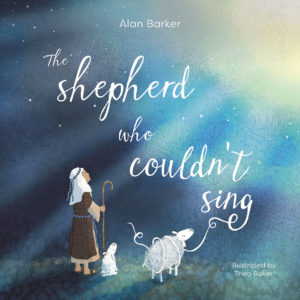 The Shepherd Who Couldn’t Sing Alan Barker, illustrated by Thea Baker (SPCK) $9.00 We introduced this last year and our customers loved it, so we thought we’d announce it again. Here is what it says on the back:
The Shepherd Who Couldn’t Sing Alan Barker, illustrated by Thea Baker (SPCK) $9.00 We introduced this last year and our customers loved it, so we thought we’d announce it again. Here is what it says on the back: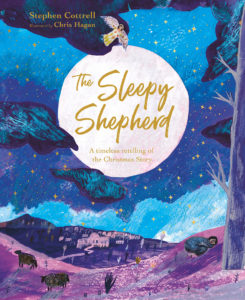 The Sleepy Shepherd Stephen Cottrell, illustrated by Chris Hagan (SPCK) $10.00 I’m not sure what I said about this last year to make it such a popular selection, but it was a big seller for us as folks enjoyed the great art, the great story, pitched on the cover as “a timeless retelling of the Christmas story.” I suppose sleeping through the excitement is something many can relate to. But this story goes deeper (and has more text making it suitable for older readers.)
The Sleepy Shepherd Stephen Cottrell, illustrated by Chris Hagan (SPCK) $10.00 I’m not sure what I said about this last year to make it such a popular selection, but it was a big seller for us as folks enjoyed the great art, the great story, pitched on the cover as “a timeless retelling of the Christmas story.” I suppose sleeping through the excitement is something many can relate to. But this story goes deeper (and has more text making it suitable for older readers.)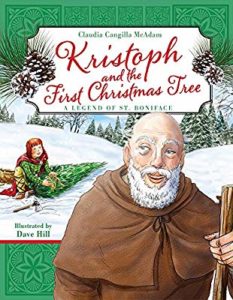 Kristoph and the First Christmas Tree Claudia Cangilla McAdam, illustrated by Dave Hill (Paraclete Press) $16.99 This is a large sized picture book and tells in marvelous prose and vivid art the story of a young orphan who is accompanying the missionary priest Boniface through the German countryside. The year is 722 A.D. If this doesn’t interest you, well, I’d invite you to give it a try anyway. Or, maybe you are the kind who thinks, “You had me at 722.”) I think kids need these kinds of old, old stories. This one is pretty powerful.
Kristoph and the First Christmas Tree Claudia Cangilla McAdam, illustrated by Dave Hill (Paraclete Press) $16.99 This is a large sized picture book and tells in marvelous prose and vivid art the story of a young orphan who is accompanying the missionary priest Boniface through the German countryside. The year is 722 A.D. If this doesn’t interest you, well, I’d invite you to give it a try anyway. Or, maybe you are the kind who thinks, “You had me at 722.”) I think kids need these kinds of old, old stories. This one is pretty powerful.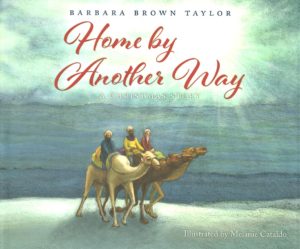 Home By Another Way Barbara Brown Taylor, illustrations by Melanie Cataldo (Flyaway Books) $18.00 Here is what I wrote last year when we laid eyes on the eagerly awaited book by BBT.
Home By Another Way Barbara Brown Taylor, illustrations by Melanie Cataldo (Flyaway Books) $18.00 Here is what I wrote last year when we laid eyes on the eagerly awaited book by BBT.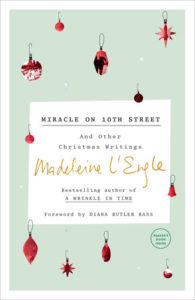 Miracle on 10th Street: And Other Christmas Writings
Miracle on 10th Street: And Other Christmas Writings 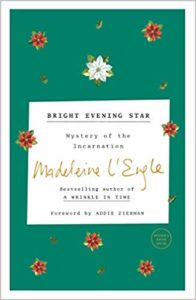 wonderfully-written introductory essay in this new version by Diana Butler Bass, who honors her well in her lengthy foreword.
wonderfully-written introductory essay in this new version by Diana Butler Bass, who honors her well in her lengthy foreword.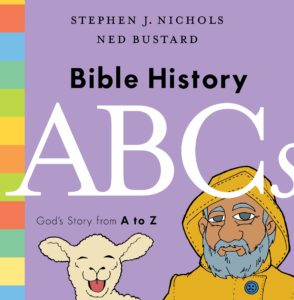 Bible History ABCs: God’s Story from A to Z Stephen Nichols, illustrated by Ned Bustard (Crossway) $16.99 Quite recently, Crossway released Bible History ABCs and we are so happy about it. Mr. Nichols, the head of Ligonier Ministries, did the writing and our pal, Ned, did the artwork, although I suspect they collaborated plenty. It’s a colorful and smart ABC book, about 8 x 8 in size, just like their previous Reformation ABCs: The People, Places, and Things of the Reformation–From A to Z. (The first collaboration between these zany, Reformed Presbyterian guys was the must-have, but oversized, Church History ABCs: Augustine and 25 Other Heroes of the Faith.) There is so much happening in these bright books that even adults will be delighted and informed by their third or fourth reading as more hidden stuff becomes evident.
Bible History ABCs: God’s Story from A to Z Stephen Nichols, illustrated by Ned Bustard (Crossway) $16.99 Quite recently, Crossway released Bible History ABCs and we are so happy about it. Mr. Nichols, the head of Ligonier Ministries, did the writing and our pal, Ned, did the artwork, although I suspect they collaborated plenty. It’s a colorful and smart ABC book, about 8 x 8 in size, just like their previous Reformation ABCs: The People, Places, and Things of the Reformation–From A to Z. (The first collaboration between these zany, Reformed Presbyterian guys was the must-have, but oversized, Church History ABCs: Augustine and 25 Other Heroes of the Faith.) There is so much happening in these bright books that even adults will be delighted and informed by their third or fourth reading as more hidden stuff becomes evident.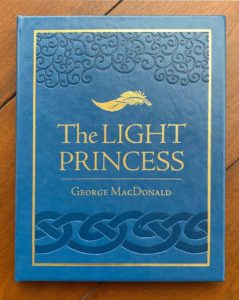 The Light Princess George MacDonald, illustrations by Ned Bustard (Rabbit Room Press) $18.00 Those who have followed Hearts & Minds for decades know that we used to feature lots of the great novels — children’s and Victorian adult novels — of the brilliant writer, orator, preacher, and artiste, George MacDonald. (Many know of how C.S. Lewis even edited an anthology of his favorite MacDonald quotes.) Sadly, many editions of many MacDonald books have been dropped by legitimate publishers and few stellar editions of his volumes are readily available. We are so, so glad that the classy and fun Rabbit Room crew of Rabbit Room Press released a new edition of the fairy story The Light Princess.
The Light Princess George MacDonald, illustrations by Ned Bustard (Rabbit Room Press) $18.00 Those who have followed Hearts & Minds for decades know that we used to feature lots of the great novels — children’s and Victorian adult novels — of the brilliant writer, orator, preacher, and artiste, George MacDonald. (Many know of how C.S. Lewis even edited an anthology of his favorite MacDonald quotes.) Sadly, many editions of many MacDonald books have been dropped by legitimate publishers and few stellar editions of his volumes are readily available. We are so, so glad that the classy and fun Rabbit Room crew of Rabbit Room Press released a new edition of the fairy story The Light Princess. 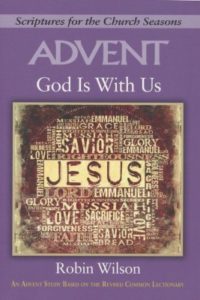 Advent Is God With Us: An Advent Study Based on the Revised Common Lectionary Robin Wilson (Abingdon) $9.99 OUR SALE PRICE = $7.99 We highlight this resource each year, an annually done, nice Bible study book for Adult classes, small groups, preachers needing study insights to the Lectionary texts for the season or anyone who wants to do a bit more than a quick Advent devotional reading. This booklet offers five thorough studies, this year mostly on Isaiah and Matthew (the readings for Year A.)
Advent Is God With Us: An Advent Study Based on the Revised Common Lectionary Robin Wilson (Abingdon) $9.99 OUR SALE PRICE = $7.99 We highlight this resource each year, an annually done, nice Bible study book for Adult classes, small groups, preachers needing study insights to the Lectionary texts for the season or anyone who wants to do a bit more than a quick Advent devotional reading. This booklet offers five thorough studies, this year mostly on Isaiah and Matthew (the readings for Year A.)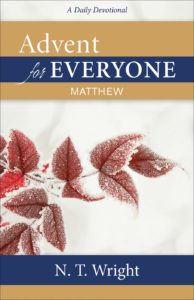 Advent for Everyone – Matthew: A Daily Devotional N.T. Wright (WJK) $16.00 OUR SALE PRICE = $12.80 I suppose you know the compact New Testament for Everyone commentaries by Wright. This devotional is very much like those, but not reprinted from them. That is, this is fresh, new material. Always clear, insightful, useful, often with a helpful illustration or story to make the point. An added bonus is Wright’s own “Kingdom” translation of the Greek text. And so, these brief reflections are ideal for anyone who wants to work through the Year A gospel passages or who wants a Biblically-focused study. Good for personal use or for a small group or Adult class.
Advent for Everyone – Matthew: A Daily Devotional N.T. Wright (WJK) $16.00 OUR SALE PRICE = $12.80 I suppose you know the compact New Testament for Everyone commentaries by Wright. This devotional is very much like those, but not reprinted from them. That is, this is fresh, new material. Always clear, insightful, useful, often with a helpful illustration or story to make the point. An added bonus is Wright’s own “Kingdom” translation of the Greek text. And so, these brief reflections are ideal for anyone who wants to work through the Year A gospel passages or who wants a Biblically-focused study. Good for personal use or for a small group or Adult class.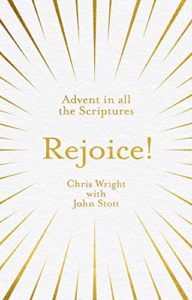 Rejoice! Advent in All of Scriptures Chris Wright & John Stott (IVP-UK) $12.00 OUR SALE PRICE = $9.60 How great to import this from England via IVP here in the states – what a gem of a little book. I hope you know John Stott, one of the leading evangelical voices in the entire world in the last decades years of the 20th century and into the early 2000s. He was kind and rigorous, orthodox and justice-minded, thoughtful and wise, missional before the phrase was used. Some of my favorite writers to this day see Stott as a mentor and his books as among their most sturdy influences.
Rejoice! Advent in All of Scriptures Chris Wright & John Stott (IVP-UK) $12.00 OUR SALE PRICE = $9.60 How great to import this from England via IVP here in the states – what a gem of a little book. I hope you know John Stott, one of the leading evangelical voices in the entire world in the last decades years of the 20th century and into the early 2000s. He was kind and rigorous, orthodox and justice-minded, thoughtful and wise, missional before the phrase was used. Some of my favorite writers to this day see Stott as a mentor and his books as among their most sturdy influences.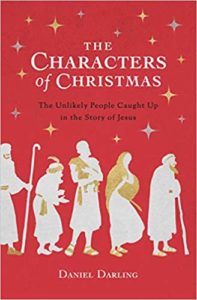 The Characters of Christmas: The Unlikely People Caught up in the Story of Jesus Daniel Darling (Moody Press) $13.99 OUR SALE PRICE = $11.19 Listen to me here: I bet you, like Beth and I, have sat through bunches of sermons on various characters of the Bible story. It is a fairly easy sermon series to do, it seems, a common trope. That’s not to say the sermons we’ve heard or the books we’ve read about these personalities and their episodes in the Christmas accounts are simplistic, but they can be a bit sentimental or miss the mark of the huge, redemptive story breaking in on human history in the birth of the Christ child. As we often note, too often our Bible study and churchy sermonizing is not gospel centered but mere moralism. We ought to be brave or just or kind or have a lot of faith. We should do this or that. Too often we miss what God is doing in the story, how we are invited in to God’s own gracious working out of God’s own plan.
The Characters of Christmas: The Unlikely People Caught up in the Story of Jesus Daniel Darling (Moody Press) $13.99 OUR SALE PRICE = $11.19 Listen to me here: I bet you, like Beth and I, have sat through bunches of sermons on various characters of the Bible story. It is a fairly easy sermon series to do, it seems, a common trope. That’s not to say the sermons we’ve heard or the books we’ve read about these personalities and their episodes in the Christmas accounts are simplistic, but they can be a bit sentimental or miss the mark of the huge, redemptive story breaking in on human history in the birth of the Christ child. As we often note, too often our Bible study and churchy sermonizing is not gospel centered but mere moralism. We ought to be brave or just or kind or have a lot of faith. We should do this or that. Too often we miss what God is doing in the story, how we are invited in to God’s own gracious working out of God’s own plan.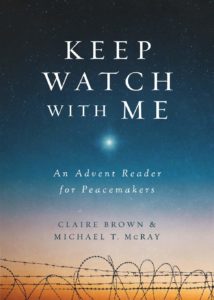 Keep Watch With Me: An Advent Reader for Peacemakers compiled by Claire Brown & Michael McRay (Abingdon Press) $16.99 OUR SALE PRICE = $13.59 What a book! Even the beautiful cover, if pondered, is a bit jarring. What a broken world we live in, and yet there’s that star, that glimmer of hope over the barbed wire. Given that the angels announcing the weighty, holy, glory of God come to Earth on that first Christmas sang about “peace on Earth” one would think that peacemaking might be more connected to Christmas than merely a ubiquitous sentiment on greeting cards or yard decorations. Good will often abounds in this time of year, but, really, how might this holy season invite us to more risky and bold actions for peace and justice and social righteousness? This little one-of-a-kind devotional will inspire you to think about this very thing.
Keep Watch With Me: An Advent Reader for Peacemakers compiled by Claire Brown & Michael McRay (Abingdon Press) $16.99 OUR SALE PRICE = $13.59 What a book! Even the beautiful cover, if pondered, is a bit jarring. What a broken world we live in, and yet there’s that star, that glimmer of hope over the barbed wire. Given that the angels announcing the weighty, holy, glory of God come to Earth on that first Christmas sang about “peace on Earth” one would think that peacemaking might be more connected to Christmas than merely a ubiquitous sentiment on greeting cards or yard decorations. Good will often abounds in this time of year, but, really, how might this holy season invite us to more risky and bold actions for peace and justice and social righteousness? This little one-of-a-kind devotional will inspire you to think about this very thing.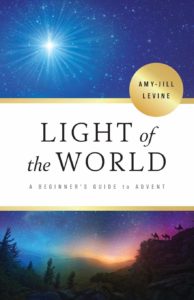 Light of the World: A Beginner’s Guide to Advent Amy-Jill Levine (Abingdon Press) book – $16.99; DVD – $39.99; Leader’s Guide – $14.99 OUR SALE PRICES: book = $13.59; DVD = $31.99; Leader’s Guide = $11.99 I hope you know the popular Professor Levine (New Testament and Jewish Studies at Vanderbilt Divinity School.) She has brought her Jewish faith and her academic scholarship of first century Judaism to the study of Jesus and the gospel in books like The Misunderstood Jew, Short Stories by Jesus, The Annotated Jewish New Testament and last Spring’s Entering the Passion of Jesus: A Beginner’s Guide to Holy Week.) This new one by Amy-Jill Levine has been our biggest selling new Advent book these last few weeks as many are intrigued with her new look at the history of the birth of Christ, tracing the Christmas narrative through the stories of Zechariah, Elizabeth, Mary and other standard seasonal texts. Of course, everyone knows these gospel texts have obvious and profound connections to Old Testament texts; as one Lutheran scholar put it, “There’s no one I’d rather have guide me through Advent and the first chapters of Matthew and Luke than Amy-Jill Levine.” There are four good chapters to the book, four lively sessions in the DVD. The four-week Leader’s Guide includes session plans, activities, and discussion questions, as well as multiple format options.
Light of the World: A Beginner’s Guide to Advent Amy-Jill Levine (Abingdon Press) book – $16.99; DVD – $39.99; Leader’s Guide – $14.99 OUR SALE PRICES: book = $13.59; DVD = $31.99; Leader’s Guide = $11.99 I hope you know the popular Professor Levine (New Testament and Jewish Studies at Vanderbilt Divinity School.) She has brought her Jewish faith and her academic scholarship of first century Judaism to the study of Jesus and the gospel in books like The Misunderstood Jew, Short Stories by Jesus, The Annotated Jewish New Testament and last Spring’s Entering the Passion of Jesus: A Beginner’s Guide to Holy Week.) This new one by Amy-Jill Levine has been our biggest selling new Advent book these last few weeks as many are intrigued with her new look at the history of the birth of Christ, tracing the Christmas narrative through the stories of Zechariah, Elizabeth, Mary and other standard seasonal texts. Of course, everyone knows these gospel texts have obvious and profound connections to Old Testament texts; as one Lutheran scholar put it, “There’s no one I’d rather have guide me through Advent and the first chapters of Matthew and Luke than Amy-Jill Levine.” There are four good chapters to the book, four lively sessions in the DVD. The four-week Leader’s Guide includes session plans, activities, and discussion questions, as well as multiple format options.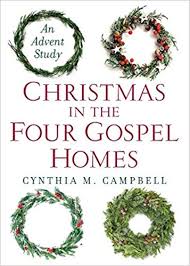 Christmas in the Four Gospel Homes: An Advent Study Cynthia M. Campbell (WJK) $13.00 OUR SALE PRICE = $10.40 Okay, this is a creatively conceived, lovely little book. Imagine, if you will, what it would be like to decorate your home for the holidays inspired by each of the four gospels? What would “Mark’s house” or “John’s house” or “Matthew’s house” look like if decorated for Christmas? In other words, how might a house look for Christmas, this book asks, if it is based on what each gospel says about it? There are beautiful illustrations from architect Kevin Burns, even. Nice idea, huh?
Christmas in the Four Gospel Homes: An Advent Study Cynthia M. Campbell (WJK) $13.00 OUR SALE PRICE = $10.40 Okay, this is a creatively conceived, lovely little book. Imagine, if you will, what it would be like to decorate your home for the holidays inspired by each of the four gospels? What would “Mark’s house” or “John’s house” or “Matthew’s house” look like if decorated for Christmas? In other words, how might a house look for Christmas, this book asks, if it is based on what each gospel says about it? There are beautiful illustrations from architect Kevin Burns, even. Nice idea, huh?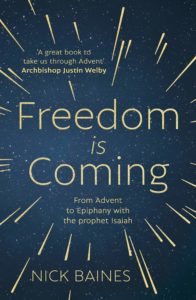 Freedom Is Coming: From Advent to Epiphany with the Prophet Isaiah Nick Baines (SPCK) $15.00 OUR SALE PRICE = $12.00 It seems to me one can hardly understand the fullest meaning of Jesus’ incarnation and the Christmas season without spending quality time with Isaiah. This is a good serious of what Paula Gooder says are “deep but accessible reflections.” The Archbishop of Canterbury (Justin Welby) says Baines “brings out both challenge and hope from living Advent side by side with the story of God’s people in Isaiah. A great book.”
Freedom Is Coming: From Advent to Epiphany with the Prophet Isaiah Nick Baines (SPCK) $15.00 OUR SALE PRICE = $12.00 It seems to me one can hardly understand the fullest meaning of Jesus’ incarnation and the Christmas season without spending quality time with Isaiah. This is a good serious of what Paula Gooder says are “deep but accessible reflections.” The Archbishop of Canterbury (Justin Welby) says Baines “brings out both challenge and hope from living Advent side by side with the story of God’s people in Isaiah. A great book.”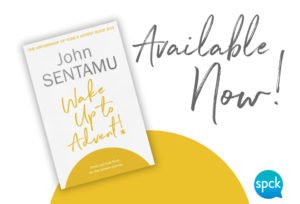 Wake Up to Advent! Archbishop John Mugabi Sentamu (SPCK) $15.00 OUR SALE PRICE = $12.00 We are grateful we can important books from this good UK publisher through our friends at InterVarsity Press; this one is the Advent book selected for a big read by the Archbishop of York (England) and we think it looks amazing. The brilliant Oliver O’Donovan wrote the foreword and Sir Philip Mawer says it is “the perfect antidote to the stress and commercialism of our preparations for Christmas.”
Wake Up to Advent! Archbishop John Mugabi Sentamu (SPCK) $15.00 OUR SALE PRICE = $12.00 We are grateful we can important books from this good UK publisher through our friends at InterVarsity Press; this one is the Advent book selected for a big read by the Archbishop of York (England) and we think it looks amazing. The brilliant Oliver O’Donovan wrote the foreword and Sir Philip Mawer says it is “the perfect antidote to the stress and commercialism of our preparations for Christmas.”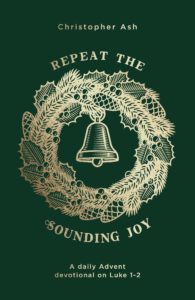 Repeat the Sounding Joy: A Daily Advent Devotional on Luke 1 – 2 Christopher Ash (The Good Book Company) $12.99 OUR SALE PRICE = $10.39 Are you looking for a classic, no-nonsense but warm-hearted explication of the Luke texts for the season? Christopher Ash is a fine thinker and writer, a straight-arrow Reformed theologian in the heritage, perhaps, of the Puritans or the Banner of Truth Trust. Blurbs on the back cover include great endorsements such as one by speaker and author Kathleen Nielson who says Repeat the Sounding Joy is “profound and wonderfully Word-filled.” Sam Allberry (of Ravi Zacharias Ministries) notes that it shows us “the refreshing, startling realities that lie behind our Christmas festivities.”
Repeat the Sounding Joy: A Daily Advent Devotional on Luke 1 – 2 Christopher Ash (The Good Book Company) $12.99 OUR SALE PRICE = $10.39 Are you looking for a classic, no-nonsense but warm-hearted explication of the Luke texts for the season? Christopher Ash is a fine thinker and writer, a straight-arrow Reformed theologian in the heritage, perhaps, of the Puritans or the Banner of Truth Trust. Blurbs on the back cover include great endorsements such as one by speaker and author Kathleen Nielson who says Repeat the Sounding Joy is “profound and wonderfully Word-filled.” Sam Allberry (of Ravi Zacharias Ministries) notes that it shows us “the refreshing, startling realities that lie behind our Christmas festivities.”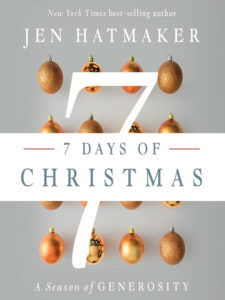 7 Days of Christmas: A Season of Generosity Jen Hatmaker (Abingdon Press) $21.99 OUR SALE PRICE = $17.59 What a great gift book, a square sized, smallish hardback, nicely packaged with glossy paper and color drawings and sketches, making this a great gift to share with anyone who may feel stressed during the holiday. Perhaps you know Ms. Hatmaker’s first book called 7: An Experimental Mutiny Against Excess which was her story of cutting out excess and inviting us follow her guidance into seven categories/areas of life where we need relief and liberation. Following those same seven categories – kitchen, fashion, stuff, streaming, tossing, spending, stressing – in which we’ve practiced idolatrous and unhealthy behaviors causing distortion and anxiety, Hatmaker here shares simple ideas for replacing excess in each arena this Christmas.
7 Days of Christmas: A Season of Generosity Jen Hatmaker (Abingdon Press) $21.99 OUR SALE PRICE = $17.59 What a great gift book, a square sized, smallish hardback, nicely packaged with glossy paper and color drawings and sketches, making this a great gift to share with anyone who may feel stressed during the holiday. Perhaps you know Ms. Hatmaker’s first book called 7: An Experimental Mutiny Against Excess which was her story of cutting out excess and inviting us follow her guidance into seven categories/areas of life where we need relief and liberation. Following those same seven categories – kitchen, fashion, stuff, streaming, tossing, spending, stressing – in which we’ve practiced idolatrous and unhealthy behaviors causing distortion and anxiety, Hatmaker here shares simple ideas for replacing excess in each arena this Christmas.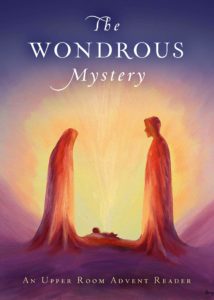 The Wondrous Mystery: An Upper Room Advent Reader (Upper Room Books) $9.99 OUR SALE PRICE = $7.99 Even before the current church emphasis on spiritual practices and contemplative/monastic spirituality, Upper Room Books, from Nashville, has long published gentle and touching reflections, often rooted in a mature awareness of the issues of our interior lives. Perhaps you know of their beautiful journal Weavings which for years has published literarily rich and thoughtful spiritual reflections and essays. This wondrous (if brief) and inexpensive new seasonal collection brings together for the first time some of the best and most beloved pieces from Weavings published about Advent during the last 30 years by exceptional authors such as Barbara Brown Taylor, Henri Nouwen, Sue Monk Kidd, Wendy Wright, John Mogabgab, even Wendell Berry. What a delight to see in book form some of this pieces that were only seen by those who subscribed to Weavings.
The Wondrous Mystery: An Upper Room Advent Reader (Upper Room Books) $9.99 OUR SALE PRICE = $7.99 Even before the current church emphasis on spiritual practices and contemplative/monastic spirituality, Upper Room Books, from Nashville, has long published gentle and touching reflections, often rooted in a mature awareness of the issues of our interior lives. Perhaps you know of their beautiful journal Weavings which for years has published literarily rich and thoughtful spiritual reflections and essays. This wondrous (if brief) and inexpensive new seasonal collection brings together for the first time some of the best and most beloved pieces from Weavings published about Advent during the last 30 years by exceptional authors such as Barbara Brown Taylor, Henri Nouwen, Sue Monk Kidd, Wendy Wright, John Mogabgab, even Wendell Berry. What a delight to see in book form some of this pieces that were only seen by those who subscribed to Weavings. 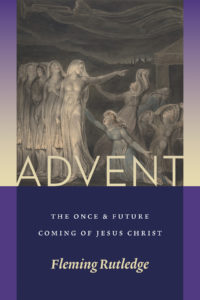 Advent: The Once and Future Coming of Jesus Christ Fleming Rutledge (Eerdmans) $30.00 OUR SALE PRICE = $24.00 Last year I
Advent: The Once and Future Coming of Jesus Christ Fleming Rutledge (Eerdmans) $30.00 OUR SALE PRICE = $24.00 Last year I 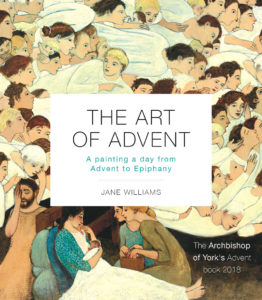 The Art of Advent: A Painting a Day from Advent to Epiphany Jane Williams (SPCK) $15.00 OUR SALE PRICE = $12.00 This was our biggest selling Advent devotional book last season (as the Lenten companion, The Art of Lent by Sister Wendy Beckett, was our biggest selling Lenten devotional last Easter time as well.) We are so glad to announce it again as it is just a fabulous little book –a full color painting reproduced for each day of Advent with a lovely devotional on the facing page. This is compact sized and quite affordable and the paintings are diverse. That is, they are not all obviously about the nativity, but Williams sees into the artwork, knows something about the painters, and weaves a bit of art history and aesthetic insight into an interesting and uplifting Advent devotion. What tremendous and invigorating and classy little readings these are — very highly recommended. There are nearly 40 famous and lesser-known masterpieces here, and it will, they hope, “lead you into a deeply prayerful response to all that these paintings convey to the discerning eye. What a great gift this is, too – sturdy paper, full color, sophisticated but not too heady or too expensive. Get a few and give ‘em out. You won’t regret it. I explained a bit more about it
The Art of Advent: A Painting a Day from Advent to Epiphany Jane Williams (SPCK) $15.00 OUR SALE PRICE = $12.00 This was our biggest selling Advent devotional book last season (as the Lenten companion, The Art of Lent by Sister Wendy Beckett, was our biggest selling Lenten devotional last Easter time as well.) We are so glad to announce it again as it is just a fabulous little book –a full color painting reproduced for each day of Advent with a lovely devotional on the facing page. This is compact sized and quite affordable and the paintings are diverse. That is, they are not all obviously about the nativity, but Williams sees into the artwork, knows something about the painters, and weaves a bit of art history and aesthetic insight into an interesting and uplifting Advent devotion. What tremendous and invigorating and classy little readings these are — very highly recommended. There are nearly 40 famous and lesser-known masterpieces here, and it will, they hope, “lead you into a deeply prayerful response to all that these paintings convey to the discerning eye. What a great gift this is, too – sturdy paper, full color, sophisticated but not too heady or too expensive. Get a few and give ‘em out. You won’t regret it. I explained a bit more about it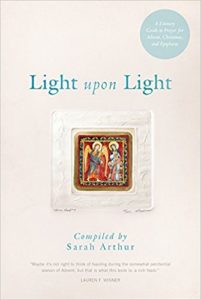 Light Upon Light: A Literary Guide to Prayer for Advent, Christmas, and Epiphany compiled by Sarah Arthur (Paraclete) $18.99 OUR SALE PRICE $15.19 This is a prayer book comprised of excerpts of great literature, poets, playwrights (old and new) aligned with Biblical texts. What a feast! (You may know of her others in this series, similar literary devotional guides. The one for Lent and Easter is called Between Midnight and Dawn: A Literary Guide to Prayer for Lent, Holy Week, and Eastertide and the marvelous one for Ordinary Time is At the Still Point: A Literary Guide to Prayer in Ordinary Time. We are happy to carry several other Sarah Arthur books, from her tremendous co-written memoir about community and discipleship (The Year of Small Things) to her spiritual biography of Madeleine L’Engle, A Light So Lovely. She’s a great writer and wise compiler of the good, good stuff.
Light Upon Light: A Literary Guide to Prayer for Advent, Christmas, and Epiphany compiled by Sarah Arthur (Paraclete) $18.99 OUR SALE PRICE $15.19 This is a prayer book comprised of excerpts of great literature, poets, playwrights (old and new) aligned with Biblical texts. What a feast! (You may know of her others in this series, similar literary devotional guides. The one for Lent and Easter is called Between Midnight and Dawn: A Literary Guide to Prayer for Lent, Holy Week, and Eastertide and the marvelous one for Ordinary Time is At the Still Point: A Literary Guide to Prayer in Ordinary Time. We are happy to carry several other Sarah Arthur books, from her tremendous co-written memoir about community and discipleship (The Year of Small Things) to her spiritual biography of Madeleine L’Engle, A Light So Lovely. She’s a great writer and wise compiler of the good, good stuff.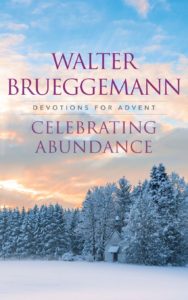 Celebrating Abundance: Devotions for Advent Walter Brueggemann (WJK) $13.00 OUR SALE PRICE = $10.40 Although this came out three years ago, we continue to promote it. Walt Brueggemann, one of the great Bible scholars and church activists of our day preaches with evocative insight and writes stuff like this:
Celebrating Abundance: Devotions for Advent Walter Brueggemann (WJK) $13.00 OUR SALE PRICE = $10.40 Although this came out three years ago, we continue to promote it. Walt Brueggemann, one of the great Bible scholars and church activists of our day preaches with evocative insight and writes stuff like this: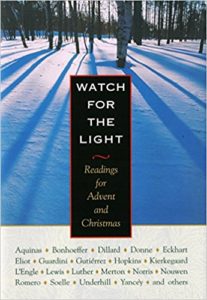 Watch for the Light: Readings for Advent and Christmas (Plough Publishing) $24.00 OUR SALE PRICE = $19.20 Over the years this has been one of our consistent best sellers and a handsome hand-sized hardback book people delight in, treasure, recommend. (They then buy the Lenten/Easter companion volume Bread and Wine.) It includes short readings from great writers from throughout church history from Thomas Aquinas to Annie Dillard, John Donne to Martin Luther, Thomas Merton to Evelyn Underhill. Where can you find, I often ask, eloquent portions of writers as good but as diverse as Guardini, L’Engle, Kierkegaard, Oscar Romero, and Philip Yancey? Beautiful stuff.
Watch for the Light: Readings for Advent and Christmas (Plough Publishing) $24.00 OUR SALE PRICE = $19.20 Over the years this has been one of our consistent best sellers and a handsome hand-sized hardback book people delight in, treasure, recommend. (They then buy the Lenten/Easter companion volume Bread and Wine.) It includes short readings from great writers from throughout church history from Thomas Aquinas to Annie Dillard, John Donne to Martin Luther, Thomas Merton to Evelyn Underhill. Where can you find, I often ask, eloquent portions of writers as good but as diverse as Guardini, L’Engle, Kierkegaard, Oscar Romero, and Philip Yancey? Beautiful stuff.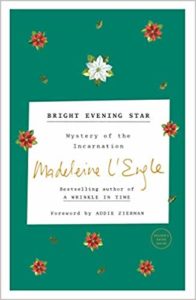 Bright Evening Star: Mystery of the Incarnation Madeleine L’Engle (Convergent) $15.00 OUR SALE PRICE = $12.00 This first was released in 1997 by the publishing imprint developed by Harold and Luci Shaw and it was beloved by many. After oddly being unavailable for a long while it was reissued a year ago with a great new cover and a lovely new foreword by thoughtful memoirist Addie Zierman. For those that enjoy Madeleine’s previous memoirs or nonfiction reflections such as The Rock That is Higher or Icons and Golden Calves (both also recently reissued) Bright Evening Star offers stories and ruminations and theological reflections by a great poet and writer. Includes a “reader’s guide” making it ideal for a holiday book club.
Bright Evening Star: Mystery of the Incarnation Madeleine L’Engle (Convergent) $15.00 OUR SALE PRICE = $12.00 This first was released in 1997 by the publishing imprint developed by Harold and Luci Shaw and it was beloved by many. After oddly being unavailable for a long while it was reissued a year ago with a great new cover and a lovely new foreword by thoughtful memoirist Addie Zierman. For those that enjoy Madeleine’s previous memoirs or nonfiction reflections such as The Rock That is Higher or Icons and Golden Calves (both also recently reissued) Bright Evening Star offers stories and ruminations and theological reflections by a great poet and writer. Includes a “reader’s guide” making it ideal for a holiday book club.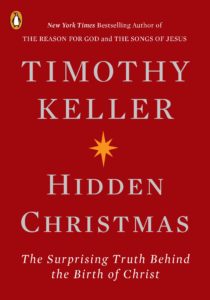 Hidden Christmas: The Surprising Truth Behind the Birth of Christ Timothy Keller (Penguin) $15.00 OUR SALE PRICE = $12.00 I suppose you know how we esteem the great and insightful books by Tim Keller; we stock them all. As you may know he was a serious pastor in lower Manhattan, doing a church plant that has attracted thousands of (often young, often successful, often sophisticated) seekers with a need for the gospel and a desire to learn about how their vocations and callings in the world are related to their faith. (He has retired as pastor of Redeemer Presbyterian and heads up a supportive church planting network called City to City, so remains exceptionally active and influential.) This book is an intellectually provocative and thoughtful exploration of the nativity story, including some of what Keller calls “the hard edges of the story.” It is enjoyable and interesting, a bit more mature than some inspirational devotionals might be; it might even be considered a work of cultural apologetics. This small paperback includes 8 chapters so it isn’t really an Advent devotional, but for those that want solid, contemporary, compelling sermons on the historical reliability and theological importance of this wonderful season, Hidden Christmas helps us uncover the “true meaning” – the very good news of hope and salvation. Not to be missed.
Hidden Christmas: The Surprising Truth Behind the Birth of Christ Timothy Keller (Penguin) $15.00 OUR SALE PRICE = $12.00 I suppose you know how we esteem the great and insightful books by Tim Keller; we stock them all. As you may know he was a serious pastor in lower Manhattan, doing a church plant that has attracted thousands of (often young, often successful, often sophisticated) seekers with a need for the gospel and a desire to learn about how their vocations and callings in the world are related to their faith. (He has retired as pastor of Redeemer Presbyterian and heads up a supportive church planting network called City to City, so remains exceptionally active and influential.) This book is an intellectually provocative and thoughtful exploration of the nativity story, including some of what Keller calls “the hard edges of the story.” It is enjoyable and interesting, a bit more mature than some inspirational devotionals might be; it might even be considered a work of cultural apologetics. This small paperback includes 8 chapters so it isn’t really an Advent devotional, but for those that want solid, contemporary, compelling sermons on the historical reliability and theological importance of this wonderful season, Hidden Christmas helps us uncover the “true meaning” – the very good news of hope and salvation. Not to be missed.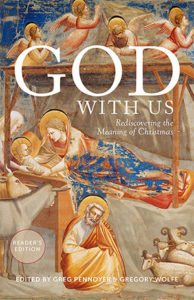 God With Us: Rediscovering the Meaning of Christmas: Reader’s Edition edited by Greg Pennoyer & Gregory Wolfe (Paraclete Press) $18.99 OUR SALE PRICE = $15.19 If you’ve read BookNotes for years (as some stalwart friends have) you may recall may several rave reviews of this masterpiece of a book, truly one of the great Advent book releases of the last 30 years! It was firstly released as a hardcover with full color art but (as we’ve explained the last few years) the copyright for the art ran out and the little publisher had little choice but to re-issue the book without most of the artwork and lavish design) but it now available as a very handsome paperback with classy French folded covers, but not as much artwork. There are a few plates and some nice design touches making this “reader’s edition” a truly magnificent paperback. The first edition hardbacks are out of print ad unavailable.
God With Us: Rediscovering the Meaning of Christmas: Reader’s Edition edited by Greg Pennoyer & Gregory Wolfe (Paraclete Press) $18.99 OUR SALE PRICE = $15.19 If you’ve read BookNotes for years (as some stalwart friends have) you may recall may several rave reviews of this masterpiece of a book, truly one of the great Advent book releases of the last 30 years! It was firstly released as a hardcover with full color art but (as we’ve explained the last few years) the copyright for the art ran out and the little publisher had little choice but to re-issue the book without most of the artwork and lavish design) but it now available as a very handsome paperback with classy French folded covers, but not as much artwork. There are a few plates and some nice design touches making this “reader’s edition” a truly magnificent paperback. The first edition hardbacks are out of print ad unavailable.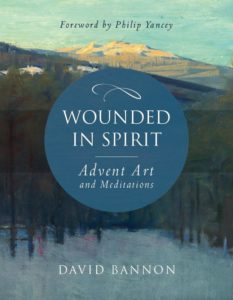 Wounded in Spirit: Advent Art and Meditations David Bannon (Paraclete) $29.99 OUR SALE PRICE = $23.99 Allow me, if you will, to simply reprint what I wrote last year about this book that had just come out last season.
Wounded in Spirit: Advent Art and Meditations David Bannon (Paraclete) $29.99 OUR SALE PRICE = $23.99 Allow me, if you will, to simply reprint what I wrote last year about this book that had just come out last season.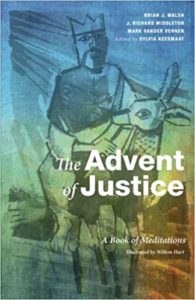 Advent of Justice: A Book of Meditations Brian J. Walsh, J. Richard Middleton, Mark Vander Vennen, Sylvia Keesmaat (Wipf & Stock) $12.99 OUR SALE PRICE = $10.39 I hope you recall that I did a serious BookNotes review telling about one of the most important books of 2019, a major study of the book of Romans called Romans Disarmed: Resisting Empire/Demanding Justice by Sylvia Keesmaat and Brian Walsh.
Advent of Justice: A Book of Meditations Brian J. Walsh, J. Richard Middleton, Mark Vander Vennen, Sylvia Keesmaat (Wipf & Stock) $12.99 OUR SALE PRICE = $10.39 I hope you recall that I did a serious BookNotes review telling about one of the most important books of 2019, a major study of the book of Romans called Romans Disarmed: Resisting Empire/Demanding Justice by Sylvia Keesmaat and Brian Walsh. 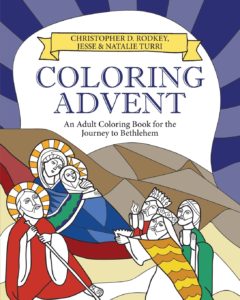 Coloring Advent: An Adult Coloring Book for the Journey to Bethlehem Christopher D. Rodkey and Jesse & Natalie Turri (CBP) $12.99 OUR SALE PRICE = $10.39 We have happily explained this the last few years and I’d invite you to revisit my discussion of it in a previous BookNotes announcement
Coloring Advent: An Adult Coloring Book for the Journey to Bethlehem Christopher D. Rodkey and Jesse & Natalie Turri (CBP) $12.99 OUR SALE PRICE = $10.39 We have happily explained this the last few years and I’d invite you to revisit my discussion of it in a previous BookNotes announcement  The Ruthless Elimination of Hurry by John Mark Comer (Waterbrook) $23.99 OUR SALE PRICE = $19.19
The Ruthless Elimination of Hurry by John Mark Comer (Waterbrook) $23.99 OUR SALE PRICE = $19.19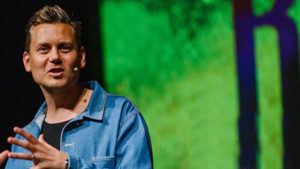 Enter John Mark Comer, hip Portland mega-church preacher and creative writer and energetic speaker. Some of us met him at our Pittsburgh Jubilee conference last year (
Enter John Mark Comer, hip Portland mega-church preacher and creative writer and energetic speaker. Some of us met him at our Pittsburgh Jubilee conference last year (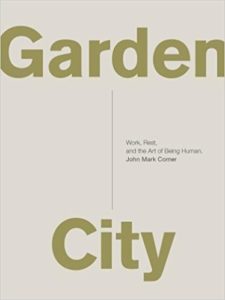 perhaps best known for his book Garden City: Work, Rest, and the Art of Being Human and for a writing style (even a book design) that brings to mind the aesthetics of a young Rob Bell. The books are punchy, with short paragraphs, a few pages of reverse black/white printing, lots of white margin, sleek, simple fonts, no fussy, old-fashioned dust jacket. The minimalist vibe served his young readers well in Loveology and Garden City and God Has a Name and it works very well – in an ironic kind of way – in this new volume about being too fast paced. The Ruthless Elimination of Hurry seems to be written for those in a hurry, which perhaps is as it should be. Not everybody can wade through Willard’s dense and thick Divine Conspiracy. After a busy, draining day I just don’t have it in me to dig into my Merton.
perhaps best known for his book Garden City: Work, Rest, and the Art of Being Human and for a writing style (even a book design) that brings to mind the aesthetics of a young Rob Bell. The books are punchy, with short paragraphs, a few pages of reverse black/white printing, lots of white margin, sleek, simple fonts, no fussy, old-fashioned dust jacket. The minimalist vibe served his young readers well in Loveology and Garden City and God Has a Name and it works very well – in an ironic kind of way – in this new volume about being too fast paced. The Ruthless Elimination of Hurry seems to be written for those in a hurry, which perhaps is as it should be. Not everybody can wade through Willard’s dense and thick Divine Conspiracy. After a busy, draining day I just don’t have it in me to dig into my Merton. But let me be clear: cool and hip and funny and snarky as Comer is, he is wise beyond his years, honest about his journey, realistic in his description of our fast paced lives and our personal foibles that to a large degree are formed by our crazy lifestyles. He understands the anxiety many of us feel and he knows it is related to our chronic busy-ness. He talks candidly about being too tired to pray, about binge watching Netflix and crushing Candy Crush. Maybe he worries about drinking too much wine late at night. He knows his youngish Portland congregation, and, I think, knows much about you and me, too. I’ve never once played Candy Crush, but I waste time in my own ways and have huge regrets about the state of my interior life. Ya dig?
But let me be clear: cool and hip and funny and snarky as Comer is, he is wise beyond his years, honest about his journey, realistic in his description of our fast paced lives and our personal foibles that to a large degree are formed by our crazy lifestyles. He understands the anxiety many of us feel and he knows it is related to our chronic busy-ness. He talks candidly about being too tired to pray, about binge watching Netflix and crushing Candy Crush. Maybe he worries about drinking too much wine late at night. He knows his youngish Portland congregation, and, I think, knows much about you and me, too. I’ve never once played Candy Crush, but I waste time in my own ways and have huge regrets about the state of my interior life. Ya dig?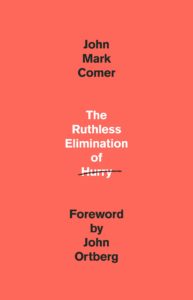 Sure, JMC is not the only one plowing these fields, calling us to reconsider our Christian growth in the ways of Jesus by slowing down and paying attention, and there are others who write more thoroughly. But ya know what? Comer is really, really appealing and he’s really processing this stuff in his own life and he is speaking honestly about it all. He knows the hardships, he knows the temptations, and he’s glimpsed healing hope that things can be more sane. We can have an emotionally healthy spirituality, but it has to be (as we say these days) intentional. And under the (easy) yoke of our leader, Jesus.
Sure, JMC is not the only one plowing these fields, calling us to reconsider our Christian growth in the ways of Jesus by slowing down and paying attention, and there are others who write more thoroughly. But ya know what? Comer is really, really appealing and he’s really processing this stuff in his own life and he is speaking honestly about it all. He knows the hardships, he knows the temptations, and he’s glimpsed healing hope that things can be more sane. We can have an emotionally healthy spirituality, but it has to be (as we say these days) intentional. And under the (easy) yoke of our leader, Jesus. Carpe Diem Redeemed: Seizing the Day, Discerning the Times Os Guinness (IVP) $20.00 OUR SALE PRICE = $16.00 If the new John Mark Comer book, sans dust jacket, is upbeat and breezy in a very cool, conversational style, with goofy asides and postmodern allusions and pop culture references, Dr. Os Guinness’s book (with an old school hour glass on the cover) is rather scholarly, full of historical and sociological allusions – with references to Greek thinkers and Roman historians through Shakespeare quotes and lines from his beloved American Founding Fathers to contemporary academics like Peter Berger or Francis Fukuyama and intellectual leaders such as Rabbi Jonathan Sacks and John Ralston Saul. Comer, in admitting his lack of serious commitment to long distance running jokes about how he’d look in spandex. You aren’t going to hear Os Guinness quip about that.
Carpe Diem Redeemed: Seizing the Day, Discerning the Times Os Guinness (IVP) $20.00 OUR SALE PRICE = $16.00 If the new John Mark Comer book, sans dust jacket, is upbeat and breezy in a very cool, conversational style, with goofy asides and postmodern allusions and pop culture references, Dr. Os Guinness’s book (with an old school hour glass on the cover) is rather scholarly, full of historical and sociological allusions – with references to Greek thinkers and Roman historians through Shakespeare quotes and lines from his beloved American Founding Fathers to contemporary academics like Peter Berger or Francis Fukuyama and intellectual leaders such as Rabbi Jonathan Sacks and John Ralston Saul. Comer, in admitting his lack of serious commitment to long distance running jokes about how he’d look in spandex. You aren’t going to hear Os Guinness quip about that.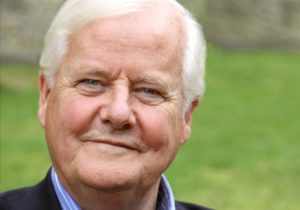
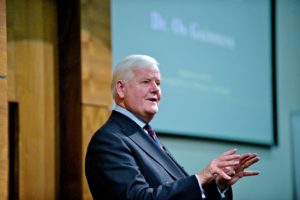 For years Os has been a dynamic public speaker, mesmerizing his audiences as he speaks flawlessly without a note, listing the significance of this, the pressures of that, the obstacles and the opportunities, moving effortlessly through nearly byzantine outlines which gel brilliantly by the hour’s end. His books are no different, offering the joy of logical argumentation, wrapped in the beauty of rhetorical persuasion. I will read anything Os writes for as long as he writes and for as long as I am able.
For years Os has been a dynamic public speaker, mesmerizing his audiences as he speaks flawlessly without a note, listing the significance of this, the pressures of that, the obstacles and the opportunities, moving effortlessly through nearly byzantine outlines which gel brilliantly by the hour’s end. His books are no different, offering the joy of logical argumentation, wrapped in the beauty of rhetorical persuasion. I will read anything Os writes for as long as he writes and for as long as I am able.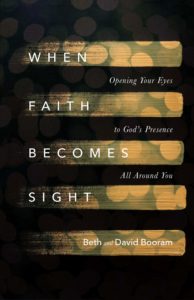 When Faith Becomes Sight: Opening Your Eyes to God’s Presence All Around You Beth & David Booram (IVP/formatio) $17.00 OUR SALE PRICE = $13.60 When a new book on spiritual formation, written by seasoned spiritual directors and retreat leaders comes out, I take notice. However, I will be honest: there is so much being released on spiritual practices and attentiveness to God and the spirituality of the ordinary, and discerning God’s guidance, and so forth that it is hard not to grow almost cynical. What more need to be said? How many more resources do we need in this genre of contemplative spirituality? Curiously, the Booram’s themselves wondered this as well, it seems, and I am delighted they overcame their initial reluctance and released this beautiful, touching, gentle, helpful book. With blurbs on the back from giants like Tilden Edwards and the artfully Celtic Christine Valters Paintner and the amazing Phileena Heuertz and the popular podcasting enneagrammer, Suzanne Stabile, you really need to pay attention.
When Faith Becomes Sight: Opening Your Eyes to God’s Presence All Around You Beth & David Booram (IVP/formatio) $17.00 OUR SALE PRICE = $13.60 When a new book on spiritual formation, written by seasoned spiritual directors and retreat leaders comes out, I take notice. However, I will be honest: there is so much being released on spiritual practices and attentiveness to God and the spirituality of the ordinary, and discerning God’s guidance, and so forth that it is hard not to grow almost cynical. What more need to be said? How many more resources do we need in this genre of contemplative spirituality? Curiously, the Booram’s themselves wondered this as well, it seems, and I am delighted they overcame their initial reluctance and released this beautiful, touching, gentle, helpful book. With blurbs on the back from giants like Tilden Edwards and the artfully Celtic Christine Valters Paintner and the amazing Phileena Heuertz and the popular podcasting enneagrammer, Suzanne Stabile, you really need to pay attention. I was drawn into the adventure of this book by its very structure. It is nicely written and wonderfully organized. There are a handful of chapters that comprise each section. Part One is called “Looking For” and is about “recognizing the signs of God.” With discussions of transcendent moments and “slender threads” and a chapter called “The Fertile Void” I was very impressed. I hope we are never too busy to look for God’s presence, but, well, we all know better.
I was drawn into the adventure of this book by its very structure. It is nicely written and wonderfully organized. There are a handful of chapters that comprise each section. Part One is called “Looking For” and is about “recognizing the signs of God.” With discussions of transcendent moments and “slender threads” and a chapter called “The Fertile Void” I was very impressed. I hope we are never too busy to look for God’s presence, but, well, we all know better. Earthkeeping and Character: Exploring a Christian Ecological Virtue Ethic Steven Bouma-Prediger (Baker Academic) $24.99 OUR SALE PRICE = $19.99 Have you ever hugged a book? I mean, right in the middle of it you are just so grateful, so glad, so appreciative that you just hold its pages to your chest and smile and whisper a prayer of thanksgiving?
Earthkeeping and Character: Exploring a Christian Ecological Virtue Ethic Steven Bouma-Prediger (Baker Academic) $24.99 OUR SALE PRICE = $19.99 Have you ever hugged a book? I mean, right in the middle of it you are just so grateful, so glad, so appreciative that you just hold its pages to your chest and smile and whisper a prayer of thanksgiving?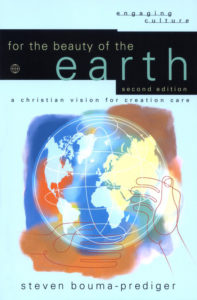 I have read Steven’s excellent book on creation care For the Beauty of the Earth and the extraordinary co-authored volume (with Brian Walsh) called Beyond Homelessness: Christian Faith in a Culture of Displacement. (We even stock his deep Oxford University Press book The Greening of Theology where he compares the ecological models of Rosemary Ruether, Joseph Stiller and Jurgen Moltmann.) He is a scholar who you should know and has done books you should read. Listen to A.J. Swoboda, author of Subversive Sabbath:
I have read Steven’s excellent book on creation care For the Beauty of the Earth and the extraordinary co-authored volume (with Brian Walsh) called Beyond Homelessness: Christian Faith in a Culture of Displacement. (We even stock his deep Oxford University Press book The Greening of Theology where he compares the ecological models of Rosemary Ruether, Joseph Stiller and Jurgen Moltmann.) He is a scholar who you should know and has done books you should read. Listen to A.J. Swoboda, author of Subversive Sabbath: In a moving story in the beginning Steven and some students are hiking and as they come to their wilderness campground, the find the place nearly trashed — litter scattered, burnt logs and ashes scattered, bark stripped from the glorious white birches. “Who kind of a person would do a thing like this?” a student cries? (And, conversely, he revisits the story and comes across a wonderfully well-kept spot, protected, nurtured, stewarded. And the question remains: “What kind of people do something like this??
In a moving story in the beginning Steven and some students are hiking and as they come to their wilderness campground, the find the place nearly trashed — litter scattered, burnt logs and ashes scattered, bark stripped from the glorious white birches. “Who kind of a person would do a thing like this?” a student cries? (And, conversely, he revisits the story and comes across a wonderfully well-kept spot, protected, nurtured, stewarded. And the question remains: “What kind of people do something like this?? Bouma-Prediger is a great teacher and he not only explains what is meant by virtue ethics and how that school of thought (about character formation, not merely obedience to ethical principles) is an important aspect of uniquely Christian and deeply human ways of being a good person. And then, just when it was getting interesting, he makes it even all the more interesting by telling us about a recent school of thought in our generation about Environmental Virtue Ethics, known as EVE in the biz, apparently. Who knew?
Bouma-Prediger is a great teacher and he not only explains what is meant by virtue ethics and how that school of thought (about character formation, not merely obedience to ethical principles) is an important aspect of uniquely Christian and deeply human ways of being a good person. And then, just when it was getting interesting, he makes it even all the more interesting by telling us about a recent school of thought in our generation about Environmental Virtue Ethics, known as EVE in the biz, apparently. Who knew? History and Eschatology: Jesus and the Promise of Natural Theology: The 2018 Gifford Lectures N.T. Wright (Baylor University Press) $34.95 **
History and Eschatology: Jesus and the Promise of Natural Theology: The 2018 Gifford Lectures N.T. Wright (Baylor University Press) $34.95 **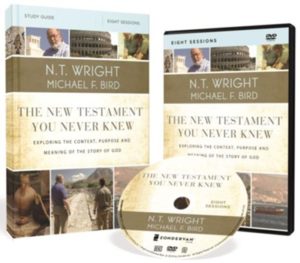 DVD + study guide The New Testament You Never Knew: Exploring the Context, Purpose, and Meaning of the Story of God N.T. Wright & Michael F. Bird (Zondervan) $51.99 for book + study guide together.
DVD + study guide The New Testament You Never Knew: Exploring the Context, Purpose, and Meaning of the Story of God N.T. Wright & Michael F. Bird (Zondervan) $51.99 for book + study guide together. The New Testament in Its World: An Introduction to the History, Literature, and Theology of the First Christians N. T. Wright & Michael Bird (Zondervan Academic) $59.99
The New Testament in Its World: An Introduction to the History, Literature, and Theology of the First Christians N. T. Wright & Michael Bird (Zondervan Academic) $59.99 A Big Gospel in Small Places (Why Ministry in Forgotten Communities Matters) Stephen Witmer (IVP/Praxis) $18.00. Our sale price = $14.40
A Big Gospel in Small Places (Why Ministry in Forgotten Communities Matters) Stephen Witmer (IVP/Praxis) $18.00. Our sale price = $14.40 Reading Buechner: Exploring the Work of a Master Memoirist, Novelist, Theologian, and Preacher Jeffrey Munro (IVP) $18.00
Reading Buechner: Exploring the Work of a Master Memoirist, Novelist, Theologian, and Preacher Jeffrey Munro (IVP) $18.00 The Reading Life: The Joy of Seeing New Worlds Through Other’s Eyes C.S. Lewis (HarperOne) $19.99 Our sale price = $15.99
The Reading Life: The Joy of Seeing New Worlds Through Other’s Eyes C.S. Lewis (HarperOne) $19.99 Our sale price = $15.99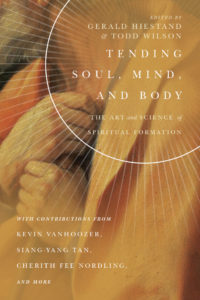 Tending Soul, Mind, and Body: The Art and Science of Spiritual Formation edited by Todd Wilson & Gerald Hiestand (IVP Academic) $25.00 Our sale price = $20.00
Tending Soul, Mind, and Body: The Art and Science of Spiritual Formation edited by Todd Wilson & Gerald Hiestand (IVP Academic) $25.00 Our sale price = $20.00 The Lord’s Prayer: A Guide to Praying the Our Father Wesley Hill (Lexham Press) $15.99 Our sale price = $12.79
The Lord’s Prayer: A Guide to Praying the Our Father Wesley Hill (Lexham Press) $15.99 Our sale price = $12.79 Miracles and Other Reasonable Things: A Story of Unlearning and Relearning God Sarah Bessey (Howard Books) $26.00 Our sale price = $20.80
Miracles and Other Reasonable Things: A Story of Unlearning and Relearning God Sarah Bessey (Howard Books) $26.00 Our sale price = $20.80 Unsettling Truths: The Ongoing, Dehumanizing Legacy of the Doctrine of Discovery Mark Charles & Soong-Chan Rah (IVP) $17.00
Unsettling Truths: The Ongoing, Dehumanizing Legacy of the Doctrine of Discovery Mark Charles & Soong-Chan Rah (IVP) $17.00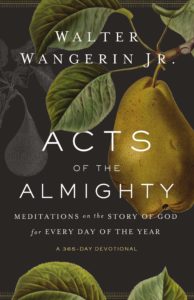 Acts of the Almighty: Meditations on the Story of God for Every Day of the Year: A 365-Day Devotional Walter Wangerin, Jr. (Zondervan) $18.99 Our sale price = $15.19
Acts of the Almighty: Meditations on the Story of God for Every Day of the Year: A 365-Day Devotional Walter Wangerin, Jr. (Zondervan) $18.99 Our sale price = $15.19 Rings of Fire: Walking in Faith through a Volcanic Future Leonard Sweet (NavPress) $17.99 Our sale price = $14.39
Rings of Fire: Walking in Faith through a Volcanic Future Leonard Sweet (NavPress) $17.99 Our sale price = $14.39 Rhythms of Renewal: Trading Stress and Anxiety for a Life of Peace and Purpose Rebekah Lyons (Zondervan) $24.99 Our sale price = $19.99
Rhythms of Renewal: Trading Stress and Anxiety for a Life of Peace and Purpose Rebekah Lyons (Zondervan) $24.99 Our sale price = $19.99 Reframation: Seeing God, People, and Mission Through Reenchanted Frames Alan Hirsch & Mark Nelson (100Movements Publishing) $18.99
Reframation: Seeing God, People, and Mission Through Reenchanted Frames Alan Hirsch & Mark Nelson (100Movements Publishing) $18.99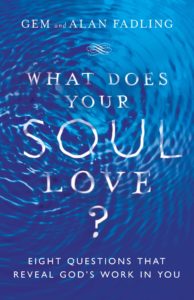 What Does Your Soul Love? Eight Questions That Reveal God’s Work in You Gem and Alan Fadling (IVP/formatio) $22.00 Our sale price = $17.60
What Does Your Soul Love? Eight Questions That Reveal God’s Work in You Gem and Alan Fadling (IVP/formatio) $22.00 Our sale price = $17.60 Exactly As You Are: The Life and Faith of Mister Rogers Shea Tuttle (Eerdmans) $23.99 Our sale price = $19.19
Exactly As You Are: The Life and Faith of Mister Rogers Shea Tuttle (Eerdmans) $23.99 Our sale price = $19.19 My Heart Cries Out: Gospel Meditations for Everyday Life Paul David Tripp (Crossway) $24.99 Our sale price = $19.99
My Heart Cries Out: Gospel Meditations for Everyday Life Paul David Tripp (Crossway) $24.99 Our sale price = $19.99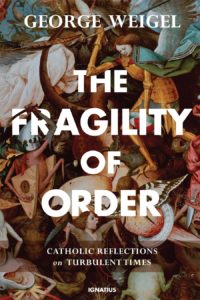 The Fragility of Order: Catholic Reflections on Turbulent Times George Weigel (Ignatius Press) $24.95 Our sale price = $19.96
The Fragility of Order: Catholic Reflections on Turbulent Times George Weigel (Ignatius Press) $24.95 Our sale price = $19.96 Consumed By Hate, Redeemed By Love: How a Violent Klansman Became a Champion of Racial Reconciliation Thomas A. Tarrants (Nelson Books) $24.99 Our sale price = $19.99
Consumed By Hate, Redeemed By Love: How a Violent Klansman Became a Champion of Racial Reconciliation Thomas A. Tarrants (Nelson Books) $24.99 Our sale price = $19.99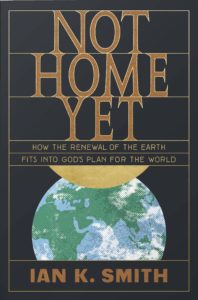 Not Home Yet: How the Renewal of the Earth Fits Into God’s Plan for the World Ian K. Smith (Crossway) $15.99 Our sale price = $12.79
Not Home Yet: How the Renewal of the Earth Fits Into God’s Plan for the World Ian K. Smith (Crossway) $15.99 Our sale price = $12.79 Choosing Community: Action, Faith, and Joy in the Works of Dorothy Sayers Christine A. Colon (IVP Academic) $16.00 Our sale price = $12.80
Choosing Community: Action, Faith, and Joy in the Works of Dorothy Sayers Christine A. Colon (IVP Academic) $16.00 Our sale price = $12.80 Near the Exit: Travels with the No-So-Grim Reaper Lori Erickson (WJK) $17.00
Near the Exit: Travels with the No-So-Grim Reaper Lori Erickson (WJK) $17.00